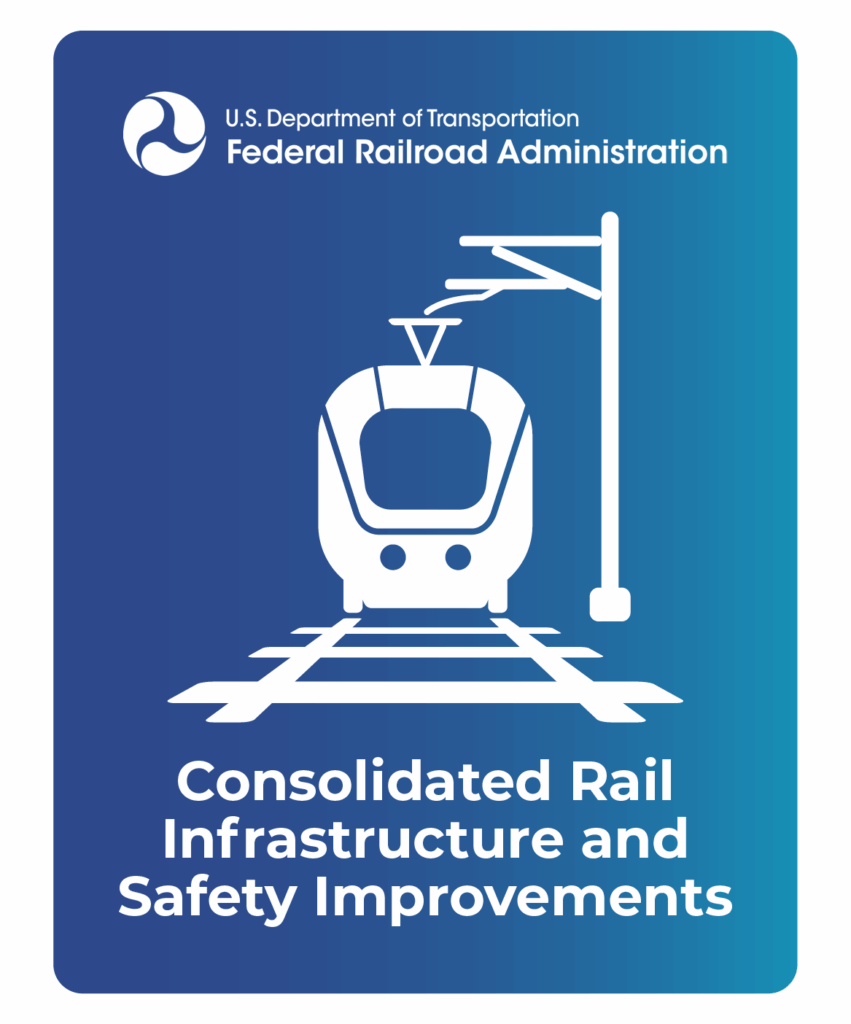
Consolidated Rail Infrastructure and Safety Improvements
The Consolidated Rail Infrastructure and Safety Improvements (CRISI) program is an initiative of the Federal Railroad Administration (FRA) that provides grant funding for projects aimed at improving the safety, efficiency, and reliability of intercity passenger and freight rail. The goal of the program is to meet both current and future rail workforce demands by addressing key challenges such as an aging workforce and critical skill gaps. It also aims to prepare the workforce for advanced technology deployments and operational innovations, ultimately contributing to the stabilization and growth of the rail industry workforce. The program includes the Mineta Summer Transportation Academy.
Federal Railroad Administration
TOPICS: Funding Opportunities , Policy and Planning , Safety and Health , Training
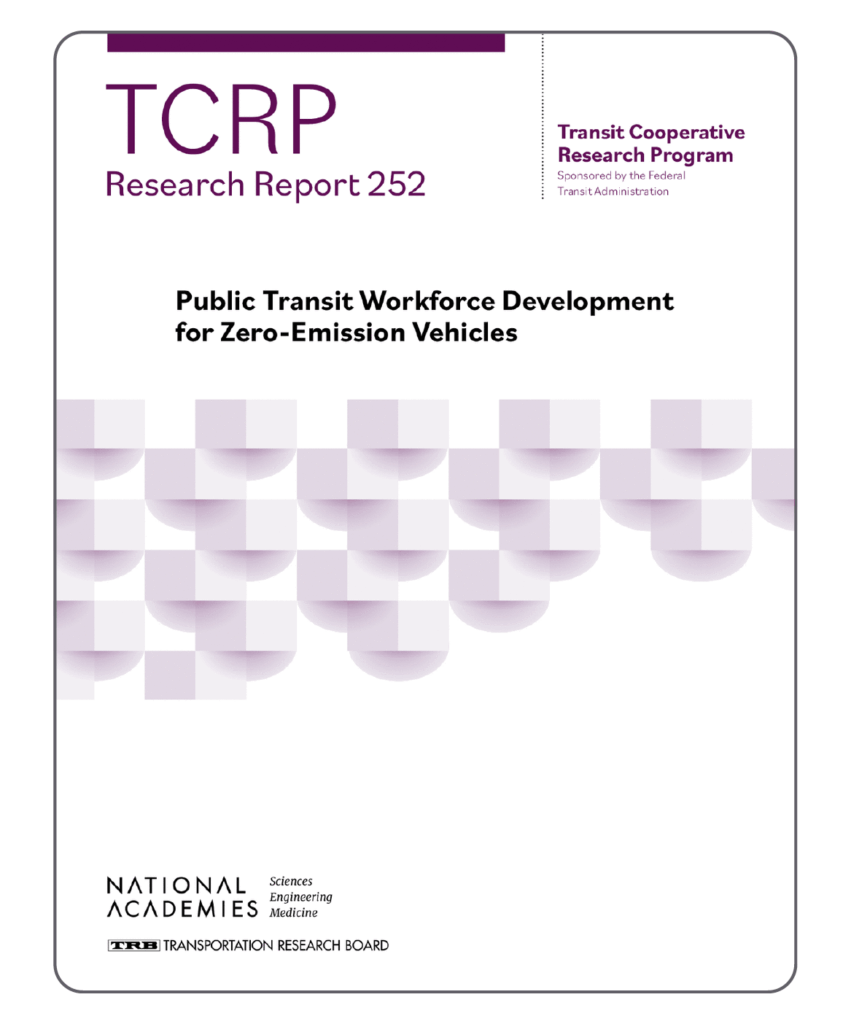
Public Transit Workforce Development for Zero-Emission Vehicles
This TCRP report focuses on vehicle maintenance of battery-electric and fuel-cell transit buses, including case studies from transit as well as lessons from the automotive and school transportation industries. Recommendations include assessing workforce skills through skills-gap analysis, building a systematic process for building skills (including through frontline worker engagement and the creation of formalized training programs, e.g., registered apprenticeship), and working proactively on recruitment and retention.
Transit Cooperative Research Program
December 2025
TOPICS: Low-No , Policy and Planning , Procurement , Safety and Health , Training
Contributor(s): National Academies of Sciences, Engineering, and Medicine; Transportation Research Board; Transit Cooperative Research Program; International Transportation Learning Center, John Schiavone, Karitsa Holdzkom, Douglas Nevins, Michaela Boneva; Planning Communities, Ann Steedly, Brandy Hutson, James Farrell
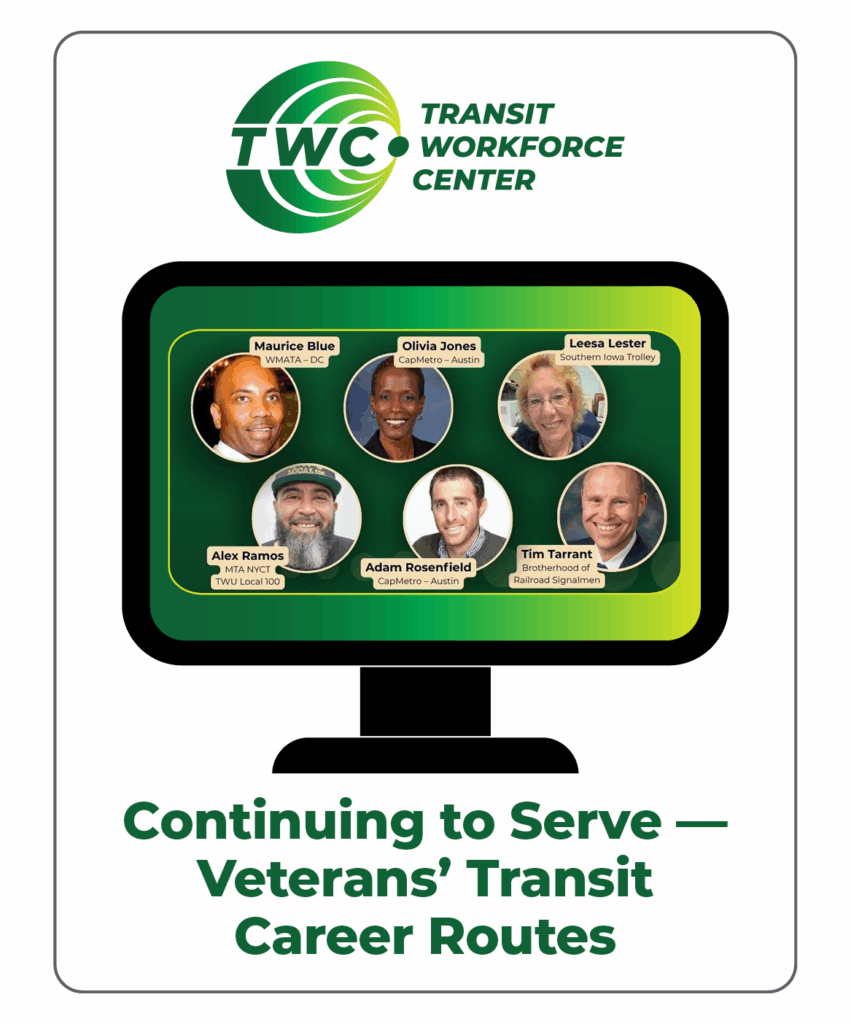
Continuing to Serve — Veterans’ Transit Career Routes
Transit Workforce Center
November 2025
In celebration of Veterans Day, TWC and external partners hosted a webinar exploring public transportation workforce pathways and opportunities for veterans. Check out the webinar recording below to hear from transit agencies and veterans about the experience veterans bring to public transportation, the various career trajectories they can follow in the industry, and how to launch veteran-focused outreach and recruitment programs. Several of the veterans and agencies were also represented in the Transit Career Story, Continuing to Serve — Veterans’ Transit Career Routes.
- Maurice Blue — Senior Sourcing Officer, Proactive Sourcing, Washington Metropolitan Area Transit Authority (WMATA)
- Olivia Jones — Director, Operations Control Center and Training, CapMetro
- Leesa Lester — Transit Director, Southern Iowa Trolley
- Alex Ramos — Outreach Coordinator, Transport Workers Union Local 100/Training Upgrade Fund; Light Maintainer, Metropolitan Transportation Authority–New York City Transit
- Adam Rosenfield — Program Manager, Workforce Outreach, CapMetro
- Tim Tarrant — Vice President for Commuter/Passenger, Brotherhood of Railroad Signalmen
Recording:

Streamlining Operator Hiring Practices — Key Takeaways from TWC’s Review of Existing Research
TWC is launching a new research effort aimed at documenting current transit agency hiring processes for operators and producing new resources to support agencies’ operator hiring efforts. The first part of the initiative is this introductory brief which reviews prior research on operator hiring practices in the transit industry, including best practices and lessons from other industries.
Transit Workforce Center
November 2025
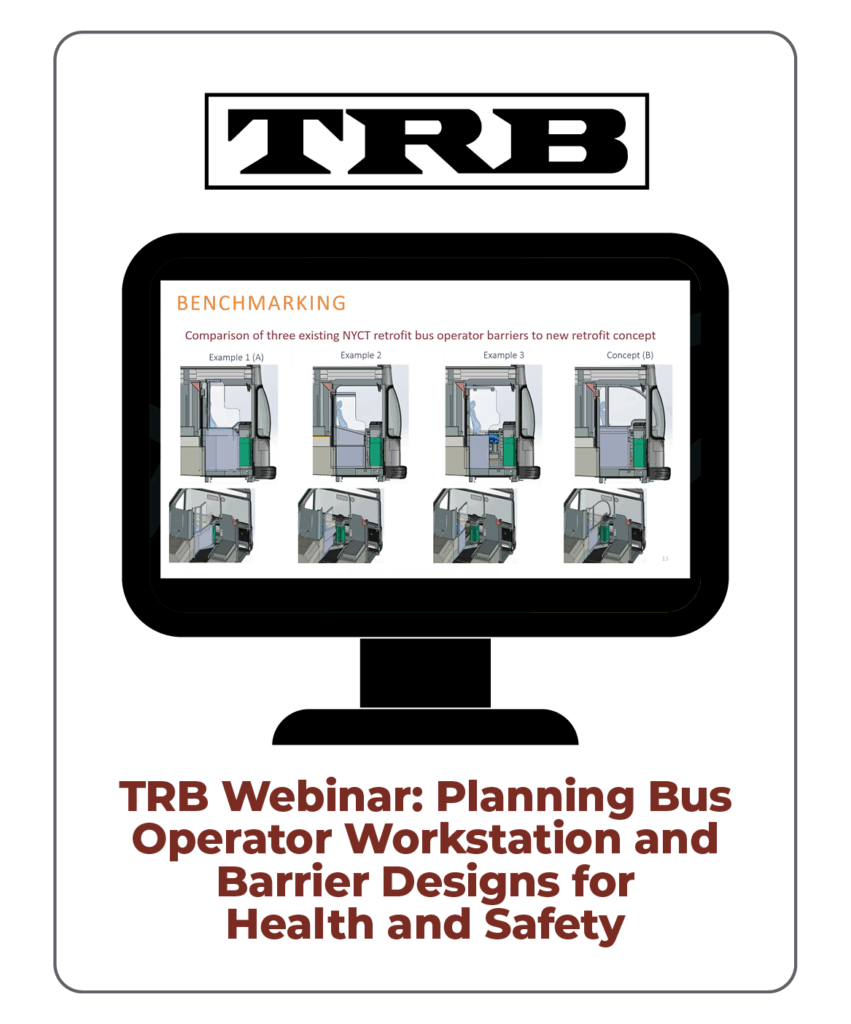
TRB Webinar: Planning Bus Operator Workstation and Barrier Designs for Health and Safety
Well-designed bus operator workstations and barriers can decrease driver risks of low back pain and slowed response time. Improving the health and safety of bus operators’ physical environment makes the job more appealing and drivers more productive. TRB hosted a webinar on Wednesday, October 22, 2025 from 11:00 AM to 12:00 PM Eastern that discussed how to mitigate the health and safety risks that are present for bus drivers. Presenters shared strategies for addressing these risks and highlighted effective approaches to improve the design and management of bus operator workstations.
Transportation Research Board
October 2025
TOPICS: Policy and Planning , Safety and Health
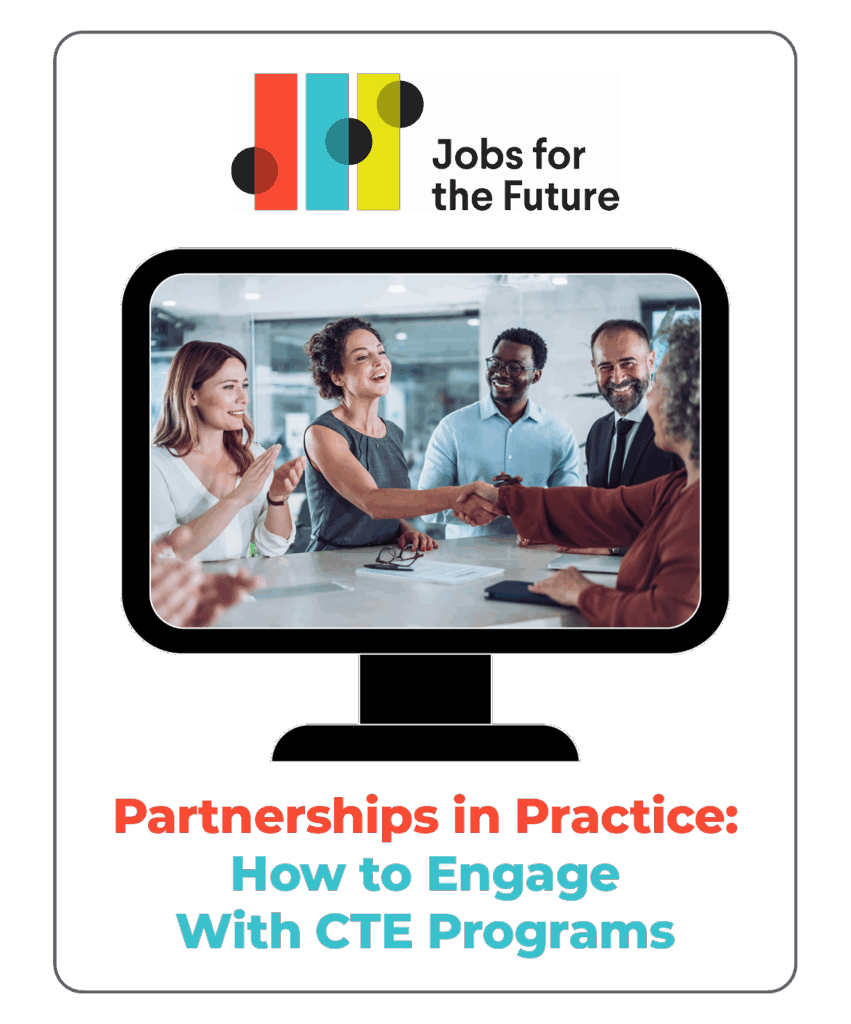
Partnerships in Practice: How to Engage With CTE Programs
This guide outlines a range of ways employers can engage with community college career and technical Education (CTE) programs, which are shown to be local sources of skilled workers. Offering strategies, tools, and advice for employers, it’s a companion piece to the JFF Power Your Workforce playbook.
Jobs for the Future
September 2025
Check out TWC’s college partnership case study for examples from transit of agencies engaging with their local college partners.

Power Your Workforce
This playbook introduces the business value of partnering with CTE, explains how these programs prepare learners with in-demand skills, and shows how employers can tap into this pipeline to meet current and future workforce needs. It explains how community college CTE programs work and provides a clear path to collaboration. It’s companion piece, Partnerships in Practice, offers strategies, tools, and advice for working with local colleges.
Jobs for the Future
September 2025
Check out TWC’s college partnership case study for examples from transit of agencies engaging with their local college partners.
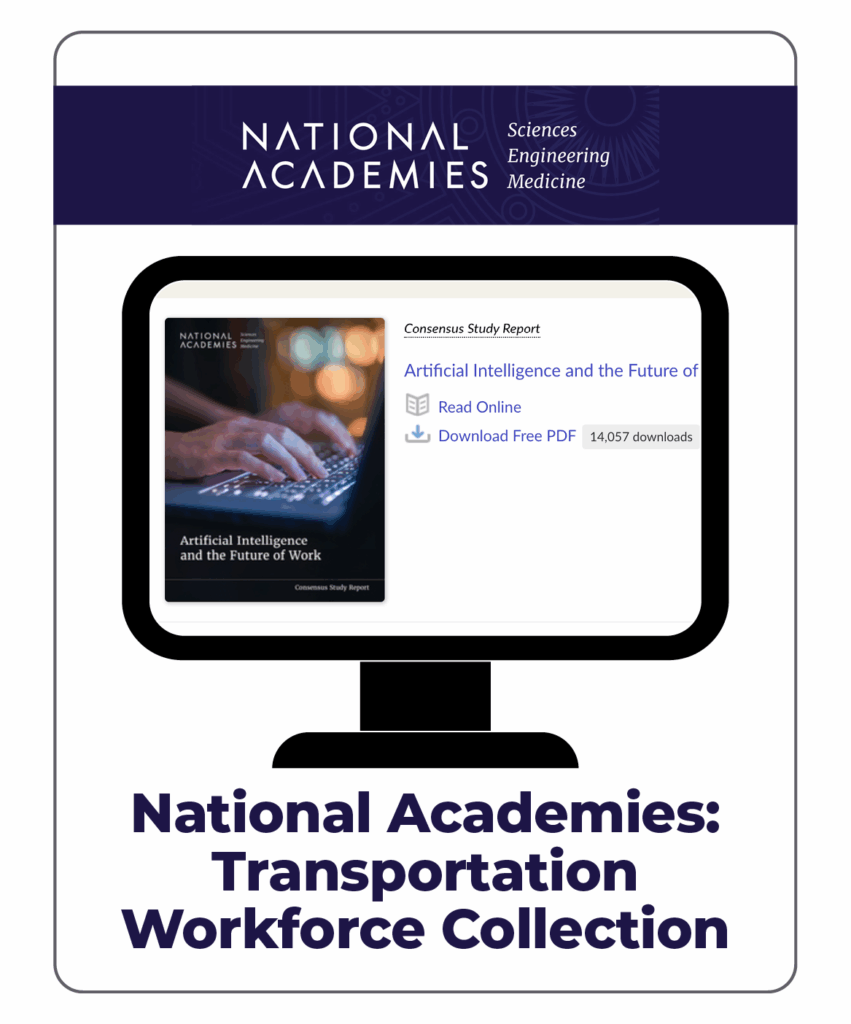
National Academies: Transportation Workforce Collection
The transportation industry has an all-encompassing need for an increasingly qualified workforce. The National Academies sponsor and publish research relating to the transportation workforce on a number of topics ranging from AI integration to mental health and wellness of transit system workers.
National Academies of Science, Engineering, and Medicine
TOPICS: Policy and Planning
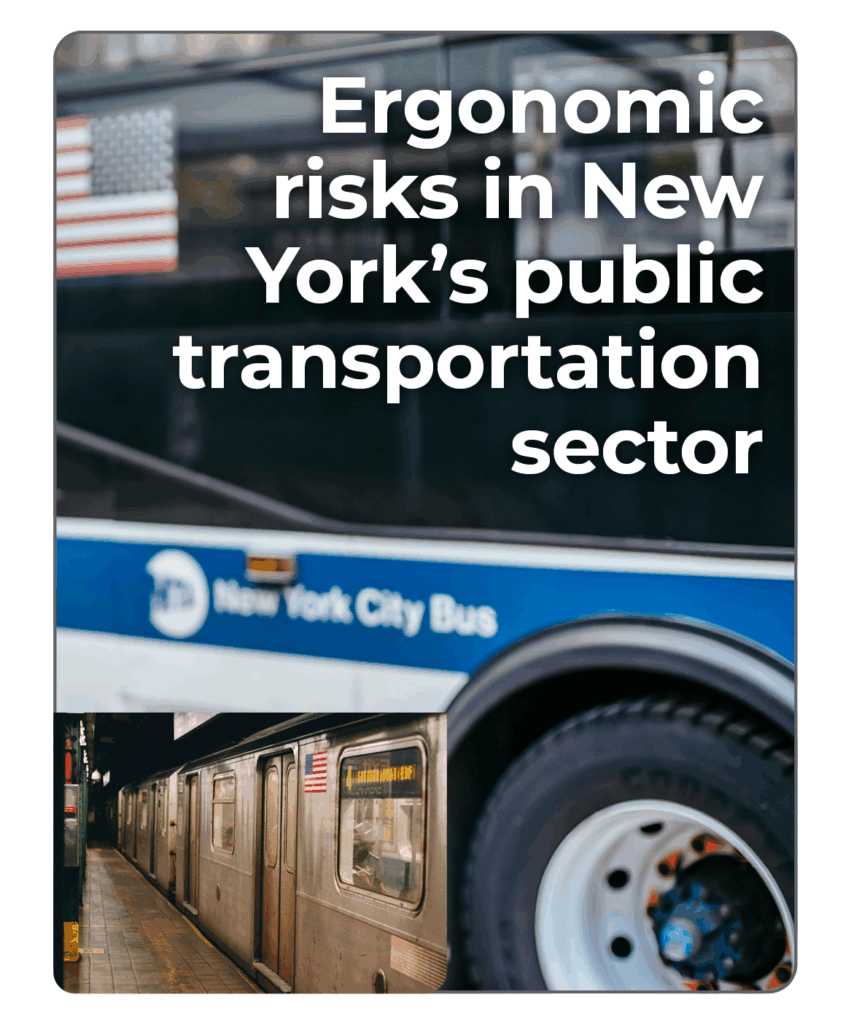
Ergonomic risks in New York’s public transportation sector
Transit employees, including bus drivers, subway operators, maintenance personnel, and station staff, are routinely exposed to risk factors such as prolonged sitting, awkward postures, repetitive movements, forceful exertions, and vibration exposure. These conditions contribute to musculoskeletal disorders (MSDs), fatigue, reduced productivity, and long-term health complications. This paper examines the scope of ergonomic hazards within New York’s public transportation sector, highlighting their health, safety, and organizational impacts. It also explores existing gaps in ergonomic interventions and emphasizes the need for targeted strategies, including workplace redesign, training programs, and policy reforms, to reduce risks and improve worker well-being.
September 2025
TOPICS: Policy and Planning , Safety and Health
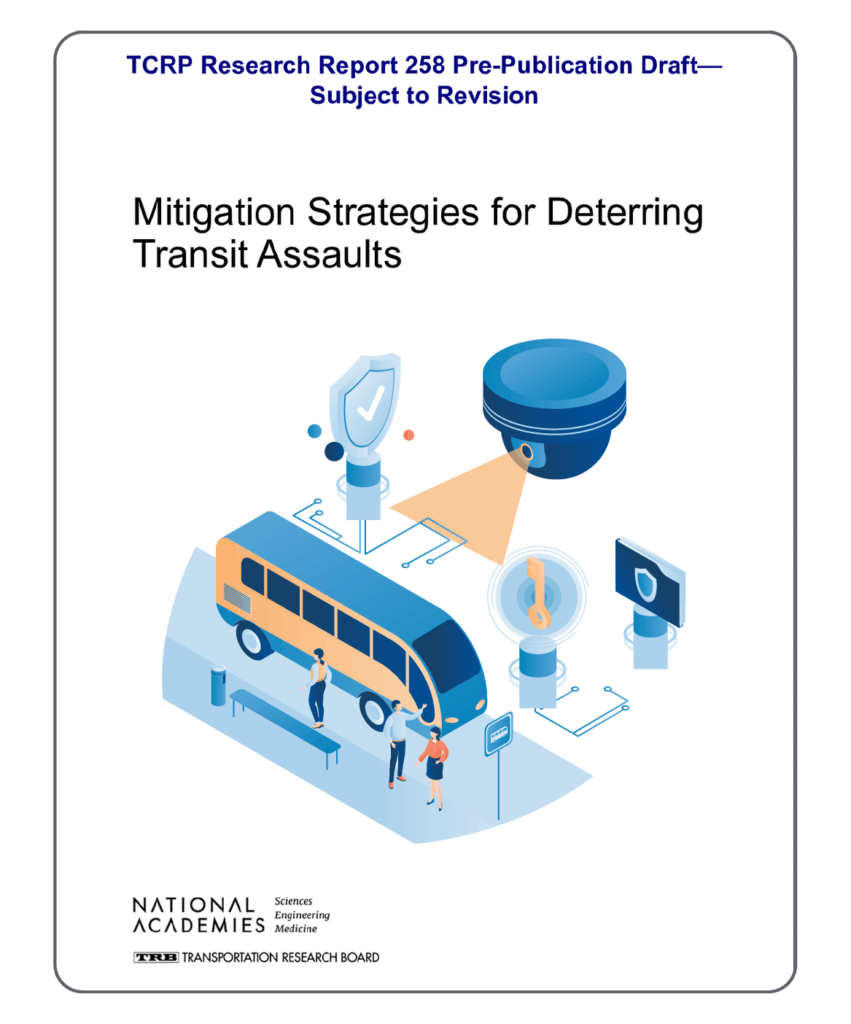
Mitigation Strategies for Deterring Transit Assaults
TCRP Research Report 258: Mitigation Strategies for Deterring Transit Assaults, from TRB’s Transit Cooperative Research Program, equips agencies with practical strategies and evidence-based recommendations to enhance safety and security in the transit environment.
Transit Cooperative Research Program
August 2025
TOPICS: Policy and Planning , Safety and Health , Training
Contributor(s): National Academies of Sciences, Engineering, and Medicine; Transportation Research Board; Transit Cooperative Research Program; Joan G. Hudson; Olivia (Jueyu) Wang; Neal Johnson; Ipek N. Sener; Jiani Guo; Crystal O’Rear; Hanfei Zhang; Mahya Mahdavi; Anastasia Loukaitou-Sideris
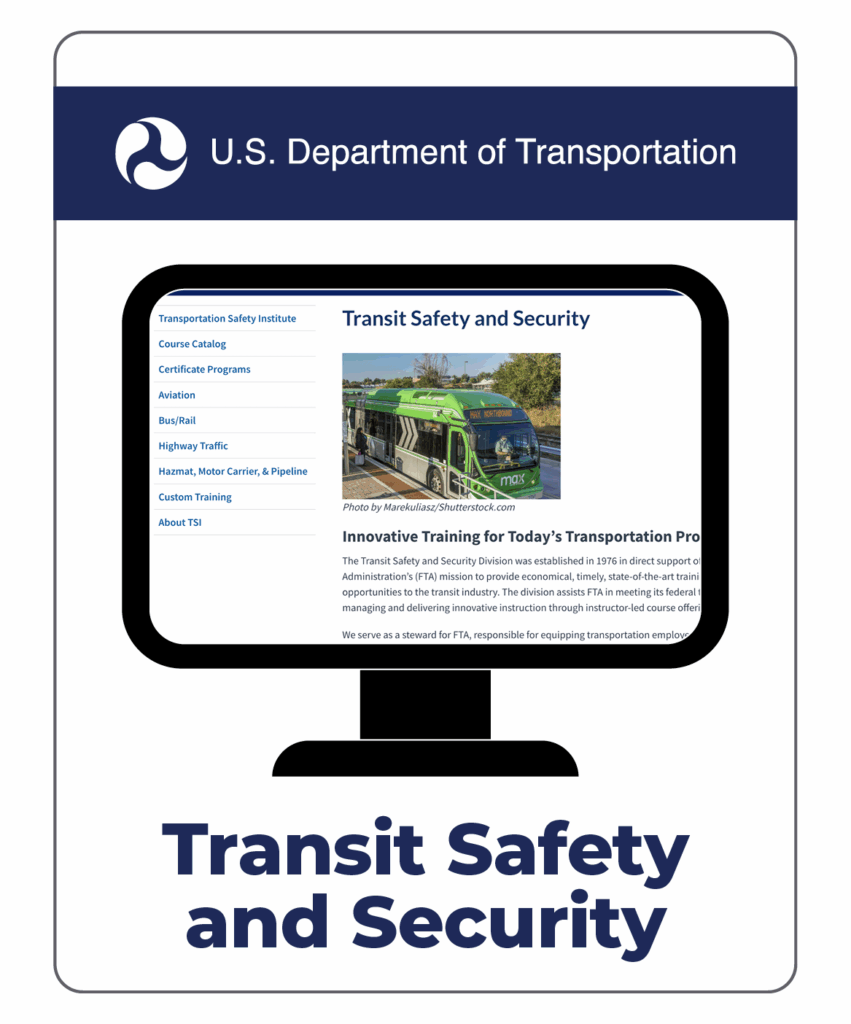
Transit Safety and Security
TSI’s training programs are designed and delivered to provide critical safety and security information, best practices, and regulatory guidance. Upon successful completion of TSI training courses, attendees receive tools and resources which enable participants to enhance the safety and security programs within their respective agency. Course materials are routinely updated to ensure all pertinent regulatory requirements are addressed in each training course.
Transportation Safety Institute
TOPICS: Policy and Planning , Safety and Health , Training
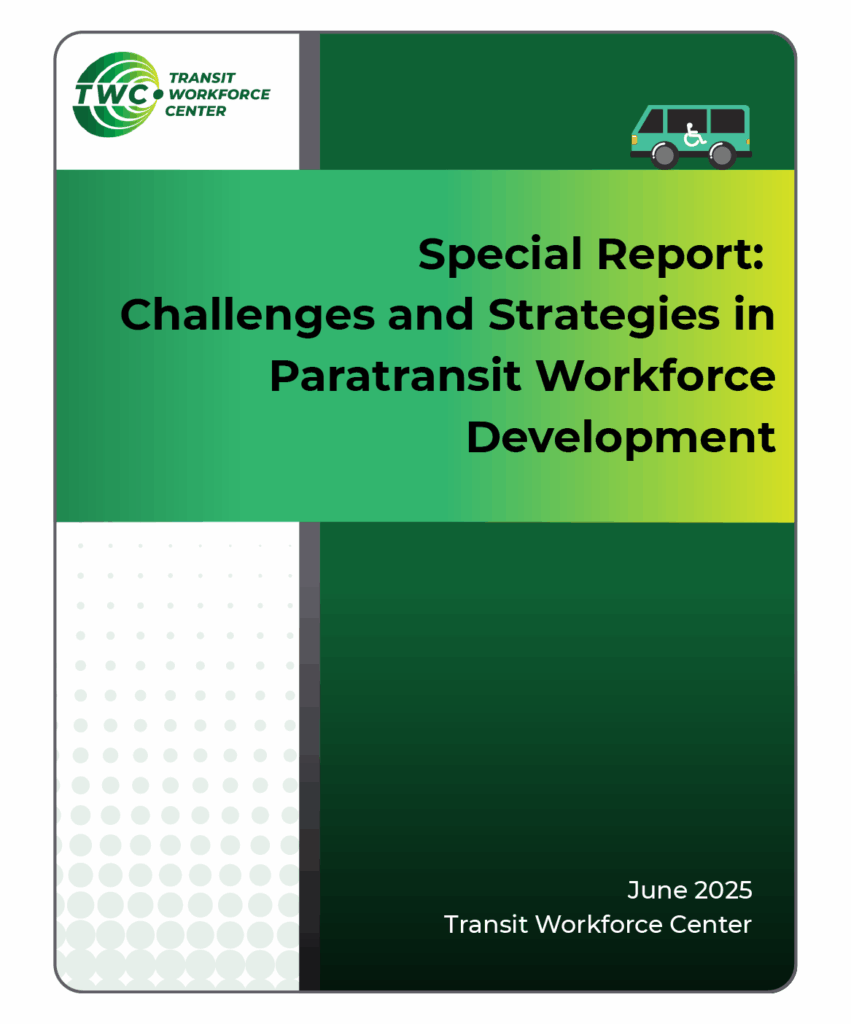
Special Report: Challenges and Strategies in Paratransit Workforce Development
Transit Workforce Center
June 2025
TOPICS: Hiring and Recruitment , Policy and Planning , Retention , Training , Workforce Shortage
Since the passage of the Americans with Disabilities Act (ADA) in 1990, paratransit has been a staple component of public transportation systems across the United States. ADA complementary paratransit provides transportation to people who, because of a disability, cannot use fixed-route service independently. Despite the importance of this mode in the overall health of urban transportation infrastructure, very little research has focused on the development of the paratransit workforce since a seminal 2010 study on paratransit operator recruitment and retention. This report aims to provide a brief update to the 2010 study, focusing not just on operators but on the entire paratransit workforce, including a range of frontline roles. To learn more about the unique workforce challenges of this modal context, as well as what successful strategies paratransit providers have used to combat those challenges, the Transit Workforce Center (TWC) research team conducted interviews involving 22 individuals across 13 paratransit systems in nine states. This report documents our learning from those interviews.
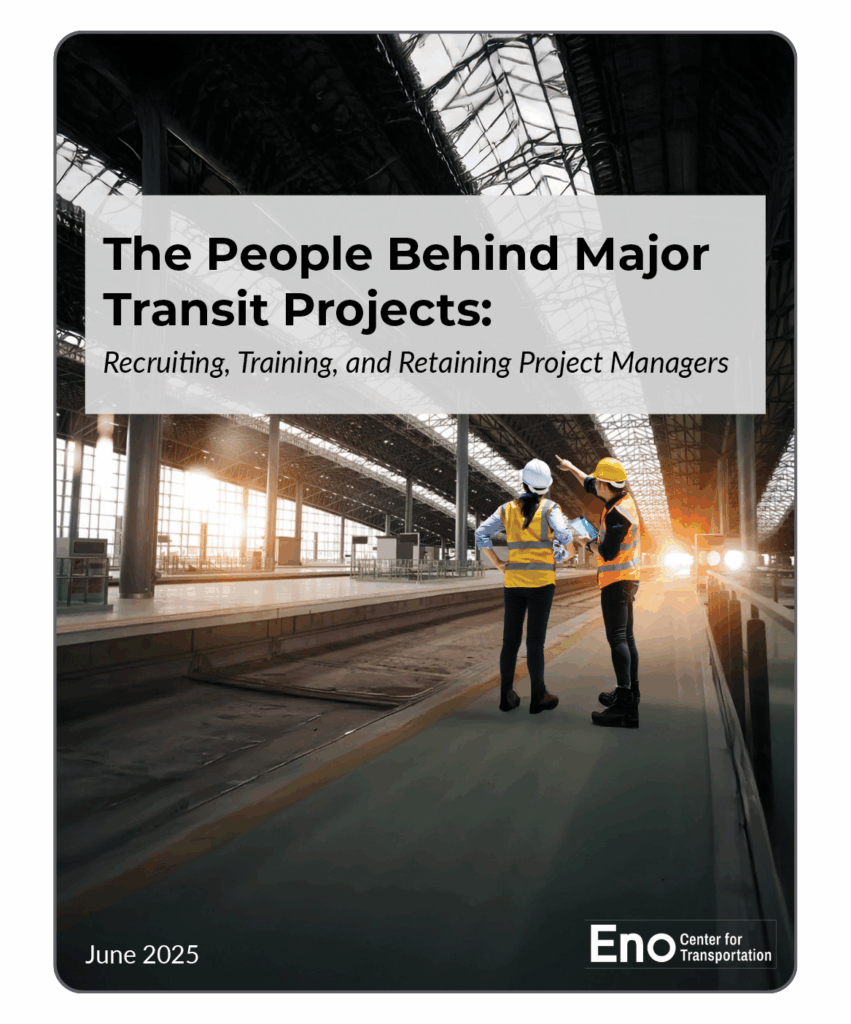
The People Behind Major Transit Projects
The People Behind Major Transit Projects explores strategies to help agencies better recruit, train, and retain project managers for large transit projects. It examines the challenges these managers face, and highlights the skills, experience, and support they need to succeed.
Eno Center for Transportation
June 2025
TOPICS: Hiring and Recruitment , Policy and Planning , Retention
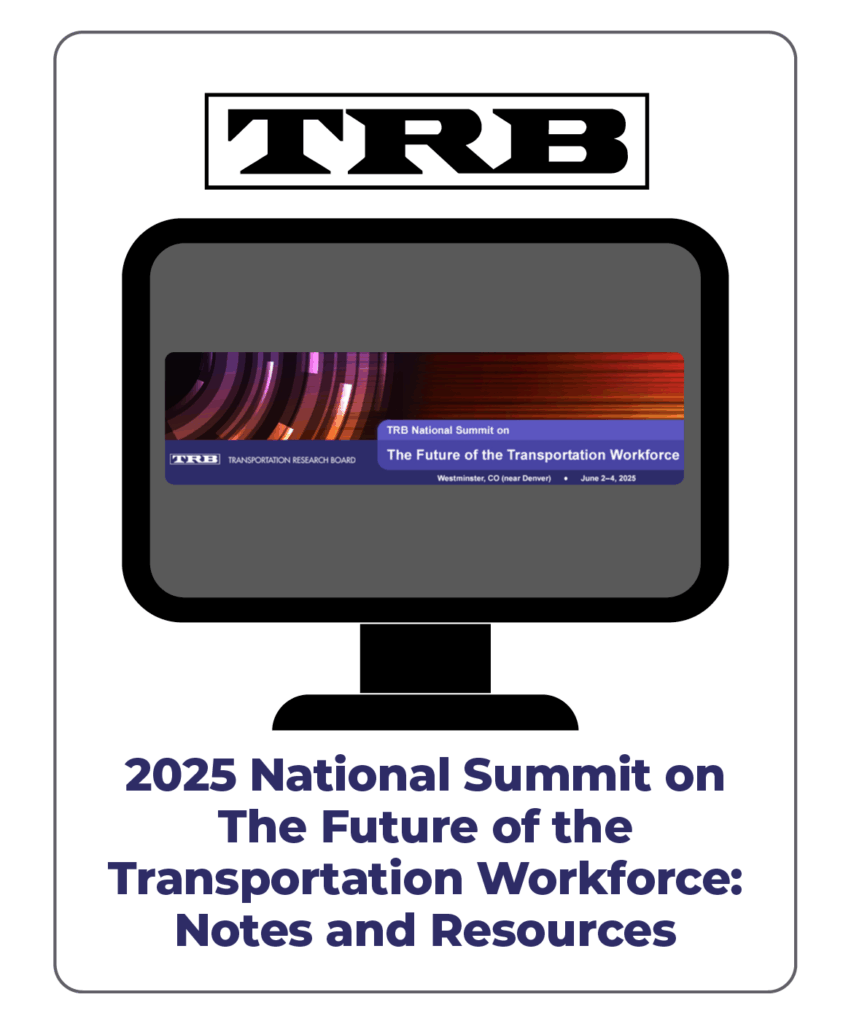
2025 National Summit on The Future of the Transportation Workforce: Notes and Resources
TRB held the National Summit on the Future of the Transportation Workforce on June 2-4, 2025 in Westminster, CO. This was the first national conversation on this critical issue since 2012. Thought leaders in transportation workforce recruitment, training, retention, and knowledge management met to discuss and address the challenges faced in each step of the workforce life cycle. Attendees included representatives from federal, state, and local transportation agencies; Metropolitan Planning Organizations; public transit agencies; academia; and private industry. Notes and resources from the conference can be found on this landing page.
Transportation Research Board
June 2025
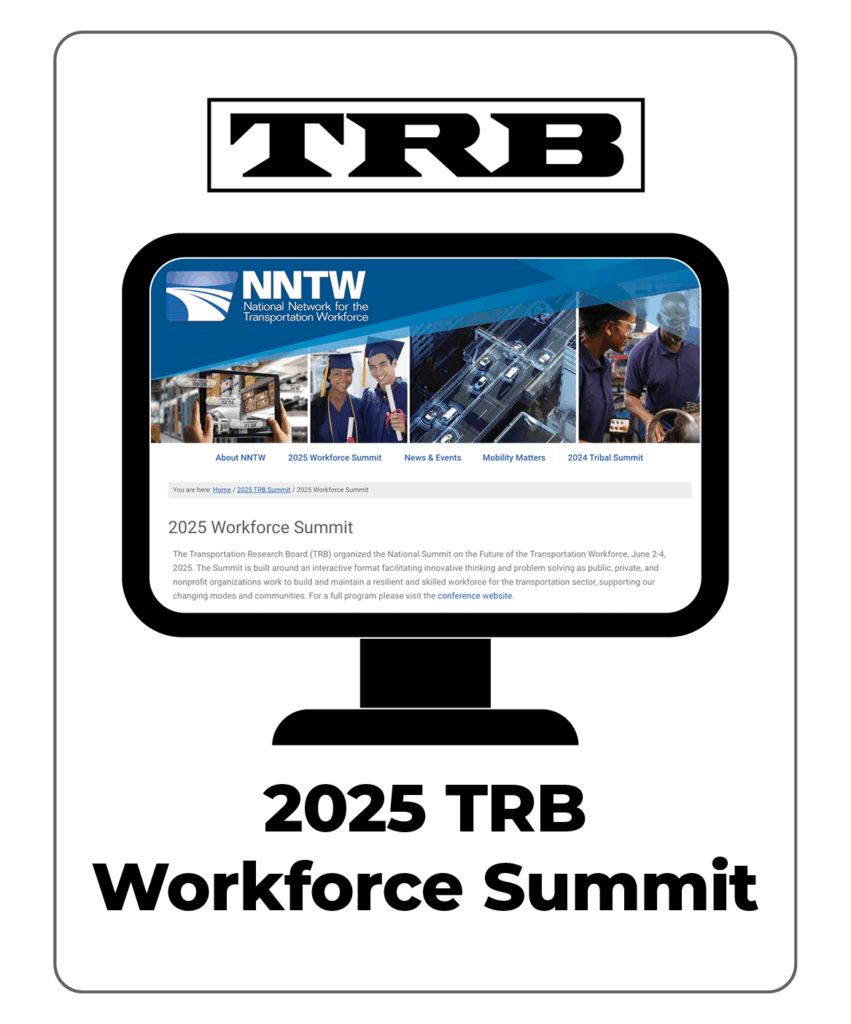
2025 TRB Workforce Summit
The Transportation Research Board (TRB) organized the National Summit on the Future of the Transportation Workforce, June 2-4, 2025. The Summit is built around an interactive format facilitating innovative thinking and problem solving as public, private, and nonprofit organizations work to build and maintain a resilient and skilled workforce for the transportation sector, supporting our changing modes and communities. This landing page provides links to pre-conference webinars and briefing papers from summit sessions.
Transportation Research Board
June 2025
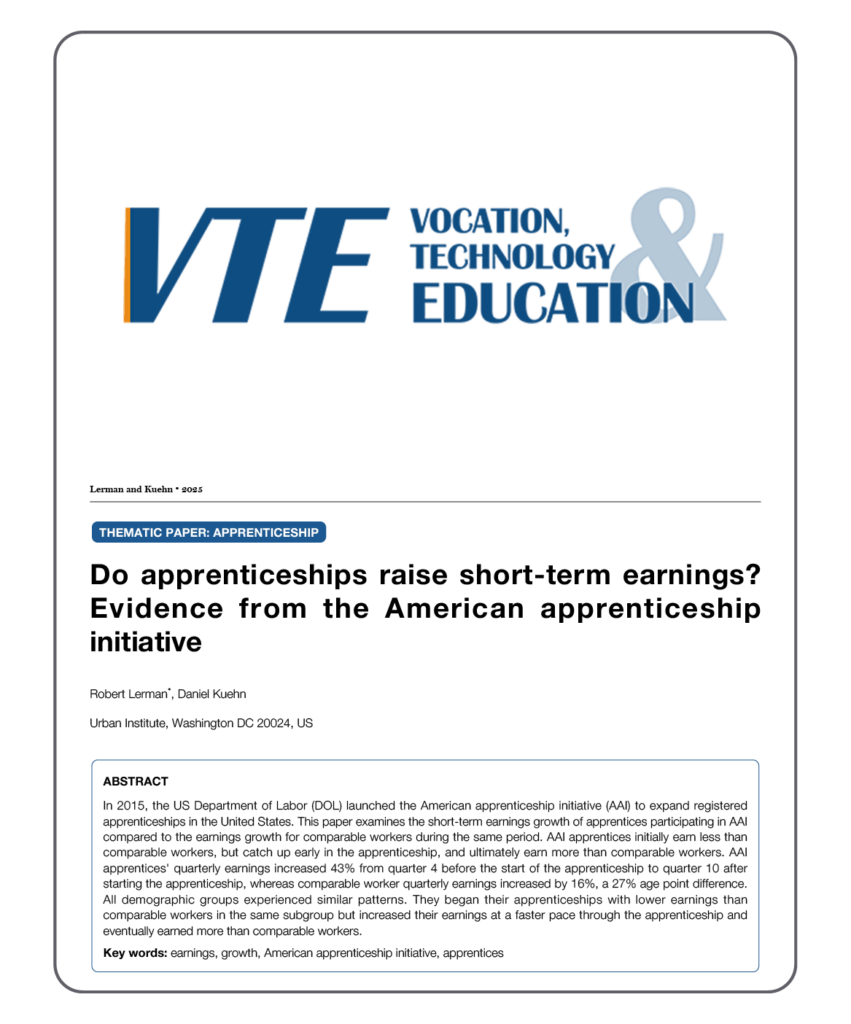
Do apprenticeships raise short-term earnings? Evidence from the American apprenticeship initiative
Vocat Tech Edu.
May 2025
TOPICS: Apprenticeship , Career Pathways , Community Engagement , Policy and Planning
This paper examines the short-term earnings growth of apprentices participating in the American apprenticeship initiative (AAI) compared to the earnings growth for comparable workers during the same period. Researchers found that AAI apprentices initially earn less than comparable workers, but catch up early in the apprenticeship, and ultimately earn more than comparable workers.
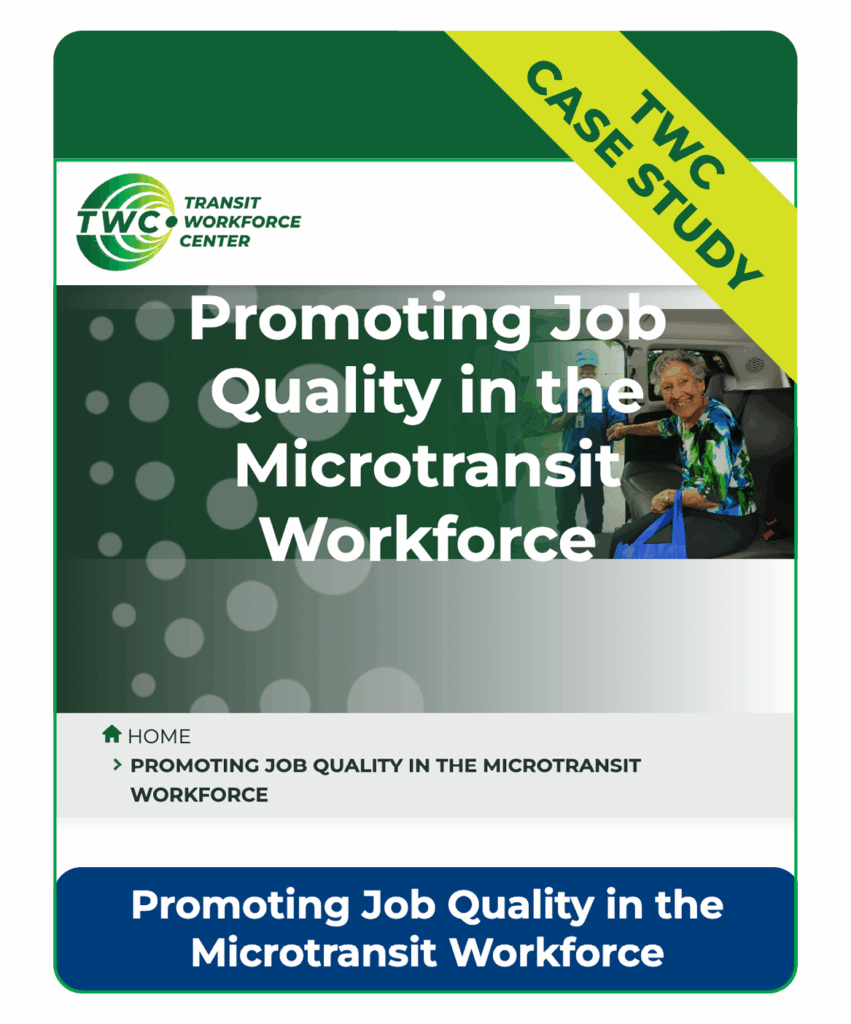
Case Study: Promoting Job Quality in the Microtransit Workforce
Microtransit, a relatively new form of demand response public transportation, is on the rise. TWC’s new set of microtransit case studies provides various perspectives on microtransit that include examples of how it has successfully been provided in-house and with a union-represented workforce. The case studies share experiences from four transit locations that are implementing microtransit service in ways that promote job quality for operators, technicians, and others, while also providing greater control over the quality of the service.
Transit Workforce Center
May 2025
TOPICS: Career Pathways , Hiring and Recruitment , Policy and Planning , Retention , Training
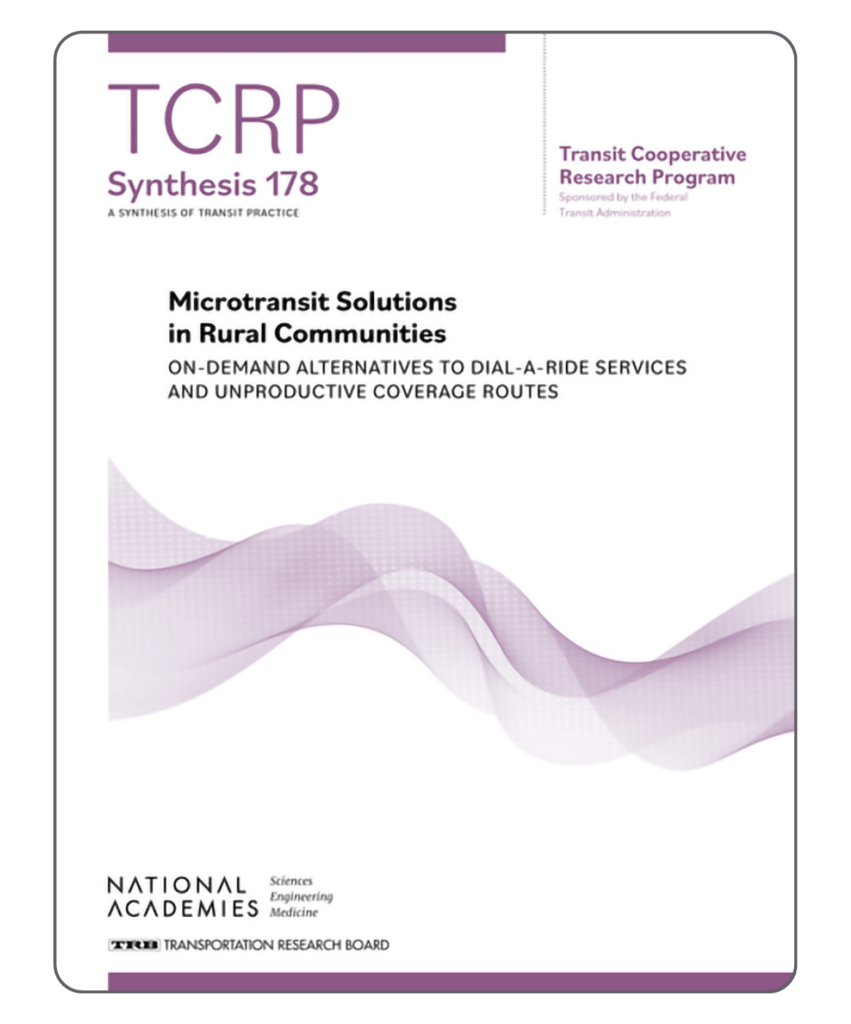
Microtransit Solutions in Rural Communities
TCRP Synthesis 178: Microtransit Solutions in Rural Communities: On-Demand Alternatives to Dial-a-Ride Services and Unproductive Coverage Routes provides a comprehensive overview of rural microtransit operations through a literature review, surveys of 19 transit providers, and case examples of seven agencies.
Transit Cooperative Research Program
May 2025
TOPICS: Policy and Planning
Contributor(s): National Academies of Sciences, Engineering, and Medicine; Transportation Research Board; Transit Cooperative Research Program; Alanna McKeeman; Jessica Klion; Laura Duke
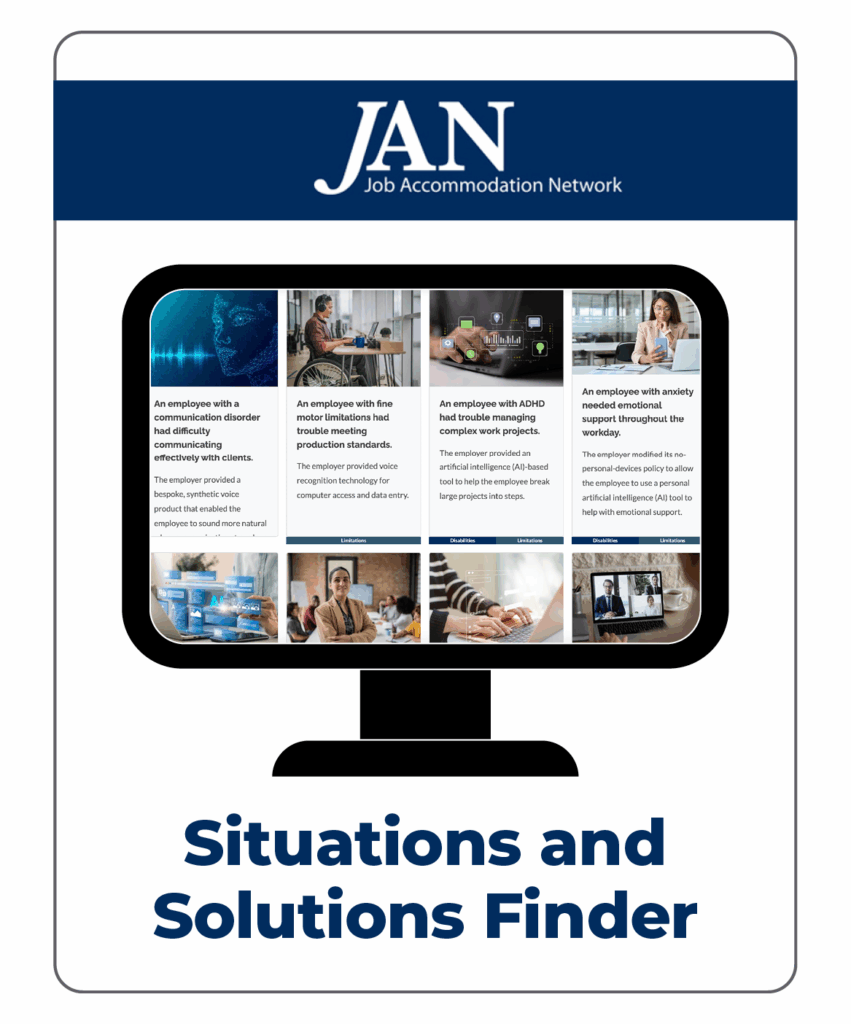
Situations and Solutions Finder
The Situations and Solutions Finder offers a library of workplace accommodation scenarios for industries, such as transportation (e.g., bus drivers, mechanics, dispatchers, etc.) to support workers with disabilities (by disability type, limitations, and occupation). The situations and solutions included are examples of accommodations that were made by JAN customers. Because accommodations are made on a case-by-case basis, these examples may not be effective for every individual or workplace but offer ideas about the types of accommodations that may be possible.
Job Accommodation Network
TOPICS: Community Engagement , Policy and Planning , Safety and Health
The Job Accommodation Network provides free, expert, and confidential assistance on work accommodations for employers, workers and job seekers with disabilities, and all others in industries, such as transportation.
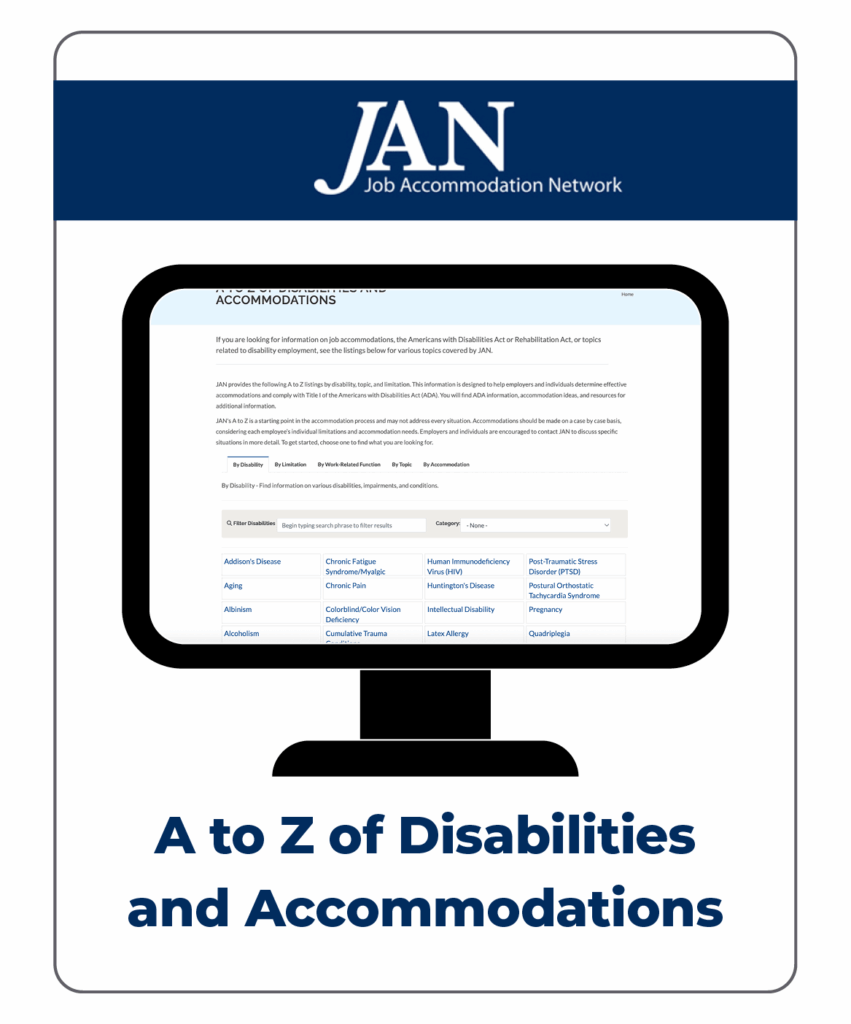
A to Z of Disabilities and Accommodations
The A to Z Library of Disabilities and Accommodations presents information on many common work accommodations, which is sortable by disability, work limitation, work function, and accommodation type and issue. This information is designed to help employers and individuals determine effective accommodations and comply with Title I of the Americans with Disabilities Act (ADA). You will find ADA information, accommodation ideas, and resources for additional information.
Job Accommodation Network
TOPICS: Community Engagement , Policy and Planning , Safety and Health
The Job Accommodation Network (JAN) provides free, expert, and confidential assistance on work accommodations for employers, workers and job seekers with disabilities, and all others in industries, such as transportation.
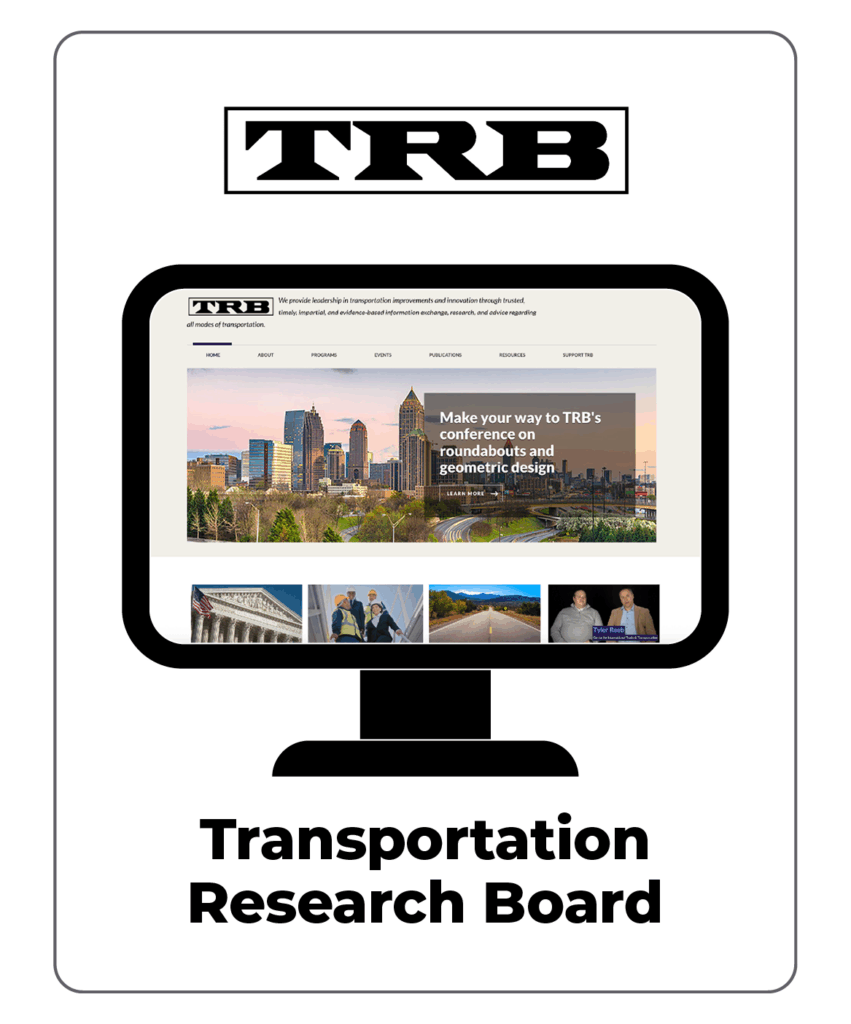
Transportation Research Board
As part of the National Academies of Sciences, Engineering, and Medicine, the Transportation Research Board (TRB) mobilizes expertise, experience, and knowledge to anticipate and solve complex transportation-related challenges. TRB hosts an extensive number of transportation-related committees, including the Committee on Workforce Development and Organizational Excellence, Committee on Transit Management and Performance, Committee on Bus Transit Systems, Committee on Transit Safety and Security, Committee on Transit Data, and others. TRB sponsors research projects though different programs, including the Transit Cooperative Research Program. Published research reports can be found on the National Academies website. TRB also convenes an Annual Meeting with thousands of representatives across the transportation industry to highlight new research, best practices, and more.
Transportation Research Board
TOPICS: Policy and Planning
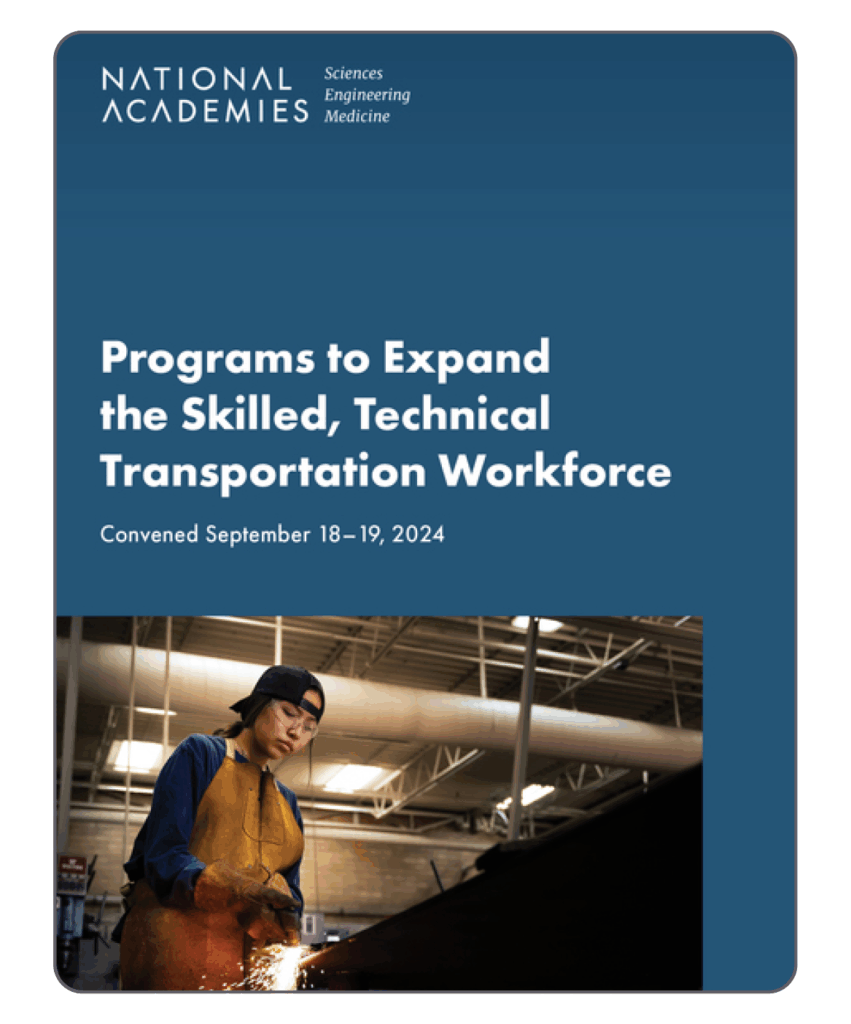
Programs to Expand the Skilled, Technical Transportation Workforce
Programs to Expand the Skilled, Technical Transportation Workforce: Proceedings of a Workshop summarizes the Workforce held in September 2024 at the National Academies of Sciences Building in Washington, DC. The workshop was sponsored by the Federal Transit Administration and the National Science Foundation and brought together experts and educators across academia, government, and industry.
National Academies of Sciences Engineering and Medicine
March 2025
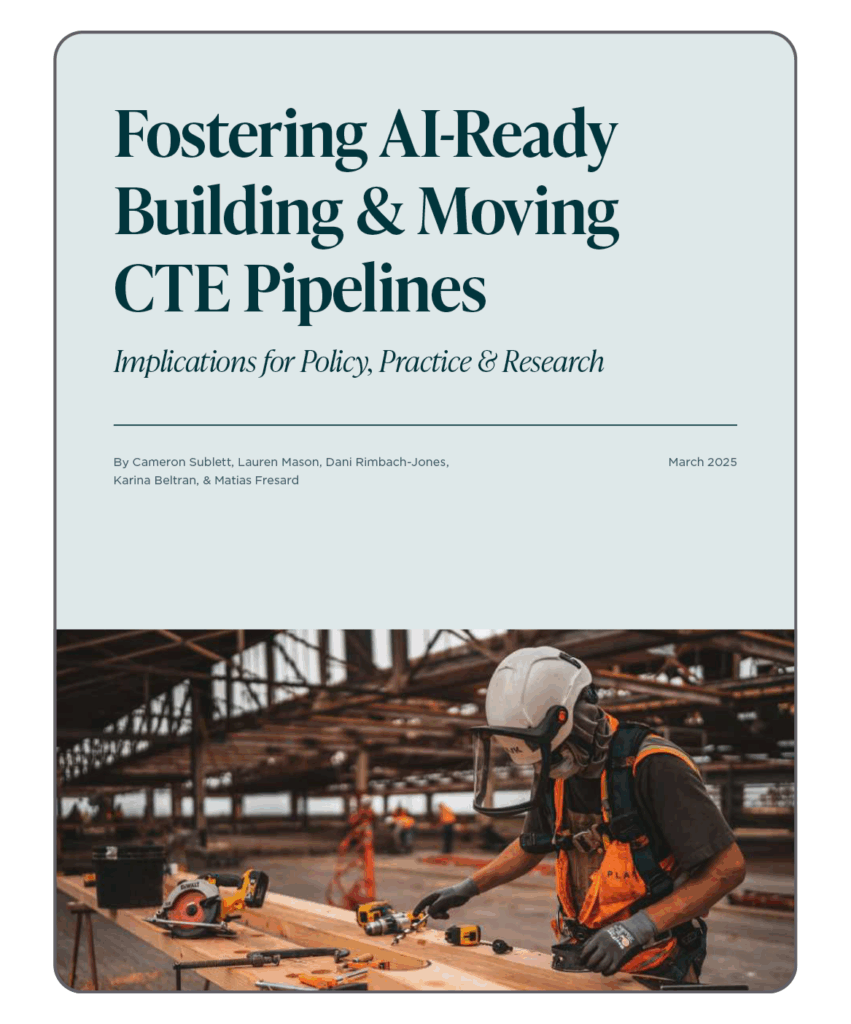
Fostering AI-Ready Building & Moving CTE Pipelines
This report explores how current and projected developments in AI are revolutionizing building and moving occupations, the potential exposure of building and moving occupations to AI-driven workforce automation, and how building and moving career and technical education providers can prepare their learners for a workplace increasingly shaped by AI technologies.
Advance CTE
March 2025
TOPICS: Career Pathways , Policy and Planning , Retention , Training
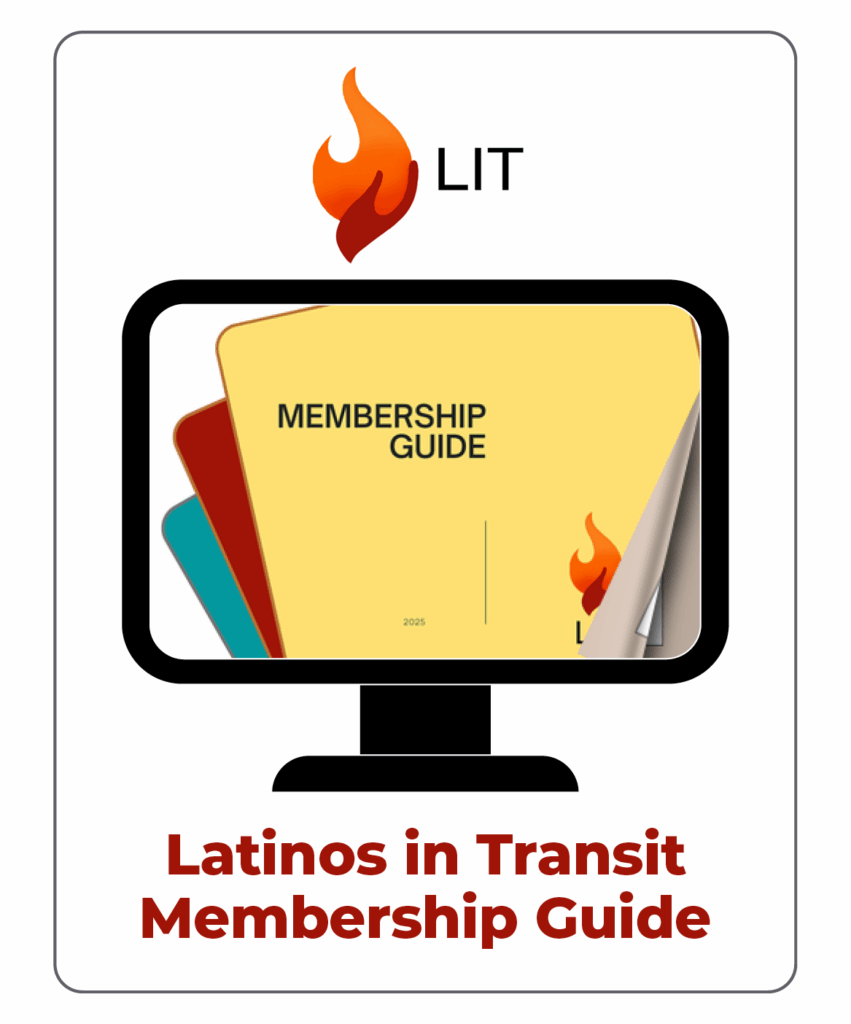
Latinos in Transit Membership Guide
Latinos in Transit is committed to empowering professionals in the transit industry to achieve leadership roles by advancing opportunities for workforce development, mentorship, networking, and education. The LIT Membership Guide explains membership levels and benefits, as well as programming, access, participation, opportunities, and more.
Latinos in Transit
TOPICS: Career Pathways , Community Engagement , Policy and Planning
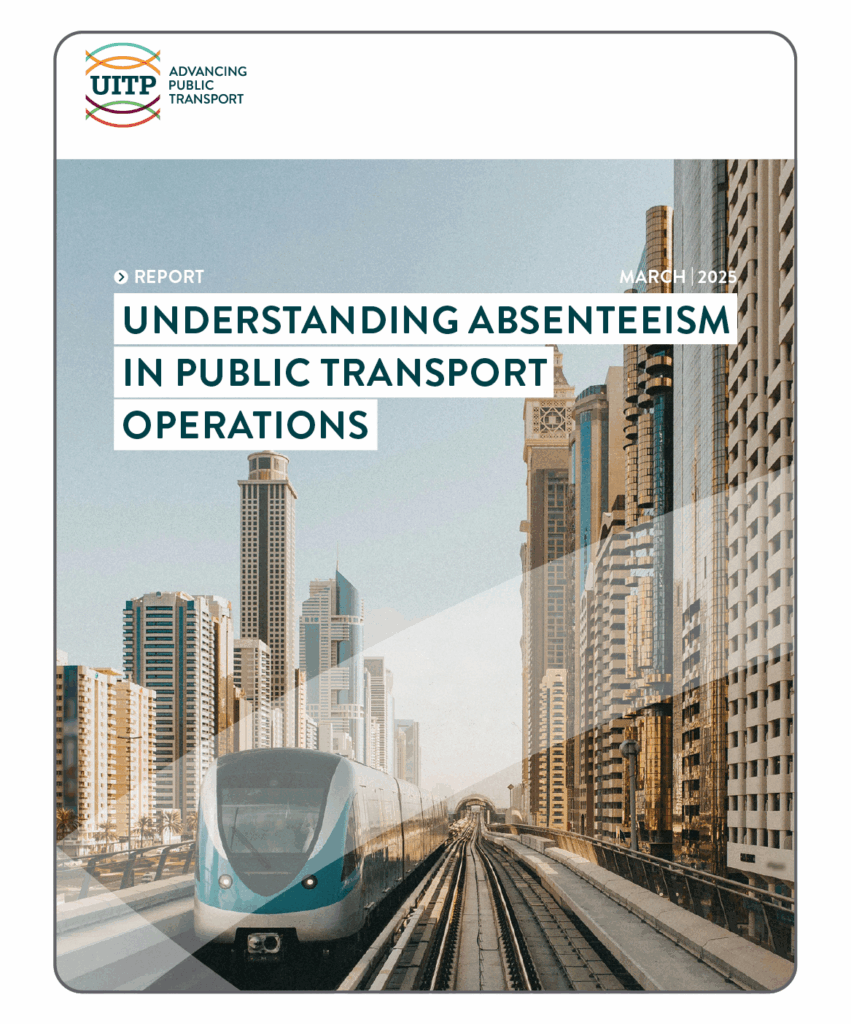
Understanding Absenteeism in Public Transport Operations
Absenteeism has been a persistent problem that can directly impact an organization’s ability to meet the demands of providing service. Factors such as operator job satisfaction, the attractiveness of the profession to current and future workers, and the evolving attitudes towards work all contribute to absenteeism playing a role in workforce availability. Several APTA members participated in a global study on operator absenteeism. The result is a report which aims to describe the causes and impact of absenteeism, while identifying action plans that organizations can use to address the issue. This report was developed by the International Association of Public Transport (UITP).
American Public Transportation Association
February 2025
TOPICS: Policy and Planning , Retention , Workforce Shortage
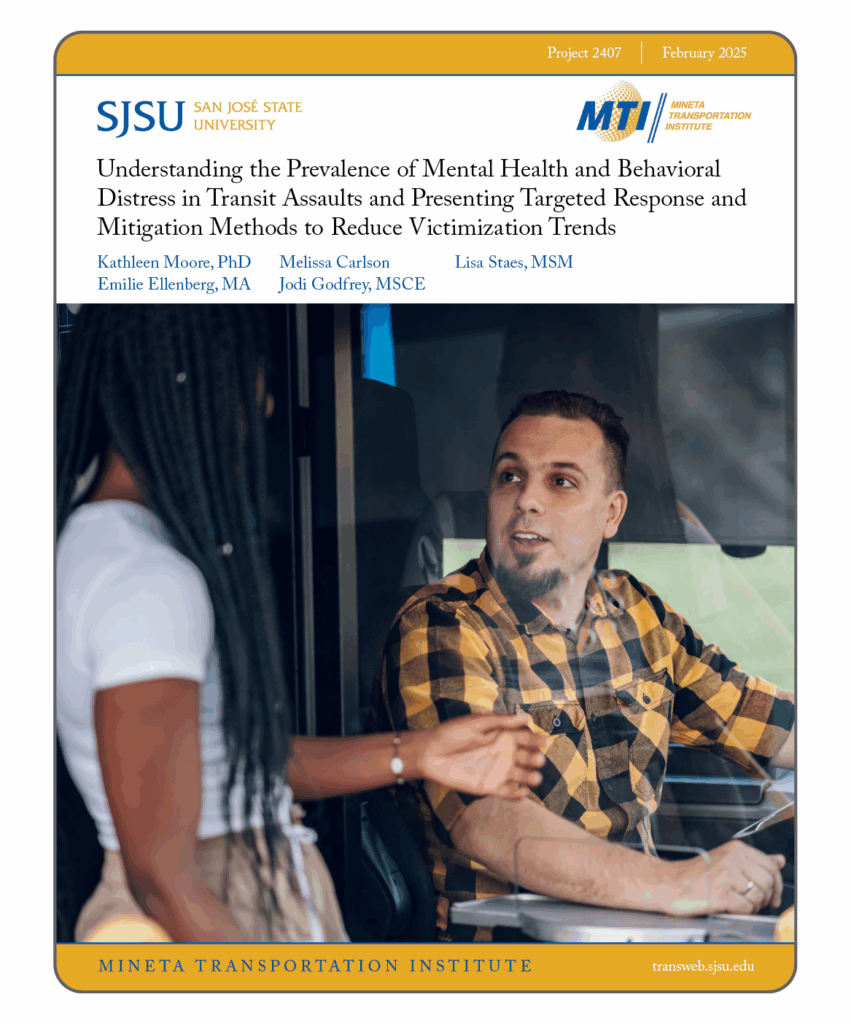
Understanding the Prevalence of Mental Health and Behavioral Distress in Transit Assaults
Mineta Transportation Institute
February 2025
TOPICS: Policy and Planning , Retention , Safety and Health
Understanding the Prevalence of Mental Health and Behavioral Distress in Transit Assaults and Presenting Targeted Response and Mitigation Methods to Reduce Victimization Trends
This research aims to better understand the prevalence of mental health and behavioral distress in transit assaults and present corresponding targeted response and mitigation methods to reduce victimization trends. It includes a literature review, a data presentation and overview of reported public transit assault-related events, an examination of the contributing factors to those events, and documentation of 10 transit agency case studies. It discusses various approaches and strategies that transit agencies have used to prepare transit vehicle operators and other frontline workers to better recognize mental health presentations and engage appropriately. It also highlights evidence-based practices that transit agencies can use to better prepare their systems and provide tools employees can use to better communicate with individuals who may be having mental health-related episodes. The research team gathered additional data from case study sites, including the methods used to address assault-related challenges and the successful community engagement and partnerships. The report provides findings and policy and practice recommendations.
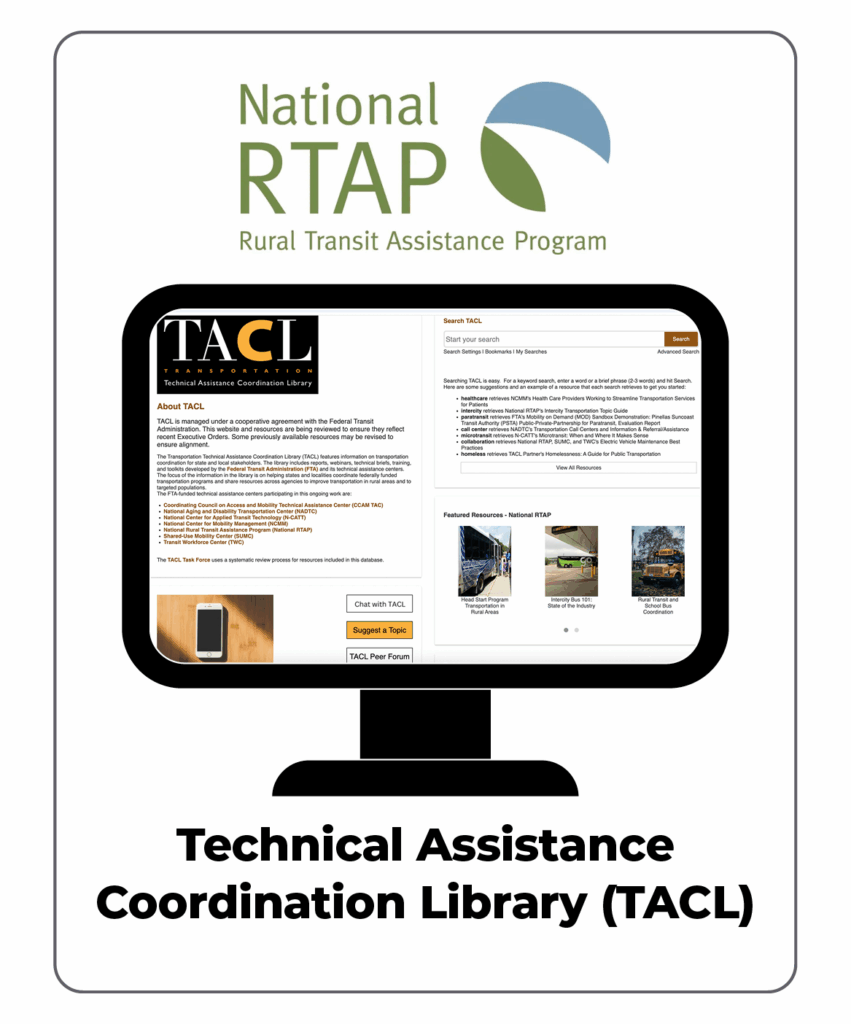
Technical Assistance Coordination Library (TACL)
National Rural Transit Assistance Program
TOPICS: Apprenticeship , Career Pathways , Community Engagement , Hiring and Recruitment , Labor-Management Partnerships , Low-No , Mentorship , Policy and Planning , Procurement , Program Evaluation and ROI , Retention , Safety and Health , Trainer and Mentor Development , Training , Workforce Shortage
Transportation Technical Assistance Coordination Library (TACL)
The Transportation Technical Assistance Coordination Library (TACL) provides a viable methodology and platform for access and findability of rural and tribal transit coordination resources across a broad range of transportation technical assistance centers and the Federal Transit Administration (FTA).
The FTA-funded Technical Assistance (TA) Centers participating in this ongoing work are:
- National Aging and Disability Transportation Center (NADTC)
- National Center for Applied Transit Technology (N-CATT)
- National Center for Mobility Management (NCMM)
- National Rural Transit Assistance Program (National RTAP)
- Shared Use Mobility Center (SUMC)
- Transit Workforce Center (TWC)
The TACL Task Force uses a systematic review process for resources included in the database. New resources will be added on a quarterly basis. Let us know if you would like to serve as a peer reviewer for our resources.
Why was TACL created?
The United States Government Accountability Office (GAO) published Public Transportation: Enhanced Federal Information Sharing on Coordination Could Improve Rural Transit Services in January 2020. GAO recommended that FTA “develop a communication plan that will effectively share information with state and local stakeholders on coordination opportunities in an accessible and informative way.” This effort was created to improve interagency resource coordination between FTA and its five TA Centers.
How can TACL be used?
TACL resources can be used to identify high quality technical assistance on transportation coordination. The resources can be used for research, training, practice, operations, planning, and other purposes. We encourage authors to cite TACL resources.
Ready to get started?
Visit http://transportation-tacl.org. Click on the Training tab at the top for instructions.
If you have a question about TACL, or if you would like to be considered to become a TACL peer reviewer, please contact info@nationalrtap.org
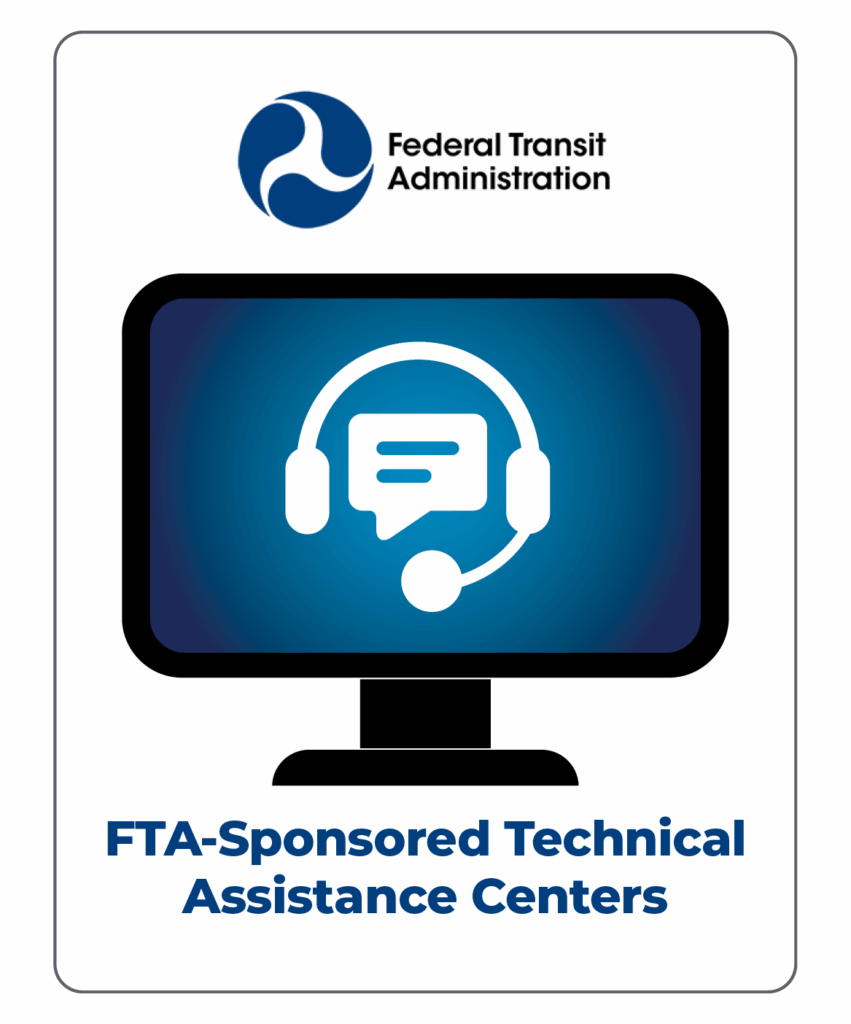
FTA-Sponsored Technical Assistance Centers
Federal Transit Administration
TOPICS: Apprenticeship , Career Pathways , Community Engagement , Hiring and Recruitment , Labor-Management Partnerships , Low-No , Mentorship , Policy and Planning , Procurement , Program Evaluation and ROI , Retention , Safety and Health , Trainer and Mentor Development , Training , Workforce Shortage
FTA’s Technical Assistance and Workforce Development Program (49 U.S.C. § 5314) and the Public Transportation Innovation Program (49 U.S.C. § 5312) fund technical assistance centers through national nonprofit organizations across a number of areas to improve public transportation. These nonprofit partners and the work they do play a critical role in supporting public transit agencies. Their services help to:
- Improve transportation for older adults and people with disabilities
- Drive the adoption of mobility management and related promising practices
- Accelerate innovative mobility practices and strategies
- Support rural communities
- Leverage new transit technologies
- Train the public transit workforce
- Provide workforce development technical assistance
- Support research projects chosen by the transit industry that address day to day issues
- Support the transit industry meet safety regulations
National Center for Applied Transit Technology (N-CATT)
The National Center for Applied Transit Technology (N-CATT) delivers expert, focused technical assistance to transit agencies and organizations in rural areas and small cities to use or develop transit technologies and innovations that make services more cost-effective and efficient. N-CATT’s work supports FTA’s mission and focus on innovation by developing and supporting transit programs and services in rural and small-city America.
National Aging and Disability Transportation Center (NADTC)
The National Aging and Disability Transportation Center (NADTC) is a national technical assistance center funded by FTA with guidance from the U.S. Department of Health and Human Services’ Administration for Community Living to promote the availability of transportation options that serve the needs of people with disabilities, seniors and caregivers with a focus on the Section 5310 program and other transit investments. NADTC supports the delivery of more effective, efficient, high-quality and coordinated specialized transportation services that maximize federal investments. NADTC provides technical assistance, information and referral; develops field training; implements interactive communication and outreach strategies; and supports communities in assessing their needs and developing innovative transportation solutions.
National Rural Transit Assistance Program (National RTAP)
The National Rural Transportation Assistance Program (RTAP) was established by FTA in 1987 to provide a wide range of professional services and products. National RTAP addresses the training and technical assistance needs of rural and tribal transit programs across the nation and supports state RTAP programs. National RTAP provides comprehensive free technical assistance programs and resources including training materials, webinars, newsletters and technical briefs, peer resources, research, and innovative technology initiatives. The National RTAP also manages the Transportation Technical Assistance Coordination Library (TACL), which provides a sustainable methodology and platform to access resources across a diverse range of transportation technical assistance centers and FTA.
Shared-Use Mobility Center (SUMC)
The Shared-Use Mobility Center is a public-interest organization dedicated to achieving equitable, affordable, and environmentally sound mobility across the US through the efficient sharing of transportation assets. By connecting the public and private sectors, piloting programs, conducting new research, and providing policy and technical expertise to cities and regions, SUMC seeks to extend the benefits of shared mobility for all. The Shared Mobility 2030 Action agenda includes improving access to public transit, on-demand shuttles or buses, ride-on-demand services, carpooling and vanpooling, and carsharing, bikesharing and scooter-sharing.
Coordinating Council on Access and Mobility (CCAM)
The strategic goal of CCAM, operated but the Community Transportation Association of America, is to support federal agencies, their grantees, partners, and stakeholders in improving transportation access for people with disabilities, older adults, and individuals of low income. CCAM promotes and facilitates human services transportation, public transit, and non-emergency medical transportation (NEMT) coordination that advances people’s access to everyday destinations.
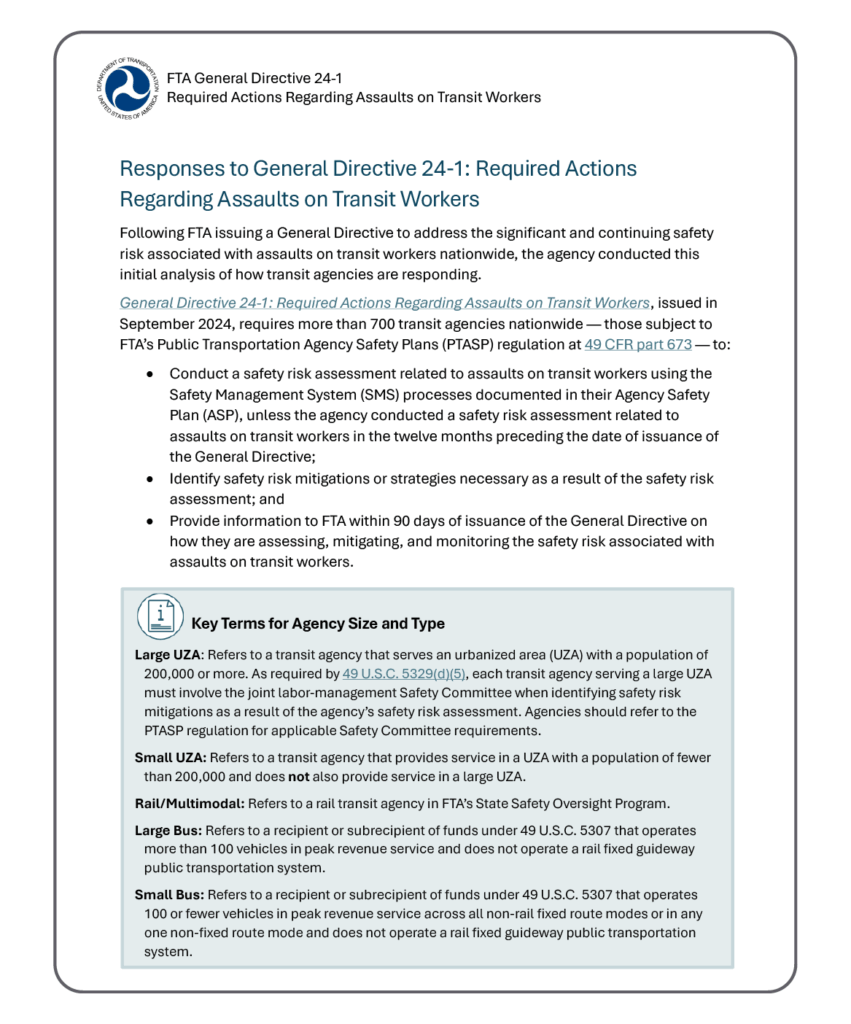
Responses to General Directive 24-1: Required Actions Regarding Assaults on Transit Workers
FTA published Responses to General Directive 24-1: Required Actions Regarding Assaults on Transit Workers. FTA’s initial analysis of agency responses shows more than two-thirds of transit agencies determined that safety risk mitigations are necessary to reduce the risk of assaults on transit workers, and these agencies are working to roll out a variety of mitigation measures.
Federal Transit Administration
January 2025
TOPICS: Policy and Planning , Safety and Health
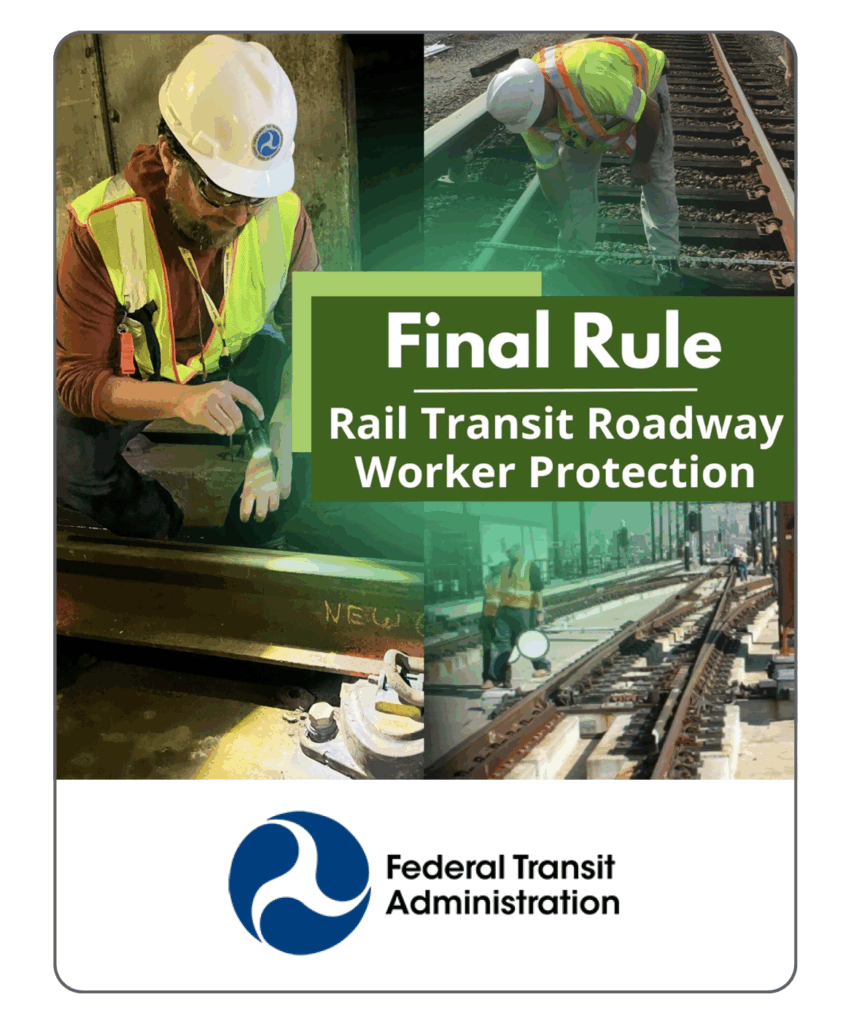
Rail Transit Roadway Worker Protection
The Rail Transit Roadway Worker Protection (RWP) regulation establishes minimum standards to ensure the safe operation of public transportation systems and prevent injuries and fatalities for transit workers. Rail transit agencies nationwide are required to create programs and processes that focus on safety for workers who work on or near the rails in an area known as the track roadway. This page explains the regulation, answers frequently answered questions, and provides additional resources.
Federal Transit Administration
January 2025
TOPICS: Policy and Planning , Safety and Health , Training
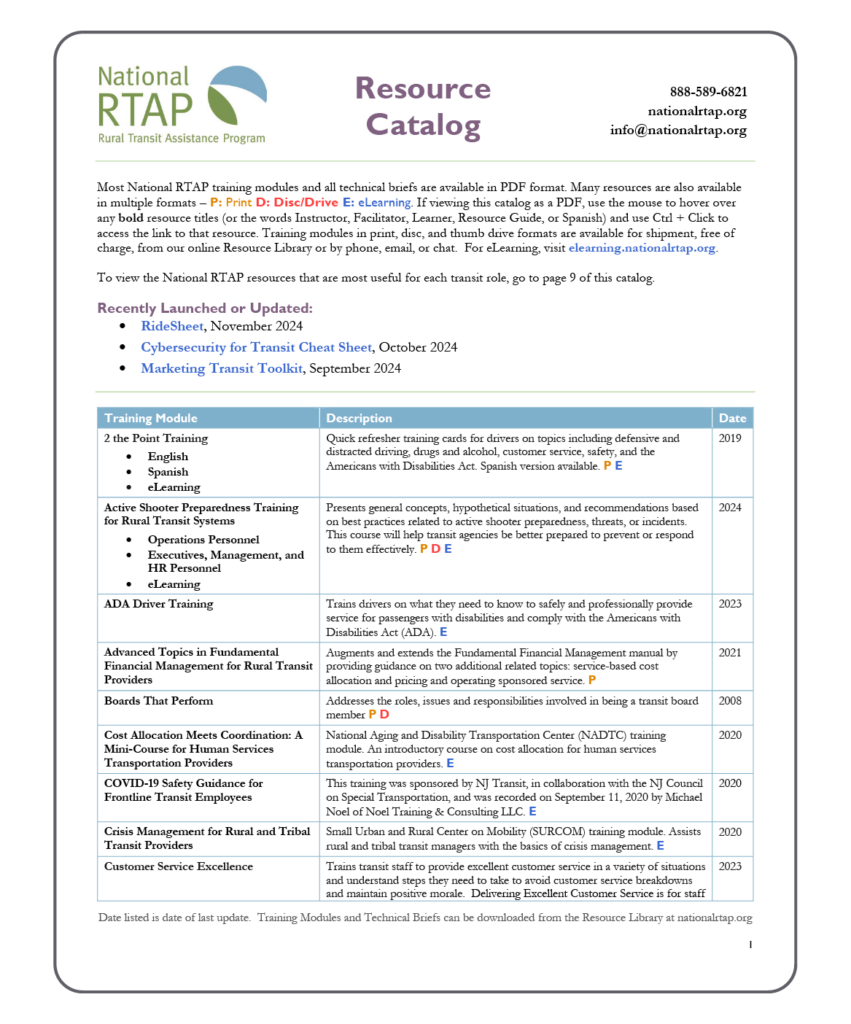
National RTAP Resource Catalogue
The National Rural Transit Assistance Program (National RTAP) aims to address the training and technical assistance needs of rural and tribal transit operators across the nation. They provide free technical assistance programs and resources including training materials, webinars, newsletters and technical briefs, peer resources, research, and innovative technology initiatives. This Resource Catalogue details all products available for ordering or online use.
National RTAP
TOPICS: Policy and Planning , Safety and Health , Training
Check out some trainings that may be most useful for transit frontline workers:
- Safety
- Active Shooter Preparedness Training for Rural Transit Systems
- COVID-19 Safety Guidelines for Frontline Transit Employees
- Emergency Procedures for Rural Transit Drivers
- Problem Passengers: Managing Difficult Passengers & Situations
- START (Safety Training & Rural Transit) Training
- Substance Abuse Awareness Training for Employees
- Transit and Human Trafficking
- Drivers/Dispatchers
- 2 the Point Training (available in Spanish)
- ADA Driver Training
- Customer Service Excellence
- Customer Service for Rural and Tribal Transit Providers
- Dispatching and Scheduling Training for Rural Transit Systems
- Essential Skills for Trainers
- Essential Spanish for Rural Transit
- HR
- HR Training Shorts on Employee Recognition, Interview Questions, Onboarding, and Performance Appraisals
Check out some technical briefs and toolkits relevant to the frontline transit workforce:
- Safety
- Coronavirus Disease 2019 (COVID-19): Information and Resources for Transit
- Healthy Habits: Reducing Stress and Fatigue and Increasing your Energy
- Incident and Injury Report Form
- Responding to Transit Incidents
- Seasonal Flu: Information and Resources
- Substance Abuse Awareness Training, Testing, and Compliance
- Threat and Vulnerability Toolkit
- Trainers
- Bus Roadeo Toolkit
- Training Adult Learners: How to Reach and Engage Your Audience
- Drivers/Dispatchers
- Customer Service in Rural Transit: How to Identify and Meet Customer Needs
- Emergency Response Checklist: After Normal Operating Hours & Emergency Response Checklist: During Normal Operating Hours
- Entry-Level Driver Training Requirements
- Essential Spanish for Rural Transit
- Mobile Driver Training Simulators
- HR
- Applying Good Business Practices: Hiring, Training and Evaluating Employees
Offerings as of January 2025
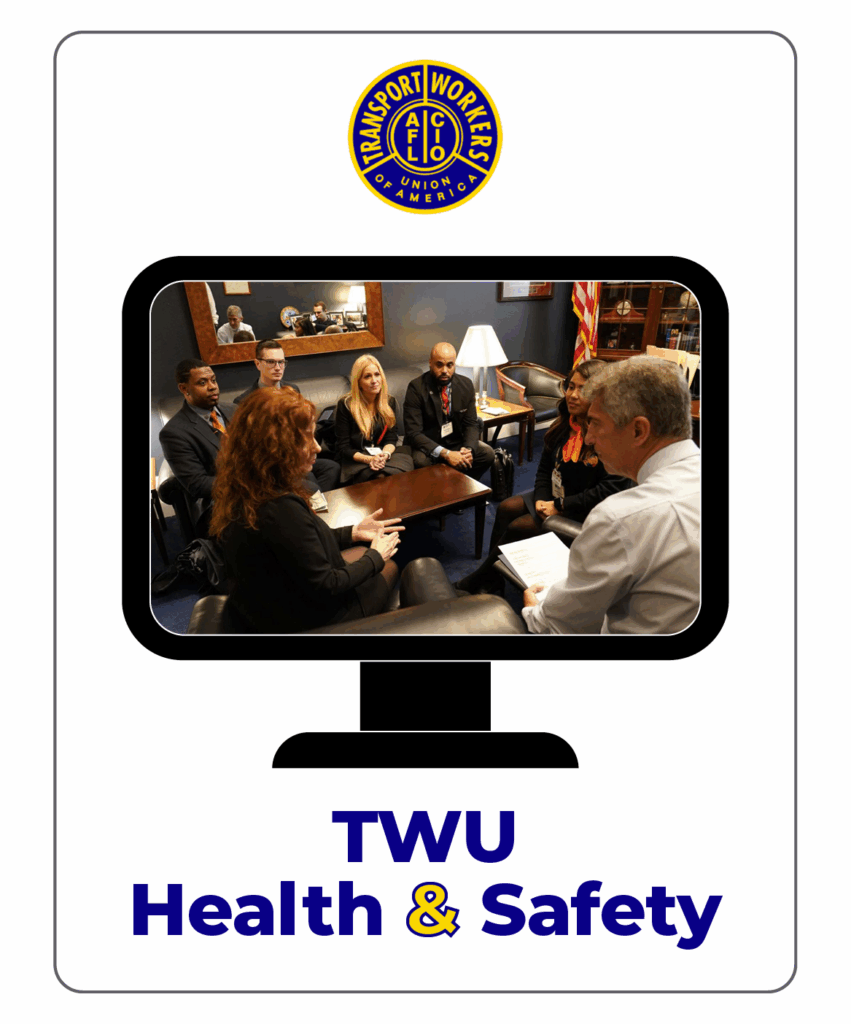
TWU Health & Safety
This page offers various health and safety resources for transportation workers, including COVID-19 guidance, regulatory information, tips for working in extreme weather, and links to trainings and other resources.
TWU International
TOPICS: Policy and Planning , Safety and Health
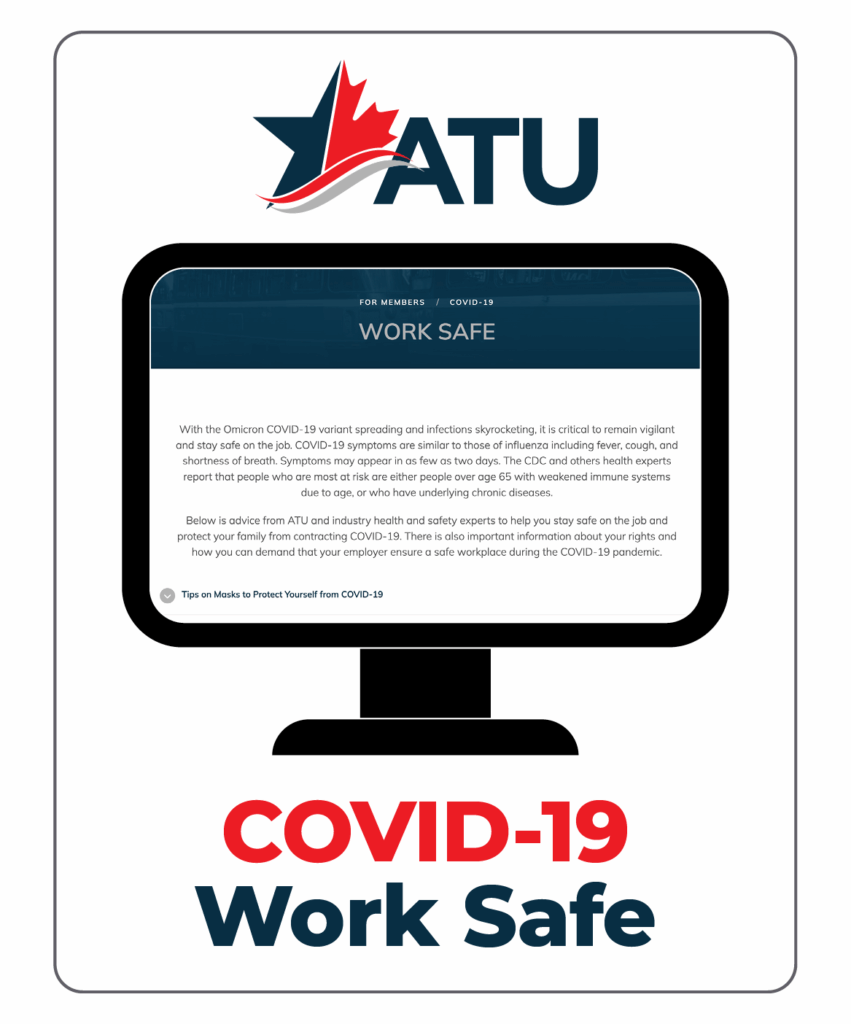
COVID-19 Work Safe
This page highlights resources from from ATU and industry health and safety experts to help frontline workers stay safe on the job and protect their families from contracting COVID-19. It also includes important information about workers’ rights and how you can hold your employer accountable to ensure a safe workplace during the COVID-19 pandemic.
ATU International
TOPICS: Policy and Planning , Safety and Health
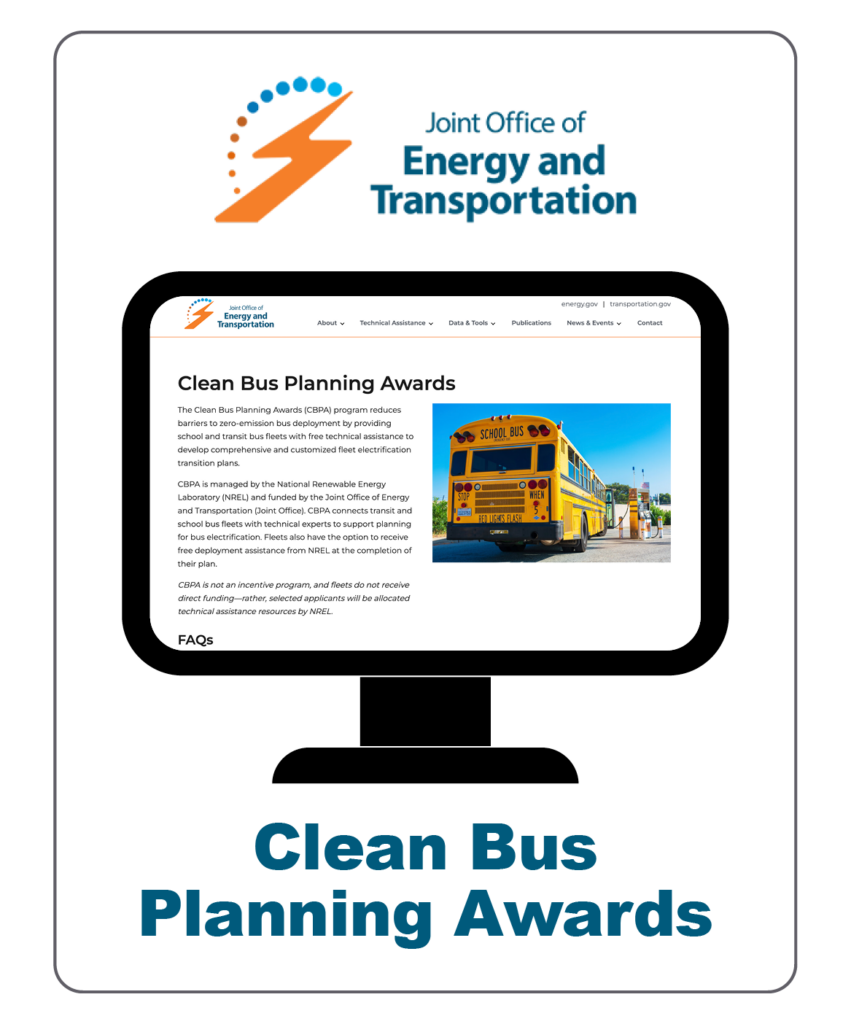
Clean Bus Planning Awards
The Clean Bus Planning Awards (CBPA) program reduces barriers to Low-No bus deployment by providing school and transit bus fleets with free technical assistance to develop comprehensive and customized fleet electrification transition plans. Applications may be submitted on a rolling basis.
National Renewable Energy Laboratory
TOPICS: Low-No , Policy and Planning
CBPA is not an incentive program, and fleets do not receive direct funding—rather, selected applicants will be allocated technical assistance resources by NREL.
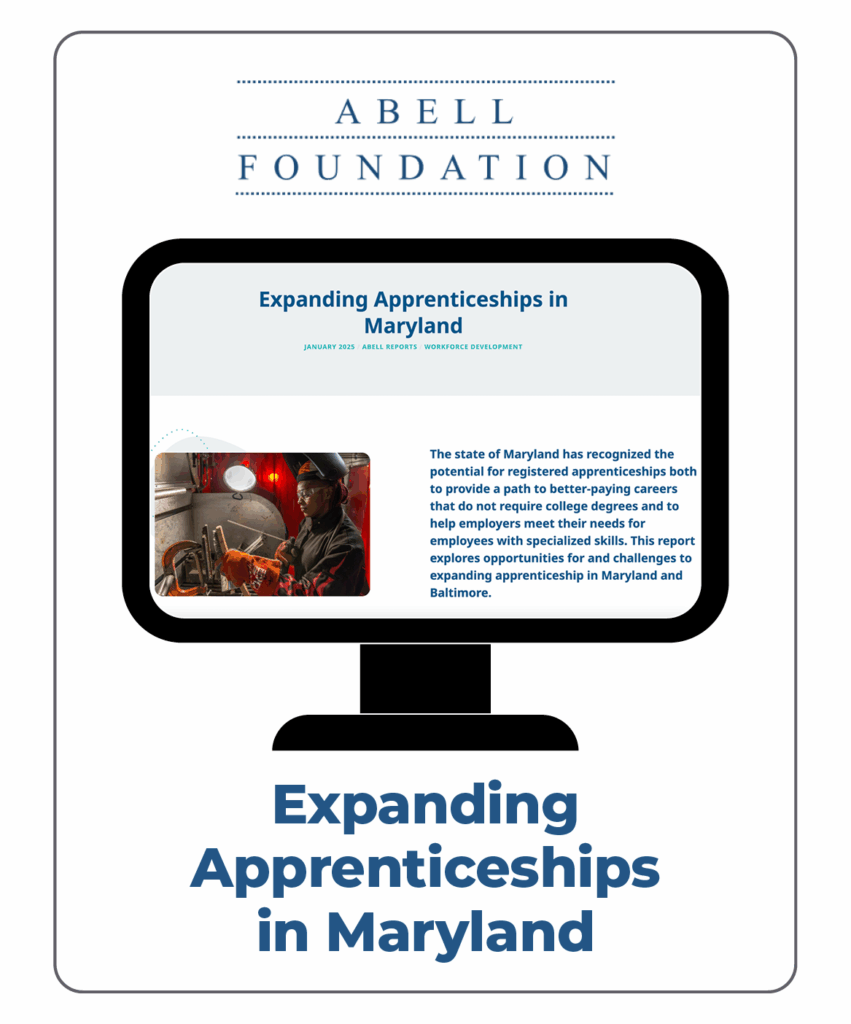
Expanding Apprenticeships in Maryland
The state of Maryland has recognized the potential for registered apprenticeships both to provide a path to better-paying careers that do not require college degrees and to help employers meet their needs for employees with specialized skills. This report explores opportunities for and challenges to expanding apprenticeship in Maryland and Baltimore.
Abell Foundation
January 2025
TOPICS: Apprenticeship , Career Pathways , Community Engagement , Policy and Planning
The report includes topics such as overcoming barriers to participation, such as transportation and childcare; countering employer misconceptions about apprenticeship; supporting apprenticeship in non-traditional sectors; and improving data collection and analysis.
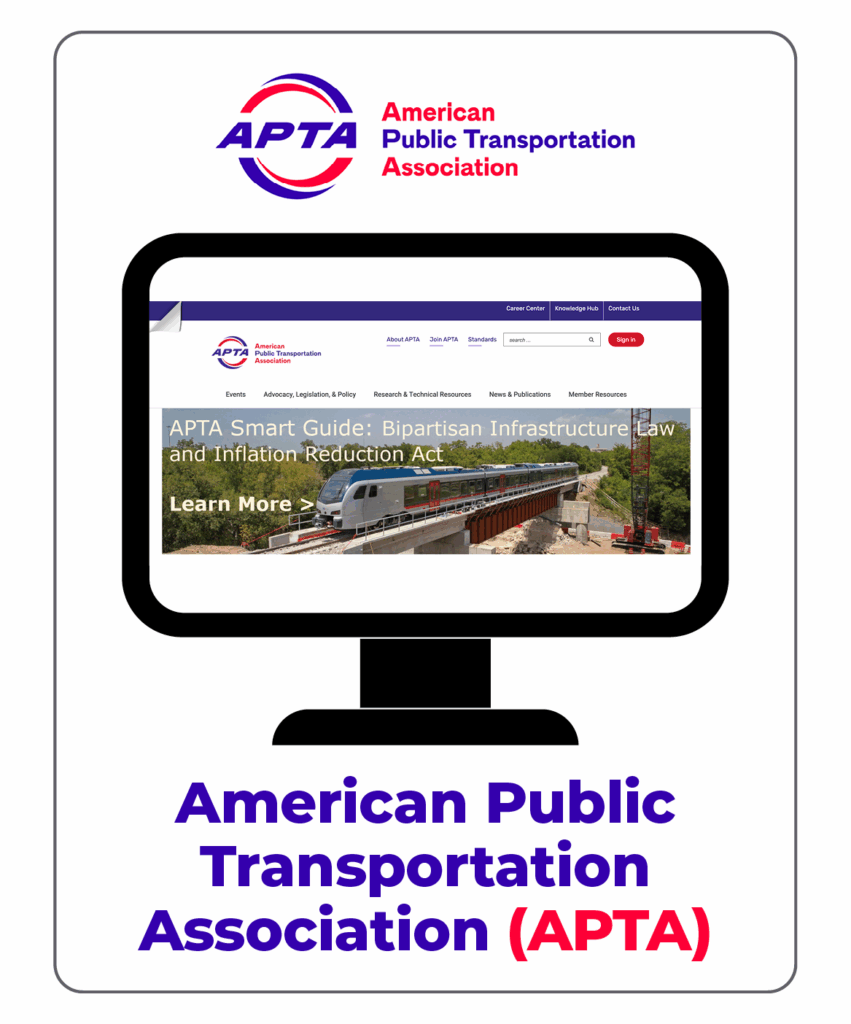
American Public Transportation Association (APTA)
APTA is a nonprofit international association of more than 1,500 public and private sector member organizations. Organizations must pay for membership; benefits include advocacy for federal funding and policies, research, technical expertise and consulting services, workforce development programs, educational conferences and seminars, and 135 subject-matter working committees, including a workforce development committee
American Public Transportation Association
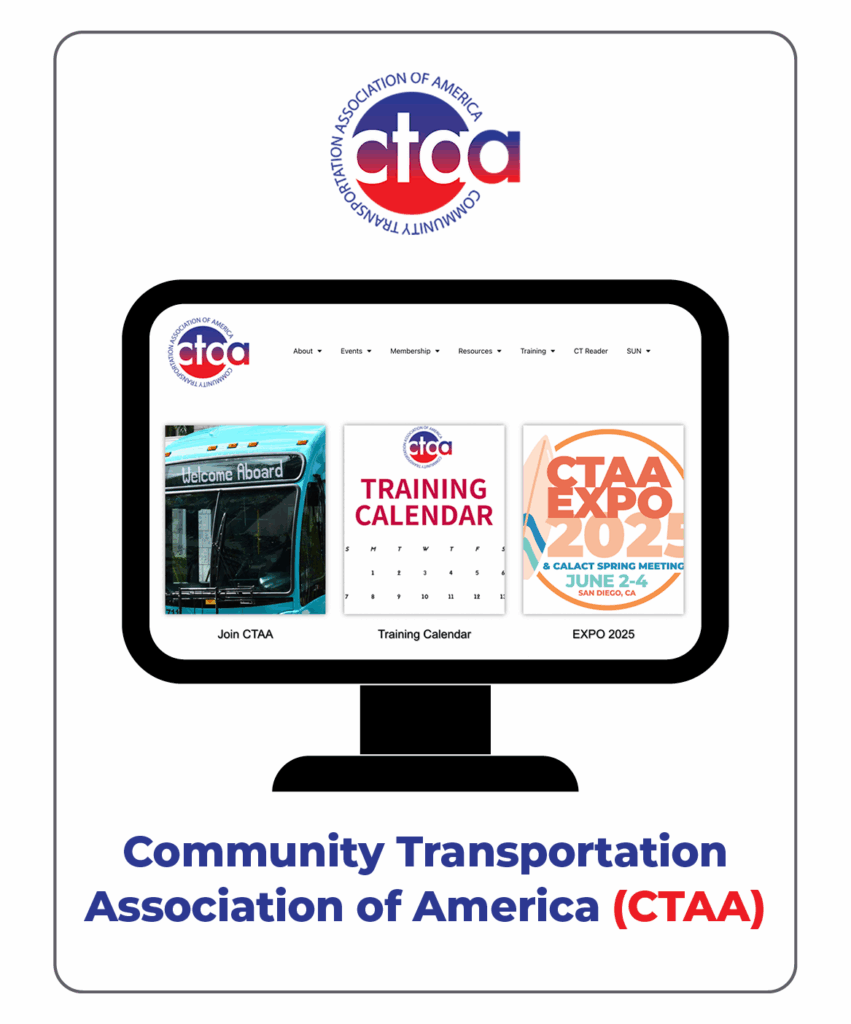
Community Transportation Association of America (CTAA)
CTAA is a nationally recognized expert in rural, small urban, tribal and specialized transportation services. Founded by a small group of community transportation professionals in 1989, organizations and individuals have joined CTAA as members to share strategies, receive training and certification specific to their needs, advance policy and legislative priorities, and improve mobility options in their communities.
Community Transportation Association of America
CTAA members get discounted access to all CTAA training and certification programs – including the annual Community Transportation EXPO and other CTAA Events – and help set the training and certification class agenda with opportunities to suggest and develop new courses and sessions.
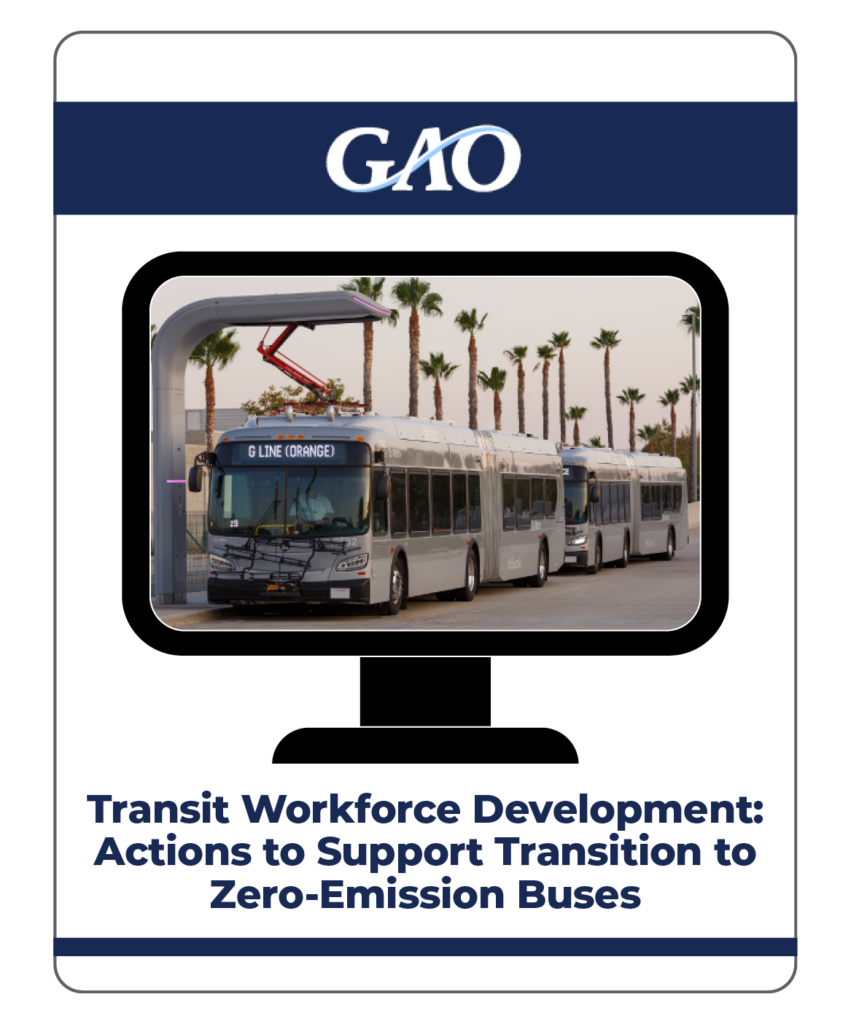
GAO Low-No Transition Report
U.S. Government Accountability Office
December 2024
After data analysis and expert interviews, GAO published this report which describes: (1) the status of transit agencies’ transition to low-no bus fleets and any challenges they may face meeting transition goals; (2) skill- and workforce-development needs of transit agencies and actions selected agencies are taking to address any workforce gaps; and (3) recommended FTA actions to assist transit agencies in preparing their workforces new fuel technologies.
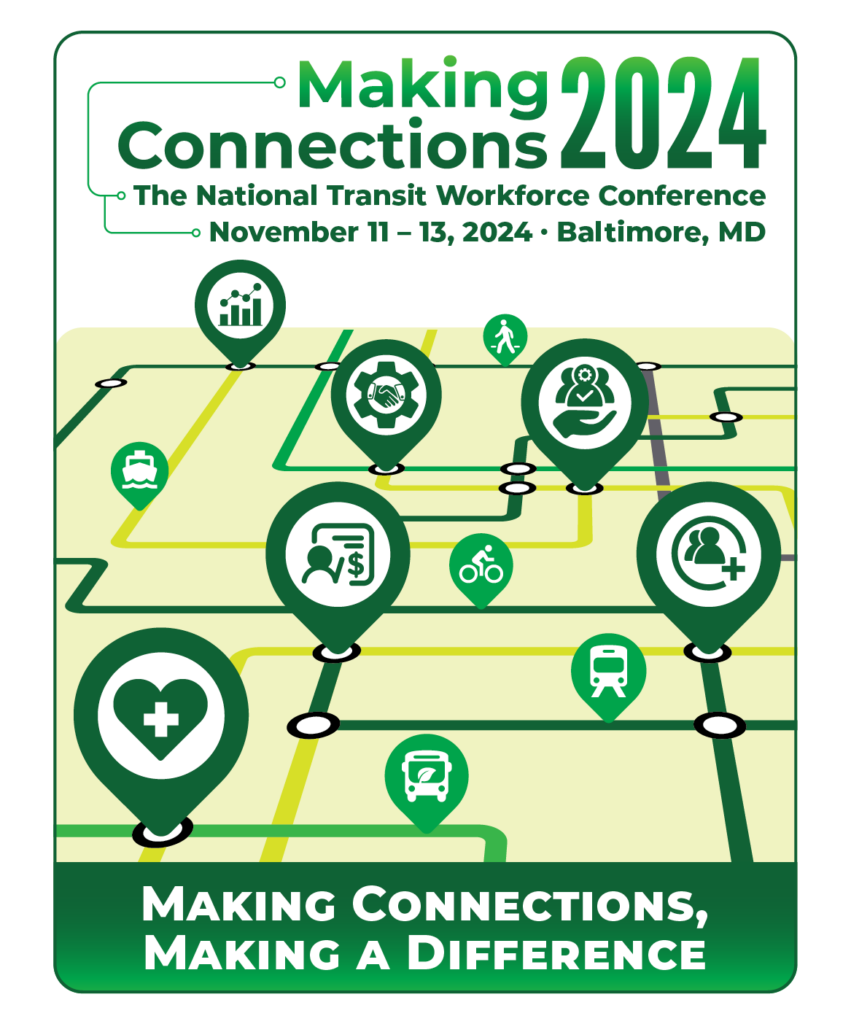
Making Connections 2024 – Workforce Data in Context – National Trends, Future Projections, and Implications for Transit Locations
This session about national and agency-level workforce datasets was presented as part of TWC’s Making Connections 2024 transit workforce conference in November, 2024.
Transit Workforce Center
November 2024
Session Description: Employment in public transportation is affected by broad economic and demographic dynamics, but honing in on transit workforce trends can be challenging. The Transit Workforce Center created the Transit Workforce Data Dashboard to distill relevant data points from national datasets. In this session, TWC highlighted specific employment patterns and challenges in transit-related occupations and panelists covered research and trends in national and agency-level datasets.
Moderator:
- Douglas Nevins: Senior Researcher – International Transportation Learning Center / Transit Workforce Center
Speakers:
- Dr. Asha Weinstein Agrawal: Director of Education – Mineta Transportation Institute
- Kenneth Blacks: Transportation Program Analyst – Federal Transit Administration
- Michaela Boneva: Research Associate – International Transportation Learning Center / Transit Workforce Center
- Dr. Shayna Gleason: Senior Researcher – International Transportation Learning Center / Transit Workforce Center

Making Connections 2024 – Creative Uses of Workforce Development Funding – Scalable Options for Agencies of All Sizes
This session about workforce development funding was presented as part of TWC’s Making Connections 2024 transit workforce conference in November, 2024.
Transit Workforce Center
November 2024
Session Description: Providing structured workforce development programs for frontline public transit workers is of critical importance for transit agencies as they work to retain employees, integrate new technologies, and fill vacant positions. Attendees of this session learned how to use funding available to transit agencies for workforce development, such as the additional funding awarded under the Low-No/Bus and Bus Facilities grant program, and heard from agencies about how they have utilized grant funds and other FTA funding to develop and implement training programs.
Moderator:
- Karitsa Holdzkom: Senior Policy Analyst – International Transportation Learning Center / Transit Workforce Center
Speakers:
- Zachary Bodle: Assistant Business Agent Maintenance – Amalgamated Transit Union Local 265 (CA)
- John Bodnar: Director, Office of Transit Programs – Federal Transit Administration
- Jason Macumber: Senior Advisor of Workforce Development and Technology – International Transportation Learning Center / Transit Workforce Center
- Steve Jovel: Operations Manager, Workforce Development – Santa Clara Valley Transportation Authority (VTA)
- Jeff Rosenberg: Director of Government Affairs – Amalgamated Transit Union
- Mauro Varela: Treasurer – Amalgamated Transit Union Local 1277 (CA)
- Kristin Warsinski: CEO – Riverside Transit Agency (CA)

Making Connections 2024 – Integrating AI into Training Design and Development
This session about applications of artificial intelligence in training and development efforts was presented as part of TWC’s Making Connections 2024 transit workforce conference in November, 2024.
Transit Workforce Center
November 2024
TOPICS: Making Connections Conference , Policy and Planning , Training
Session Description: In this workshop, participants explored how Artificial Intelligence (AI) can revolutionize training and development efforts. We explored practical applications of AI throughout the ADDIE model and advanced usages of AI for helping trainers synthesize information from large datasets. Attendees also learned about the ethical considerations surrounding AI in training and how to effectively use AI tools by improving prompt engineering to craft content.
Moderator:
- Arnett Powell: Adjunct Instructional Designer – International Transportation Learning Center / Transit Workforce Center
Speakers:
- Addie Khanu: Instructional Designer – International Transportation Learning Center / Transit Workforce Center
- Jeff Pratt: Manager of Training – Bi-State Development/Metro Transit (St. Louis)
- Michael Tomlinson: Solution Architect – Xpan
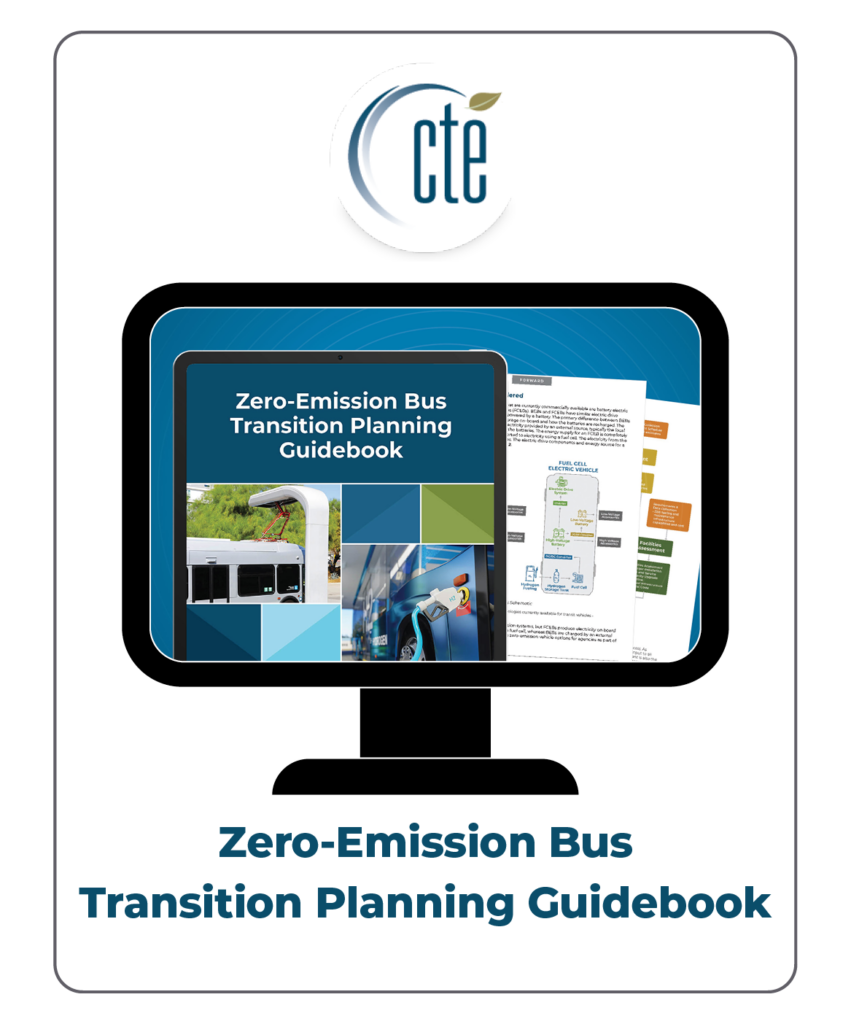
Low-No Bus Transition Planning Guidebook
The Center for Transportation and the Environment
November 2024
TOPICS: Low-No , Policy and Planning , Procurement , Training
Transitioning to a ZEB fleet requires thorough planning and consideration of the elements that are unique to ZEBs, such as range limitations, higher vehicle costs, charging and/or hydrogen infrastructure, and operator and maintenance workforce development. Failing to plan around these issues may result in added costs for bus and infrastructure purchases, project delays, service concerns, and operational challenges as low-no become a larger and larger portion of the fleet.
A properly developed Low-No Transition Plan can help overcome these challenges. This Guidebook is intended to give public transit fleet operators the knowledge necessary to plan for a full fleet transition to low-no technologies.

Making Connections 2024 – Moving Toward Solutions for Transit Worker Safety
This session about transit worker safety was presented as part of TWC’s Making Connections 2024 transit workforce conference in November, 2024.
Transit Workforce Center
November 2024
Session Description: Transit workers operate in a challenging environment in close contact with the public. Recent years have seen an increase in assaults on transit vehicles and in transit facilities, making the protection of transit workers and riders a crucial goal for the industry. This presentation will feature perspectives from research, transit agency labor and management, and the federal government. Panelists shared updates on transit assault trends, examples of mitigation strategies identified through engagement with agency leaders and frontline workers, innovations in operator workspace design, and models of successful joint labor-management safety planning through FTA’s updated PTASP rule.
Moderator:
- Lisa Staes: Associate Director – Center for Urban Transportation Research
Speakers:
- Lisa Staes: Associate Director – Center for Urban Transportation Research
- Russell Bateman: Training and Education Administrator – Amalgamated Transit Union
- Andrew Falotico: Health and Safety Director – Amalgamated Transit Union
- Alexander Houck: Deputy Chief Safety Officer – Maryland Transit Administration
- Stewart Mader: Senior Program Analyst for Safety Policy – Federal Transit Administration
- Michael McMillan: President and Business Agent – Amalgamated Transit Union Local 1300 (MD)

Making Connections 2024 – Tracking Your Impact: How Agencies and Unions Analyze and Use Workforce Data
This session about measuring metrics for workforce development initiatives was presented as part of TWC’s Making Connections 2024 transit workforce conference in November, 2024.
Transit Workforce Center
November 2024
Session Description: Employment in public transportation is affected by broad economic and demographic dynamics, but honing in on transit workforce trends can be challenging. The Transit Workforce Center created the Transit Workforce Data Dashboard to distill relevant data points from national datasets. In this session, TWC highlighted specific employment patterns and challenges in transit-related occupations and panelists covered research and trends in national and agency-level datasets.
Moderator:
- Michaela Boneva: Research Associate – International Transportation Learning Center / Transit Workforce Center
Speakers:
- Nick Biggar: District Director – Greater Cleveland RTA
- Valerie Campo: Mentor Program Coordinator – Champaign-Urbana Mass Transit
- Douglas Nevins: Senior Researcher – International Transportation Learning Center / Transit Workforce Center
- Darnell Morris: Vice President – ATU Local 268, Greater Cleveland RTA
- Dr. Shanta Hejmadi: Senior Data Scientist– Metro Transit (MN)

Making Connections 2024 – What Do Young People Want from a Transit Career?
This session about outreach and retention of youth in transit was presented as part of TWC’s Making Connections 2024 transit workforce conference in November, 2024.
Transit Workforce Center
November 2024
Session Description: As the transit industry works to reach out to the communities it serves to establish strong and effective career pipelines, agencies and their partners often explore how to best attract young people into the industry. In this session, attendees heard from and engaged with young people themselves, along with national and local experts who have conducted research and worked directly with youth. Topics covered include the most effective approaches to connecting with young people and creating awareness and excitement about career opportunities in public transportation.
Moderator:
- Dr. Beverly Scott: Founder and CEO – Introducing Youth to American Infrastructure
Speakers:
- Justin Augustine: Project Manager II – Alameda-Contra Costa Transit District
- Kayla Cooper-Redd: 12th Grade Student – TransSTEM Academy, Cardozo High School (DC)
- Sean Holley: Bus Transportation Instructor – Maryland Transit Administration
- Cheryl Rodgers: Director – TransSTEM Academy, Cardozo Education Academy (DC)
- Edwin Rodriguez: Director – Office of Research Management, Innovation, and Outreach – Federal Transit Administration
- Jamaal Schoby: Transportation Planner – Transportation Research Board

Making Connections 2024 – Apprenticeship 101 – How Transit Apprenticeship Operates
This session about transit apprenticeships was presented as part of TWC’s Making Connections 2024 transit workforce conference in November, 2024.
Transit Workforce Center
November 2024
Session Description: Apprenticeship programs are rapidly expanding at transit locations across the country. With quality training tied to clearly-identified career ladders and advancement, these programs are commonly regarded as the “gold standard” of workforce development. Documented benefits include increased retention, reductions in absenteeism, and the creation of a sustainable talent pipeline. These programs also result in better employee morale and a more engaged workforce. In this session, presenters walked through the essential steps to developing, registering, and implementing an apprenticeship program. Attendees heard from and engaged with transit labor and management about their joint programs including bus maintenance, traction power, HVAC/facilities, and signals/communications—and explore how to locate and access resources to support new and existing programs.
Moderator:
- Brian J. Turner: Founding Director – International Transportation Learning Center
Speakers:
- Michelle Allison: General Manager – King County Metro (WA)
- Maurice Beard: Senior Workforce Development Advisor –
- Norman Blessant: Financial Secretary/Treasurer – Amalgamated Transit Union Local 381 (UT)
- Rod Dunn: President – Amalgamated Transit Union Local 382 (UT)
- Brandee Gross: Program Manager, Workforce Development – Maryland Department of Transportation
- Dimas Koral-Arocho: Program Manager – King County Metro (WA)
- Stephanie Lewis: Workforce Development Project Manager – Center for Urban Transportation Research
- Kylee Parker: Shop Steward/Joint Apprenticeship Committee Chairman – Amalgamated Transit Union Local 1300 (MD)
- Jeff Stambaugh: Vice President – Amalgamated Transit Union Local 587 (WA)
- Greg Woodfill: President – Amalgamated Transit Union Local 587 (WA)

Making Connections 2024 – Plan, Train, Succeed: Building Your Low-No Workforce Transition Strategy
This session about transitioning the transit workforce to low-no vehicles was presented as part of TWC’s Making Connections 2024 transit workforce conference in November, 2024.
Transit Workforce Center
November 2024
TOPICS: Low-No , Making Connections Conference , Policy and Planning , Training
Session Description: As the transit industry accelerates toward new fuel technologies, a comprehensive workforce strategy is essential for a successful transition. This session focused on creating effective plans for workforce development, implementing targeted training programs with an emphasis on safety, and ensuring long-term success in transitioning to new fuels. Attendees learned about applied research, innovative training solutions, and technical assistance designed to help transit agencies develop a skilled workforce equipped to support new technologies.
Moderator:
- Jason Macumber: Senior Advisor of Workforce Development and Technology – International Transportation Learning Center / Transit Workforce Center
Speakers:
- Eliseo Acosta Jr: Workforce Development Coordinator – Amalgamated Transit Union
- Mark Finnicum: Chief Operation Officer – Stark Area Regional Transit Authority
- Molly King: Deputy Associate Administrator for Research, Demonstration, and Innovation – Federal Transit Administration
- Jennifer Sweten: Director of Operations – Missoula Urban Transportation District
- Billy Terry: Director – National Transit Institute (NTI)

Making Connections 2024 – Mentoring – Innovative Models and Best Practices
This session about innovative mentoring models was presented as part of TWC’s Making Connections 2024 transit workforce conference in November, 2024.
Transit Workforce Center
November 2024
Session Description: An Increasing number of transit agencies across the country have begun mentorship programs to support the frontline workforce and facilitate the sharing of knowledge and skills from experienced workers to new employees. These programs offer many benefits, including improved rates of retention and absenteeism, stronger relationships between the workforce and management, and better employee morale. During this session, attendees learned how transit agencies are incorporating innovative models to tap into the full potential of mentorship programs. Panelists described the positive changes that have resulted from mentorship programs and how they are incorporating new and innovative applications and approaches to multiply these benefits.
Moderator:
- George Fields: Deputy General Manager, Human Resources – Greater Cleveland Regional Transit Authority
Speakers:
- Ida Marshall: Senior Talent Acquisition Manager – Greater Cleveland Regional Transit Authority
- Wendy V. Talley: Director, Training & Employee Development – Greater Cleveland Regional Transit Authority
- Reginald Howard: President – Amalgamated Transit Union Local 788 (St. Louis)
- Trenise Winters: Assistant Executive Director – Bi-State Development/Metro Transit (St. Louis)
- Maurice Beard: Sr. Workforce Development Advisor – International Transportation Learning Center / Transit Workforce Center
- Karitsa Holdzkom: Senior Policy Analyst – International Transportation Learning Center / Transit Workforce Center

Making Connections 2024 – Successful Models for Career Awareness, Outreach, and Recruitment in Our Varied Communities
This session about national and agency-level workforce datasets was presented as part of TWC’s Making Connections 2024 transit workforce conference in November, 2024.
Transit Workforce Center
November 2024
Session Description: Consistent with FTA’s strategic goal of driving workforce recruitment, this session explored successful models and strategies for increasing awareness of transit careers among potential workers. Presenters also focused on approaches to recruiting and retaining individuals from varied backgrounds, emphasizing engagement with the communities transit serves. Through discussions of hands-on initiatives, mentoring and training programs, and partnerships between transit agencies and community organizations, this session explored various ways transit systems can create sustainable pipelines to attract and retain talent from communities of different sizes and demographics.
Moderator:
- David Stephen: Senior Communications Specialist – International Transportation Learning Center / Transit Workforce Center
Speakers:
- Scott Joiner: Senior Manager, Talent Acquisition – Bi-State Development/Metro Transit (St. Louis)
- Adam Parast: Enterprise and Strategic Initiatives Lead – King County Metro (WA)
- Antonio Pollard: Organizer – Amalgamated Transit Union Local 689 (DC)
- Dan Stoffer: Manager, Bus Instruction – Metro Transit (MN)
- Jaymi Swarbrick: Director of Human Resources – Merrimack Valley Transit (MeVa – MA)
- Trenise Winters: Assistant Executive Director – Bi-State Development/Metro Transit (St. Louis)

Making Connections 2024 – Elevating Your Workforce Data: The Power of Interactive Visualization for Analyzing Metrics
This full-day intensive session about building visualizations and dashboard with workforce data was presented as part of TWC’s Making Connections 2024 transit workforce conference in November, 2024.
Transit Workforce Center
November 2024
Session Description: Want to make your workforce metrics more digestible, interactive, and insightful? Robust data can provide insights into the success of transit workforce development programs, hiring trends over time, and more, but raw data can be hard to interpret and analyze. Using TWC’s Transit Workforce Data Dashboard as a model, participants in this intensive explored methods for creating powerful and easily understandable data visualizations. These graphs and charts can support transit providers’ and unions’ efforts to measure and effectively communicate program metrics and employment trends.
Speakers:
- Andrew Carpenter: Director – National Center for Applied Transportation Technology
- Douglas Nevins: Senior Researcher – International Transportation Learning Center / Transit Workforce Center
- Dr. Shayna Gleason: Senior Researcher – International Transportation Learning Center / Transit Workforce Center
- Michaela Boneva: Research Associate – International Transportation Learning Center / Transit Workforce Center

Making Connections 2024 – Creating Community Partnerships for Transit Career Pathways
This half-day intensive session about community partnerships was presented as part of TWC’s Making Connections 2024 transit workforce conference in November, 2024.
Transit Workforce Center
November 2024
Session Description: Check out this immersive half-day session designed to provide information, tools, and strategies that build a foundation for career pathways for community members into good jobs and great transit careers. Participants engaged in dialogue with transit professionals on the opportunities in the industry, gain insight into communicating about these opportunities, and explore approaches to establishing working partnerships with transit agencies and their labor and workforce partners.
Attendees dove into strategies and principles for impactful engagement, hearing firsthand accounts of successful collaborative initiatives and messaging strategies that emphasize the impact and value of working in an industry providing a vital public good. Participants gained invaluable insights into building sustainable workforce solutions that mutually benefit the industry and the community.
Key topics included:
- Exploring transit career opportunities
- Messaging and framing
- Building collaborative partnerships
- Real-world success stories
Moderator:
- David Stephen: Senior Communications Specialist – International Transportation Learning Center / Transit Workforce Center
Speakers:
- Rich Diaz: Workforce Development Coordinator – Amalgamated Transit Union Local 1575
- Theus Jones: Recording Secretary – Amalgamated Transit Union Local 689 (DC)
- Antonio Pollard: Organizer – Amalgamated Transit Union Local 689 (DC)
- Vanessa Sparks: Committee Member – Community Board 12-Queens Transportation Committee
- Carlene Thorbs: Chairperson – Community Board 12-Queens Transportation Committee

Making Connections 2024 – Train-the-Trainer Bootcamp: Strategies for Successful Instruction
This full-day intensive session about tools for new and experienced trainers to increase retention and engagement was presented as part of TWC’s Making Connections 2024 transit workforce conference in November, 2024.
Transit Workforce Center
November 2024
Session Description: This intensive full-day session, an abbreviated version of TWC’s popular 5-day Train-the-Trainer Level 1 course, provided both new and experienced trainers with new tools to increase engagement, application, and retention. Participants added to their knowledge, skills, and confidence to fully engage learners and effectively facilitate a variety of instructor-led training programs. Topics included adult learning theory, teaching techniques, and instructional elements that really work! Participants also had the opportunity to observe and critique a teaching demonstration — learning what does and what does not contribute to impactful learning.
Check out experienced instructors and your trainer-peers from across the industry to explore the following topics:
- How do adults learn, and what does adult learning theory tell us that we can use in our training?
- What are the key instructional elements of successful classroom and hands-on training?
- What are lesson plans, and how are they developed?
- Which teaching techniques help strengthen classes and instructional presentations?
Speakers:
- Frank Burnett: Training Specialist – International Transportation Learning Center / Transit Workforce Center
- Julie Deibel-Pundt: Program Director, Instructional Design – International Transportation Learning Center / Transit Workforce Center
- Marina Budeyeva: Instructional Designer – International Transportation Learning Center / Transit Workforce Center
- Jessica Supervielle: Instructional Designer – International Transportation Learning Center / Transit Workforce Center
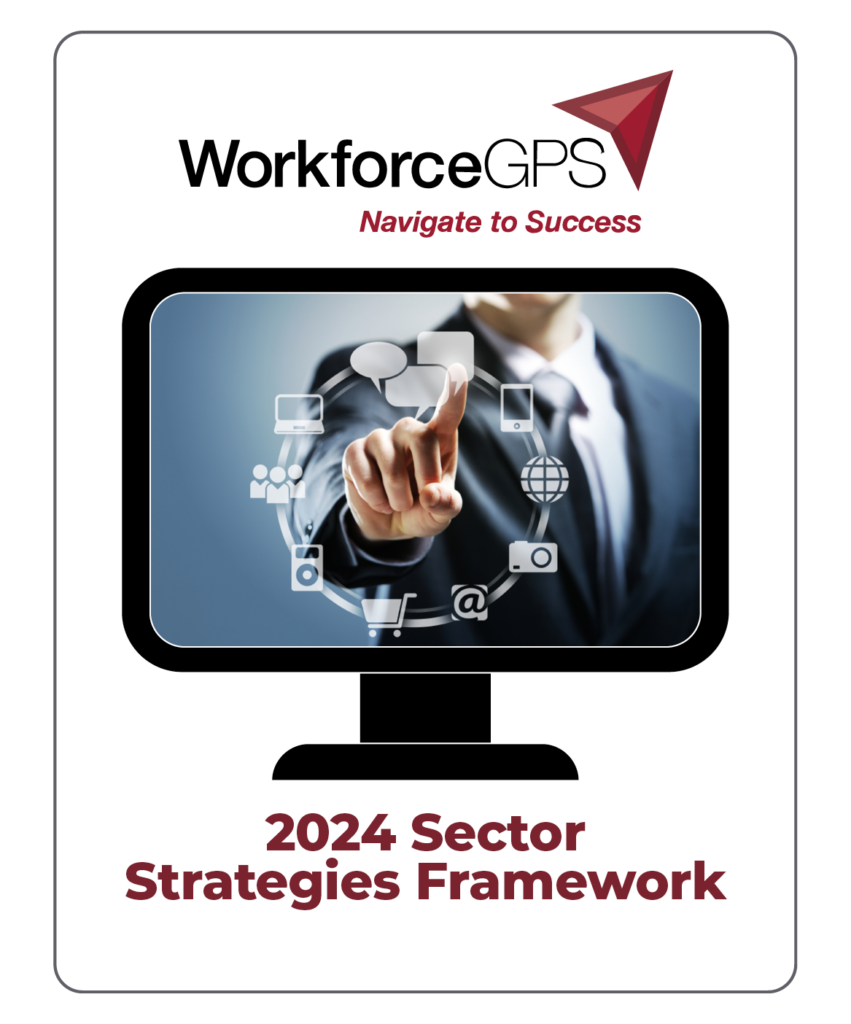
2024 Sector Strategies Framework
WorkforceGPS
September 2024
In September 2024, ETA released an updated Sector Strategies Framework to guide national, state, and local practitioners in their efforts to launch and implement effective sector strategies. The Framework is intended to advance knowledge and support the development, scaling, and durability of sector strategies. It provides workforce system practitioners with a clear picture of the concepts and elements essential to the successful implementation of sector partnerships and sector strategies. The Sector Strategies Framework was developed by ETA to harness lessons learned from the field, provide support to overcome common barriers, and help practitioners build knowledge in new areas.
Along with the Framework, the ETA released additional resources including:
- Implementation Guide and Self-Assessment and Action Planning Tool: Resources to help practitioners implement the Framework and assess and strengthen existing sector strategies efforts.
- ETA Blog Post: “Demand-driven training: Reimagining sector partnerships to build career pathways”
- Training and Employment Notice No. 08-24: Release and Availability of Updated 2024 U.S. Department of Labor’s Sector Strategies Framework
- Virtual Training Series: Learn more about the Framework and strategies to implement and scale sector strategies by viewing each session in this three-part series.
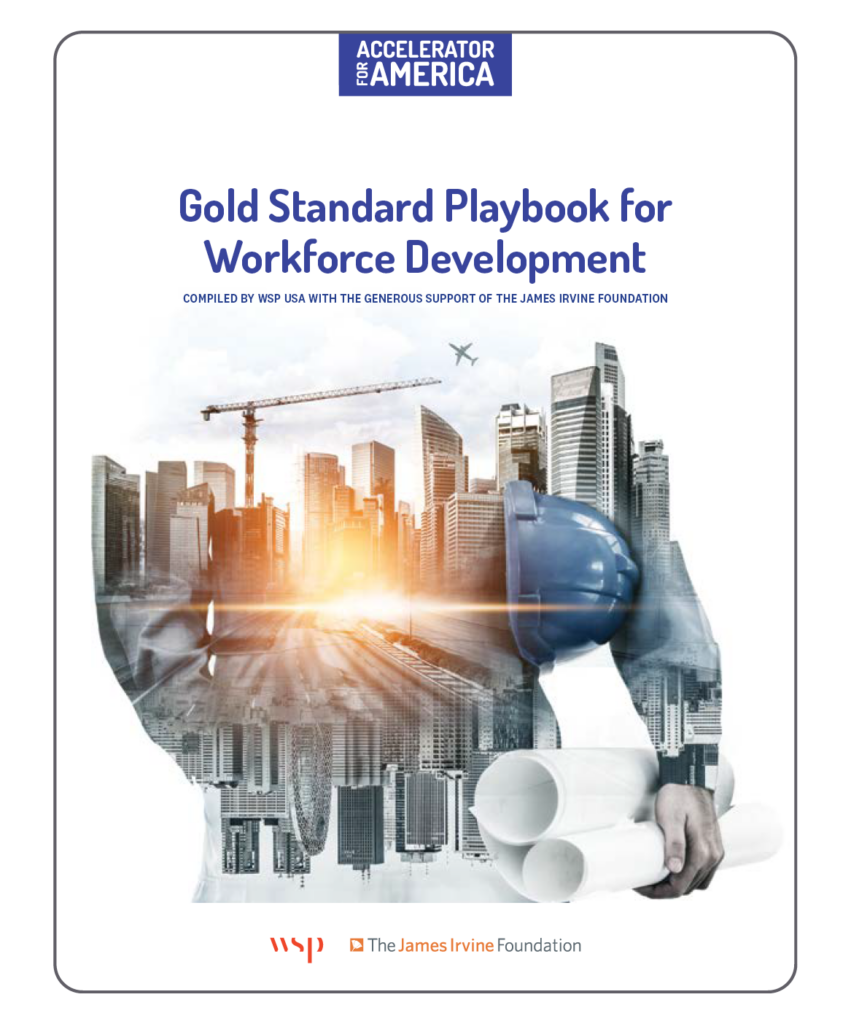
Gold Standard Playbook for Workforce Development
Accelerator for America
August 2024
This Workforce Development Playbook – a menu of malleable strategies and tactics that can be applied in different situational contexts – is meant to serve two purposes:
- To document best practices in workforce development focusing on California but with applicability nationally and sources.
- To set the first “Gold Standard” guiding owners who want to incorporate workforce development goals into their infrastructure projects.
To develop the Playbook, WSP and Accelerator for America (AFA) supported by The James Irvine Foundation, gathered information on current standards, practices, and barriers to workforce development efforts through interviews with key stakeholders across the industry in California, including project owners, community benefit organizations (CBOs), and government leaders.
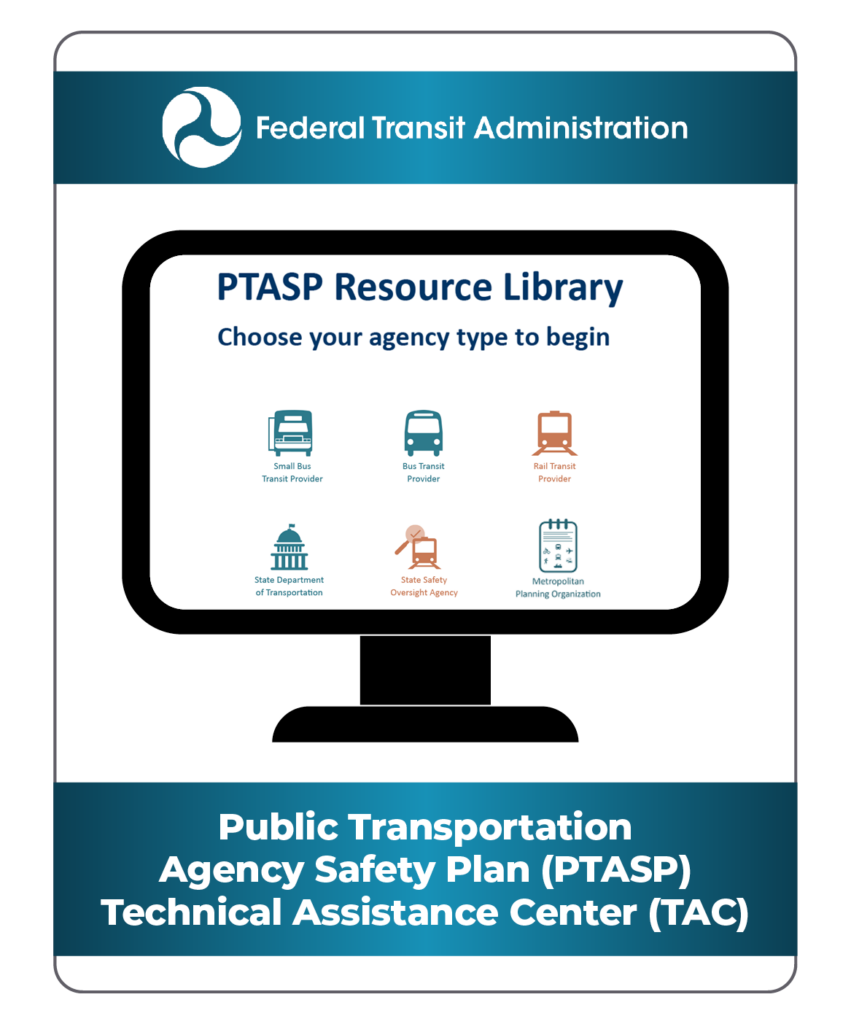
Public Transportation Agency Safety Plan (PTASP) Technical Assistance Center (TAC)
Federal Transit Administration
August 2024
TOPICS: Policy and Planning , Safety and Health
The Public Transportation Agency Safety Plans (PTASP) Technical Assistance Center (TAC) provides comprehensive technical assistance to help the transit industry meet PTASP regulation requirements, as outlined in 49 CFR part 673.
The TAC:
- Provides one-on-one technical assistance
- Facilitates training and peer-sharing via live webinars and roundtables
- Conducts voluntary technical reviews of draft Agency Safety Plans
- Maintains a resource library with technical assistance tools.
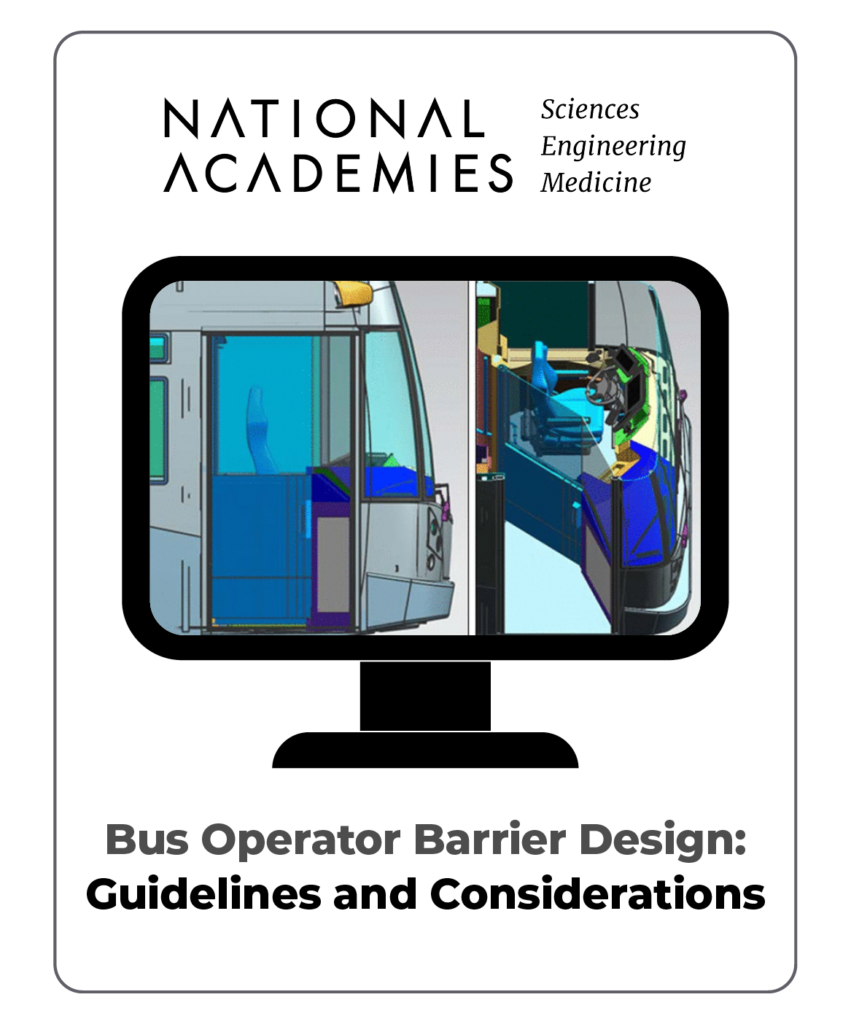
Bus Operator Barrier Design: Guidelines and Considerations
Transit Cooperative Research Program
July 2024
TOPICS: Policy and Planning , Procurement , Safety and Health
The importance of security barriers for transit bus operators became even clearer after the fatal attack on a Tampa, Florida, bus operator in 2019. The need for security barriers was reinforced by a serious attack on another operator for that same system later that year. While these are two extreme examples, they are likely not unique, as many assaults against transit workers have been underreported in the past. Another important but more pernicious risk to bus operator health is viral and bacterial infection.
TCRP Research Report 249: Bus Operator Barrier Design: Guidelines and Considerations provides information and guidance for North American public transportation agencies, standards committees, and government and non-government policymaking organizations on designing, procuring, and installing bus operator barriers to prioritize the health and safety of essential operators and the public they serve.
Contributor(s): National Academies of Sciences, Engineering, and Medicine; STYL&TECH; International Transportation Learning Center; Transportation Research Board; Transit Cooperative Research Program; Andrew Krum; Scott Tidwell; Joshua Skole; Erin Mabry; Aditi Manke; Tarah Crowder; Christy Campoll
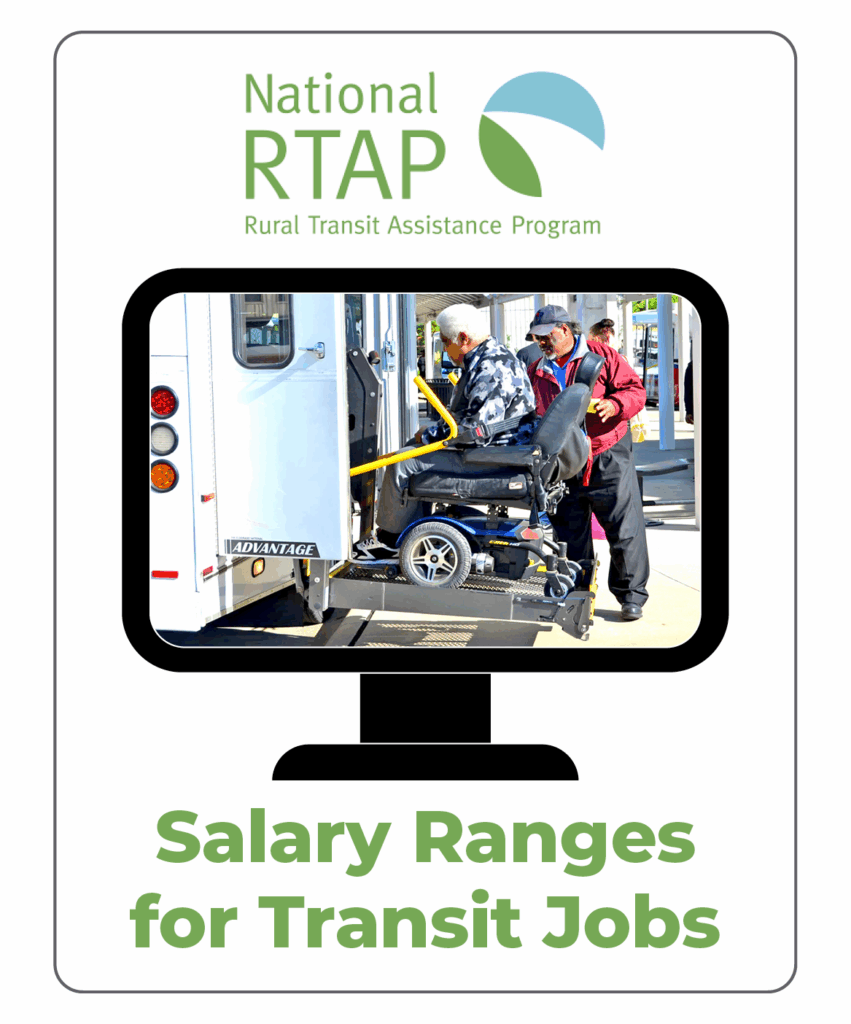
Salary Ranges for Transit Jobs
In June and July of 2024, National RTAP completed a survey of rural and tribal public transit agencies; the survey included a section on annual salaries and hourly pay rate ranges, annual salary increases, and benefits offered to full-time and part-time employees. National RTAP received responses from 391 agencies, representing 43 states, with 327 agencies providing information about jobs and annual salary and hourly ranges. The dataset is not exhaustive but can help rural and tribal transit providers in determining salary ranges for various positions.
The survey data is aggregated in a downloadable spreadsheet, which is available on the National RTAP landing page at the link below.
National Rural Transit Assistance Program
July 2024
TOPICS: Hiring and Recruitment , Policy and Planning , Retention
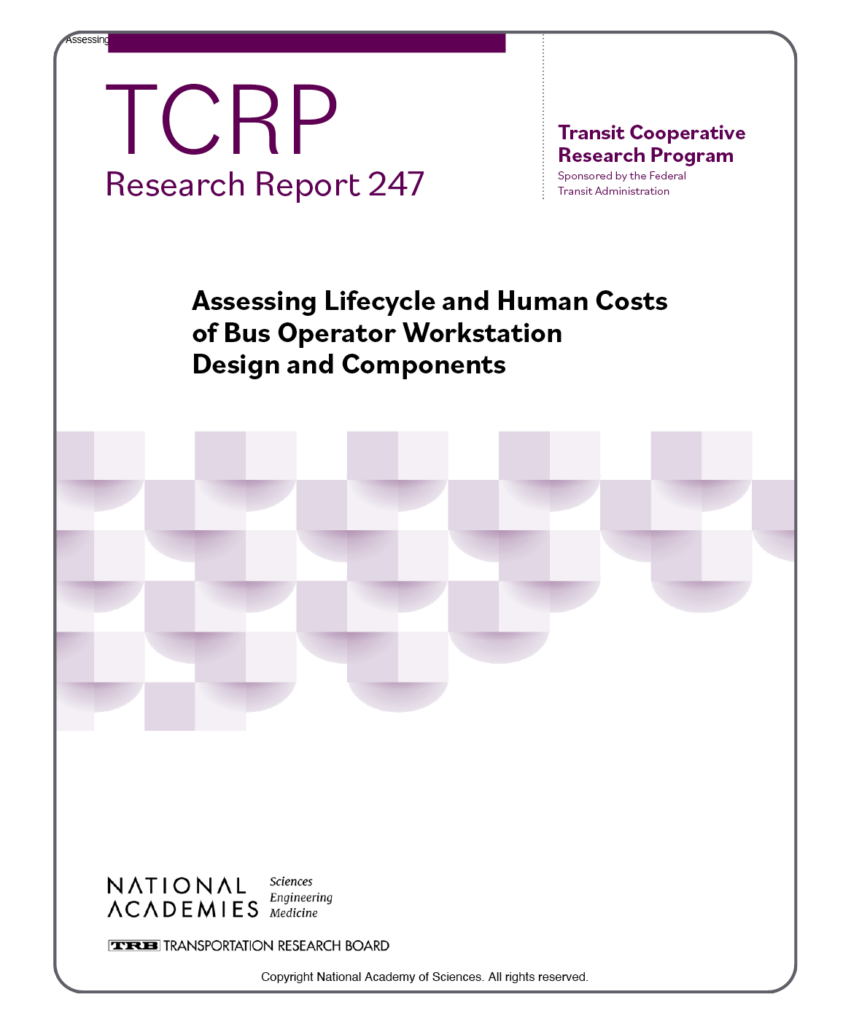
Assessing Lifecycle and Human Costs of Bus Operator Workstation Design and Components
Transit Cooperative Research Board
June 2024
TOPICS: Policy and Planning , Retention , Safety and Health
Driving trucks and buses is a physically demanding occupation that carries one of the highest injury rates of major occupational categories in the United States. Drivers often work in postures that increase risk of low back pain and other musculoskeletal disorders, slow their response time, and put them at increased risk for acute injuries due to crashes.
TCRP Research Report 247: Assessing Lifecycle and Human Costs of Bus Operator Workstation Design and Components, from TRB’s Transit Cooperative Research Program, creates an easy-to-use toolkit for predicting the long-term safety of and promoting a healthy environment in bus operator workstations.
Contributor(s): National Academies of Sciences, Engineering, and Medicine; Transportation Research Board; Transit Cooperative Research Program; Songlin Wu; Eunsik Kim; Andris Freivalds; Yiqi Zhang; Matthew Parkinson
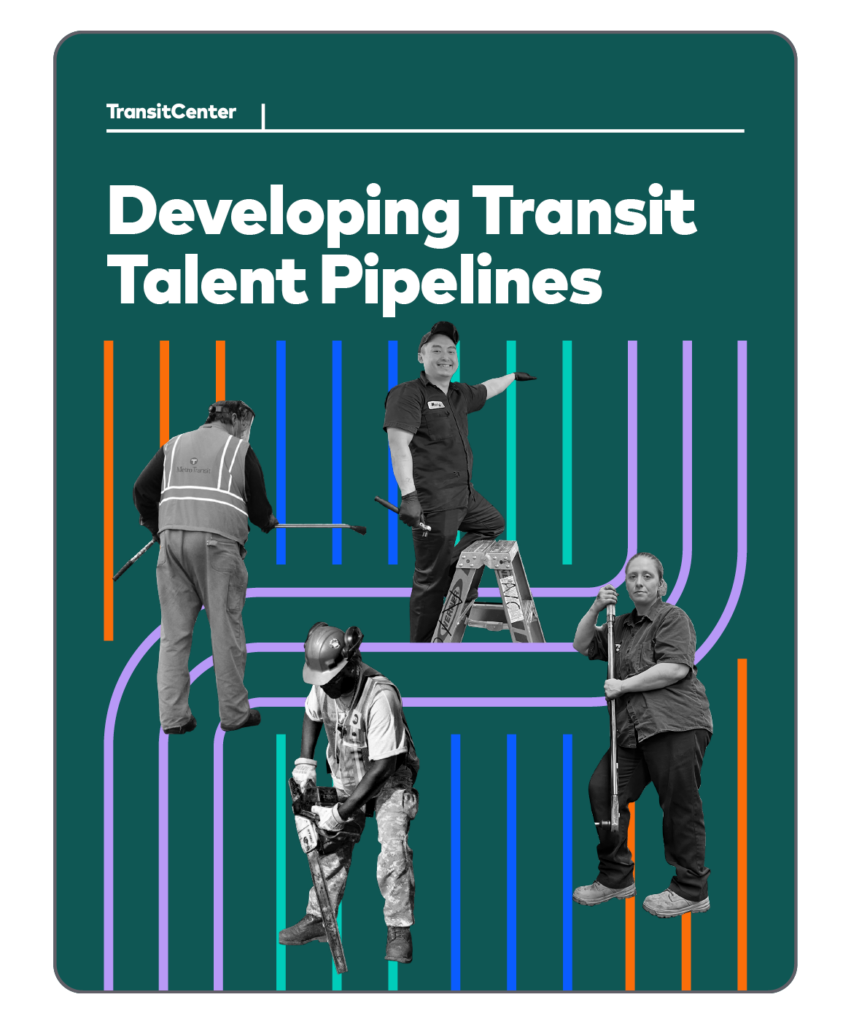
Developing Transit Talent Pipelines
TransitCenter’s report explores the workforce challenges of transit bus mechanics and maintenance workers, which are essential for transitioning to low-no buses and restoring pre-pandemic service. Agencies are struggling to maintain a steady pipeline for these positions due to retirements, attrition, and a changing labor market. The report determines that agencies should engage more actively with potential workers and encourage them to join the transit workforce, as well as finding new ways to prepare new workers and retrain current workers to meet current and future needs, particularly as technology for low-no buses continues to change and grow more widespread. The report recommends greater investment from transit agencies, state and federal government, and philanthropy to support transit jobs.
TransitCenter
May 2024
TOPICS: Hiring and Recruitment , Low-No , Policy and Planning , Retention , Workforce Shortage
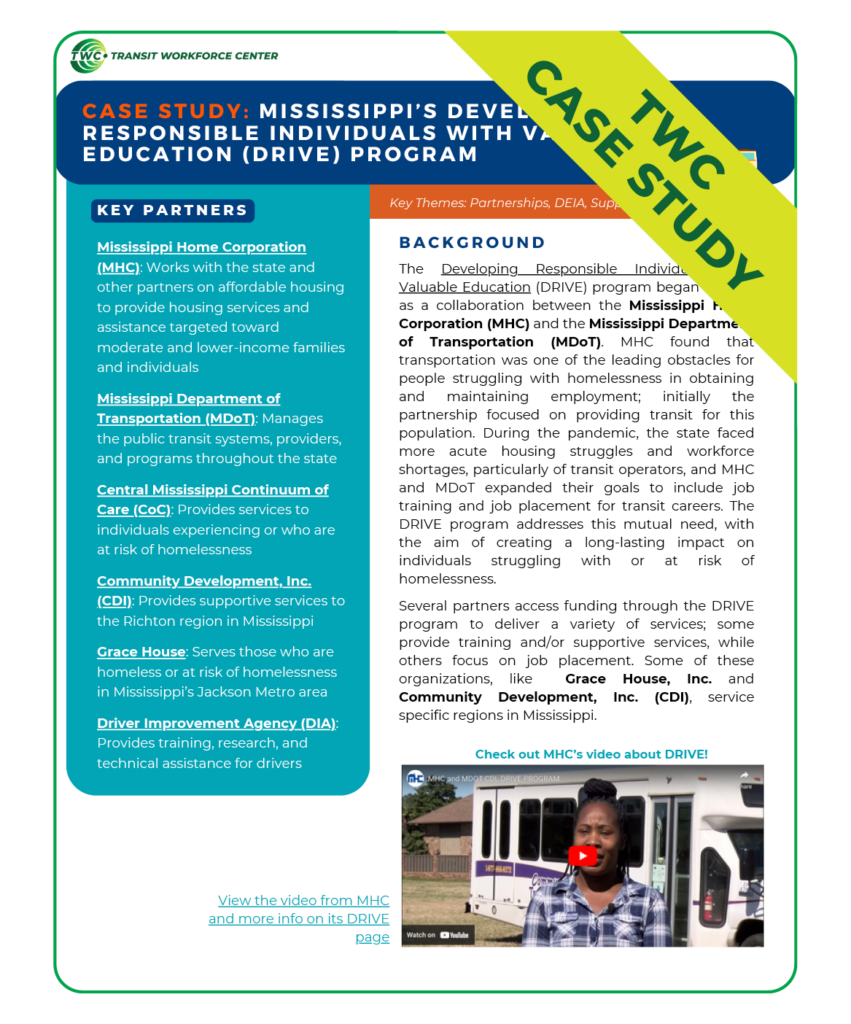
Mississippi’s Developing Responsible Individuals with Valuable Education (DRIVE) Program
This TWC case study is about the Mississippi Developing Responsible Individuals with Valuable Education (DRIVE) Program, which uses Emergency Solutions Grants (ESG) from the U.S. Department of Housing and Urban Development, distributed by the Mississippi Home Corporation (MHC), to partners such as Grace House, Inc. and Community Development, Inc. (CDI). These partners use the funding in a variety of creative ways to provide housing and other supportive services to DRIVE participants while they complete training and certification for a commercial driver’s license (CDL). Partners also provide job assistance to participants, placing them and helping them succeed in local transit jobs. Learn more about the program, services offered, and how stakeholders leverage funding in the full case study.
Transit Workforce Center
May 2024
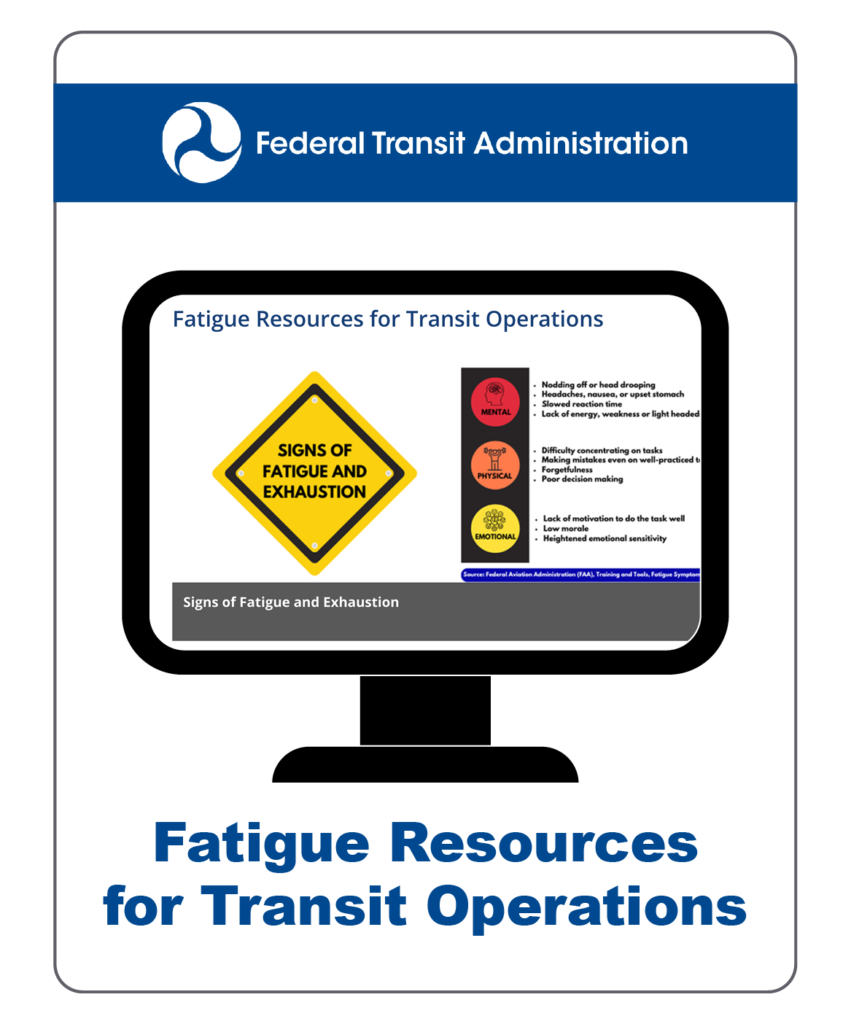
Fatigue Resources for Transit Operations
To support the transit industry, FTA has compiled resources that can be used to better understand fatigue and fatigue-related issues in the workplace. The site includes resources about understanding sleep, causes of fatigue, symptoms and warning signs, effects, relevance to transit workers and agencies, and fatigue risk management systems.
Federal Transit Administration
TOPICS: Policy and Planning , Safety and Health , Training
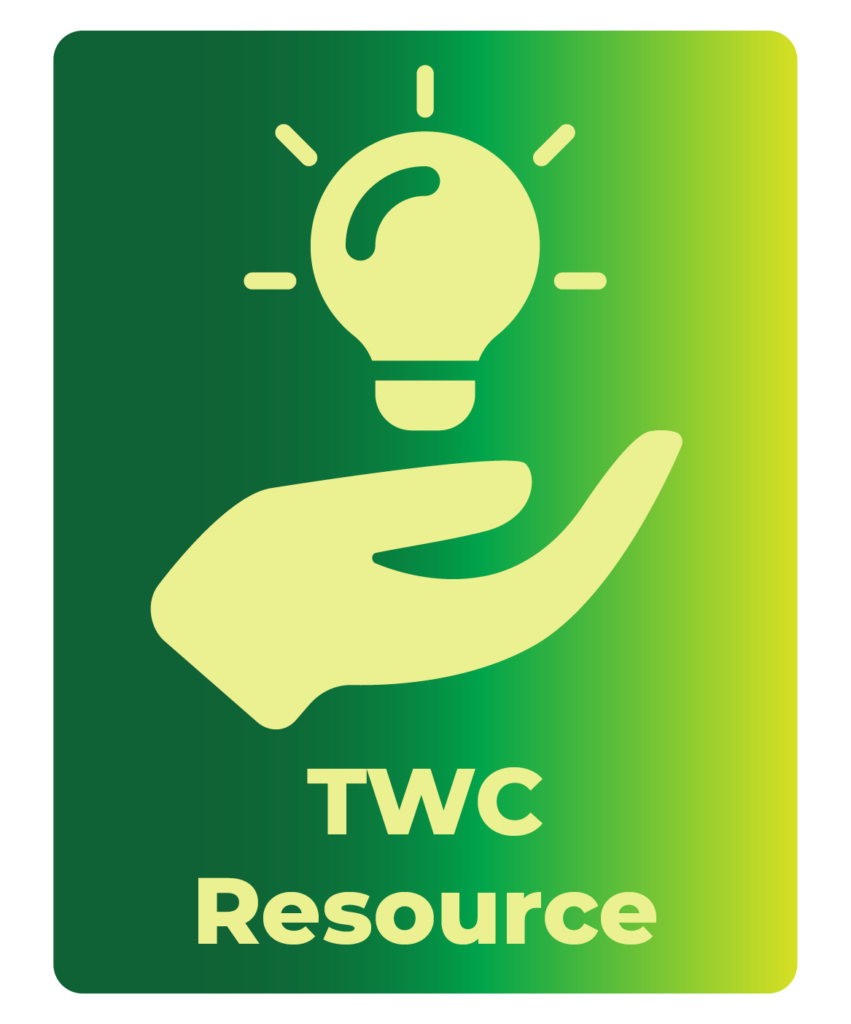
Workplace Mental Health Toolkit
The Workplace Mental Health Toolkit assists employers’ efforts to support the mental health and well-being of all workers, including people with mental health conditions. Through this toolkit, organizations can learn how to create a mental health-friendly workplace and help their employees access resources that will lead to improved well-being.
Employer Assistance and Resource Network on Disability
TOPICS: Policy and Planning , Retention , Safety and Health
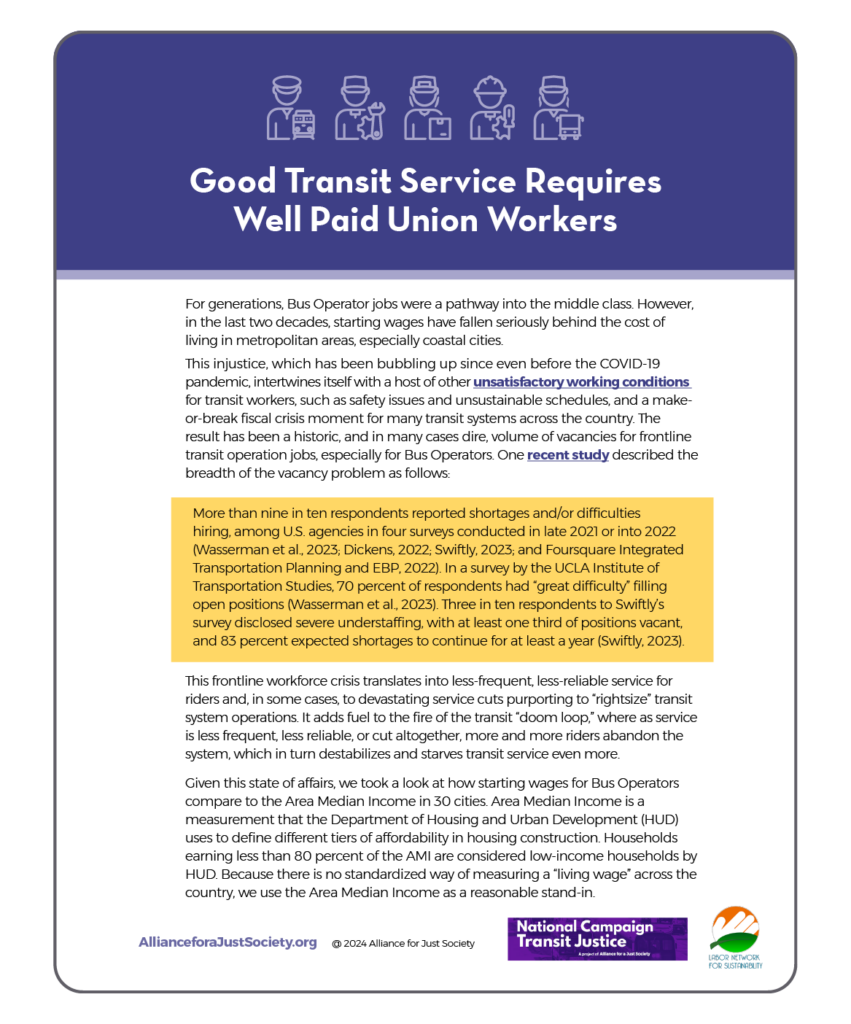
Good Transit Requires Well Paid Union Workers
This report presents bus operator wages as compared with Area Median Income in 30 cities across the U.S., pointing out that in the last two decades, starting wages for our nation’s bus operators have fallen seriously behind the cost of living. In the face of a workforce shortage, the report makes the case for decision makers to ensure higher wages for frontline transit workers.
The National Campaign for Transit Justice
March 2024
TOPICS: Hiring and Recruitment , Policy and Planning , Retention , Workforce Shortage
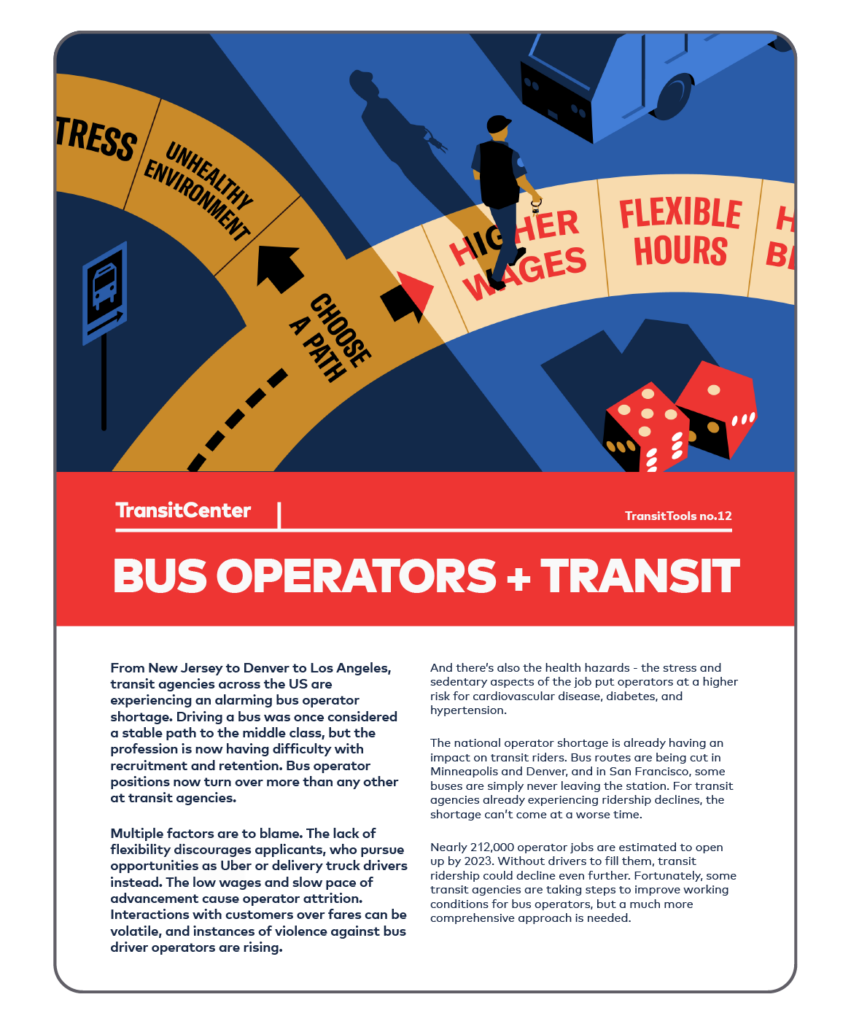
3 Ways to Make Bus Driving a Better Job
This report highlights ways that bus driving can be improved for workers to help increase retention and recruitment. The report explains three specific ways: redesigning the job for health and success, raising pay and creating opportunities for advancement, and making a more flexible schedule.
The National Campaign for Transit Justice
March 2024
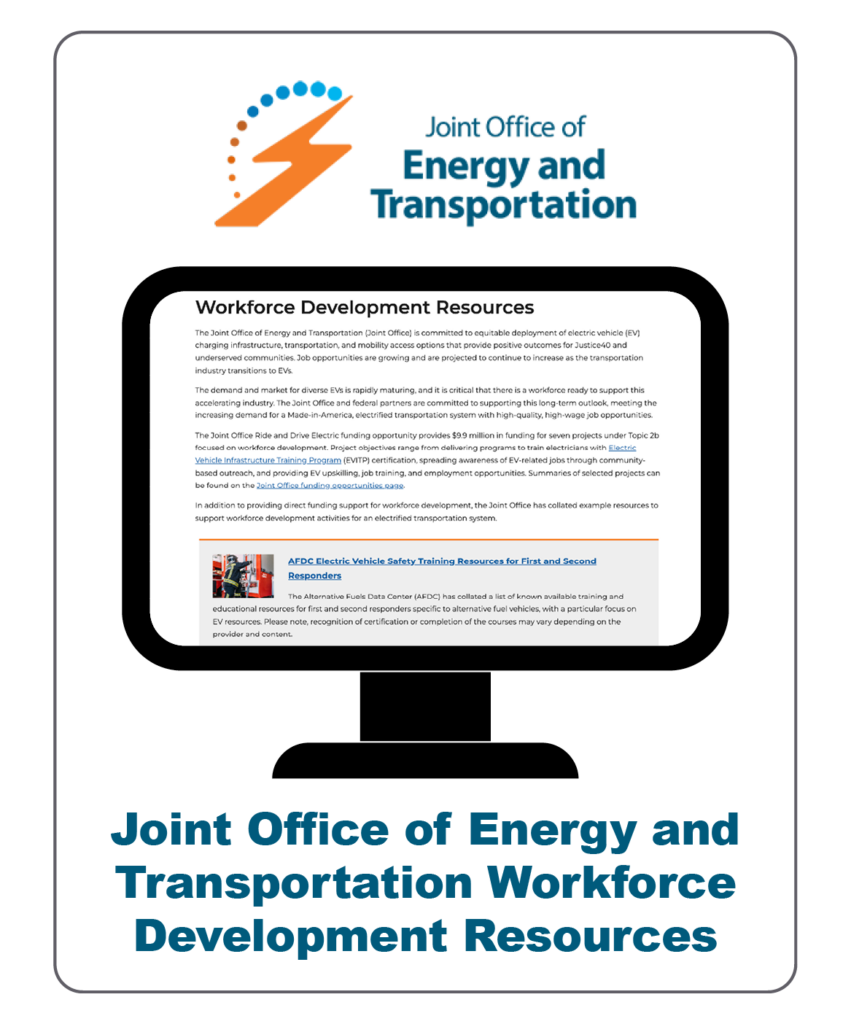
Joint Office of Energy and Transportation Workforce Development Resources
The Joint Office of Energy and Transportation (Joint Office) supports the deployment of low-no, convenient, and accessible transportation infrastructure. In addition to providing direct funding support for workforce development, the Joint Office has collated example resources to support workforce development activities for an electrified transportation system.
Joint Office of Energy and Transportation
TOPICS: Apprenticeship , Funding Opportunities , Low-No , Policy and Planning , Training , Workforce Shortage
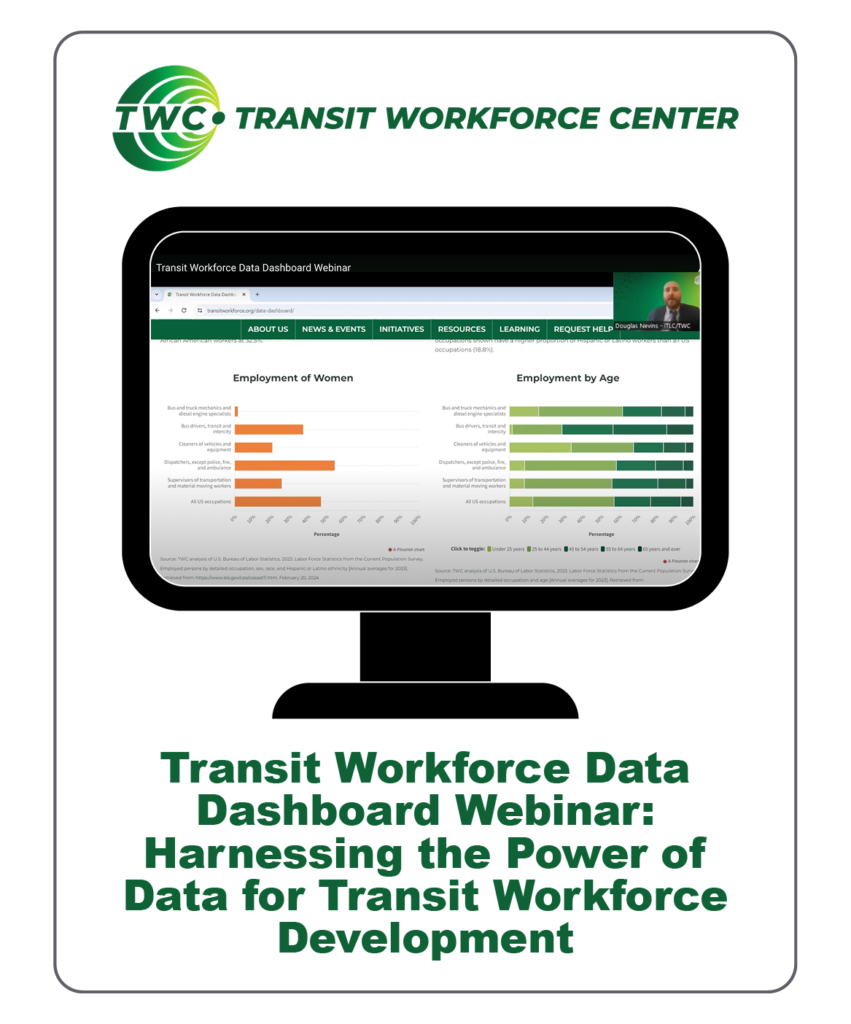
Transit Workforce Data Dashboard Webinar: Harnessing the Power of Data for Transit Workforce Development
TWC hosted a webinar titled “Transit Workforce Data Dashboard Webinar: Harnessing the Power of Data for Transit Workforce Development” on February 28, 2024. The Dashboard features innovative visualizations of transit and transportation workforce statistics and demographics from the National Transit Database (NTD) and Bureau of Labor Statistics (BLS). It can be used to highlight key issues, like the high proportion of transit workers nearing retirement age, the potential for greater participation in key transportation occupations, and the need to hire extensively in the coming decade. A new interactive page launched in February, allowing users to filter NTD employment data by agency.
TWC demonstrated the full dashboard, discussed lessons learned from working with NTD and BLS data, and opened up a Q&A for participants to ask questions or share their unique data needs.
Transit Workforce Center
February 2024
At the end of the webinar, TWC shared a survey to collect unique transit workforce data needs and feedback for potential additions to the Data Dashboard. The survey continues to accept responses and can be found below.
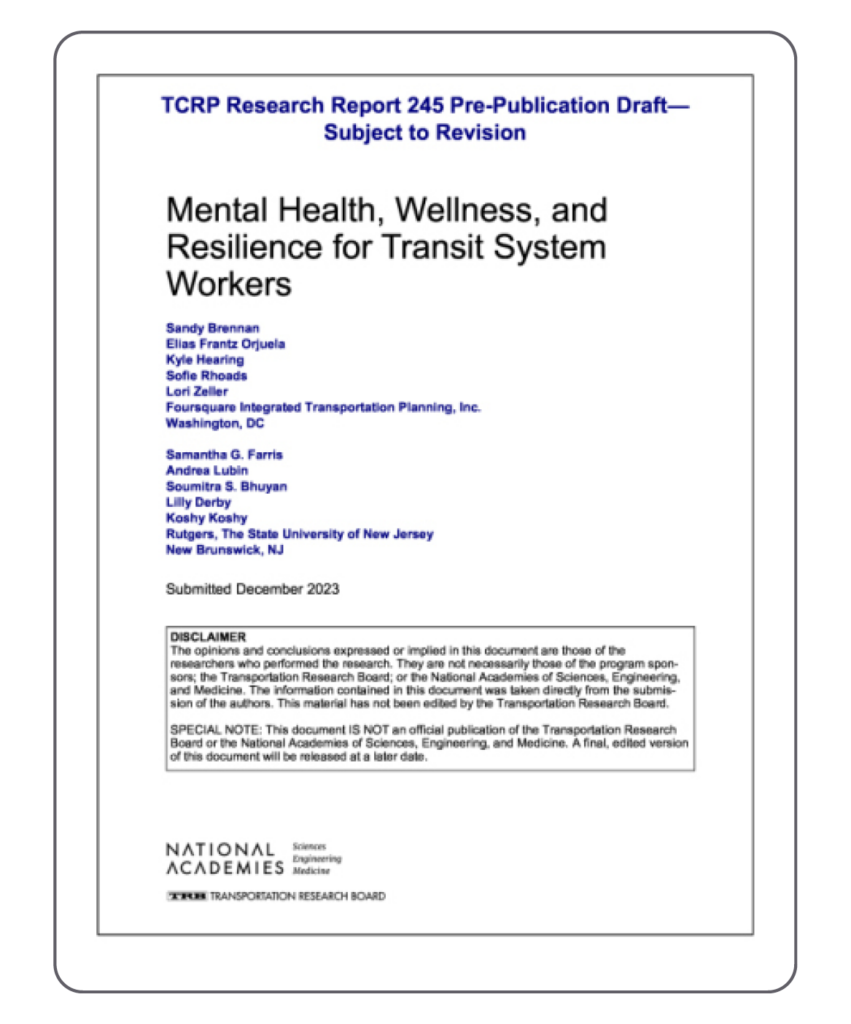
Mental Health, Wellness, and Resilience for Transit System Workers
TCRP Research Report 245: Mental Health, Wellness, and Resilience for Transit System Workers provides a detailed summary of common factors that influence the mental health, well-being, and resiliency of frontline transit workers and includes a range of solutions that transit agencies can implement to address them. Findings were determined using a mix of research methods, including multiple interviews and focus groups with frontline employees, transit agency management, and union leadership at two different points in the project.
Transit Cooperative Research Program
February 2024
TOPICS: Policy and Planning , Safety and Health
Contributor(s): Sandy Brennan, Elias Frantz Orjuela, Kyle Hearing, Sofie Rhoads, Lori Zeller, Samantha G. Farris, Andrea Lubin, Soumitra S. Bhuyan, Lilly Derby, Koshy Koshy; Transit Cooperative Research Program; Transportation Research Board; National Academies of Sciences, Engineering, and Medicine
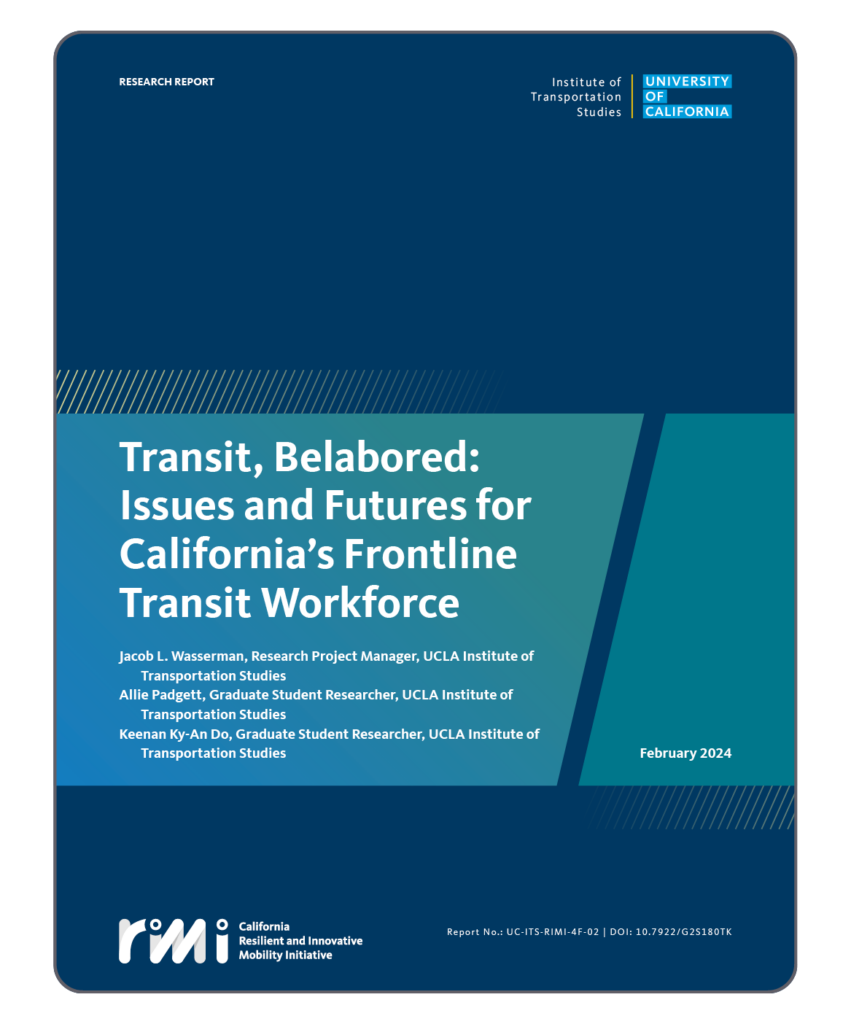
Transit, Belabored: Issues and Futures for California’s Frontline Transit Workforce
This report focuses on frontline transit workforce issues, including employee pay, issues before and after the COVID-19 pandemic, and the workforce shortage. The report is mainly about transit operators, but also touches on mechanics. It draws on quantitative and qualitative data, including wage data by agency and sector, contracts and agency documents, and interviews with union leaders, agency managers, and operators themselves.
Institute of Transportation Studies
February 2024
TOPICS: Hiring and Recruitment , Policy and Planning , Retention , Workforce Shortage
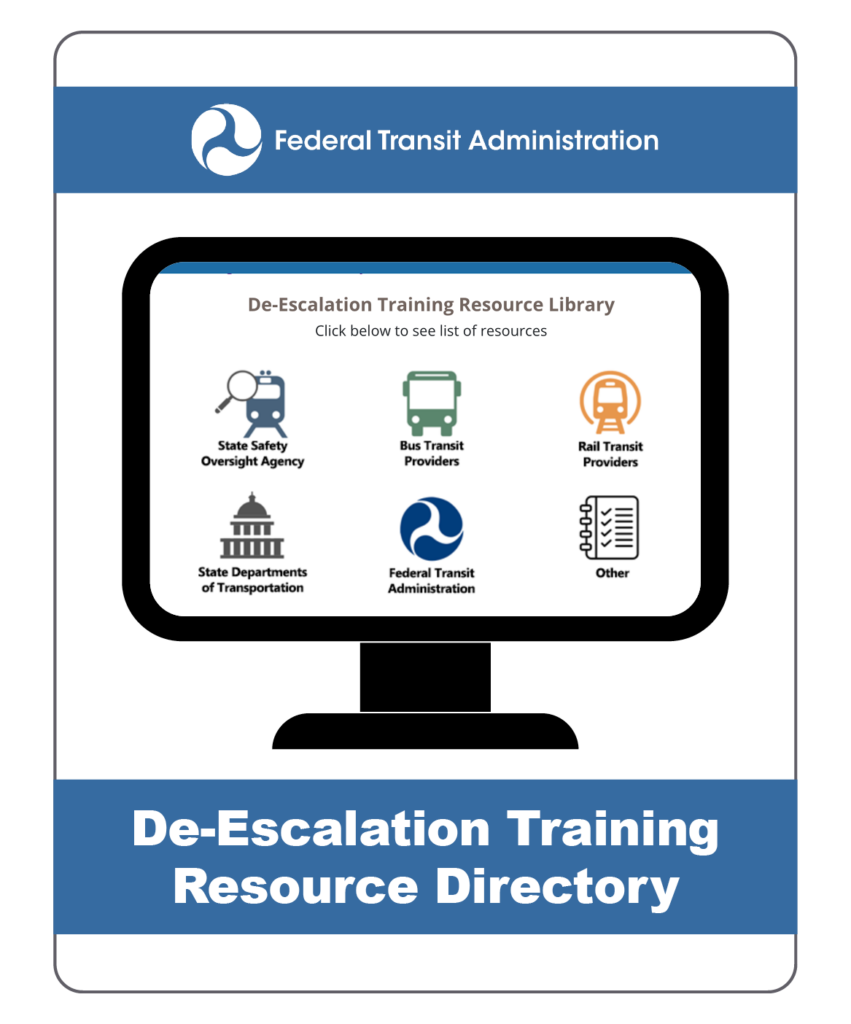
De-Escalation Training Resource Directory
The Federal Transit Administration (FTA) has gathered these resources to support the transit industry in developing, implementing, and updating their training programs. The resources illustrate ways agencies throughout the transit industry are implementing de-escalation training.
Federal Transit Administration
February 2024
TOPICS: Policy and Planning , Safety and Health , Training
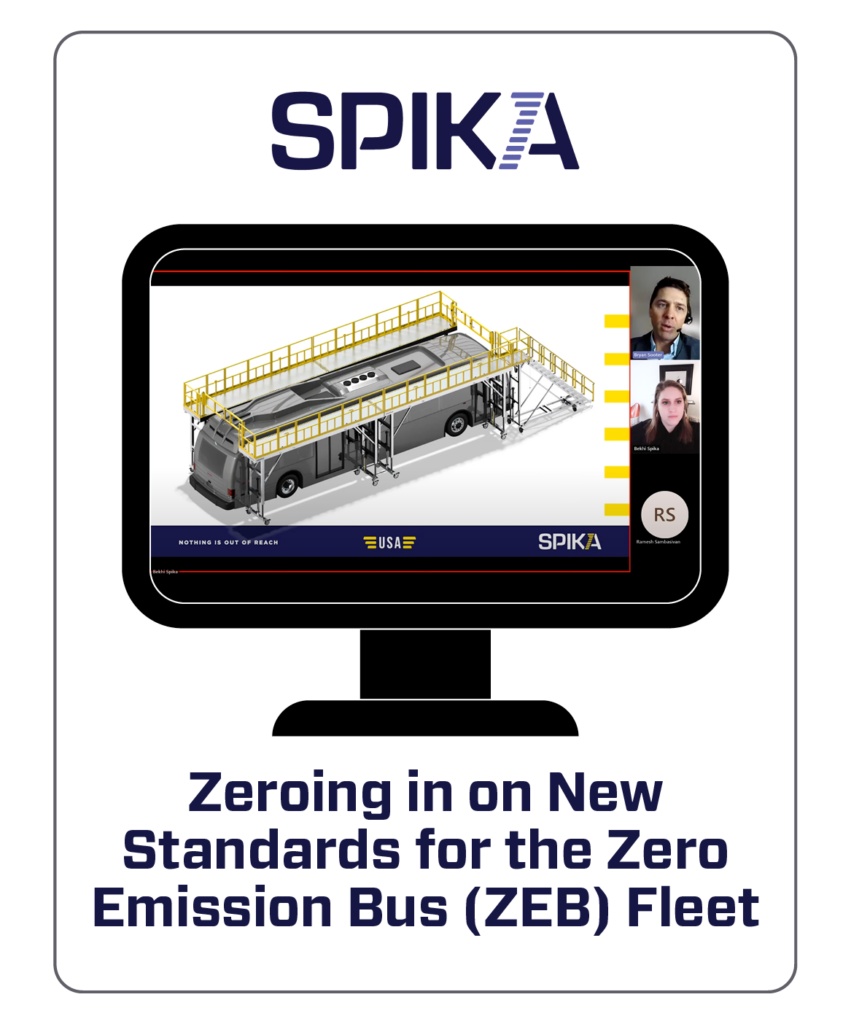
Video on New Standards for the Low-No Bus Fleet
In this video, Bryan Sooter, P.E., Director of Standards at the American Public Transportation Association (APTA), and Bekhi Spika, VP and CRO of Spika Design & Manufacturing, have a conversation about low-no standards, including how standards are created in public transportation; the challenges faced by transit agencies in getting prepared for an entirely new way of operating with entirely new technology in existing, new or modified infrastructure; the kinds of areas that new standards on low-no can be expected to encompass; and the guidance on resources available from APTA for transit agencies shifting to low-no fleets.
Spika Design & Manufacturing
February 2024
TOPICS: Low-No , Policy and Planning , Training
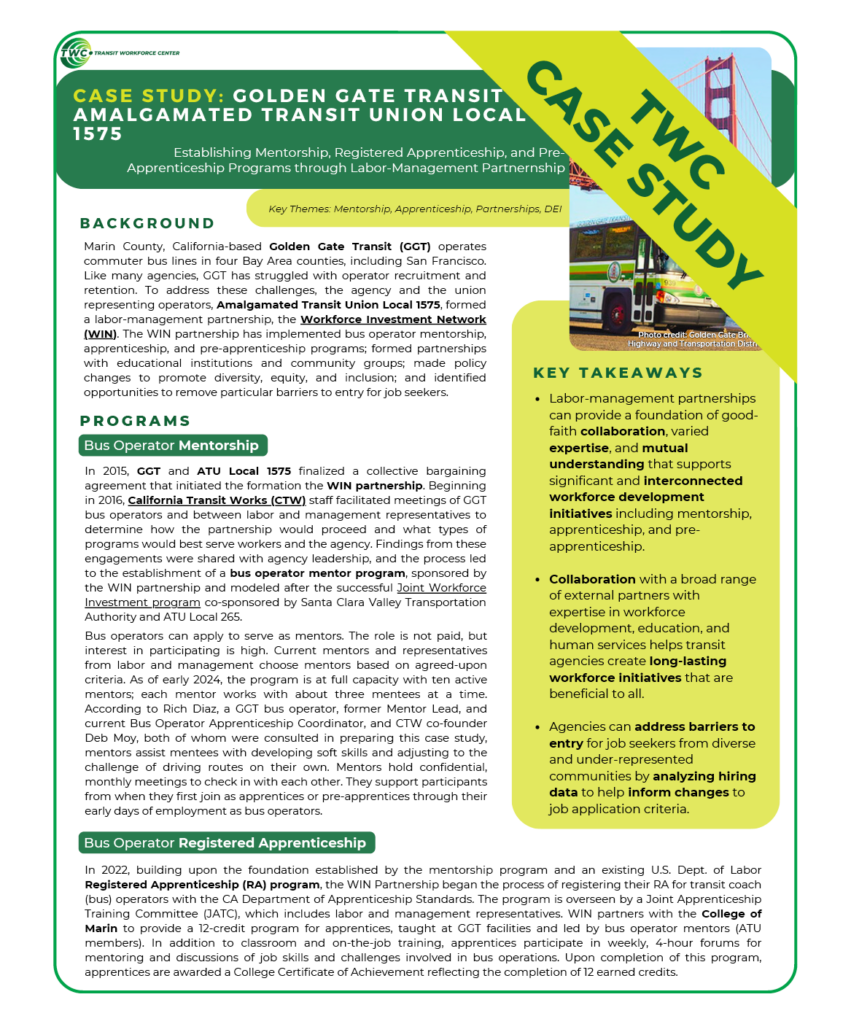
Case Study: Golden Gate Transit & Amalgamated Transit Union Local 1575
Marin County, California-based Golden Gate Transit (GGT) operates commuter bus lines in four Bay Area counties, including San Francisco. Like many agencies, GGT has struggled with operator recruitment and retention. To address these challenges, the agency and the union representing operators, Amalgamated Transit Union Local 1575, formed a labor-management partnership, the Workforce Investment Network (WIN). The WIN partnership has implemented bus operator mentorship, apprenticeship, and pre-apprenticeship programs; formed partnerships with educational institutions and community groups; and identified opportunities to remove particular barriers to entry for job seekers.
Transit Workforce Center
February 2024
Read Rich Diaz’s Transit Career Story on the TWC Blog to learn more.
View the full case study below:
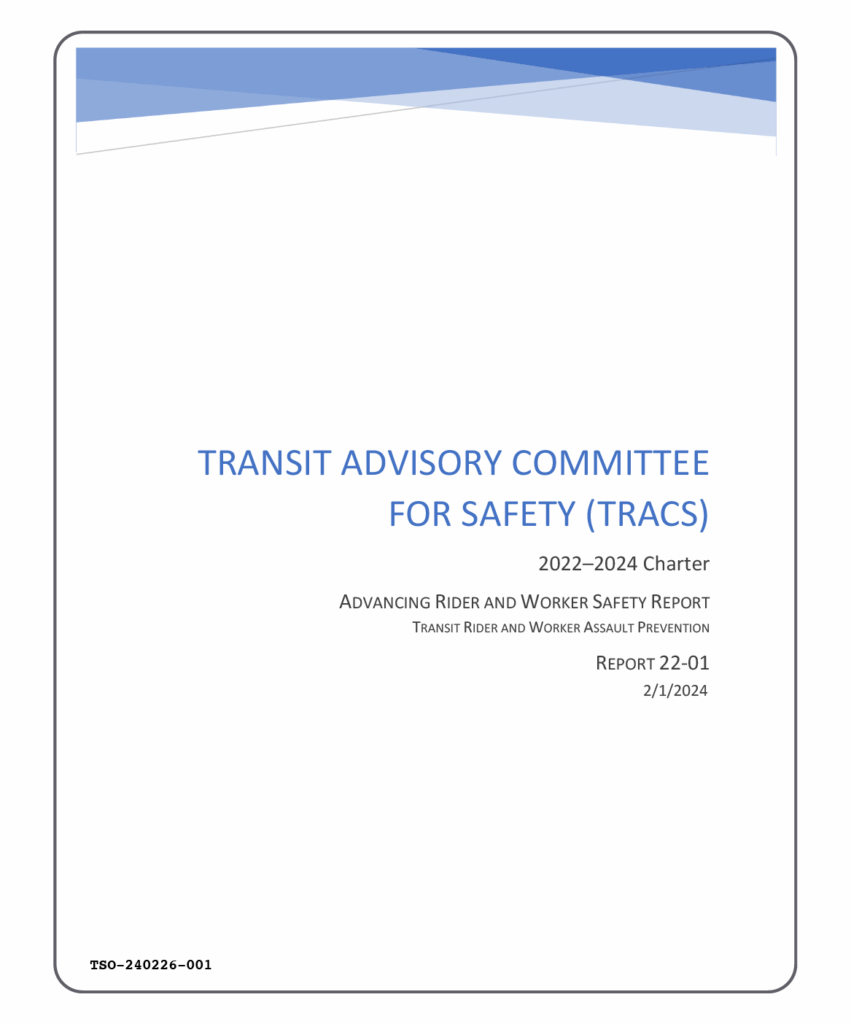
Advancing Rider and Worker Safety
The 2022-2024 Charter tasked the Transit Advisory Committee for Safety (TRACS) with developing recommendations that the Federal Transit Administration could implement to improve public safety. This report includes recommendations related to one of the Charter’s safety focus areas: Advancing Rider and Worker Safety.
Transit Advisory Committee for Safety
February 2024
TOPICS: Policy and Planning , Safety and Health , Training
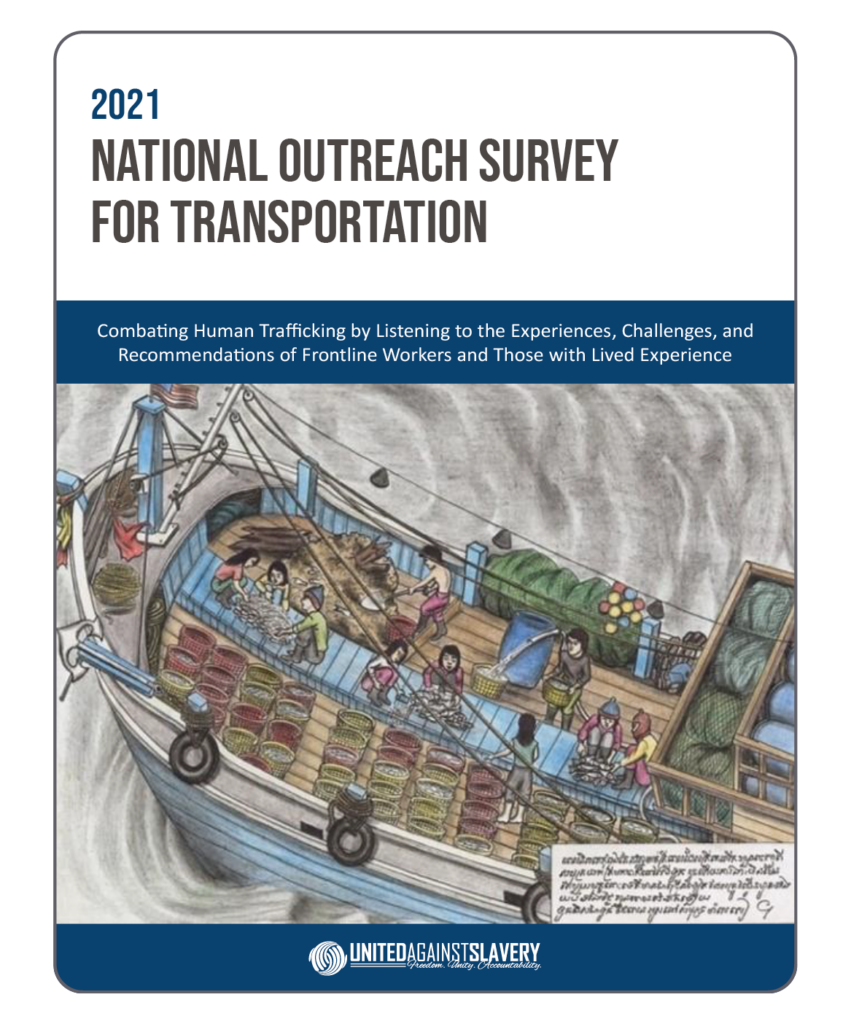
National Outreach Survey for Transportation (NOST)
This report explores the status of sex and labor trafficking in the transportation industry. It explains and highlights a survey of frontline data collected from across the transportation industry, as well as from sex and labor trafficking survivors and direct victim service providers. Data analysis includes information about the current knowledge base on sex trafficking among frontline transportation workers and suggestions for training.
United Against Slavery
January 2024
TOPICS: Policy and Planning , Safety and Health , Training
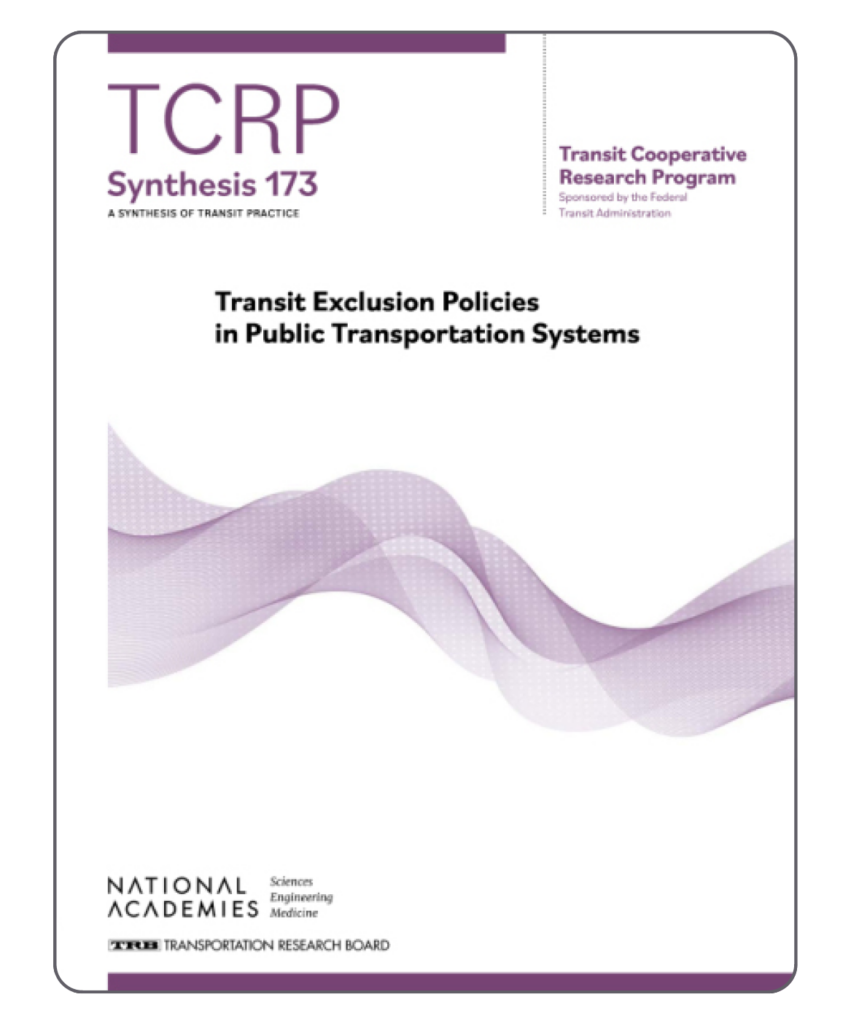
Transit Exclusion Policies in Public Transportation Systems
This report documents the practice of the use of transportation exclusion policies in North American transit systems. It is designed to help transit agencies in understanding the usefulness of such policies, as well as understanding the methods for creating, amending, or supplementing exclusion policies to maximize their effectiveness in reducing crime and disorder within their respective transit systems.
Transit Cooperative Research Program
January 2024
TOPICS: Policy and Planning , Safety and Health , Training
Contributor(s): National Academies of Sciences, Engineering, and Medicine; Transportation Research Board; Transit Cooperative Research Program; Patricia Bye; Deborah Matherly
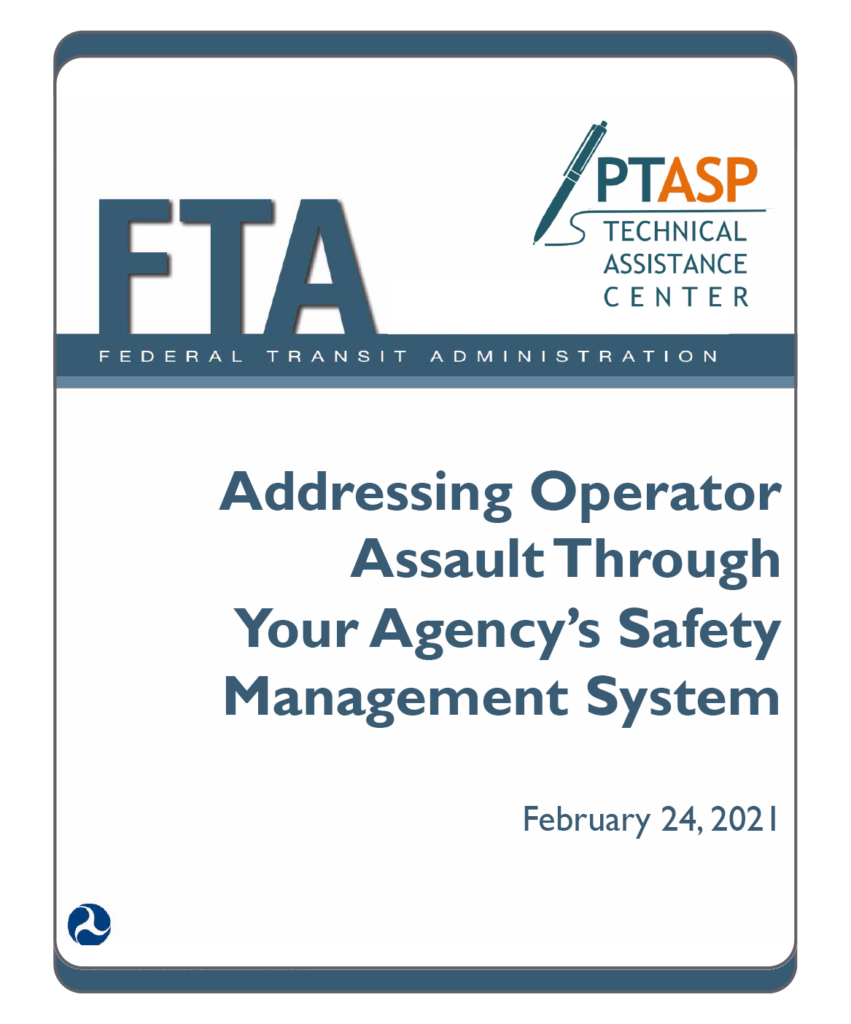
Using Your Safety Management System (SMS) to Protect Transit Workers from Assaults
FTA is working with transit agencies to address the ongoing risk of assaults on transit workers using Safety Management System principles and methods, which FTA adopted as the basis of its Public Transportation Safety Program and Public Transportation Agency Safety Plans (PTASP) regulation.
FTA has developed technical assistance resources to help transit agencies conduct safety risk assessments related to assaults on transit workers and develop safety risk mitigations.
Check out FTA’s full page of crime prevention assistance resources.
Federal Transit Administration
December 2023
TOPICS: Policy and Planning , Safety and Health
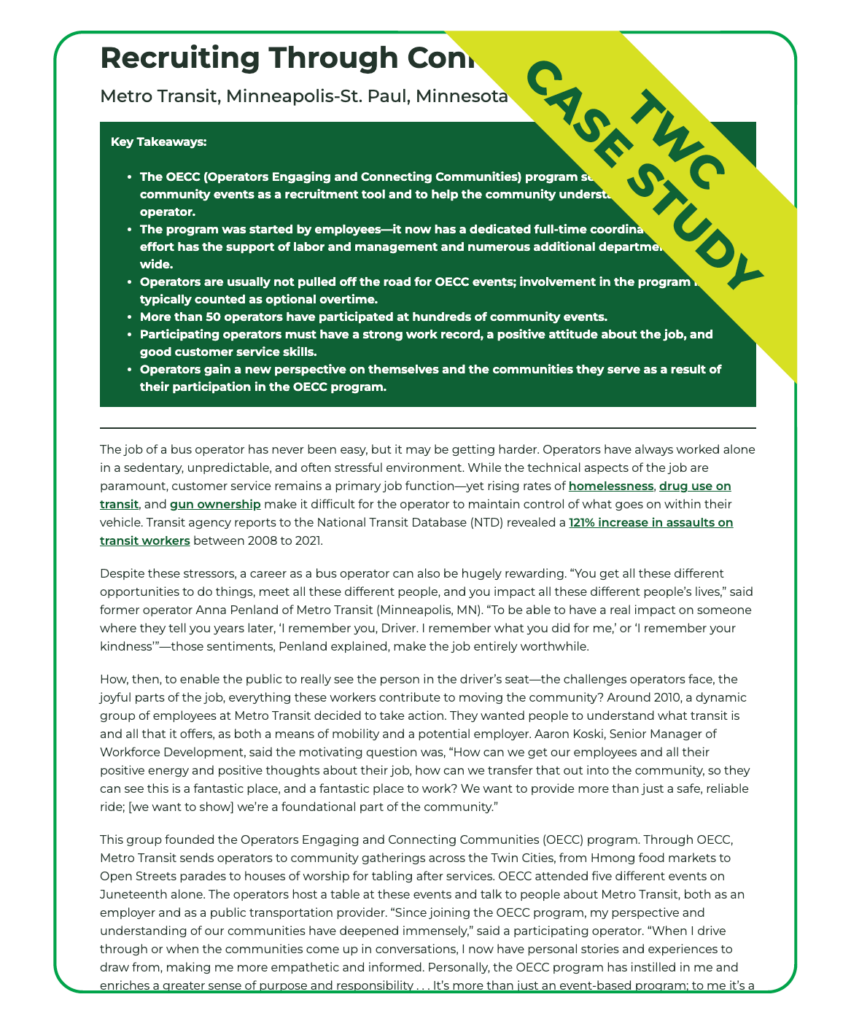
Recruiting Through Connection
This case study describes the OECC (Operators Engaging and Connecting Communities) program in Metro Transit, MN, which sends operators out to community events as a recruitment tool and to help the community understand the role of the operator.
Transit Workforce Center
November 2023
TOPICS: Hiring and Recruitment , Policy and Planning
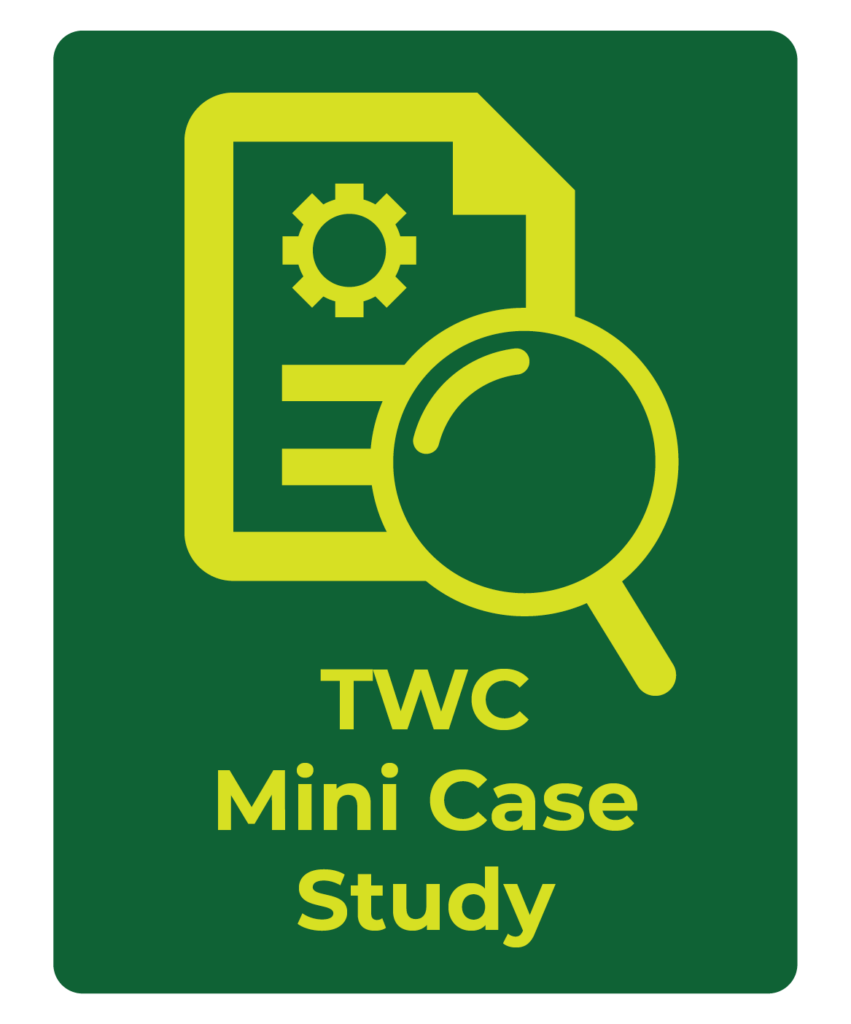
Approaches to Childcare Support in the Transit Industry: Prairie Hills Transit
Across the nation, the lack of access to affordable and accessible childcare is often a major employment barrier for workers in the transit industry. TWC hosted a pivotal discussion on this issue in the webinar, “Approaches to Childcare Support in the Transit Industry”.
Check out the presentation from Barb Cline, Executive Director of Prairie Hills Transit (Spearfish, South Dakota) who shares her approach to creating childcare solutions tailored for her transit employees. She will delve into the inception of the Prairie Hills program, their ongoing hurdles, and the successes that have marked their journey.
Transit Workforce Center
November 2023
TOPICS: Community Engagement , Policy and Planning , Retention , Workforce Shortage
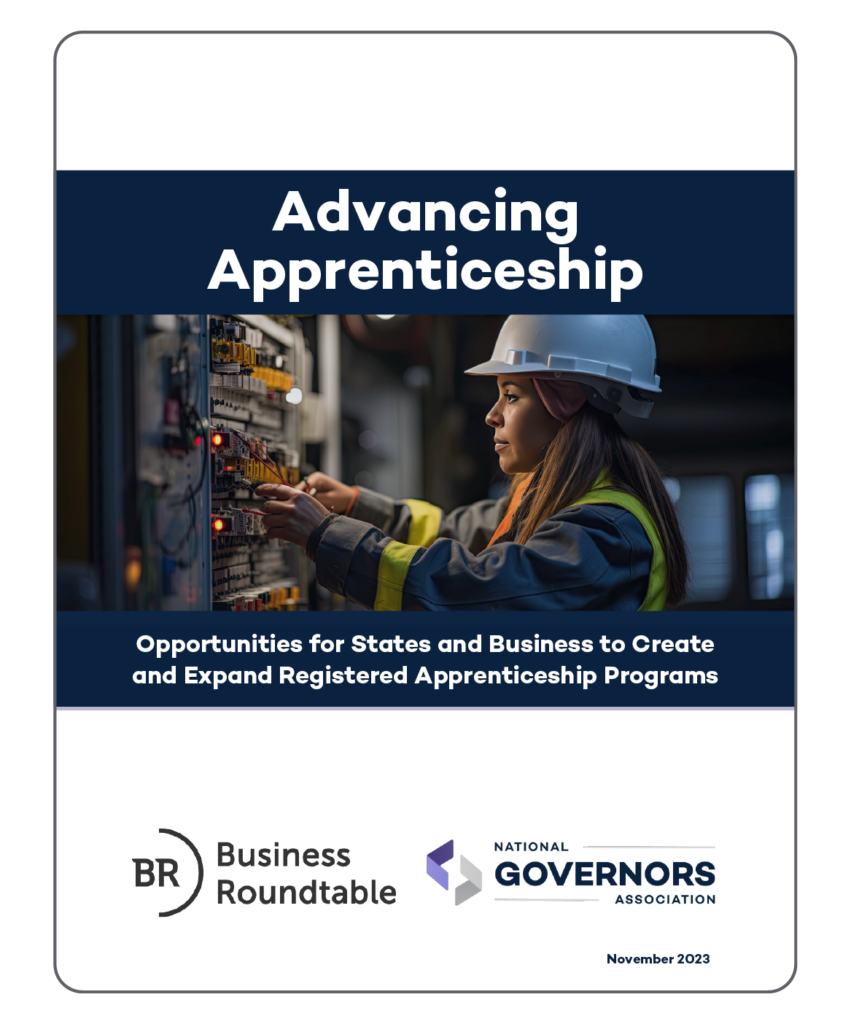
Advancing Apprenticeship: Opportunities For States And Business To Create And Expand Registered Apprenticeship Programs
This publication highlights the significance of Registered Apprenticeship Programs (RAPs) as one of several strategies and opportunities that employers and states can implement and offer to individuals as a viable path toward securing and prospering in a career. Registered Apprenticeship plays an important role in the U.S. economy and workforce ecosystem by satisfying employer talent needs while providing training and employment pathways for individuals in family-sustaining, in-demand careers. A registered apprenticeship is an intensive program that offers an individual paid on-the-job experience, coupled with classroom learning that together provides a jobseeker with the necessary skills to secure gainful employment.
National Governors Association
November 2023
TOPICS: Apprenticeship , Career Pathways , Policy and Planning
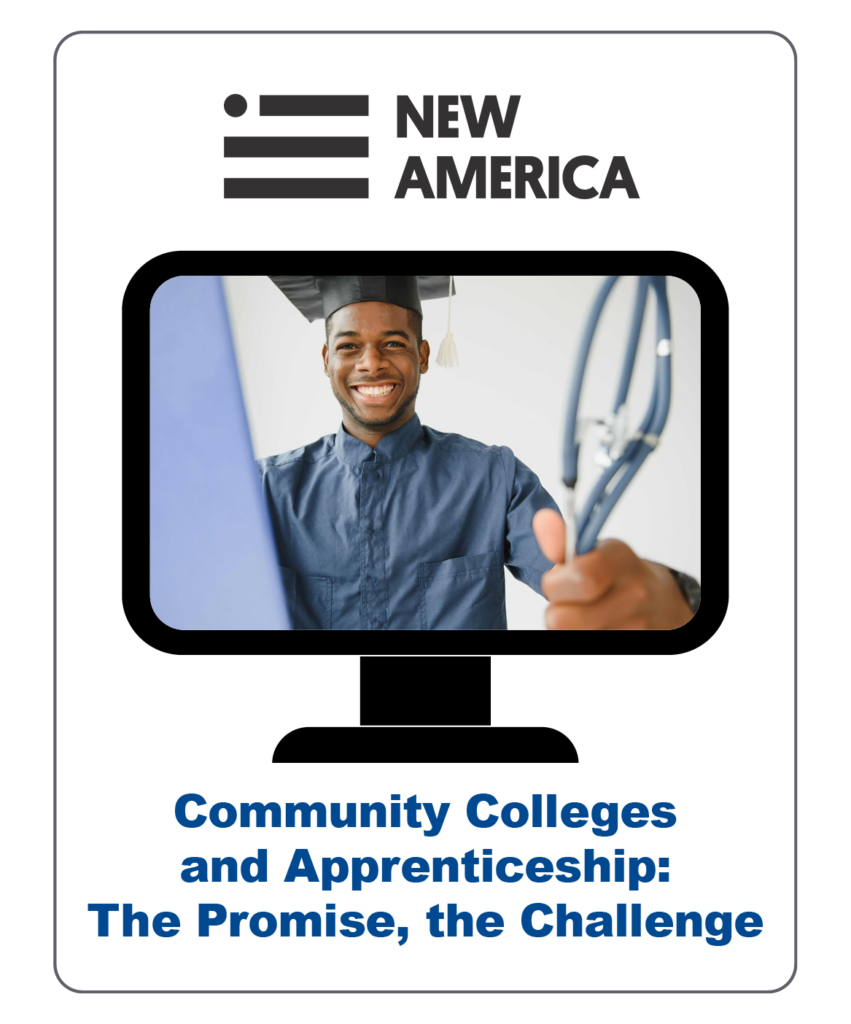
Community Colleges and Apprenticeship: The Promise, the Challenge
To better understand the challenges and opportunities facing community colleges that want to expand apprenticeship opportunities to their students, New America conducted a year-long study. They spoke to apprenticeship, workforce development, and community college leaders about the community colleges role in expanding apprenticeship.
New America Center on Education and Education Policy
November 2023
TOPICS: Apprenticeship , Career Pathways , Policy and Planning
Based on these conversations, we chose case studies and conducted in-depth interviews with leaders from the Community College System of New Hampshire’s ApprenticeshipNH, Arapahoe in Colorado, San Jacinto in Texas, and Howard Community College in Maryland’s programs in IT and cybersecurity, and Coastal Alabama Community College’s nursing apprenticeship.

Critical Conversations: The Public Transport Frontline Worker Crisis
Public transportation agencies across the country are facing challenges in attracting, recruiting, and retaining frontline employees. Critical Conversations provides insights from youth on transit’s frontline workforce crisis – bus and train operators, and entry-level mechanics. Researchers conducted a national survey targeting respondents under the age of 30, compiled agency-specific human resources information, and held focus groups asking participants to share their experiences and insights about challenges, lessons learned, and opportunities regarding the workforce crisis.
introducing youth to American infrastructure
November 2023
Contributors: Dr. Jamaal Schoby, Dr. Beverly Scott
The Barr Foundation provided support for the research element of this important youth empowerment and “people-readiness” initiative.
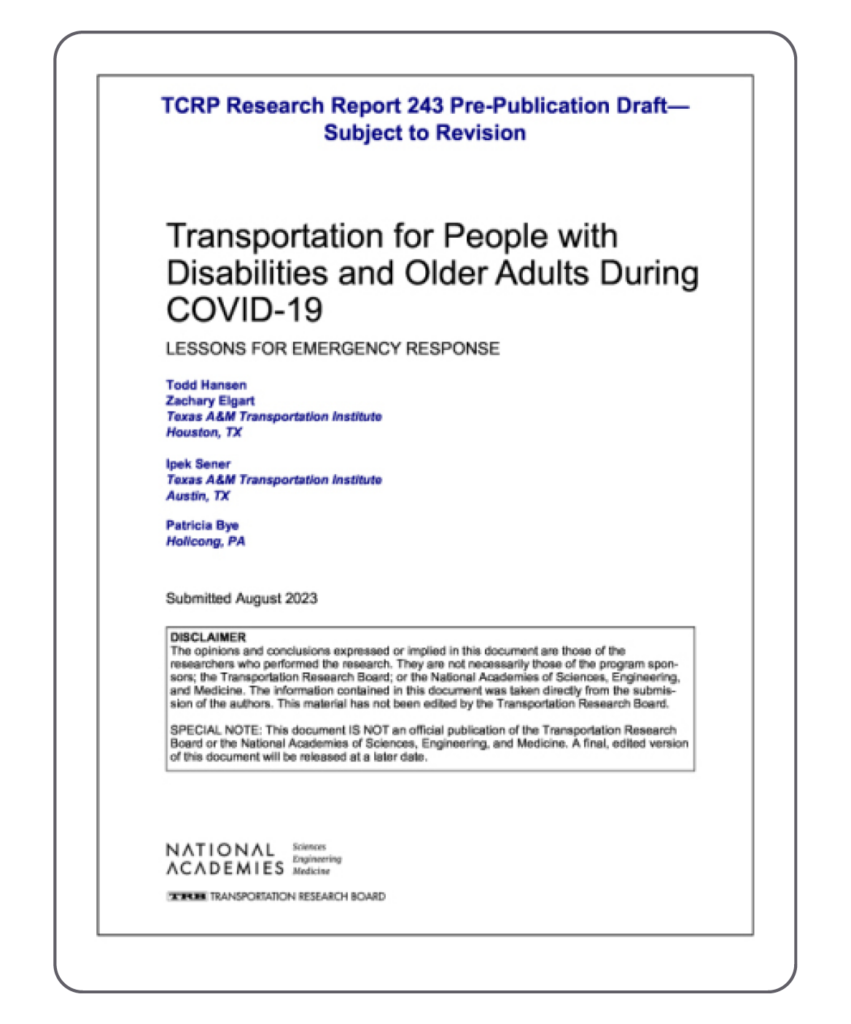
Transportation for People with Disabilities and Older Adults During COVID-19: Lessons for Emergency Response
This pre-publication report aims to provide transportation organizations (including transit agencies, specialized transportation providers, and other local government agencies and stakeholders) with helpful information and strategies on providing service for persons with disabilities and older adults in emergency situations.
Transportation Cooperative Research Program
October 2023
TOPICS: Community Engagement , Policy and Planning , Safety and Health
Contributor(s): National Academies of Sciences, Engineering, and Medicine; Transportation Research Board; Transit Cooperative Research Program; Todd Hansen; Zachary Elgart; Ipek Sener; Patricia Bye
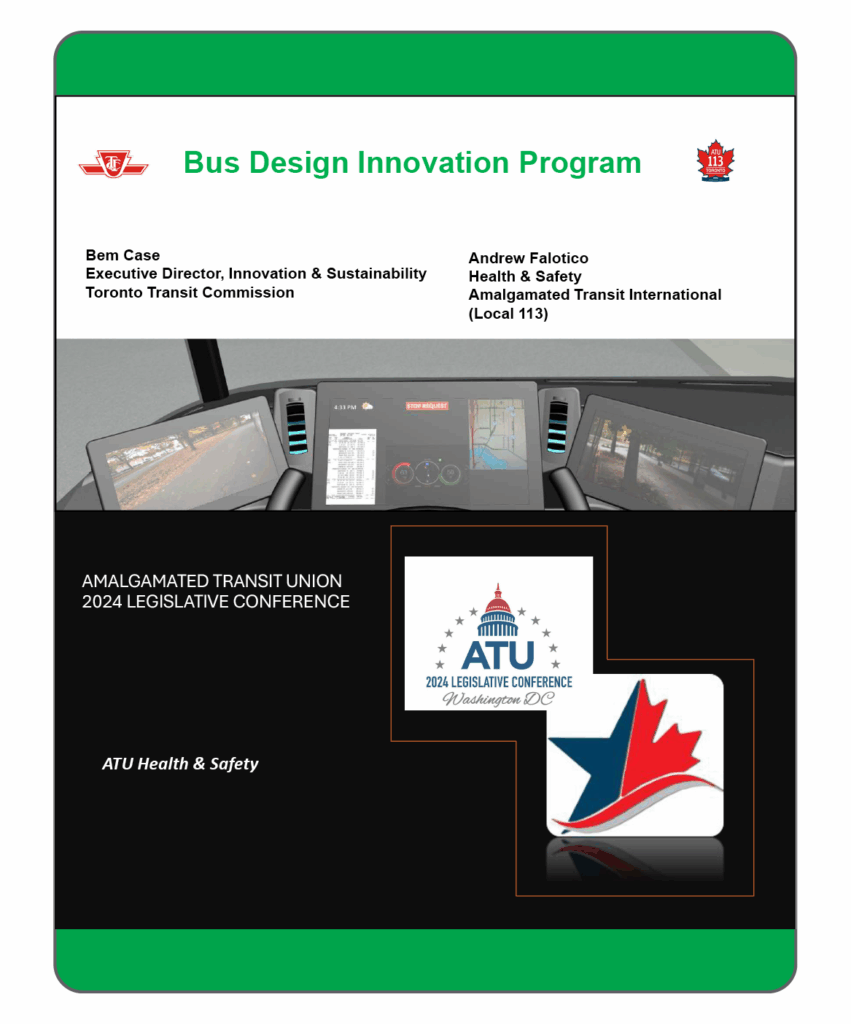
Bus Design Innovation Program
The Bus Design Innovation Project aimed to improve the security and environment of bus operators. The design provides a barrier that shields the operator’s workspace from the passenger area, which reduces the risk of assaults and protects against biohazards without decreasing view of mirrors. The design also improved ergonomics. The partnership between ATU International, ATU local 113, Centennial College, and Toronto Transit Commission enabled the development of a prototype, which was showcased at the ATU Canada Conference in September 2024.
ATU International; ATU local 113; Centennial College; Toronto Transit Commission
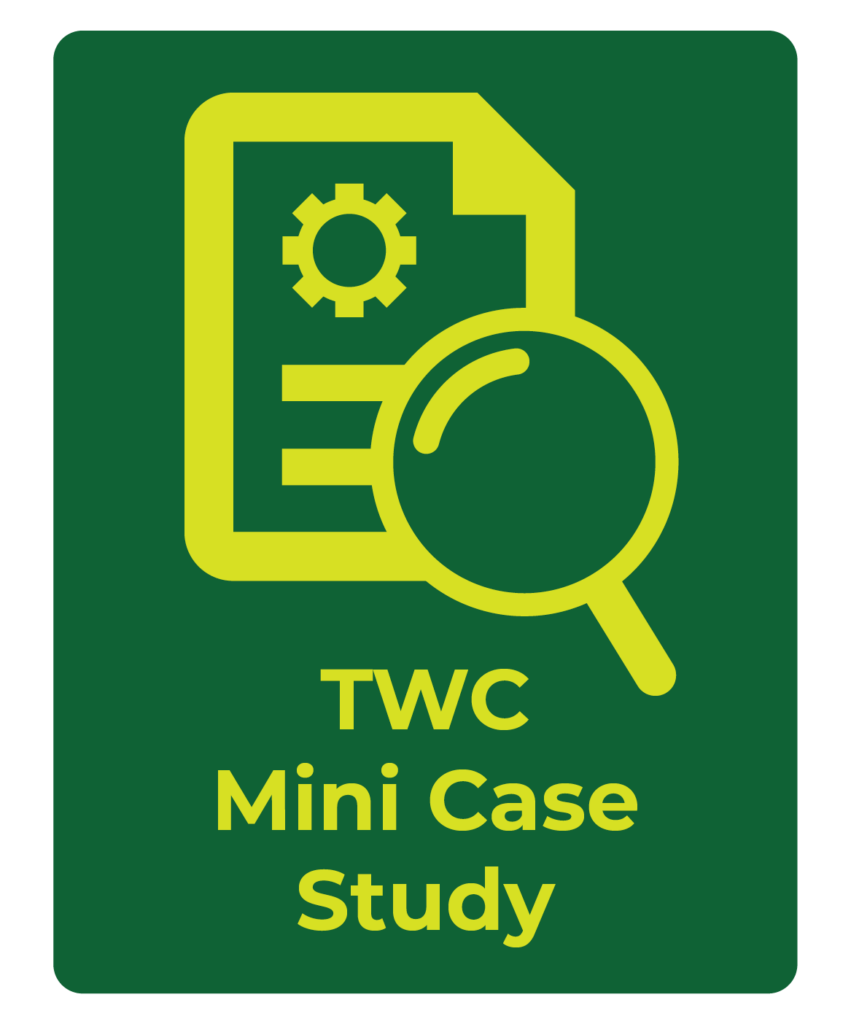
Approaches to Childcare Support in the Transit Industry
Transit Workforce Center
September 2023
- There are many ways to support the childcare needs of employees; there is no one-size-fits-all model.
- The models examined in this case study include a voucher system, an on-site center managed directly by the agency, and a discounted center managed by a contractor with supplemental referral services.
- Challenges remain, including childcare affordability and availability.
- Still, these programs can boost morale and attendance among working parents and caregivers.
At New York City’s Metropolitan Transit Authority (MTA), the first sign of a problem was attendance. Los Angeles Metro experienced a similar phenomenon of worker absences, which grew worse during the COVID-19 pandemic. At Prairie Hills Transit in South Dakota, the agency (like many employers in the community) struggled just to get workers in the first place. In community after community, public transit is suffering from low employee availability, and a key driver of the workforce shortage is clear—a lack of affordable childcare.
The good news for the public transit industry is that a variety of models already exist that support the childcare needs of frontline workers. This case study describes three such models: a voucher system, an on-site center managed directly by the agency, and a discounted center managed by a contractor with supplemental referral services. Across the spectrum of agency sizes—from a small rural agency to an agency serving one of the world’s largest cities—transit providers have opportunities to support their workers, both as employees and as parents.
Please see the summary table at the end of the case study for an overview of each of these programs.
Background: The Urgency of Childcare Needs
The United States used to have one of the highest rates of working women among Organization for Economic Cooperation and Development (OECD) countries, but in recent years, the U.S. rate has declined. As parents struggle to find stable access to childcare, they are forced to limit their workforce participation, leave employment altogether, or pay an often-unsustainable portion of their income towards a childcare program. Using data from the National Survey of Children’s Health, the Center for American Progress (CAP) estimated that in 2016 nearly two million Americans made career sacrifices due to issues with childcare.
As the United States, and in particular the transit industry, faces a difficult and ongoing labor shortage, it is important for mothers to be able to participate in the workforce if they choose. Even though women are less present in the labor force, families are becoming increasingly dependent on the maternal income. Only about 30 percent of families with children rely solely on a father’s income; women are primary or equal earners in about two-thirds of families. Women of color with children are even more likely than white women to be in the labor force, be primary breadwinners, and be in low-earning jobs (NWLC).
Despite this necessity, childcare remains a determining obstacle. An analysis of the 2016 Early Childhood Program Participation Survey (ECPP) indicated that half of American families struggle to find adequate childcare, with cost most commonly reported as a barrier. Another CAP analysis found that over half of Americans live in childcare deserts (areas with few or no options for childcare). The maternal workforce participation rate is an average of three percent lower in these deserts than in areas with adequate childcare. Hispanic/Latino families are more likely to reside in childcare deserts and more likely to report location as an obstacle to obtaining childcare. The prevalence of location as an obstacle can be further explored with these interactive childcare desert maps.
Even small steps to alleviate childcare burdens can help parents join the workforce. A study of Washington, DC’s universal, full-day preschool program found that since the program’s inception, the rate of mothers participating in the city’s workforce increased by 12 percent. Subsidies to support parents in finding childcare assistance can have positive impacts on their workforce participation as well. A study of childcare and parent labor force participation found that just a 10 percent decrease in childcare costs could lead to a 0.5-2.5 percent increase in maternal employment. A paper from the National Bureau of Economic Research indicated that if childcare costs were capped at seven percent of income, the rate of low-income mothers in full-time jobs would increase by 18 percent and the overall maternal employment would increase by 10 percent, which would add 12 million mothers to the workforce. For individual families and the overall economy, these increases are important, and they are essential to mitigating the workforce shortage in the transit industry.
Childcare Examples in Public Transportation
Transport Workers Union (TWU) Local 100 – New York City Transit Child Care Fund (CCF)
In New York City, TWU Local 100 and NYC Transit came together to create the Child Care Fund (CCF), a financial assistance program designed to support the families of Local 100 members who need help paying for childcare expenses. In 2002, Local 100 proposed a new benefit for its members in the collective bargaining agreement: funds through CCF to support parents of young children in obtaining childcare. MTA management, concerned about the effects of worker absences on its operations, agreed to the new benefit. “Workers were doing the calculus of whether it’s worth it to spend X amount on childcare versus just staying home and not working and caring for the child instead. Childcare is very expensive,” said Charles Jenkins, Director of TUF. This no-win choice weighed particularly heavy on women. Jenkins recounted how historically, transit has been a predominantly male industry with few accommodations for women, even proper bathrooms, until recently. Long-standing worker shortages in public transit have led the industry to begin thinking differently.
CCF provides financial support to parents for either a year-round childcare program or for summer camps; the employee can choose. The employee also has the discretion to choose who cares for their child—CCF covers about forty percent of the cost of childcare in a licensed facility (up to $320 weekly), and about twenty percent (up to $160 weekly) if the provider is not licensed—for example, if the caregiver is a family member. If the employee chooses the summer camp option, fifty percent is covered (up to $1,000). The benefit is offered to all employees in good standing who have completed one year of employment, until the employee’s child reaches age 12.
The program is not without challenges. It is first-come-first-served, with limited funds, although most people who seek out the benefit do receive it. Some members report they didn’t know about the fund, and even with a subsidy, childcare remains expensive. Still, CCF’s support helps. “Our members are very thankful for the benefit,” Jenkins said, and the agency and union have found that attendance is high when adequate childcare is in place.
Prairie Hills Transit (Spearfish, South Dakota)
Over a thousand miles away and in a much more rural area, the childcare landscape looks different. Prairie Hills, SD, has struggled for years with a lack of childcare providers in the community. Around 2010, Prairie Hills Transit (PHT) Executive Director Barb Cline noticed that federal funds were available for the construction of new buildings. Thinking creatively, she pursued grants and loans from the U.S. Department of Agriculture for the purpose of constructing a childcare facility within the PHT campus. “We knew this was a community problem, bigger than our own staff,” Cline reported. With only about 50 employees, PHT’s staff didn’t have enough children for a center limited to employees, so the agency opened its doors to the wider community.
Today, this licensed, on-site childcare center can accommodate up to 41 children. To handle demand, PHT is expanding to a new rented location which can enroll another 25 or so children. Because childcare has a low profit margin, no external company would take on the contract, so PHT hired its own manager for the program. Now that the building has been constructed, the program sustains itself financially. Employees of PHT receive a thirty percent discount, while other parents in the community pay full price (though some use government benefits to pay and segmented payment plans are available). Children don’t age out formally, but most enrollees are age five or younger. PHT has found that male and female employees alike take advantage of the program. Recognizing that employees won’t be able to transport their children from school to after-school childcare in the middle of a shift, PHT obtained a separate bus with car seats to provide those trips themselves.
PHT reported several challenges it encountered as the program unfolded. Licensing requirements for childcare centers have gotten stricter and PHT has had to invest time to adapt. Another challenge for the agency has been the “human versus the financial”: if a parent only wants part-time childcare, the center wants to accommodate the family’s needs, but the accommodation results in the loss of a full-time spot and thus a loss of funds. Availability of childcare remains a challenge because demand is so high, even though PHT employees receive some degree of priority; “our waiting list is 12 pages long,” Cline said. Even with a subsidy, affordability is still a question for some families. However, employee turnover is low at PHT and childcare may be part of the reason.
PHT has realized that because of the geographic dispersion of employees and the low turnover of children in the center, some employees are not able to take advantage of the center’s offerings. As the program looks to the future, PHT is looking to build a second shared-use facility to expand capacity.
LA Metro (Los Angeles, CA)
Like so many other transit agencies, Los Angeles Metro found its workforce depleted as the COVID-19 pandemic progressed. The agency recognized that a lack of childcare delayed re-entry into the workforce.
LA Metro offers three options for their employees to find support The first is, through a memorandum of understanding, a partnership with Pathways LA to provide referral services to LA Metro employees seeking childcare. Pathways LA gives parents digestible information about childcare options and assistance navigating the possibilities available. LA Metro also utilizes its employee assistance program through ComPsych Corporation Guidance Resources, which connects employees to a Work-Life Specialist. This specialist provides personalized resources custom to the needs of the individual employees seeking childcare in their area. The third support is more recently established: LA Metro has leased a space it owns, beginning June 2023, to Pathways LA for a childcare center within walking distance from Metro’s central maintenance facility and headquarters. This arrangement was established through a competitive bid process. The center is not exclusive to LA Metro employees, but employees receive a 15% discount and get priority enrollment. The center serves children up to age 5 and offers everything from an infant center to an educational curriculum for older children to special needs programming. LA Metro has hired a coordinator to oversee the relationship between Pathways LA and Metro, which has been indispensable to facilitating a smooth partnership, the agency reported.
As childcare needs have evolved, LA Metro has persevered in seeking the best options for its employees within available resources. Before the Pathways LA partnership, LA Metro had partnered with a different third-party provider; with the new partnership, largely because of inflation, prices have risen and employees that transferred from one provider to the other were impacted by the change. Prices were already steep and employees felt the increase keenly. Another challenge has been the limitations of a single facility location: the fact that the center is close to LA Metro’s headquarters and central maintenance garage reduces travel and logistics for some parents, but not all Metro employees report to those locations. For LA Metro, a multi-pronged approach has been most successful.
Conclusion
Finding adequate childcare services is an imperative step in entering or re-entering the workforce, but it’s not easy for every parent. In the face of a widespread workforce shortage, if transit agencies are able to help parents with this step, it can help rebuild and maintain their workforce. These examples provide evidence that agencies of varied sizes across the county can find a childcare supportive service program that works for them. LA Metro found that neither subsidies nor self-administration of a childcare center was realistic for them, but partnerships with an established and trusted provider could further their employees’ access to childcare resources. On the other hand, Prairie Hills Transit, facing a childcare desert in their community, established their own center. Meanwhile, MTA and TWU Local found that cost, not availability, was the primary limiting factor for their employees, and they were able to address that challenge for many families. Other transit agencies can take similar steps, utilize their own unique resources, and learn from the challenges faced in these examples to facilitate access to childcare services for their employees, which in turn will contribute to a stronger and more reliable workforce.
Summary of MTA/TWU Local 100, Prairie Hills Transit, and LA Metro Childcare Programs
For more information on these programs, contact:
- Barb Cline, Prairie Hills Transit: bkcline@prairiehillstransit.com
- Jodi Stewart, LA Metro: stewartj@metro.net
- Shayna Gleason, TWC: sgleason@transportcenter.org
Contributing Authors: Shayna Gleason, Michaela Boneva
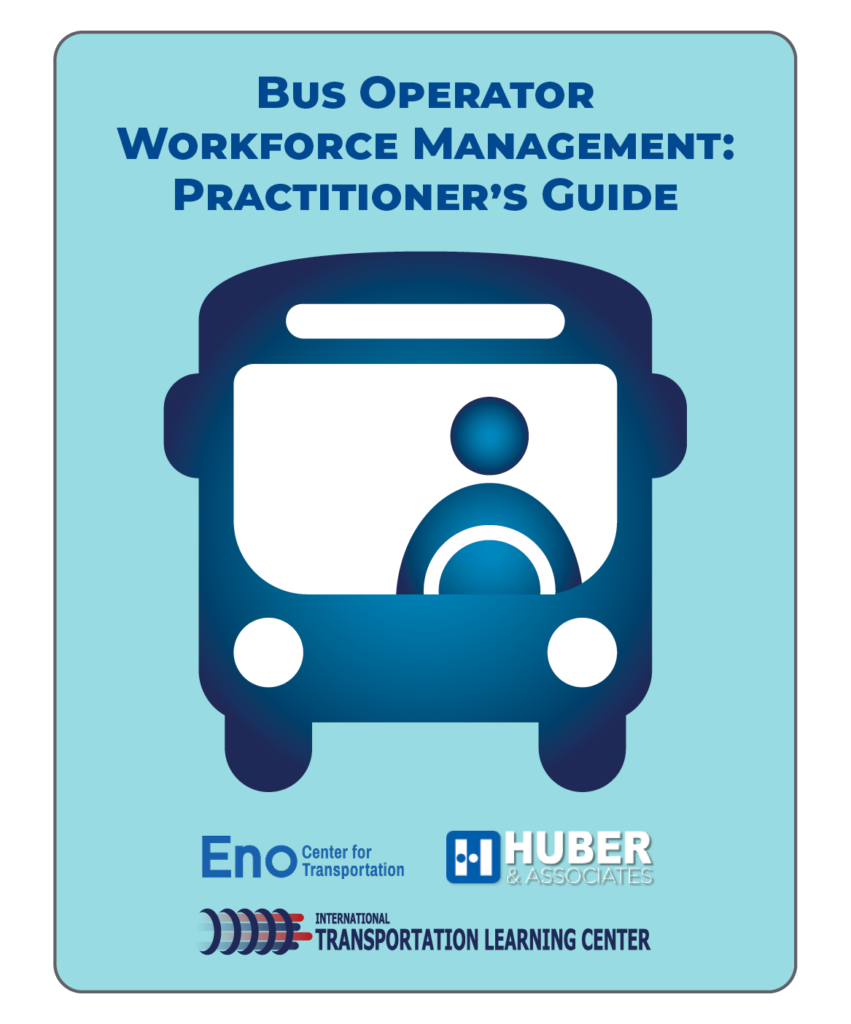
Bus Operator Workforce Management: Practitioner’s Guide
This report, produced by the Eno Center for Transportation, International Transportation Learning Center (ITLC), and Huber & Associates, is a practitioner’s guide that provides recommendations and resources enabling transit agencies to better assess, plan, and implement their operator workforce management programs. A link to a related TRB webinar is also included.
Transit Cooperative Research Program
August 2023
Contributor(s): National Academies of Sciences, Engineering, and Medicine; Transportation Research Board; Transit Cooperative Research Program; Robert Puentes; Philip Plotch; Brianne Eby; Paul Lewis; Karitsa Holdzkom; Xinge Wang; Douglas Nevins; Kenyon Corbett; Melissa Huber

Flagstaff Mountain Line Economic Contribution Analysis (FY 2022)
This study was requested by Mountain Line and was conducted by the Economic Policy Institute (EPI) housed in the W. A. Franke College of Business at Northern Arizona University. Its purpose is to provide Flagstaff city residents and decision makers with an understanding of the local economic benefits Mountain Line provides, including jobs supported by Mountain Line.
Northern Arizona University Economic Policy Institute
August 2023
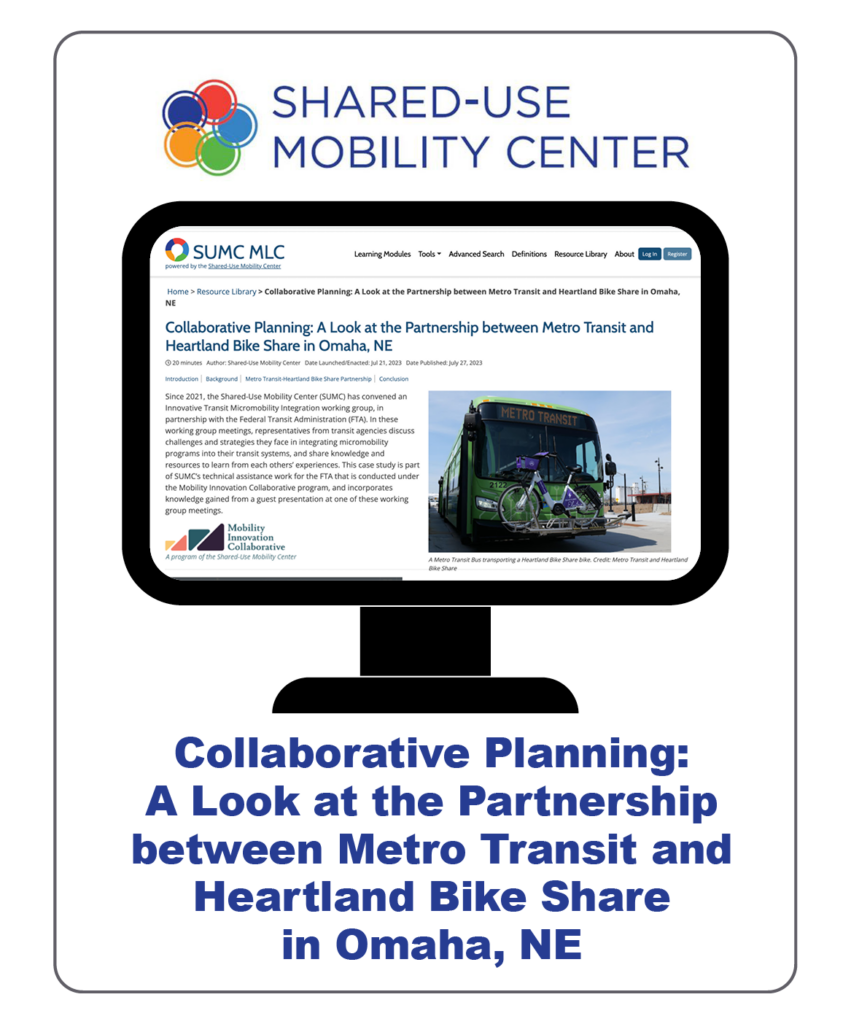
Collaborative Planning: A Look at the Partnership between Metro Transit and Heartland Bike Share in Omaha, NE
In Omaha, Nebraska, the city’s public transit provider Metro Transit and non-profit bikeshare provider Heartland Bike Share have been collaborating on ways to make biking and transit more connected and more appealing in their community. This case study examines the partnership and how transit and micromobility integration can benefit a city, support both modes, and provide more options for travelers.
Shared-Use Mobility Center
July 2023
TOPICS: Policy and Planning
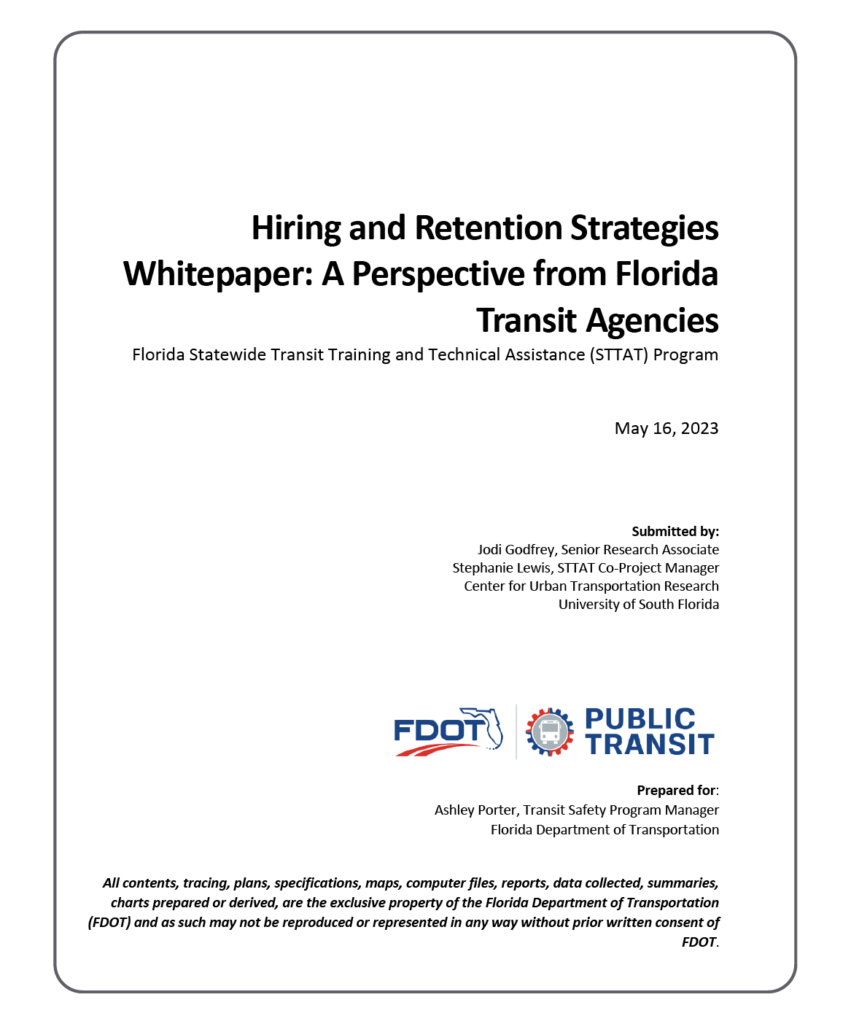
Hiring and Retention Strategies Whitepaper: A Perspective from Florida Transit Agencies
This study examines what transit agencies are doing to address hiring and retention challenges, what strategies are working, and what problems still need to be solved. The report includes six case study sites from Florida transit agencies and one non-Florida transit agency, that were selected due to a variety of characteristics, including partnerships and implemented service changes.
Center for Urban Transportation Research
June 2023
TOPICS: Hiring and Recruitment , Policy and Planning , Retention
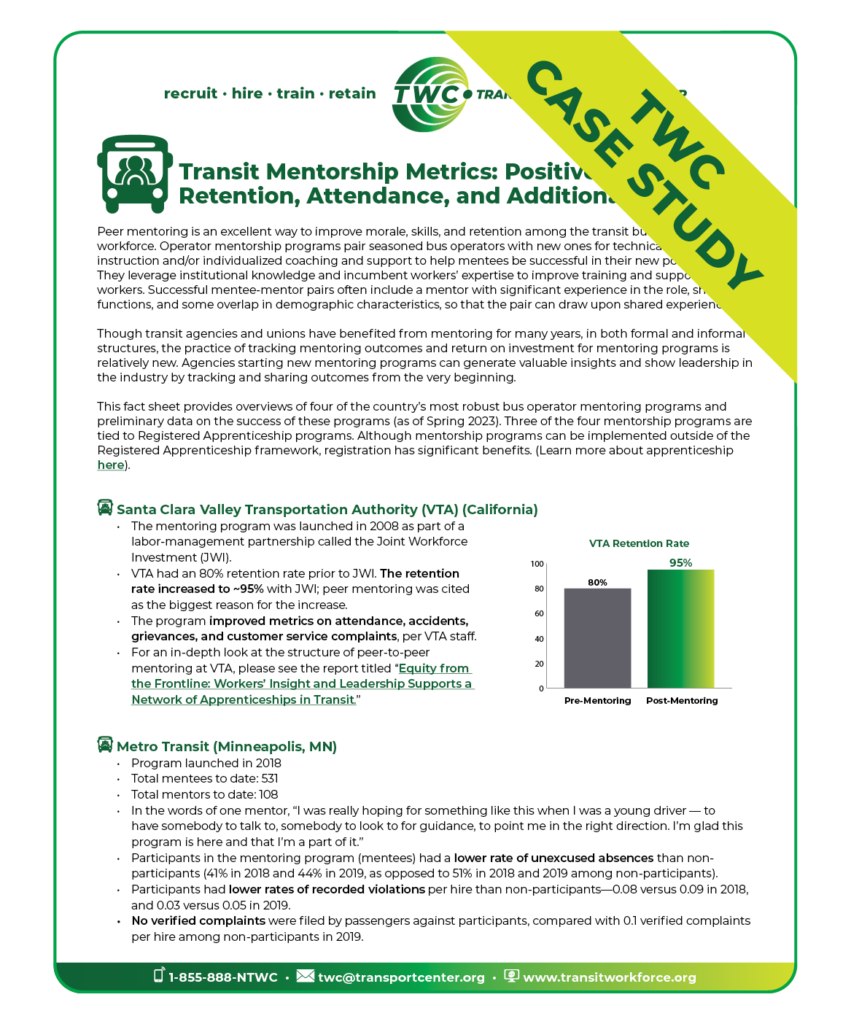
Transit Mentorship Metrics: Positive Signs for Retention, Attendance, and Additional Outcomes
Transit Workforce Center
June 2023
TOPICS: Apprenticeship , Mentorship , Policy and Planning , Retention , Training
This fact sheet provides overviews of four of the country’s most robust bus operator mentoring programs and preliminary data on the success of these programs (as of Spring 2023). Operator mentorship programs pair seasoned bus operators with new ones for technical skill instruction and/or individualized coaching and support to help mentees be successful in their new positions. They leverage institutional knowledge and incumbent workers’ expertise to improve training and support for new workers. The Mentoring Fact Sheet provides insight into the role mentorship programs can play in improving retention rates of workers, decrease unexcused absences, reduce rates of recorded violations, and lower complaints.
Contributing Authors: Shayna Gleason, Douglas Nevins, Michaela Boneva
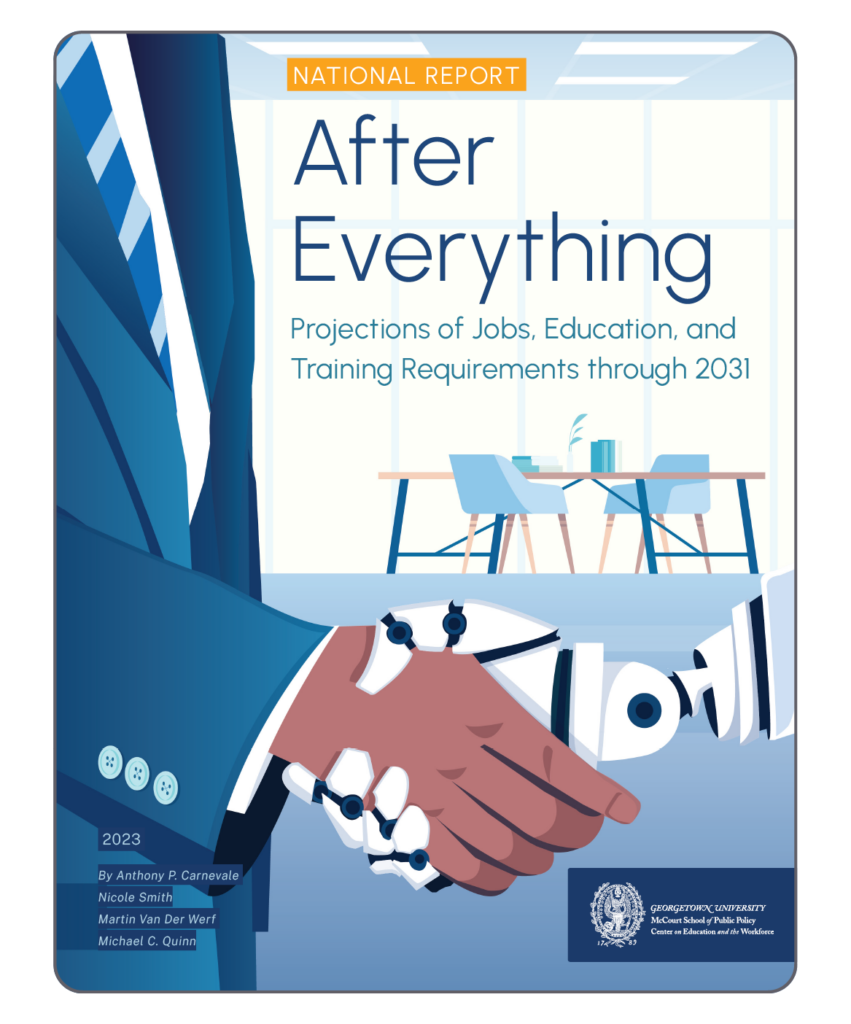
After Everything: Projections of Jobs, Education, and Training Requirements through 2031
By 2031, 72 percent of jobs in the US will require postsecondary education and/or training. Between 2021 and 2031, there will be 18.5 million job openings per year on average, and some 12.5 million of these annualized openings will require at least some college education. After Everything: Projections of Jobs, Education, and Training Requirements through 2031 includes a national overview of job projections and their educational requirements across industries, occupational clusters, and detailed occupational groups. These latest projections demonstrate the central role postsecondary education plays in preparing the workforce of the future.
Georgetown University Center on Education and the Workforce
June 2023
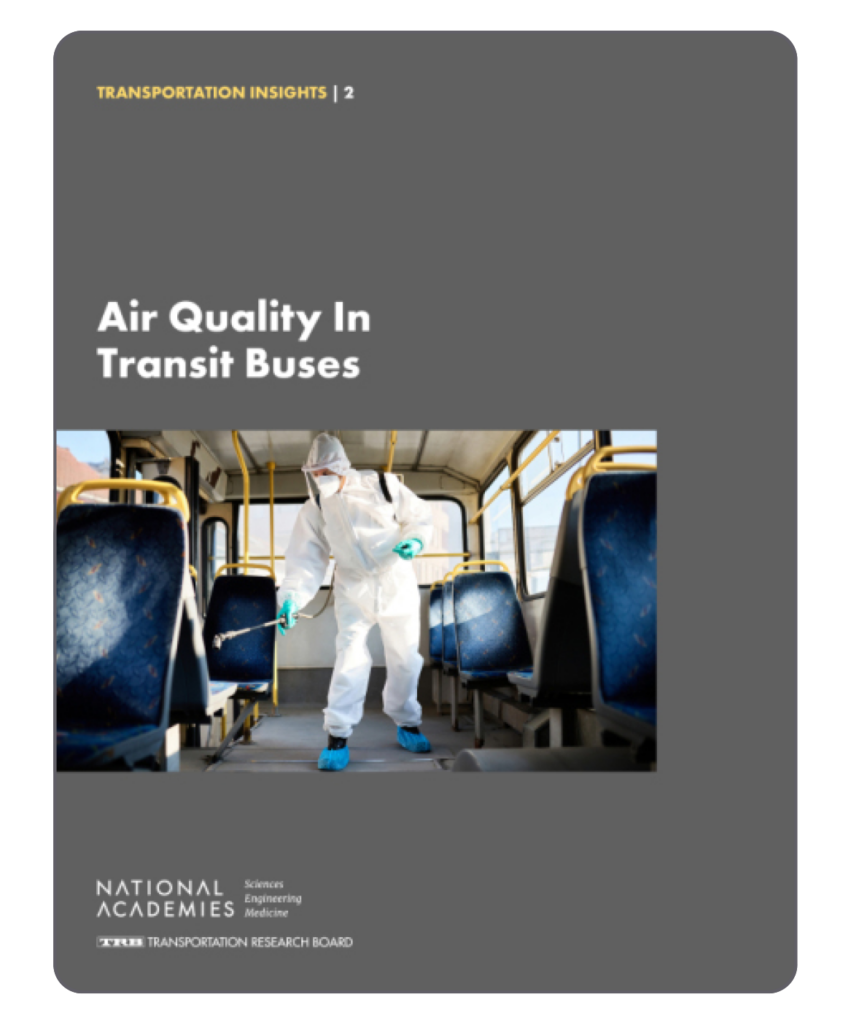
Air Quality in Transit Buses
This report provides a summary from a TRB Transit Cooperative Research Program (TCRP) Insight Event about the air quality in transit buses, particularly since the start of the pandemic. Since then, an increased understanding of infectious disease in confined spaces and the role of droplets and particles in transmission has been increasingly important to the bus industry. At this event, senior transportation executives; representatives from federal, state, and local government; and representatives from technology, consulting, academia, and engineering to discuss opportunities and the challenges of implementing air quality control in buses.
Transportation Research Board
May 2023
TOPICS: Policy and Planning , Safety and Health
Contributor(s): National Academies of Sciences, Engineering, and Medicine; Transportation Research Board; Transit Cooperative Research Program; Laura Williams
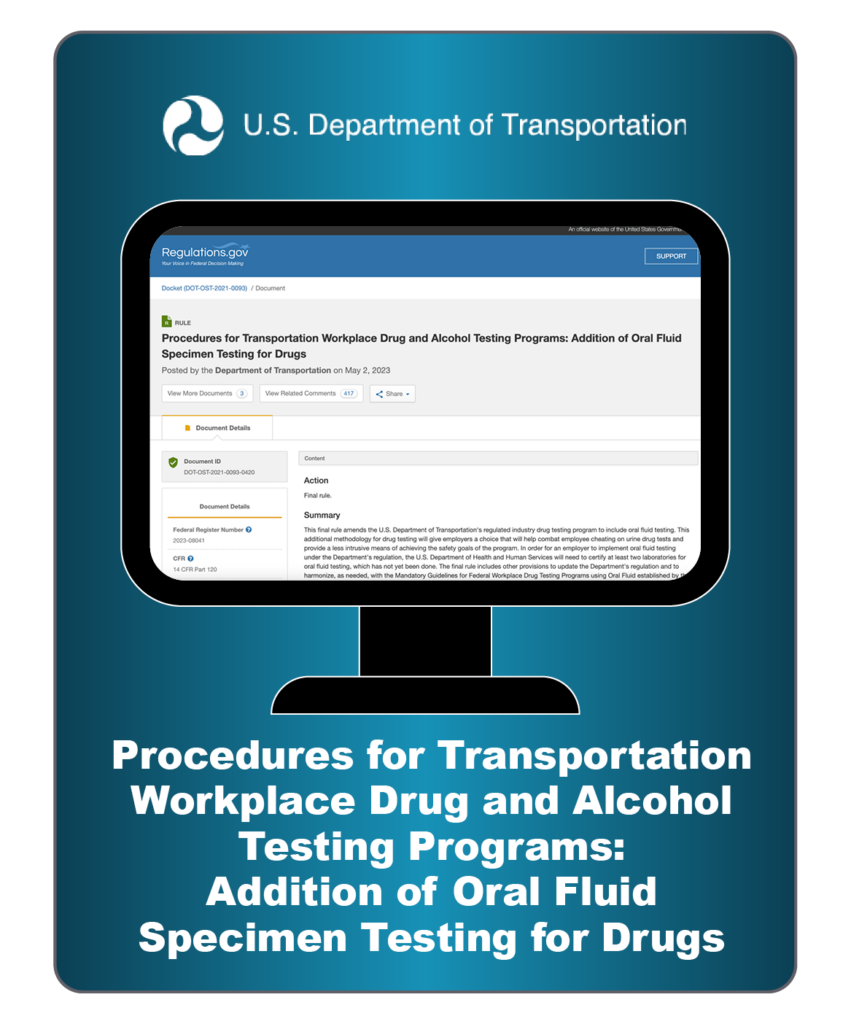
Procedures for Transportation Workplace Drug and Alcohol Testing Programs: Addition of Oral Fluid Specimen Testing for Drugs
This rule amends the U.S. Department of Transportation’s regulated industry drug testing program to include oral fluid testing. This additional methodology for drug testing will give employers a choice that will help combat employee cheating on urine drug tests and provide a less intrusive means of achieving the safety goals of the program.
Department of Transportation
May 2023
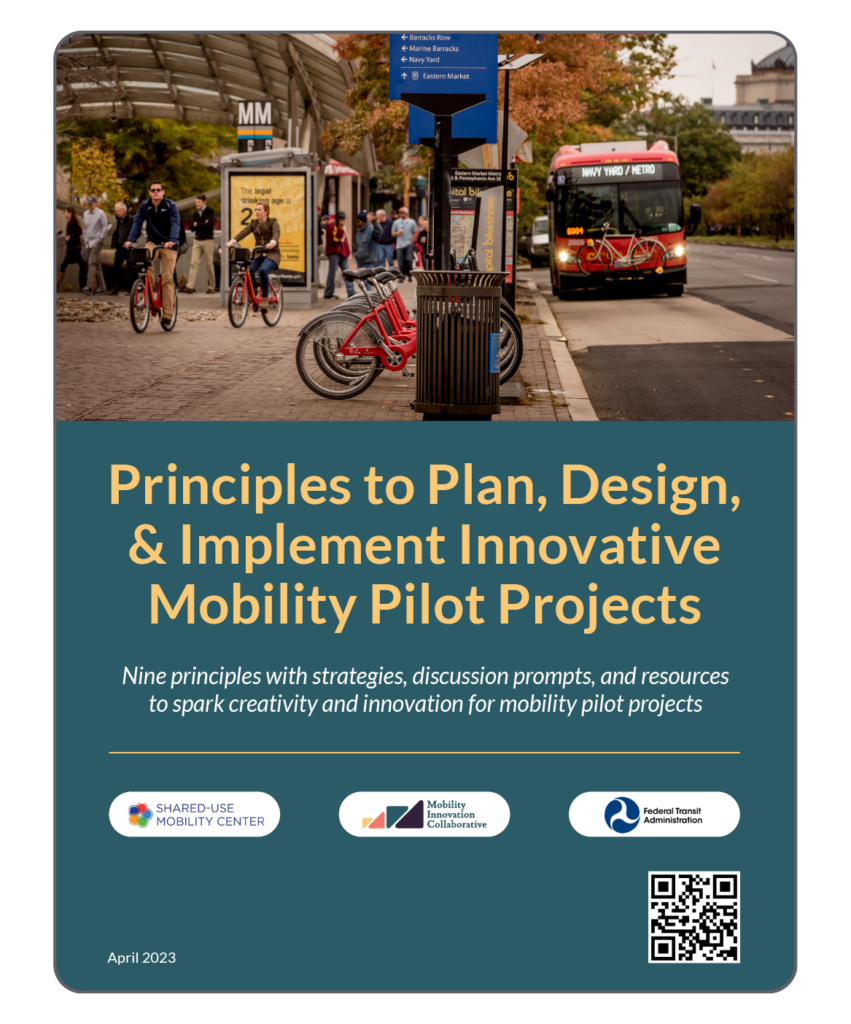
Guidebook for Mobility Innovation: Principles to Plan, Design, & Implement Innovative Mobility Projects
Shared-Use Mobility Center
April 2023
TOPICS: Policy and Planning , Training
This guidebook is designed to help mobility innovators in the transportation sector while developing and implementing a pilot project. It provides a series of principles to better plan, design, and implement innovative mobility pilot projects. These principles have supporting information about strategies to execute this principle, examples of this principle in action, resources about this principle, and questions to prompt team discussions. The guidebook includes advice and support for training transit workers during a pilot project.
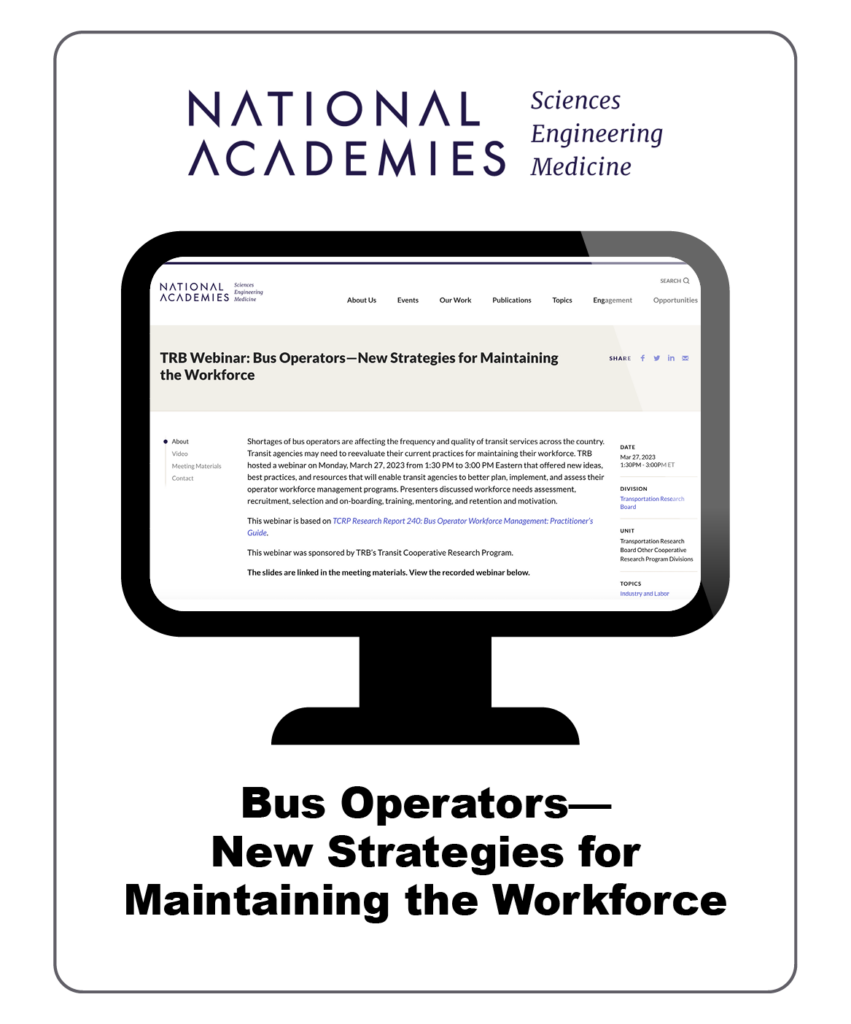
Bus Operators—New Strategies for Maintaining the Workforce
This webinar discusses the ideas, best practices, and resources that will enable transit agencies to better plan, implement, and assess their operator workforce management programs as described in the Bus Operator Workforce Management: Practitioner’s Guide. Presenters discussed workforce needs assessment, recruitment, selection and on-boarding, training, mentoring, and retention and motivation.
Transit Cooperative Research Program
March 2023
TOPICS: Apprenticeship , Hiring and Recruitment , Mentorship , Policy and Planning , Retention , Workforce Shortage
Webinar agenda and presenters
- Bus operator training and retention – Xinge Wang, International Transportation Learning Center
- Lessons from Florida – Trish Collins, Pinellas Suncoast Transit Authority
- Lessons from the Midwest – George F. Fields, Greater Cleveland Regional Transit Authority
- Question and answer session moderated by Robert Puentes, Eno Center for Transportation
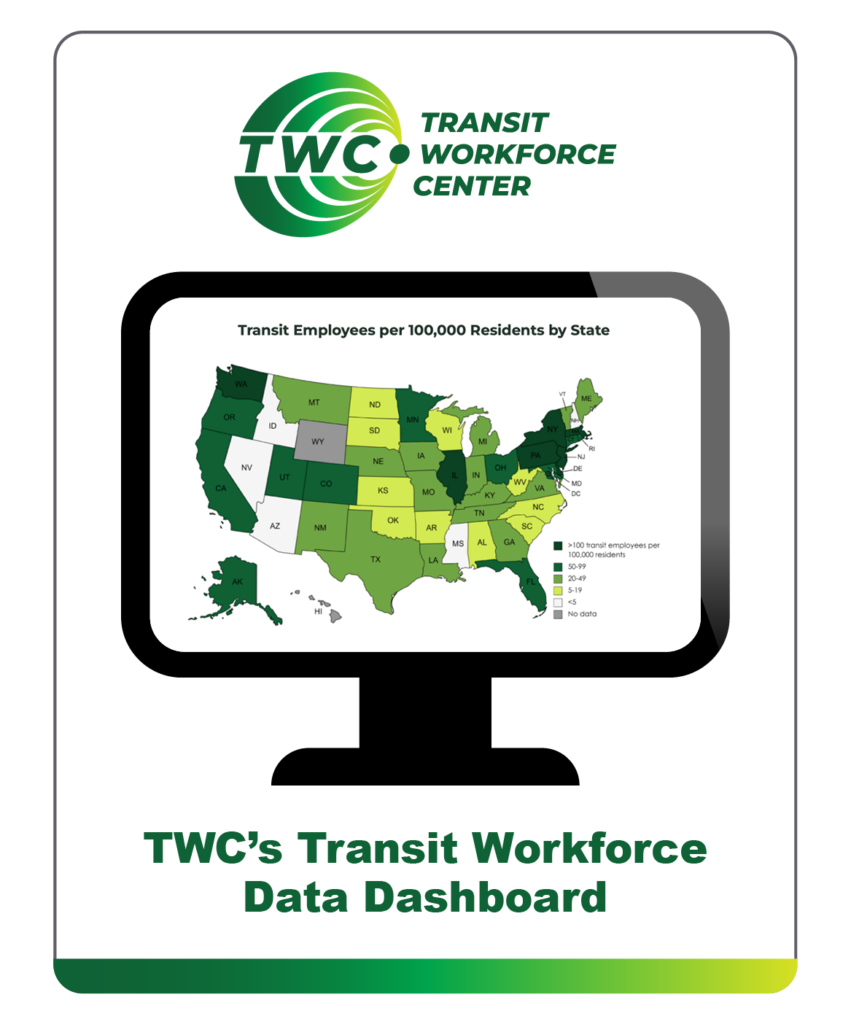
TWC’s Transit Workforce Data Dashboard
Launched in March, 2023, the Transit Workforce Data Dashboard presents quantitative, descriptive data about the composition of the transit workforce and trends in transit employment using a series of charts and graphics. This information is relevant for industry discussions in a range of contexts, including: strategic workforce planning in recruitment, retention, and other areas; examining and addressing opportunities and challenges related to workforce demographics; and identifying training and funding needs.
Transit Workforce Center
March 2023
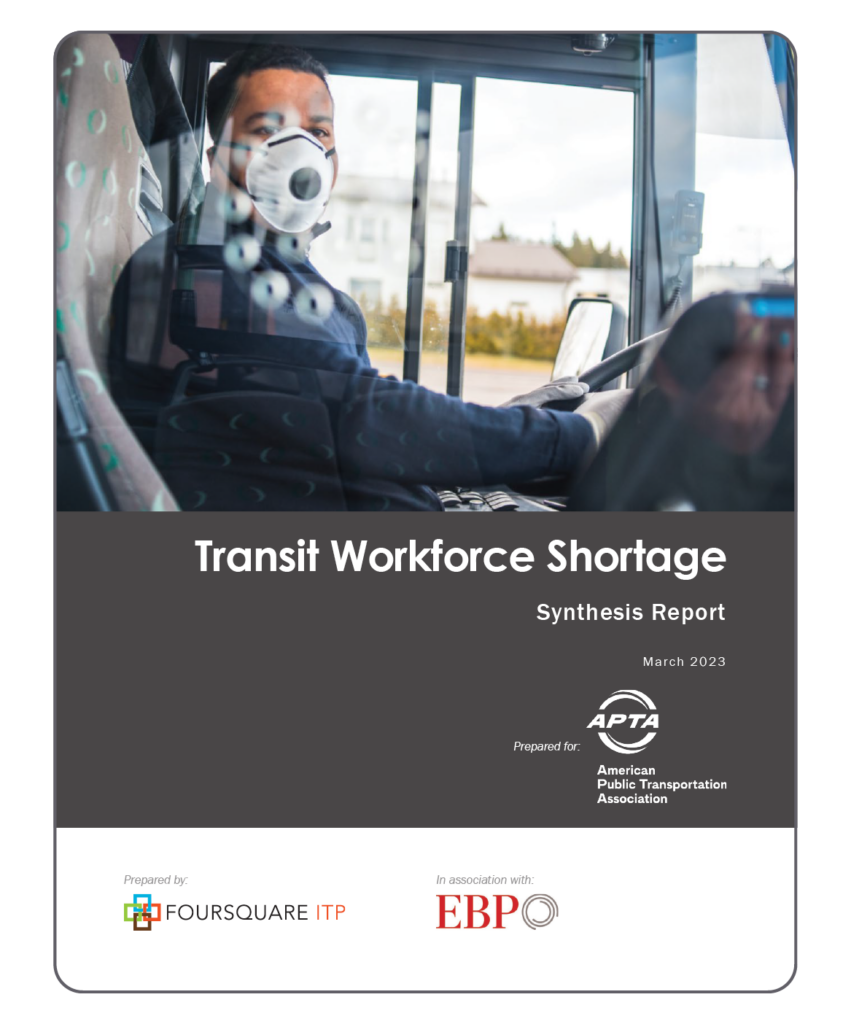
Transit Workforce Shortage: Synthesis Report and Toolkit
The Transit Workforce Shortage Study builds a framework for APTA, its members, and its partner organizations to better understand the workforce shortage’s causes and provides best practices for recruiting, hiring, and retaining transit operations workers.
American Public Transportation Association
March 2023
APTA’s Transit Workforce Shortage Study combines information from a survey of public transit workers and interviews with public transportation agencies to provide insight into ways to address the national shortage of transit workers. The report provides information on actions agencies have taken to address the workforce shortage, and the toolkit provides step-by-step answers to workforce shortage scenarios agencies are facing every day.
This report builds on findings from the first interim report.
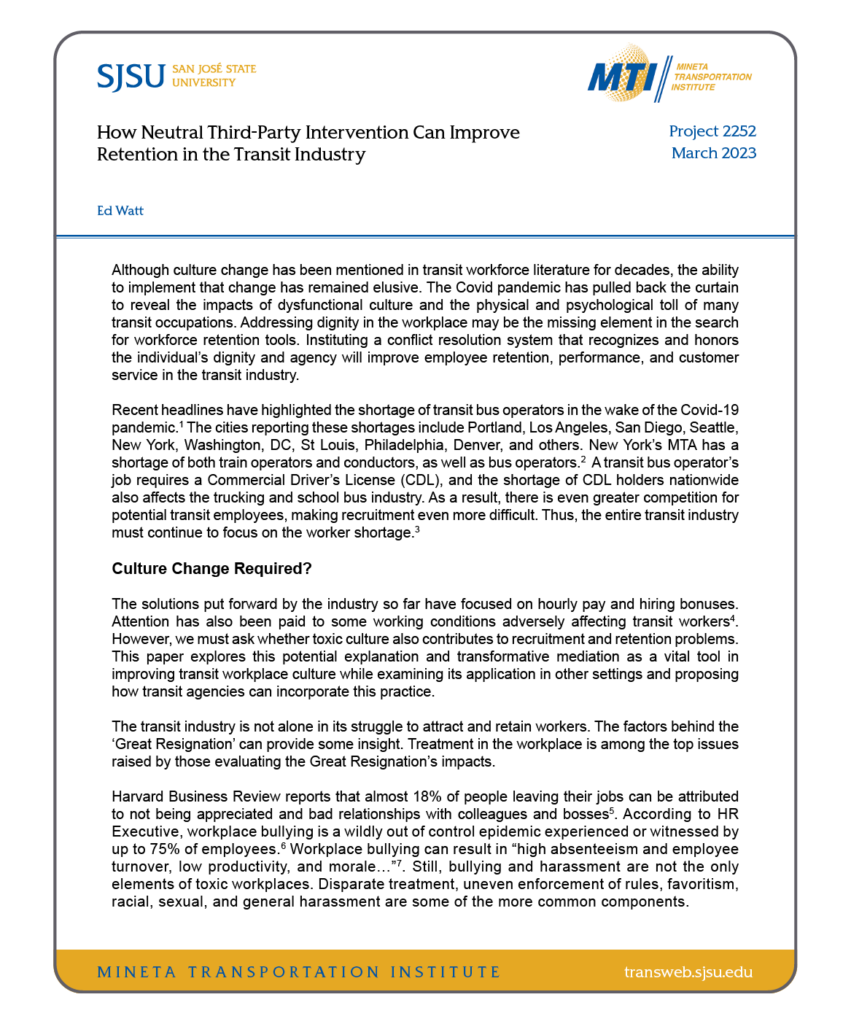
How Neutral Third-Party Intervention Can Improve Retention in the Transit Industry
This study proposes methods that follow transformative mediation in order to improve hiring and retention at transit agencies and other companies by providing an organizational culture that respects each person’s dignity, identity, and opinions.
Mineta Transportation Institute
March 2023
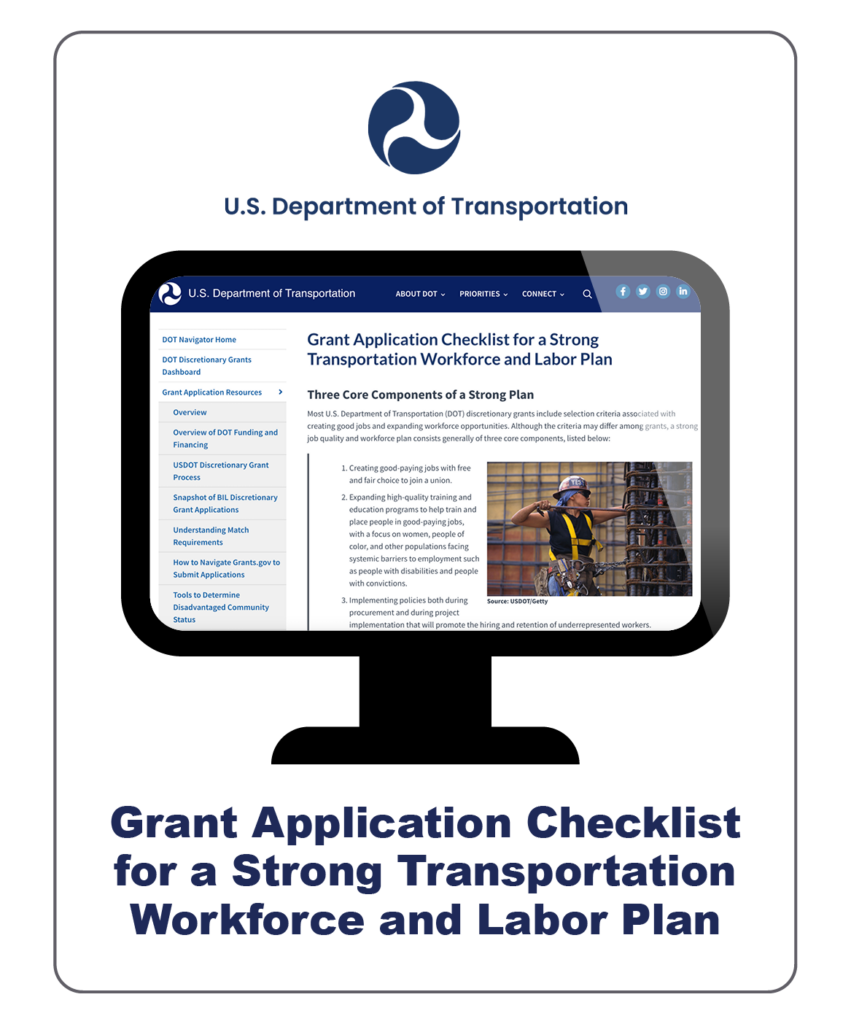
Grant Application Checklist for a Strong Transportation Workforce and Labor Plan
This checklist provides information on the components of an ideal labor plan when applying to DOT discretionary grants in order to best meet the criteria for a strong workforce. The checklist prompts grant applicants to consider their labor-management partnerships, workforce training and education, and hiring and retaining workers.
US Department of Transportation
February 2023
TOPICS: Funding Opportunities , Policy and Planning
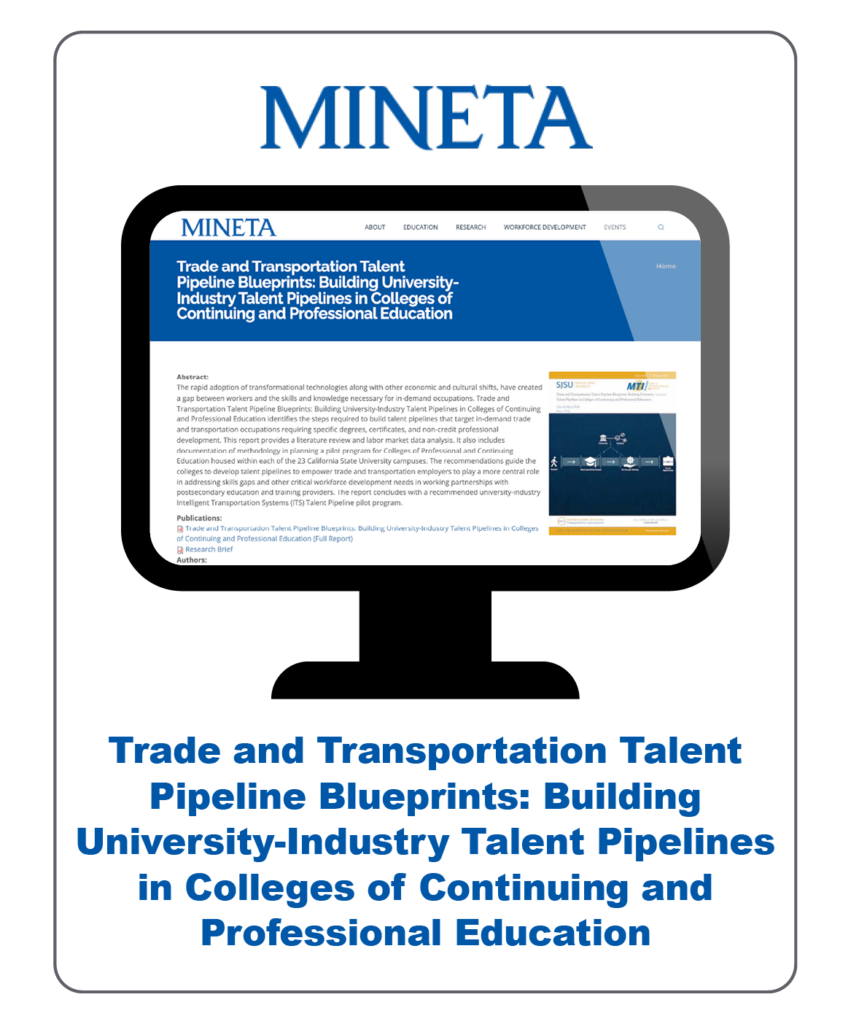
Trade and Transportation Talent Pipeline Blueprints: Building University-Industry Talent Pipelines in Colleges of Continuing and Professional Education
This report identifies the steps required to build talent pipelines that target in-demand trade and transportation occupations requiring specific degrees, certificates, and non-credit professional development and provides a literature review and labor market data analysis. It also includes documentation of methodology in planning a pilot program for Colleges of Professional and Continuing Education housed within each of the 23 California State University campuses.
Mineta Transportation Institute
February 2023
TOPICS: Career Pathways , Hiring and Recruitment , Policy and Planning , Training
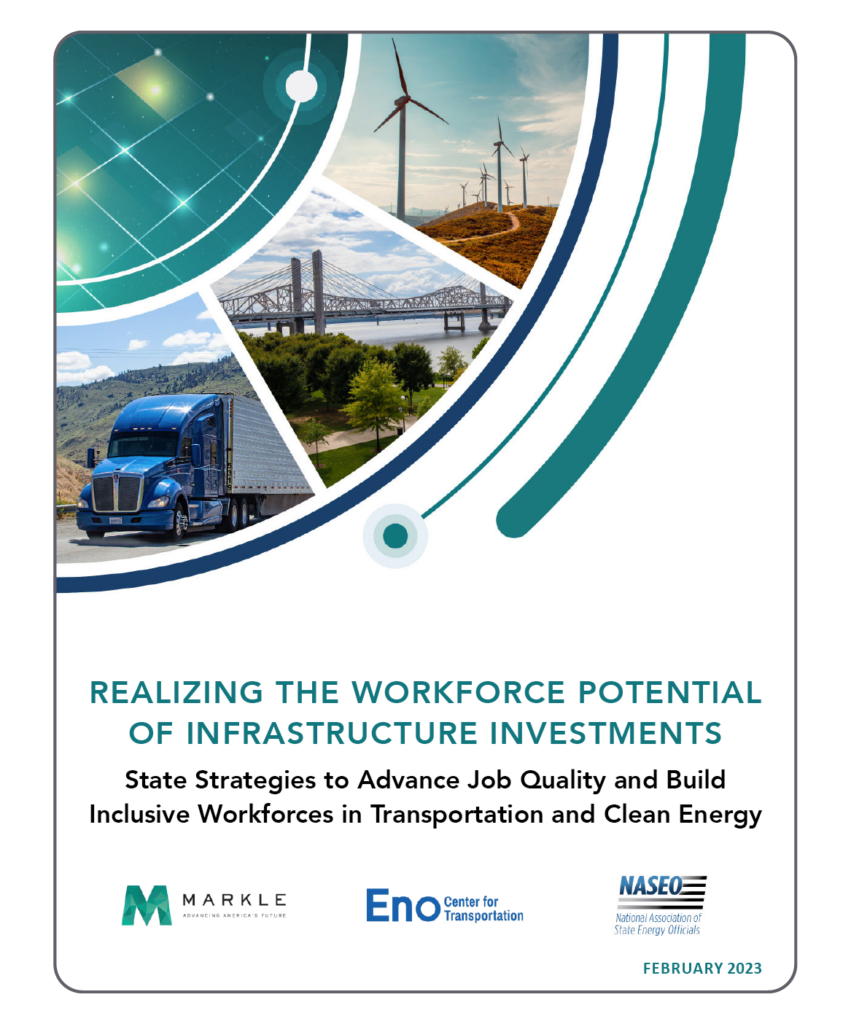
Realizing the Workforce Potential of Infrastructure Investments
This report details strategies for states to realize the workforce and job quality potential of infrastructure investments in critical sectors, particularly those poised for significant additional investments through the IIJA and IRA. The report explains specific funding streams on which states can capitalize and outlines a framework for priority actions that states can take to foster broad opportunity to benefit from good quality jobs connected to state spending in two of the most significant infrastructure sectors. The framework highlights examples of models and uses of these strategies from around the country, including a summary of instances of public infrastructure agencies embedding job quality and workforce aims into competitive procurement processes to influence private sector practices.
Markle; Eno Center for Transportation; National Association of State Energy Officials
February 2023
TOPICS: Policy and Planning , Procurement
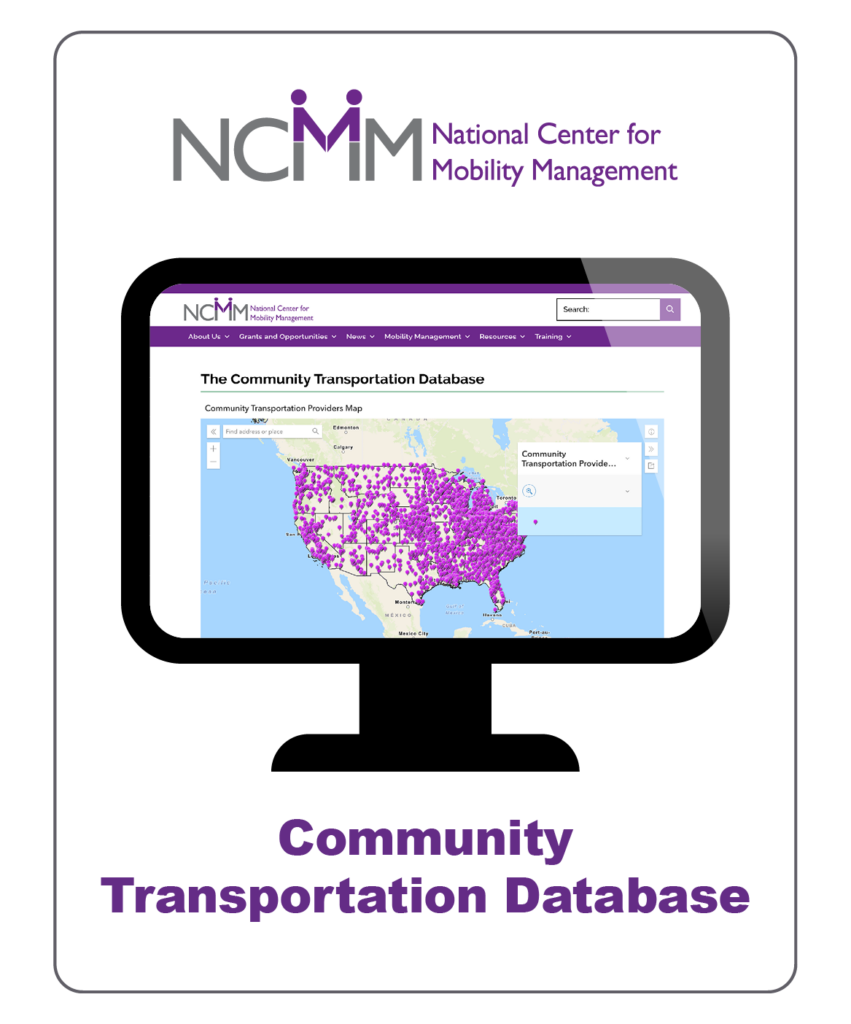
Community Transportation Map and Database
The National Center for Mobility Management developed a national transit database depicting the approximate location of transit agencies and organizations across the United States. The database combines existing datasets with new research to create an exhaustive list of organizations that provide transportation services to communities across the country. It contains public transit providers, community action agencies, senior centers, and others that provide transportation.
National Center for Mobility Management
January 2023
TOPICS: Policy and Planning
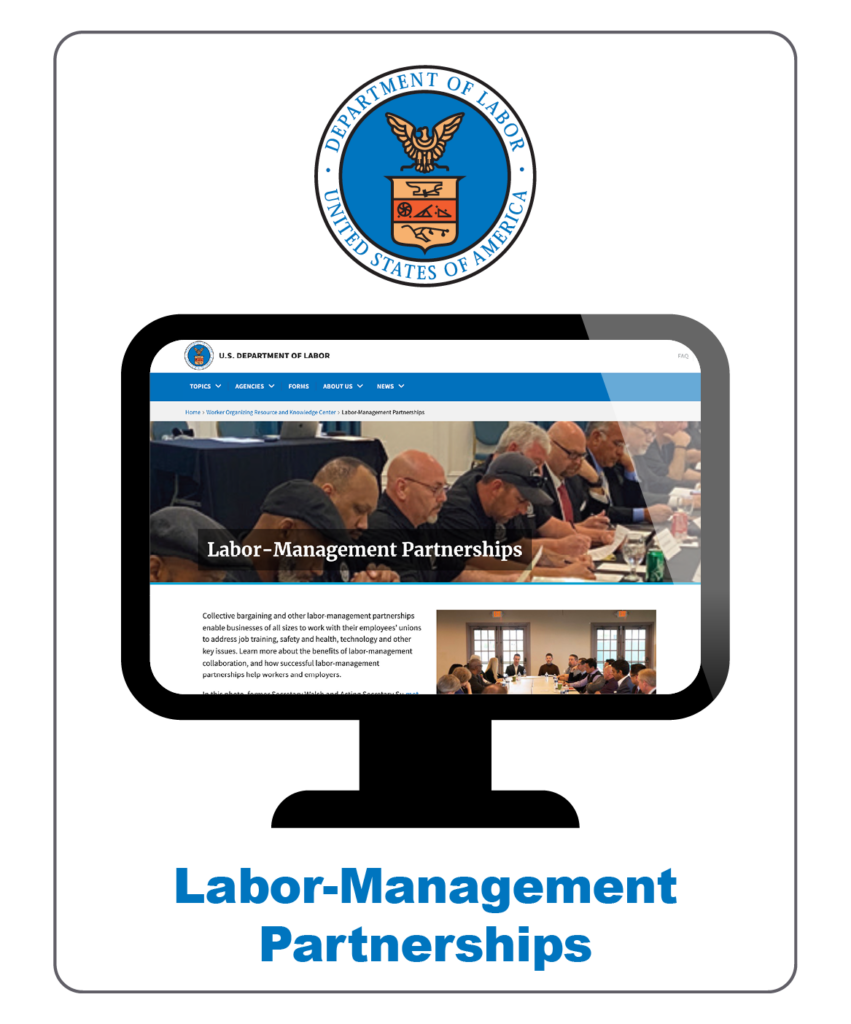
Labor-Management Partnerships
This page from the US Department of Labor explains the benefits of labor-management partnerships, successful examples of partnerships, how successful labor-management partnerships help workers and employers, and provides additional resources for support.
Department of Labor
January 2023
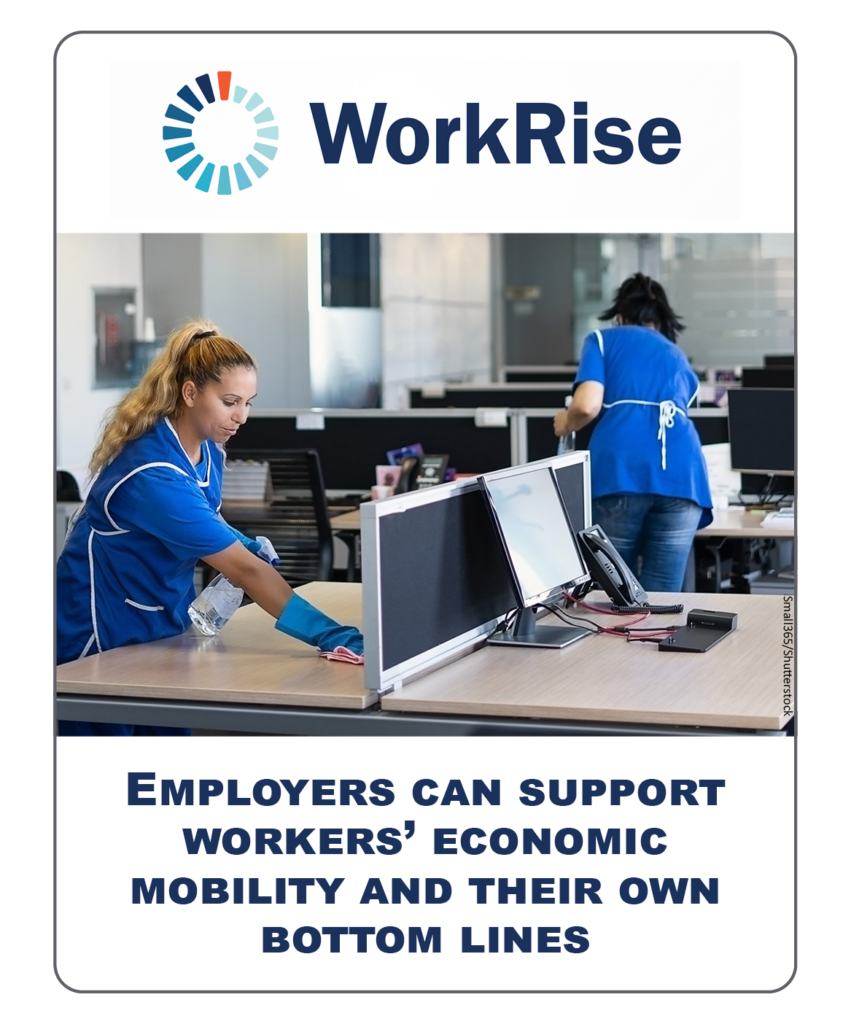
Employers can support workers’ economic mobility and their own bottom lines
This article provides a concise description of several strategies employers can use to create clear advancement pathways in their workplaces, which will help attract and retain quality candidates. It discusses research around what modern-day employees are looking for in a workplace and a position. It also links to a related article, which provides an overview of the framework created by Jobs for the Future (JFF) to describe the components of a good job.
WorkRise
November 2022
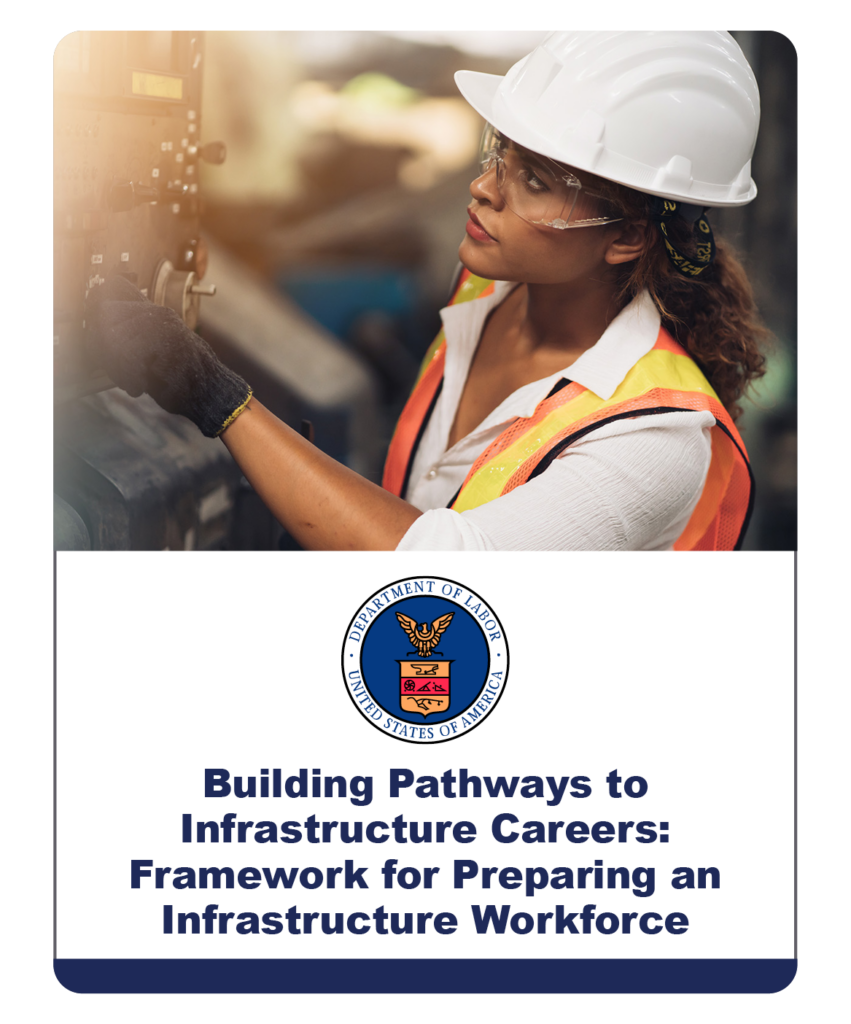
Building Pathways to Infrastructure Careers: Framework for Preparing an Infrastructure Workforce
This resource provides a framework for all workforce stakeholders, including infrastructure project leads, to engage the public workforce system in implementing the Bipartisan Infrastructure Law with strong workforce commitments and proven strategies that produce high-quality education, training, and employment opportunities for all workers.
U.S. Department of Labor, Employment and Training Administration
October 2022
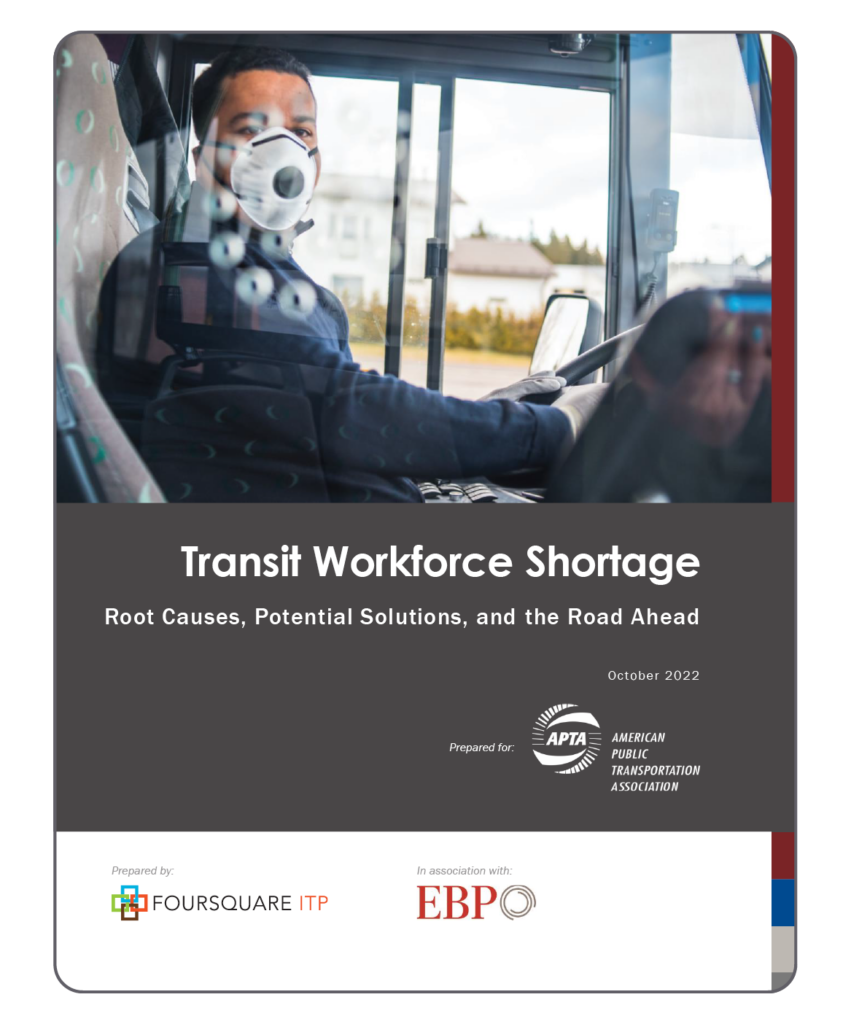
Transit Workforce Shortage: Root Causes, Potential Solutions, and the Road Ahead
American Public Transportation Association
October 2022
TOPICS: Hiring and Recruitment , Policy and Planning , Retention , Workforce Shortage
Public transit providers across North America face a shortage of operators and mechanics during a period of economic instability and reshuffling exacerbated by the COVID-19 pandemic. However, agencies’ ability to respond to the worker shortage has been hampered by inadequate information about its causes and effects. The Transit Workforce Shortage Study builds a framework for APTA, its members, and its partner organizations to better understand the workforce shortage’s causes and provides best practices for recruiting, hiring, and retaining transit operations workers. The study is comprised of two phases. This document, the Interim Findings Report, synthesizes the findings from Phase 1, which included a survey of transit agencies and background research into the macro causes of the shortage.
This report was followed by a full synthesis report and toolkit.
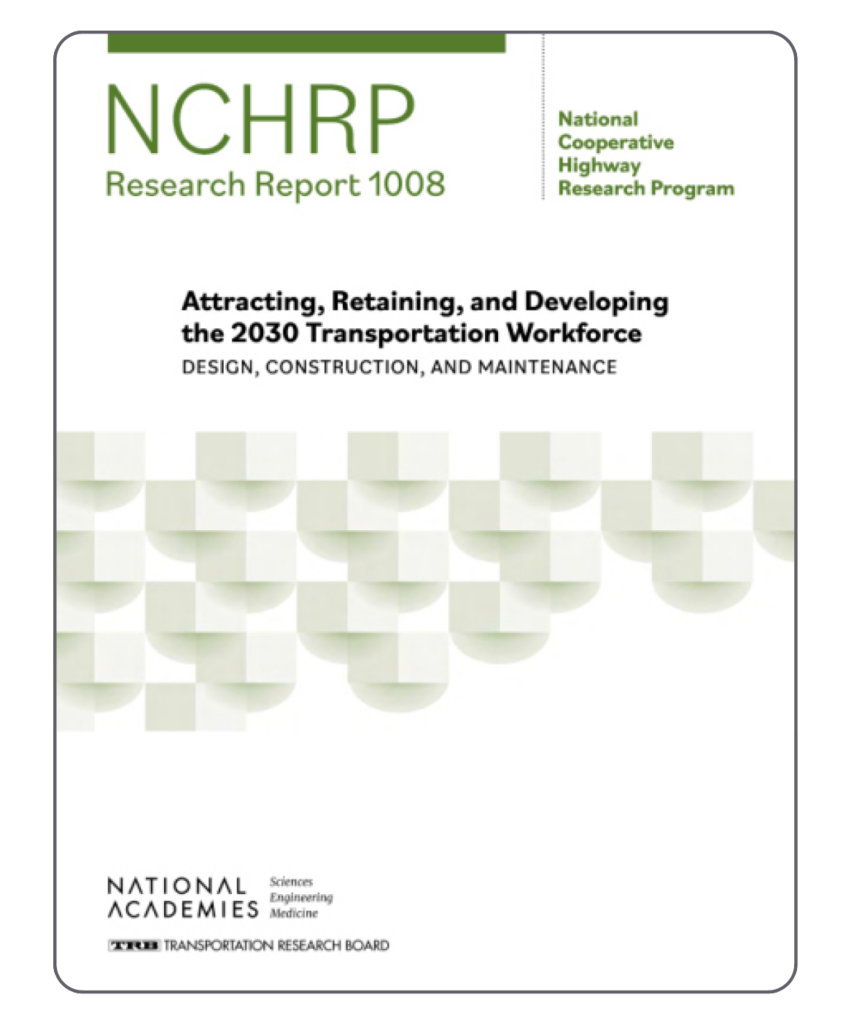
Attracting, Retaining, and Developing the 2030 Transportation Workforce
This report provides a guide with specific strategies and action plans to help agencies identify and address workforce needs through 2030 and beyond.
National Cooperative Highway Research Program
October 2022
State departments of transportation are responsible for providing a safe, efficient, and effective transportation system of infrastructure and services. To meet these responsibilities, transportation agencies need a highly skilled workforce with the expertise required to identify and address current transportation needs while also being prepared to address the challenges of the future.
Contributor(s): National Academies of Sciences, Engineering, and Medicine; Transportation Research Board; National Cooperative Highway Research Program; Candace Blair Cronin; Allison Alexander; Grace Arnold; Juan Carlos Batarse; Kelly Dray; Sasha Iliev; Jessica Jenkins; Erik Smallwood; Rachel Smart; Jake Streng; Mara Campbell; Susan Gallagher; Tyler Reeb; Tom O’Brien; Glenn McRae
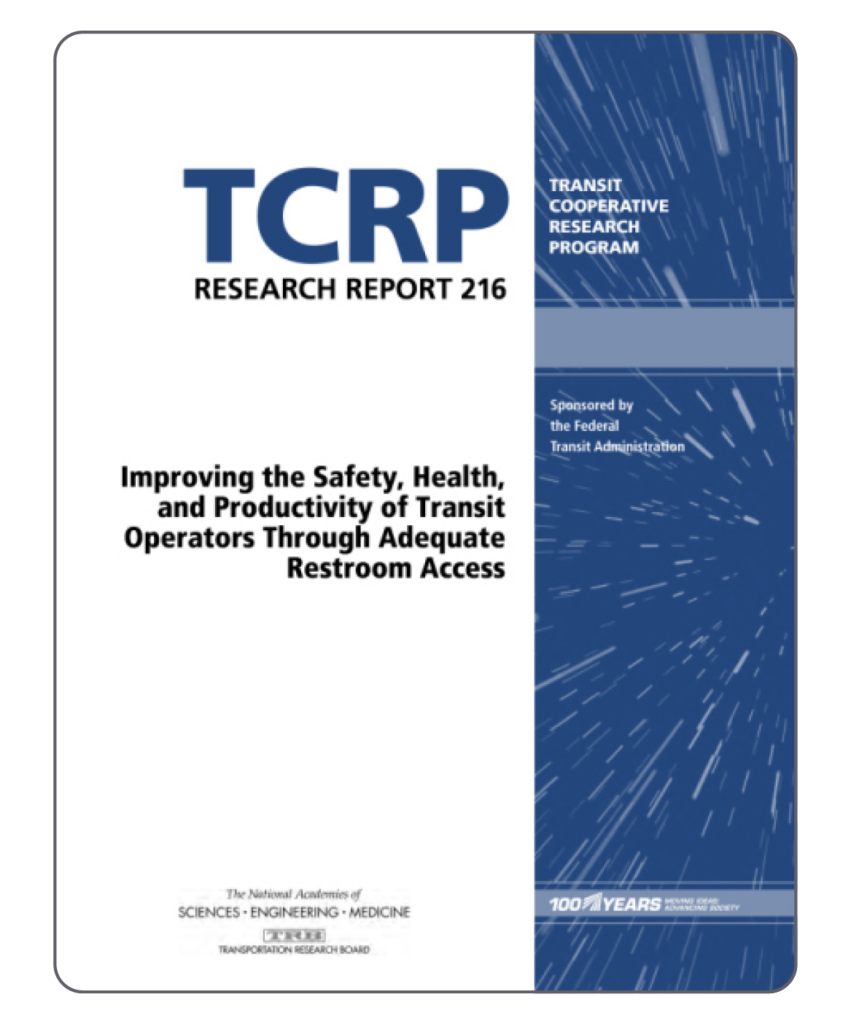
Improving the Safety, Health, and Productivity of Transit Operators Through Adequate Restroom Access
This report presents a catalog of good practices, tools, and resources that provide a foundation for implementable strategies to improve restroom access, primarily for transit vehicle operators. The report compiles research from 100 transit agencies on current and best practices; the impact of restroom access on health, safety, and operations, and lessons learned.
Transit Cooperative Research Program
October 2022
TOPICS: Policy and Planning , Safety and Health
A toolbox accompanying the report includes helpful resources such as restroom inventory, planning, and cost estimation tools, as well as templates for restroom access policies and contract language.
Contributor(s): National Academies of Sciences, Engineering, and Medicine; Transportation Research Board; Transit Cooperative Research Program; Robin Mary Gillespie, City University of New York; RLS & Associates Robbie Sarles
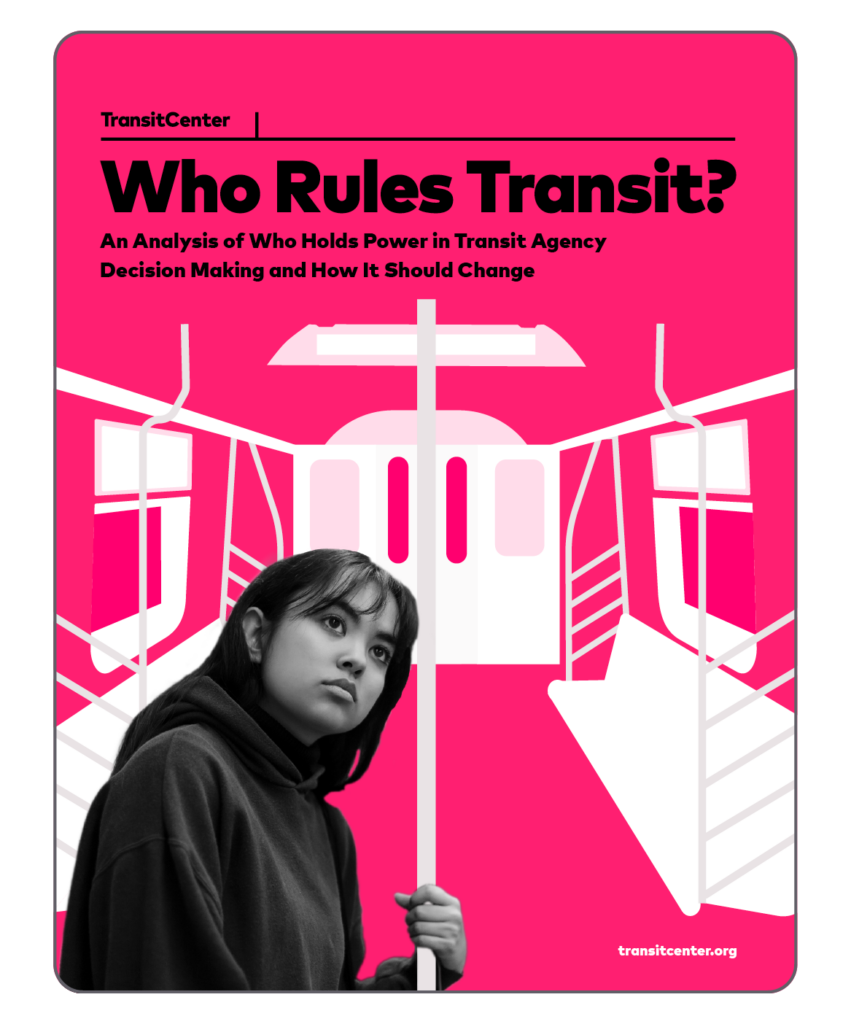
Who Rules Transit?
This report examines who makes key decisions at transit agencies and who is affected by these decisions. The report provides case studies of agencies that have taken steps to give transit riders and workers more power in the decision-making process.
TransitCenter
April 2022
TOPICS: Community Engagement , Policy and Planning
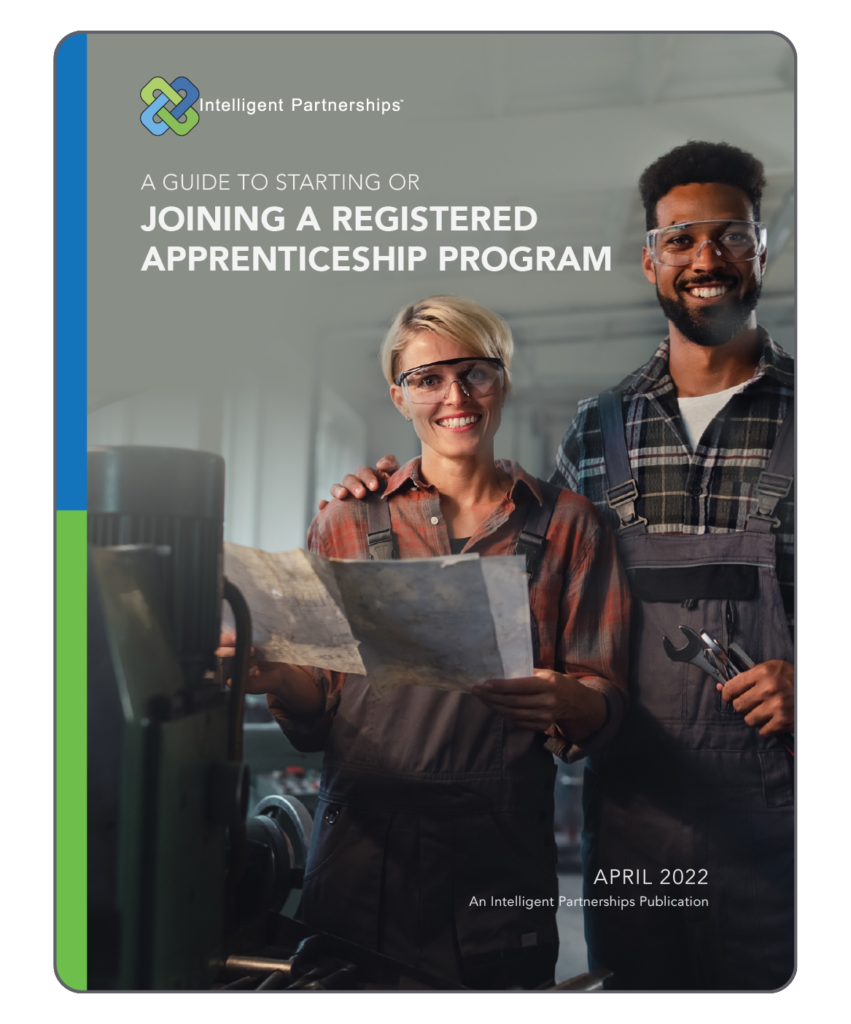
A Guide to Starting or Joining a Registered Apprenticeship Program
This publication provides an overview of registered apprenticeship, the benefits of registered apprenticeships to the employer, and the basic steps to get started.
You can also consult with your state office on registered apprenticeship for technical assistance and support for questions on the apprenticeship model, guidance on each phase of developing a program, connections to training providers, and advice on available funding sources to support apprenticeships: https://www.apprenticeship.gov/about-us/state-offices
Intelligent Partnerships
April 2022
TOPICS: Apprenticeship , Career Pathways , Community Engagement , Policy and Planning , Training
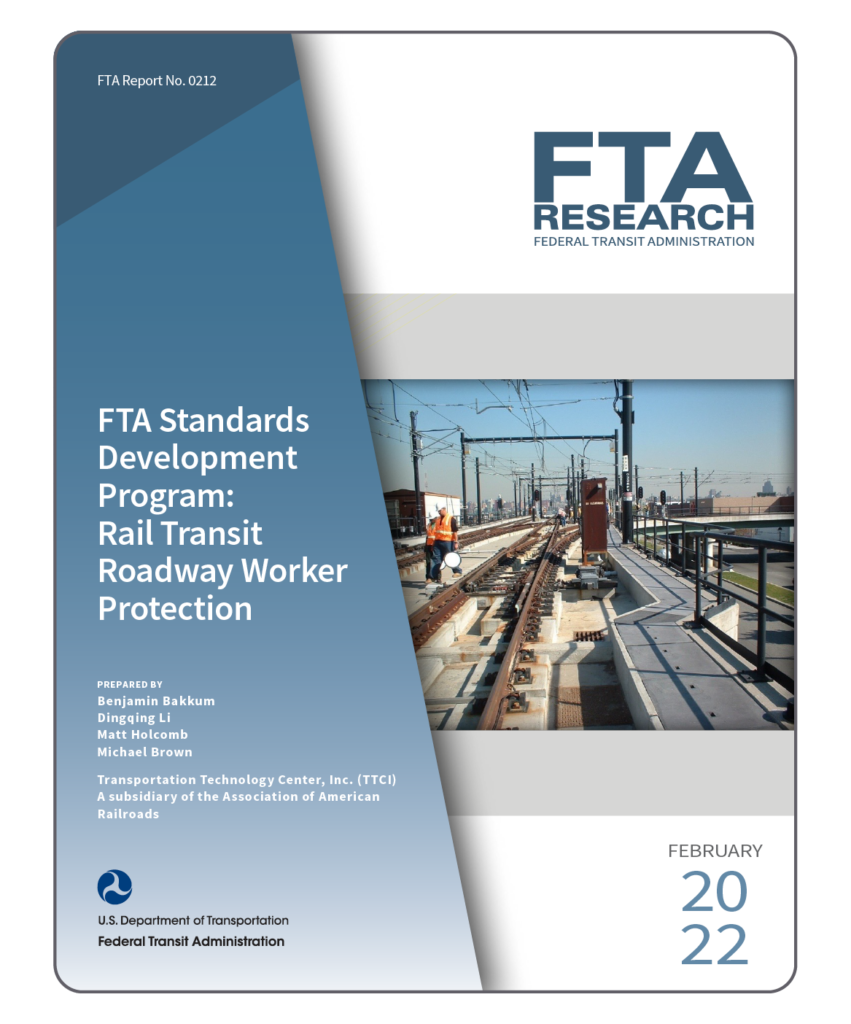
FTA Standards Development Program: Rail Transit Roadway Worker Protection
This report reviews existing standards and best practices and develops use cases, a risk assessment matrix, and high-level concepts of operations (CONOPS) for Rail Transit Roadway Worker Protection (RWP). The project evaluates current industry practices and technologies in use for roadway worker protection and conducts a risk/hazard analysis of current practices using an industry-representative survey.
Federal Transit Administration
February 2022
TOPICS: Policy and Planning , Safety and Health
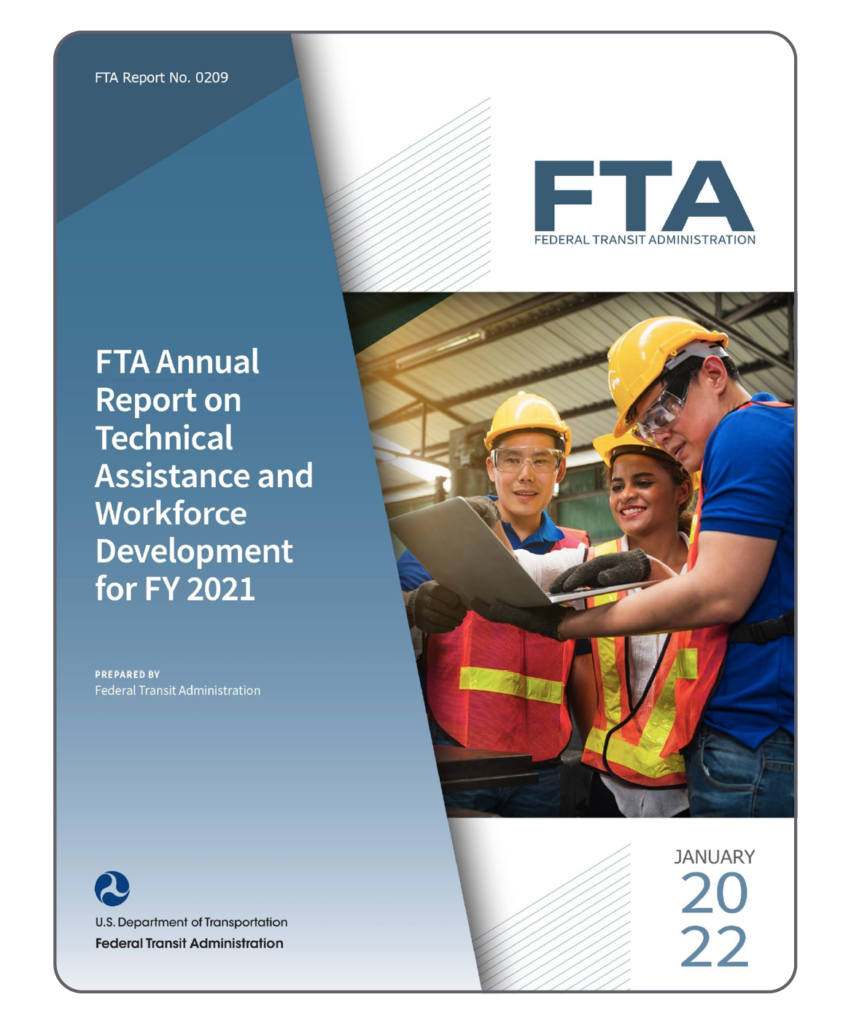
FTA Annual Report on Technical Assistance and Workforce Development for FY 2021
This statutorily required annual report provides information on FTA’s Technical Assistance and Workforce Development Program (49 U.S.C. § 5314), including technical assistance, workforce development, standards, human resources, and training projects active in Fiscal Year 2021. The report also describes FTA’s process for making upcoming allocations for FY 2022.
Federal Transit Administration
January 2022
TOPICS: Policy and Planning
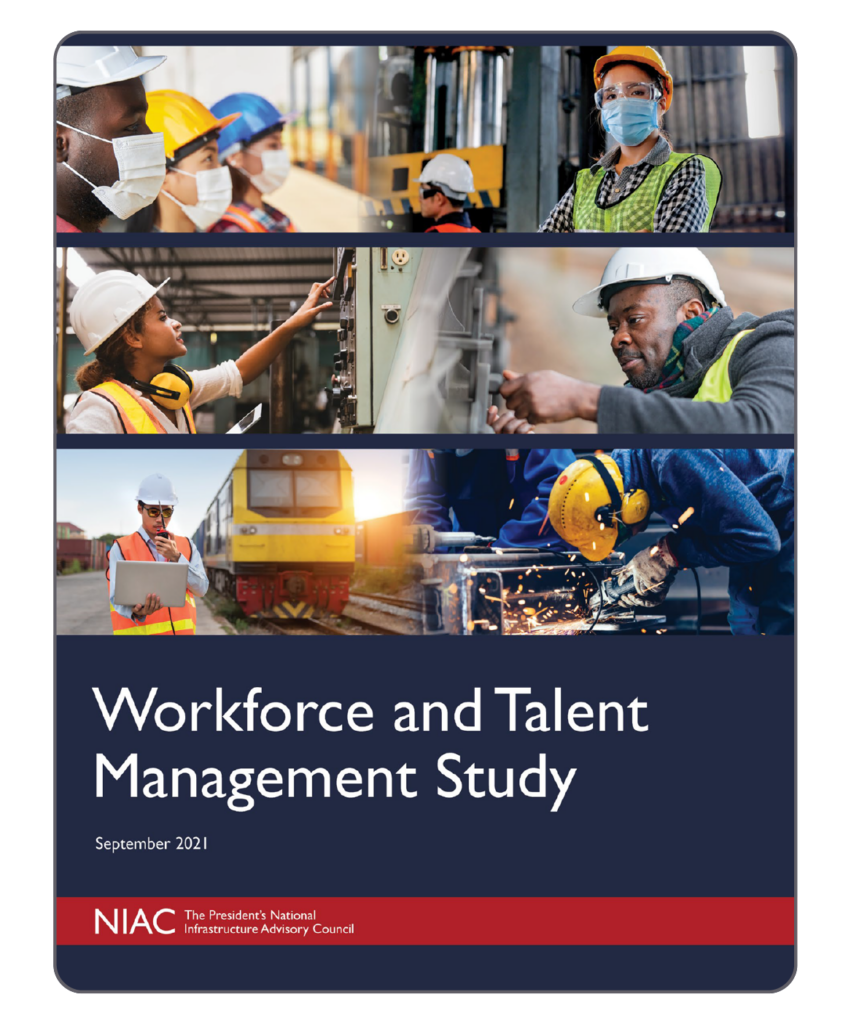
Workforce and Talent Management Study
This study provides an in-depth examination of the U.S workforce development system and offers nine recommendations to inform future policy development and keep the critical infrastructure workforce nimble in the face of change. The recommendations are guided by the principle that all workers must have access to the education, training, and resources necessary to begin and advance in critical infrastructure careers
National Infrastructure Advisory Council
September 2021
The Education/Career Readiness Continuum graphic on page 11 of the report might be useful to agencies considering comprehensive workforce development plans.

Rural Apprenticeships for Young People: Challenges and Strategies for Success
This report evaluates four rural registered apprenticeship programs in Maine, Arizona, Missouri, and Mississippi and identifies the key strategies in their approaches. It begins with defining rural apprenticeship programs and exploring their obstacles and benefits, and then discusses each of the four cases and concludes with recommendations for decisionmakers seeking to expand apprenticeship access in rural communities.
Urban Institute
August 2021
TOPICS: Apprenticeship , Community Engagement , Policy and Planning
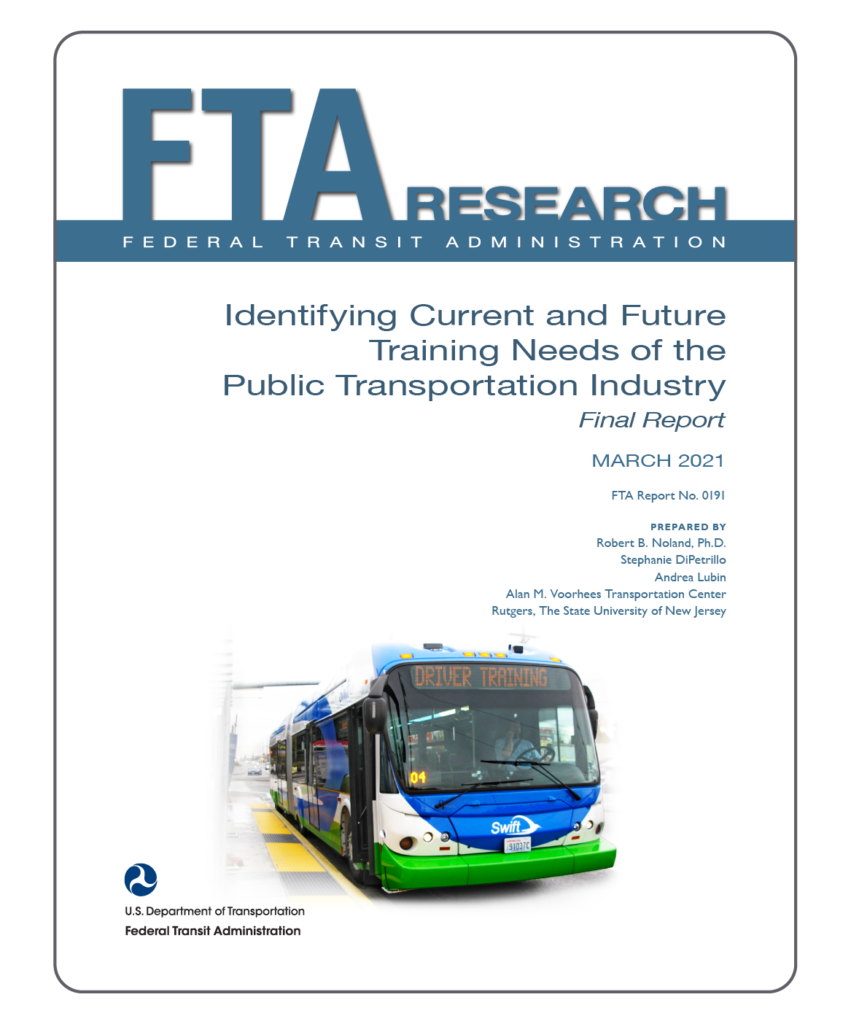
Identifying Current and Future Training Needs of the Public Transportation Industry
This report documents a study commissioned by the National Transit Institute (NTI) as part of its work to address training needs. The study investigates skills gaps among the workforce of the U.S. public transportation industry, identifies strategies to address those gaps, and explores approaches to more successfully recruit and retain the full spectrum of the transit workforce, from frontline to technical to professional staff.
Federal Transit Administration; National Transit Institute
June 2021
TOPICS: Hiring and Recruitment , Policy and Planning , Retention
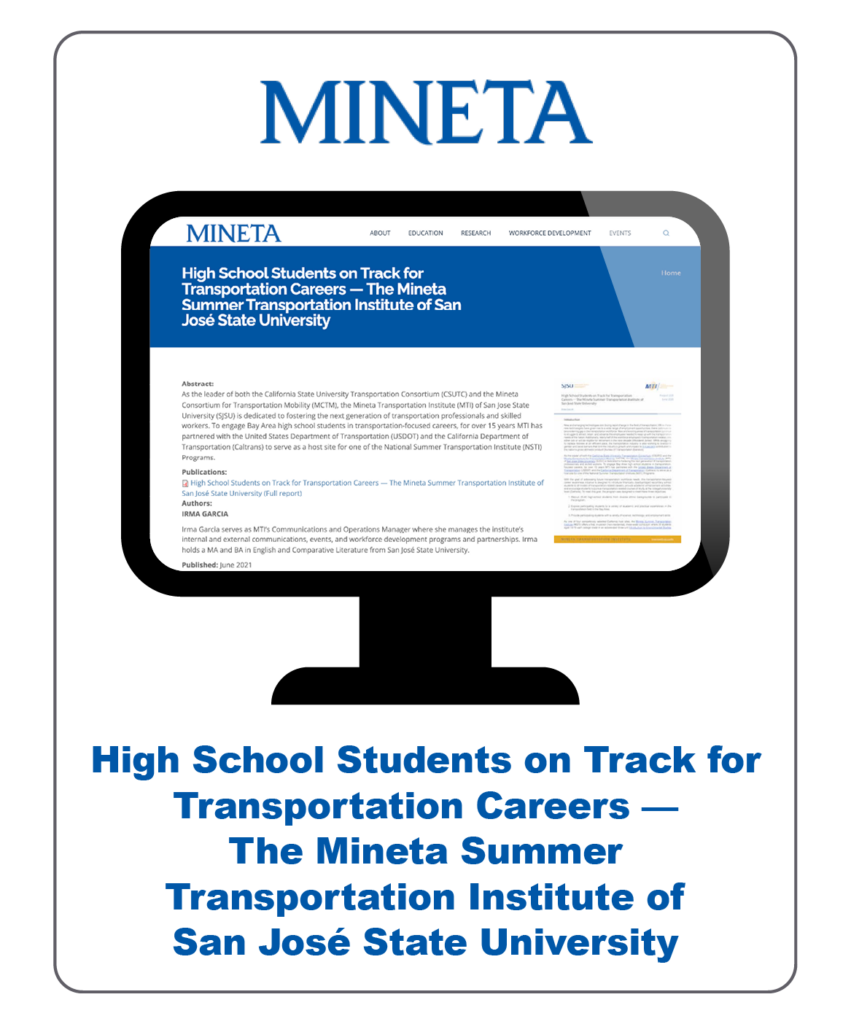
High School Students on Track for Transportation Careers
Mineta Transportation Institute
June 2021
TOPICS: Career Pathways , Community Engagement , Policy and Planning
This report provides an overview of the Mineta Summer Transportation Institute, one of the National Summer Transportation Institute (NSTI) Programs, which recruits high-school students, exposes them to a variety of academic and practical experiences in the transportation field in the Bay Area, and provides participating students with a variety of science, technology, and employment skills. The report shares program history, demographics, activities, etc.
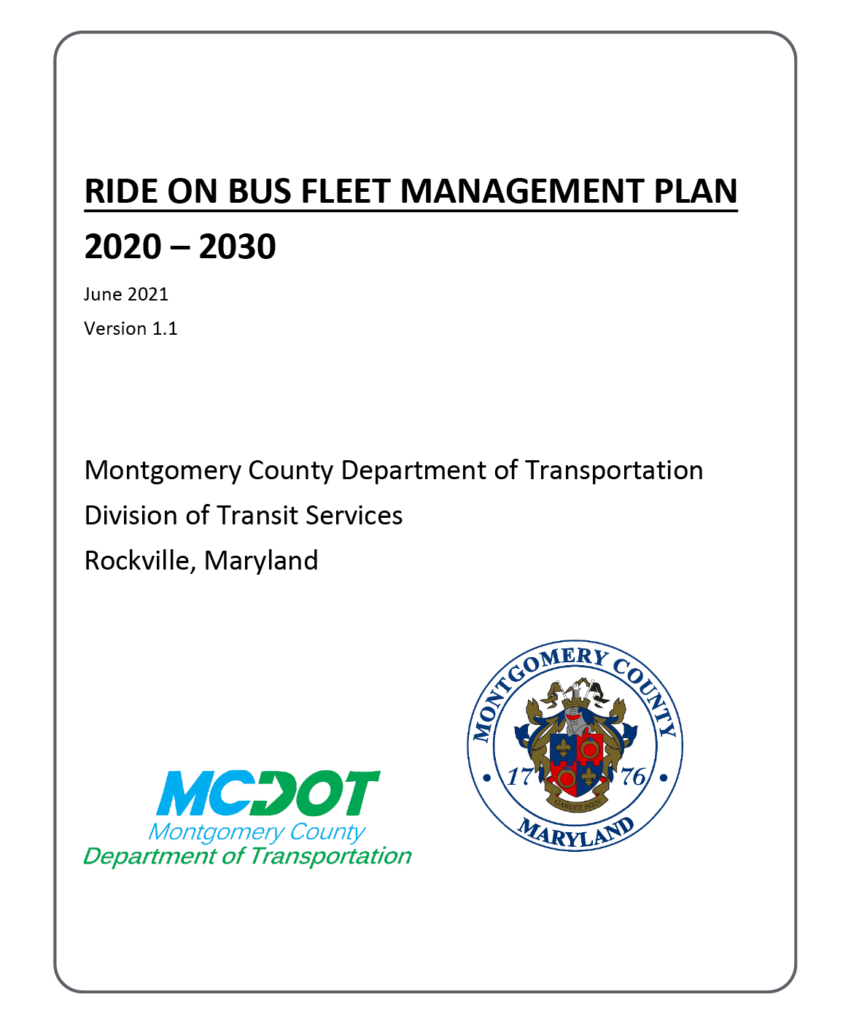
Montgomery County Bus Fleet Management Plan
The Montgomery County Bus Fleet Management Plan features a particularly in-depth zero-emission fleet transition plan, including implementation challenges associated with zero-emission buses and recommendations for fleet transition. The plan also dives into maintenance facilities, energy costs, and future infrastructure needs.
Montgomery County Department of Transportation
June 2021
TOPICS: Low-No , Policy and Planning
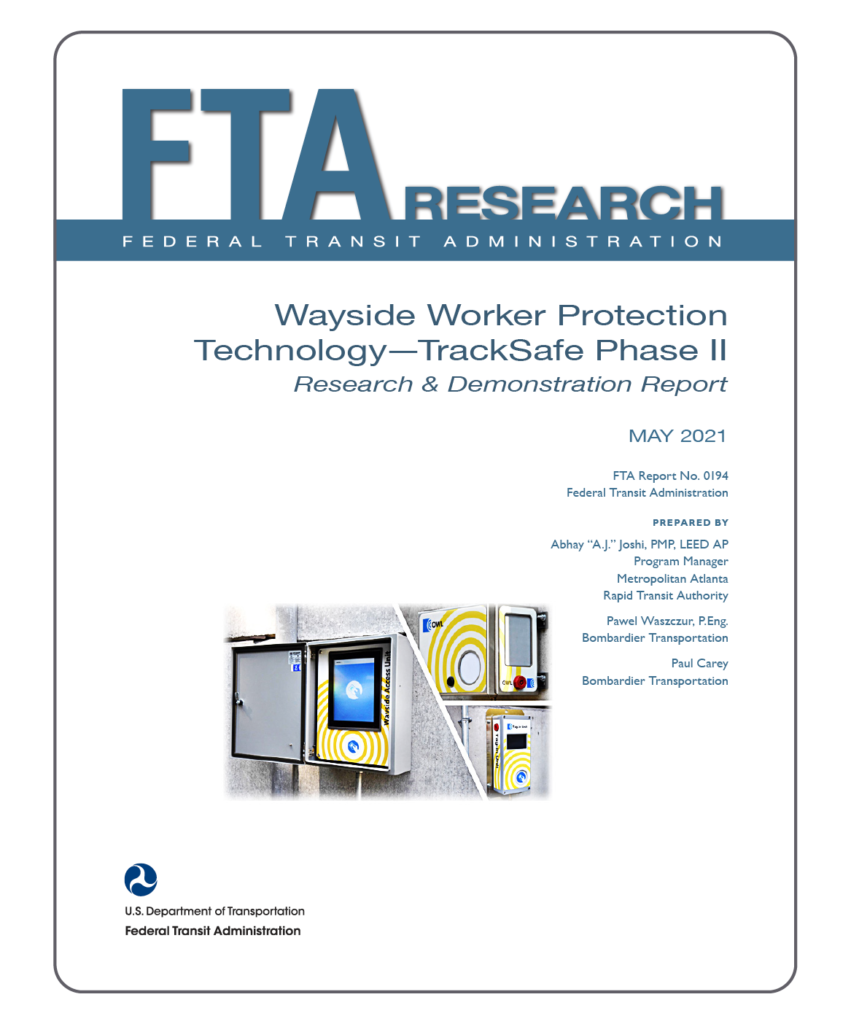
Wayside Worker Protection Technology—TrackSafe Phase II Research & Demonstration (Report 0194)
This report outlines research and demonstration of a roadway worker protection (RWP) warning technology developed by Bombardier Rail called TrackSafe. The system was installed at the Metropolitan Atlanta Rapid Transit Authority (MARTA) and was designed to reduce the hazards of working within a transit rail right-of-way (ROW).
Federal Transit Administration
May 2021
TOPICS: Policy and Planning , Safety and Health
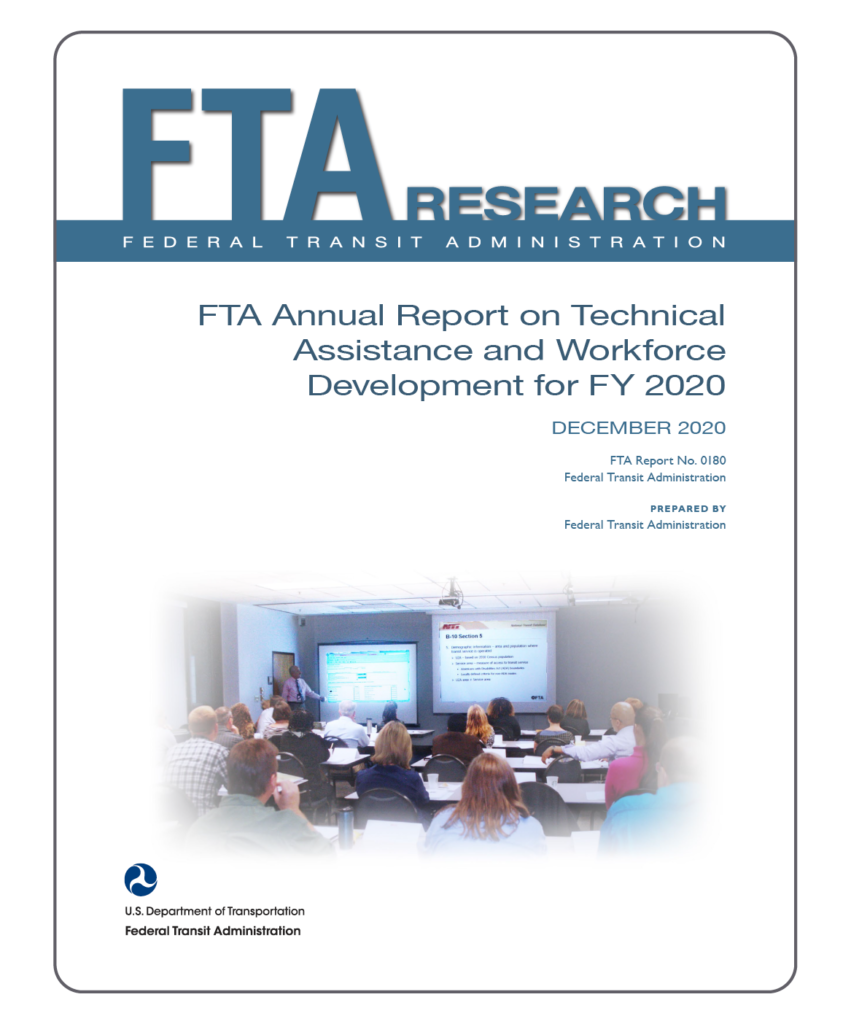
FTA Annual Report on Technical Assistance and Workforce Development for FY 2020
This statutorily required annual report provides information on FTA’s Technical Assistance and Workforce Development Program (49 U.S.C. § 5314). It provides information on technical assistance, workforce development, standards, human resources, and training projects active in FY 2020. The report also includes information on FTA’s process for making upcoming allocations for FY 2021.
Federal Transit Administration
May 2021
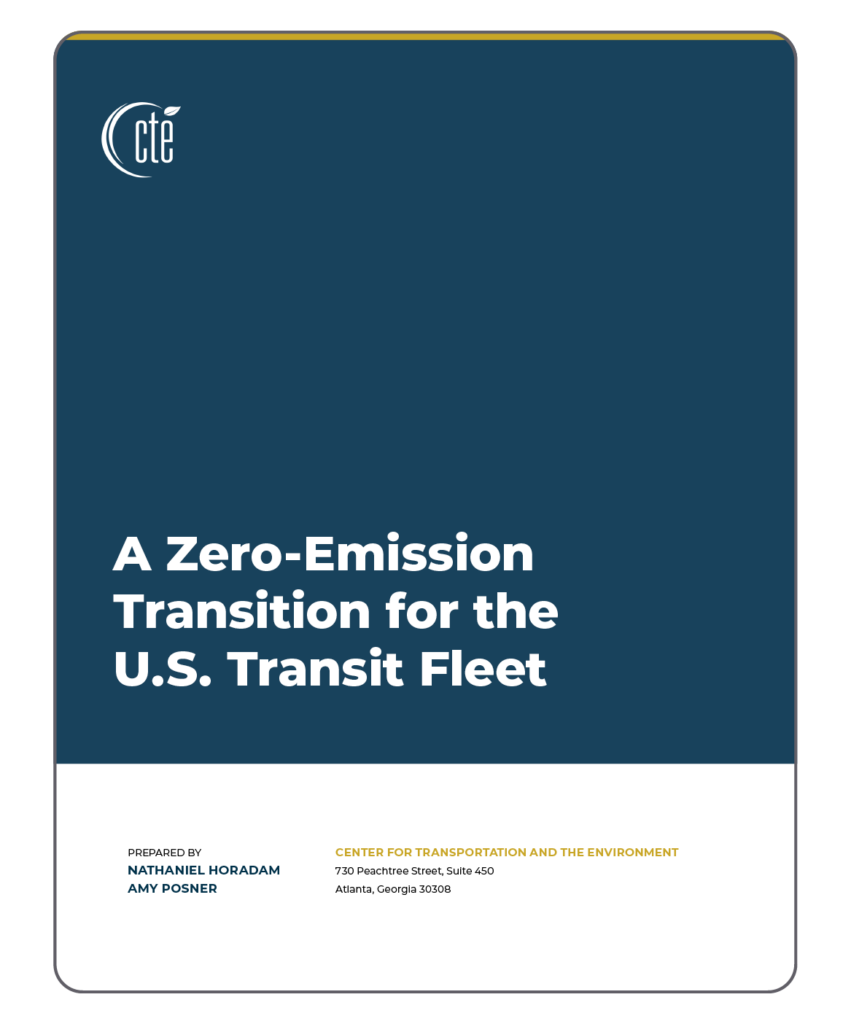
A Zero-Emission Transition for the U.S. Transit Fleet
This report offers a roadmap for federal lawmakers in support of making a complete transition to zero-emission vehicles in transit, including an accounting of estimated agency costs, key assumptions underpinning those figures, acknowledgement of limitations, and workforce development considerations.
Center for Transportation and the Environment
May 2021
TOPICS: Low-No , Policy and Planning , Procurement , Training

The Transit Workforce: A Path Forward
This plan was developed collaboratively between the Delaware Valley Regional Planning Commission and Temple University as a guide to addressing the systematic challenges facing Greater Philadelphia’s primary transit agencies: SEPTA, PATCO, and NJ Transit. This plan is intended as a guide for possible opportunities for the transit agencies to address identified challenges and themes and prioritized by participating stakeholders as areas that need to be addressed in the short term to ensure long-term success: pipeline development, pathways, and processes.
Delaware Valley Regional Planning Commission; Temple University
May 2021
TOPICS: Career Pathways , Policy and Planning , Workforce Shortage
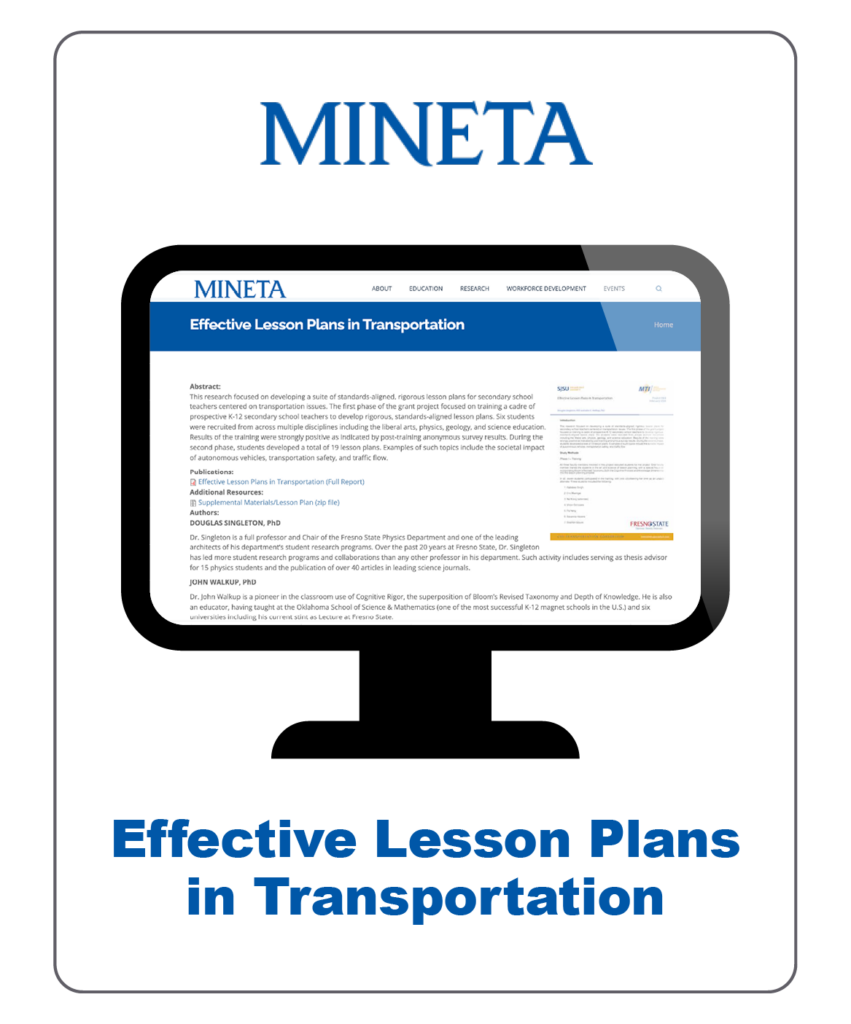
Effective Lesson Plans in Transportation
This research focuses on developing a suite of standards-aligned, rigorous lesson plans for secondary school teachers centered on transportation issues, such as the societal impact of autonomous vehicles, transportation safety, and traffic flow. It includes a report and lesson plans.
Mineta Transportation Institute
February 2021
TOPICS: Career Pathways , Policy and Planning
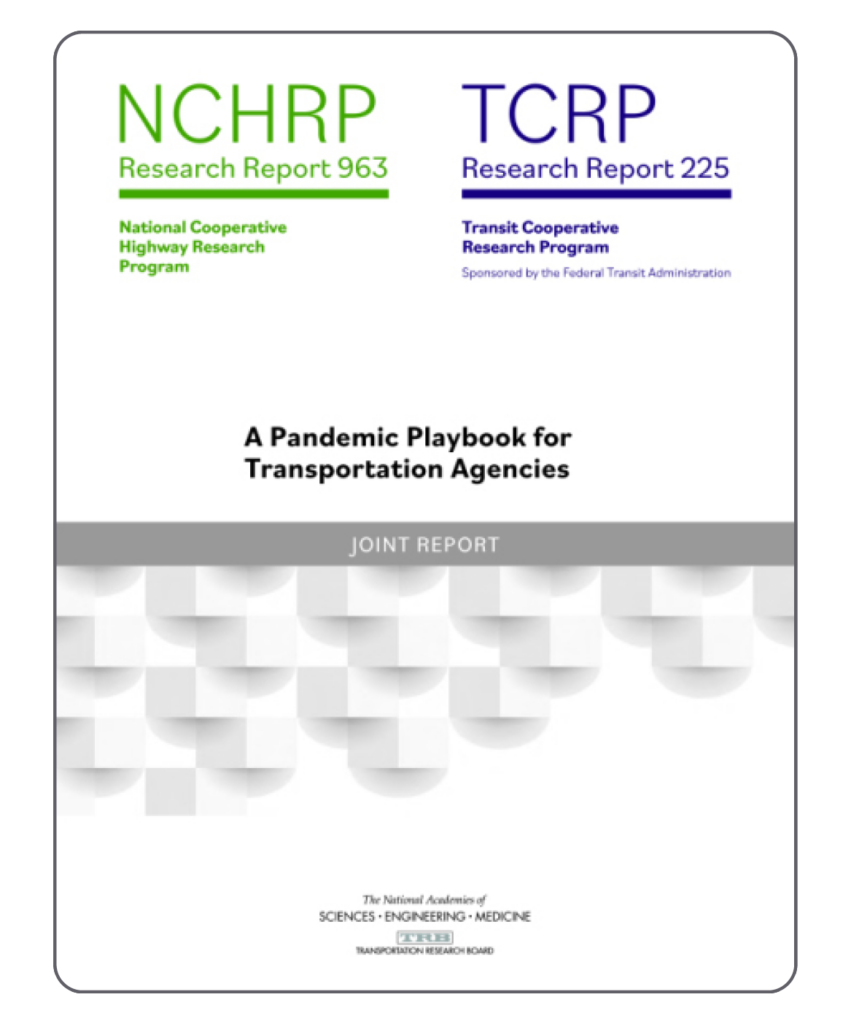
A Pandemic Playbook for Transportation Agencies
TRB’s National Cooperative Highway Research Program and Transit Cooperative Research Program have jointly issued NCHRP Research Report 963/TCRP Research Report 225: A Pandemic Playbook for Transportation Agencies, which was created to improve transportation agency responses to a pandemic.
The Playbook concentrates on what needs to be done, when and by whom. It briefly addresses planning for a pandemic, a topic addressed in greater depth in NCHRP Report 769: A Guide for Public Transportation Pandemic Planning and Response. It summarizes effective practices currently used by transportation agencies based on interviews with state departments of transportation and transit agency leaders and operational personnel, supplemented with national and international research results.
National Cooperative Highway Research Program and Transit Cooperative Research Program
January 2021
TOPICS: Policy and Planning , Safety and Health , Training
Contributor(s): National Academies of Sciences, Engineering, and Medicine; Transportation Research Board; National Cooperative Highway Research Program; Transit Cooperative Research Program; WSP USA Solutions – Deborah Matherly; Patricia Bye; Janet Benini
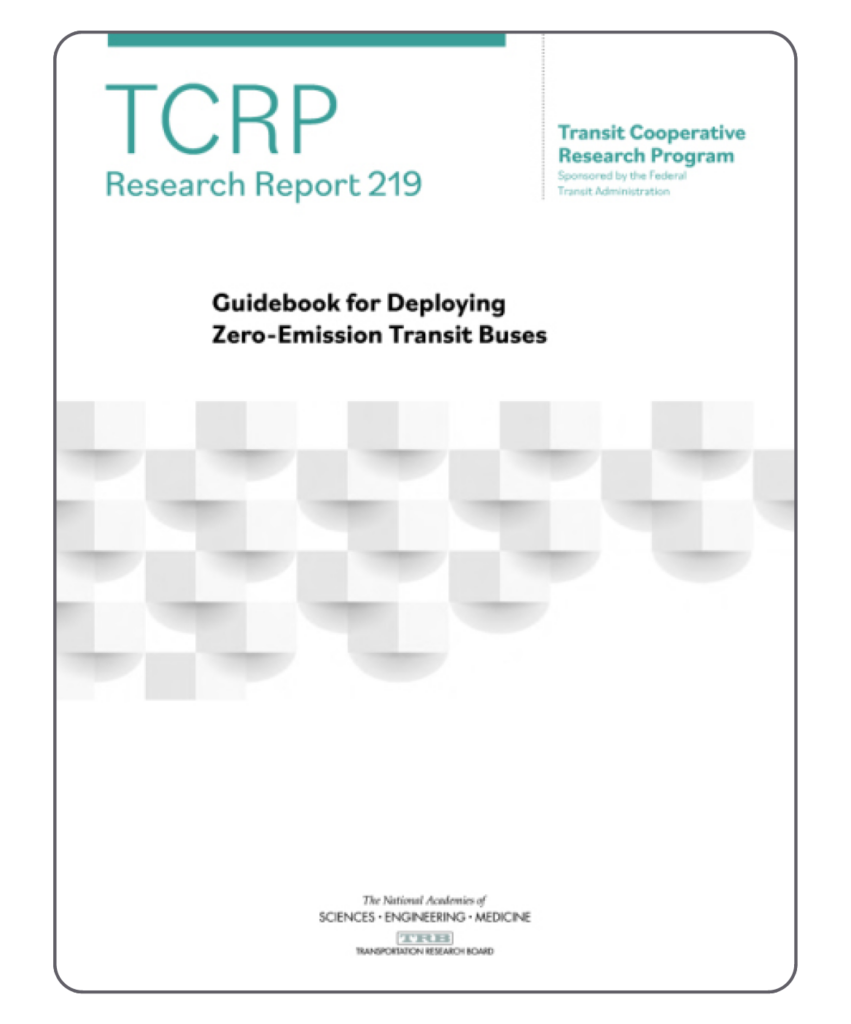
Guidebook for Deploying Zero-Emission Transit Buses
The TCRP Research Report 219: Guidebook for Deploying Zero-Emission Transit Buses is designed to provide transit agencies with information on current best practices for ZEB deployments and lessons learned from previous deployments, industry experts, and available industry resources.
Transportation Cooperative Research Program
January 2021
TOPICS: Low-No , Policy and Planning , Procurement
Contributor(s): National Academies of Sciences, Engineering, and Medicine; Transportation Research Board; Transit Cooperative Research Program; Meredith Linscott; Amy Posner
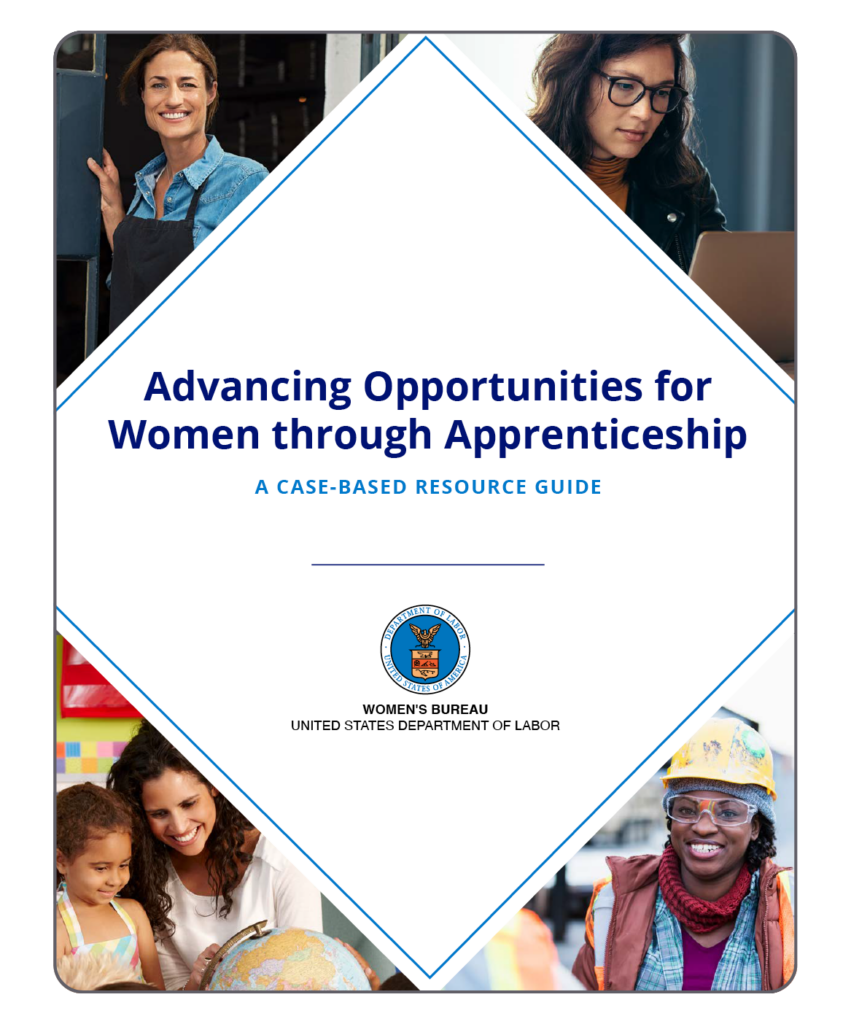
Advancing Opportunities for Women through Apprenticeship: A Case-Based Resource Guide
The Advancing Opportunities for Women through Apprenticeship case-based resource guide provides a framework for meaningful expansion of apprenticeship programs for women. The guide includes case studies on four high-quality pre-apprenticeship and apprenticeship programs in a range of industry sectors.
Department of Labor
TOPICS: Apprenticeship , Career Pathways , Community Engagement , Mentorship , Policy and Planning , Retention
The case studies were developed through on-site visits to the program locations; interviews with program staff, partners, and current and former participants; and a review of program materials and data. They provide information and insights related to partnership development, program design, and outcomes that outline how pre-apprenticeship and apprenticeship programs can help women access family-sustaining jobs and quality career pathways. The guide identifies common strategies across the four programs to help others learn how to create programs that successfully open pathways to in-demand jobs for women through apprenticeships.
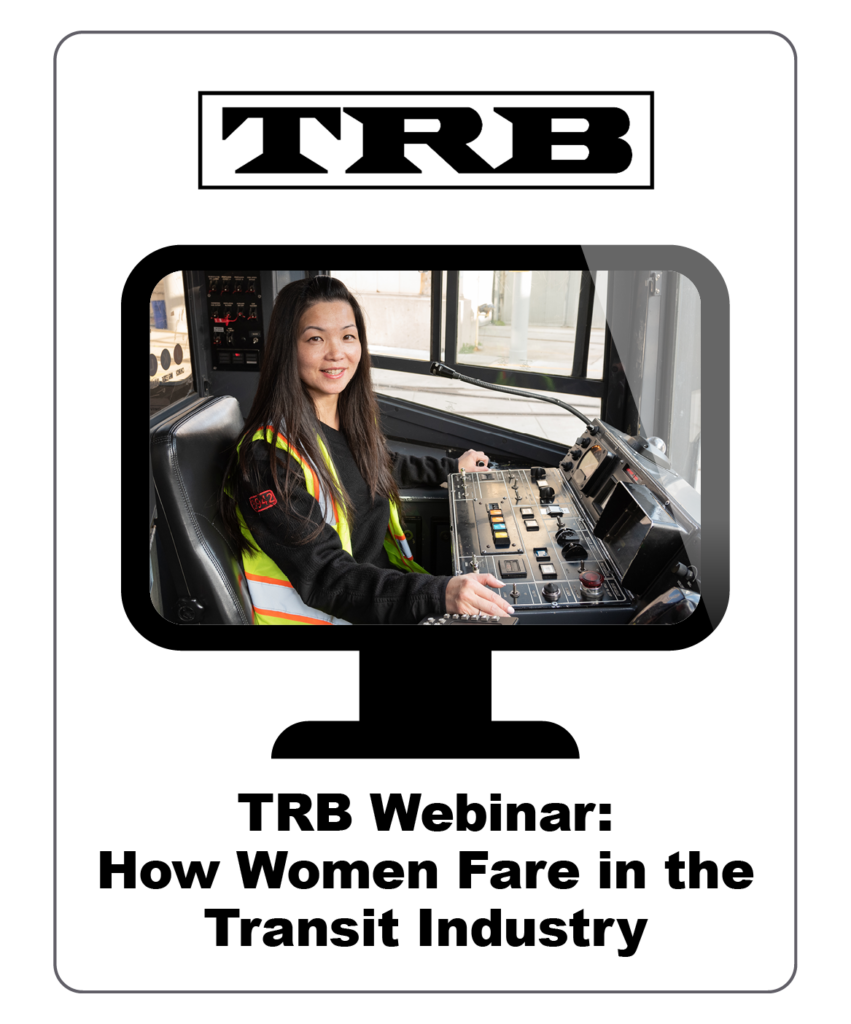
How Women Fare in the Transit Industry
In this TRB webinar, panelists discuss strategies to support women in transit and share examples of transit agencies that have effectively implemented programs to retain and advance women in the industry.
Transportation Research Board
September 2020
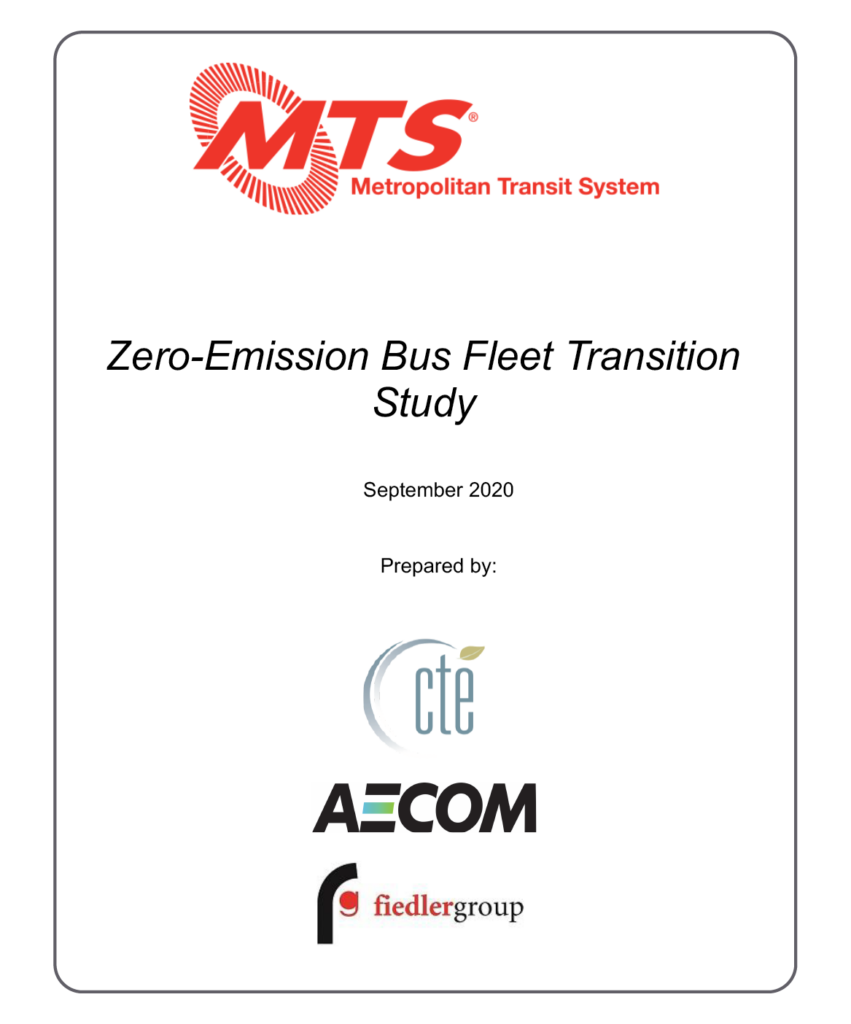
MTS Zero-Emission Bus Fleet Transition Study
This study, performed by the Center for Transportation and the Environment (CTE) for the San Diego Metropolitan Transit System (MTS), creates a plan for a 100% zero-emission fleet by 2040 to be in compliance with the Innovative Clean Transit (ICT) regulation enacted by the California Air Resources Board (CARB). The results of the study will be used to inform MTS Board members and educate MTS staff of estimated costs, benefits, constraints, and risks to guide future planning and decision making.
Center for Transportation and the Environment; AECOM; Fiedler Group
September 2020
TOPICS: Low-No , Policy and Planning
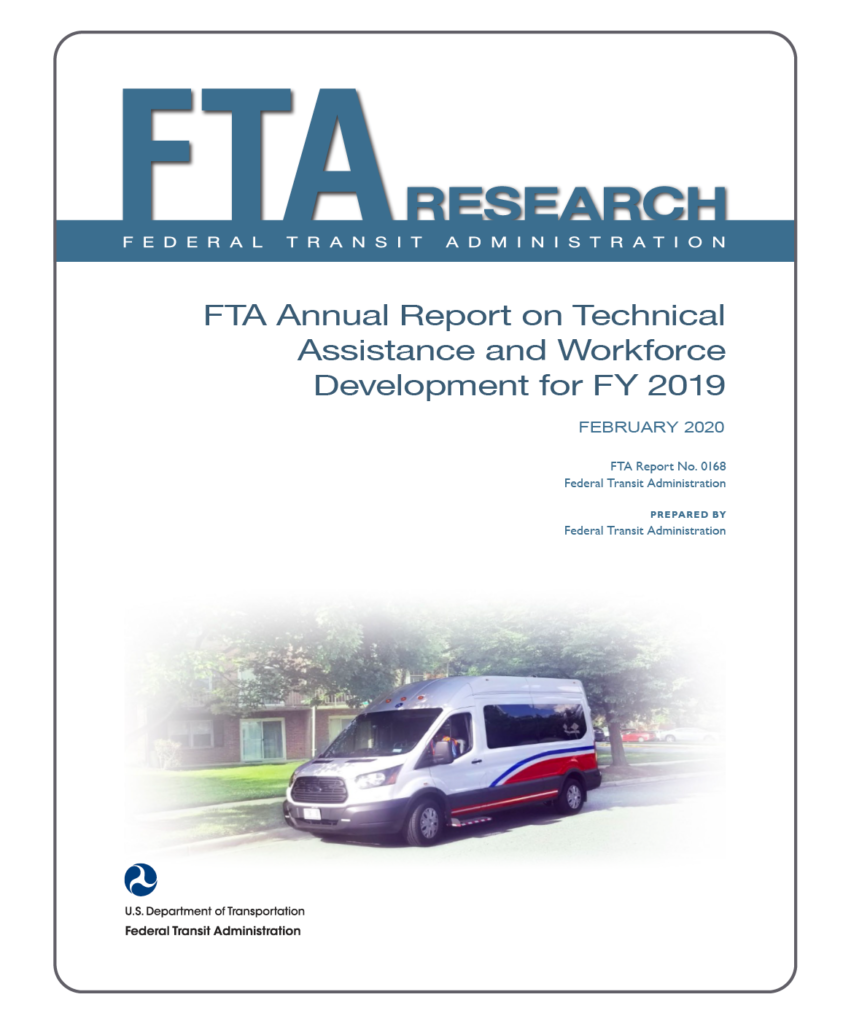
FTA Annual Report on Technical Assistance and Workforce Development for FY 2019
This statutorily required annual report provides information on FTA’s Technical Assistance and Workforce Development Program (49 U.S.C. § 5314). This annual report provides information on any technical assistance, workforce development, standards, human resources, and training projects active in Fiscal Year (FY) 2019.
Federal Transit Administration
July 2020
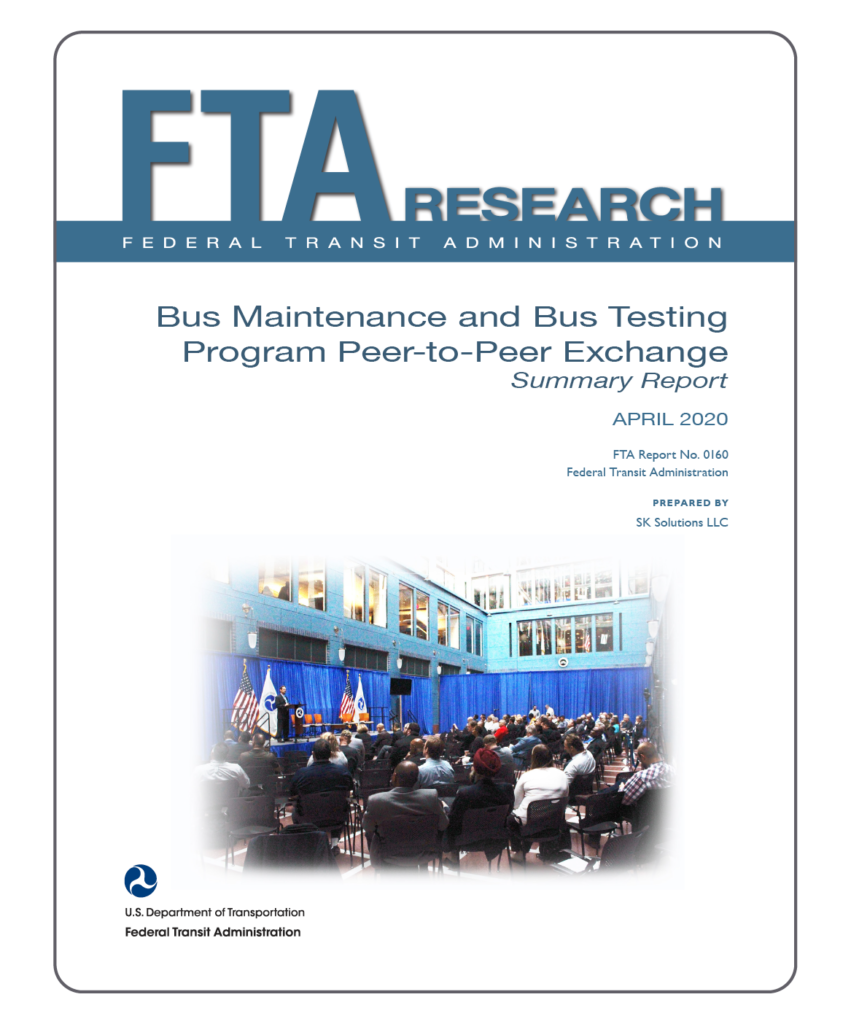
Bus Maintenance and Bus Testing Program Peer-to-Peer Exchange
This report presents a summary of the bus maintenance worker training peer exchange, hosted by the Federal Transit Administration (FTA). Significant shifts in the types of transit buses being procured (e.g., from traditional buses to alternative fuel/low- and no-emission buses) require new and different types of frontline worker training. Through the peer exchange, stakeholders, including industry representatives, shared knowledge about bus maintenance worker training and discussed best practices for developing the next generation of highly-skilled bus technicians.
Federal Transit Administration
May 2020
TOPICS: Hiring and Recruitment , Low-No , Policy and Planning , Procurement , Training

What We Think We Learned: Transit Workforce Interview Themes
This report is a synopsis of the transit industry and workforce development interviews conducted in Greater Philadelphia from December 2019 to February 2020. The research team emphasized three distinct areas where the need for improvement should be elevated: Pipeline Development, Pathways, and Processes. While there are several ongoing successes within the transit industry, this document strives to focus on key identified gaps most conducive for joint problem-solving.
Delaware Valley Regional Planning Commission
March 2020
TOPICS: Apprenticeship , Career Pathways , Policy and Planning , Retention , Training
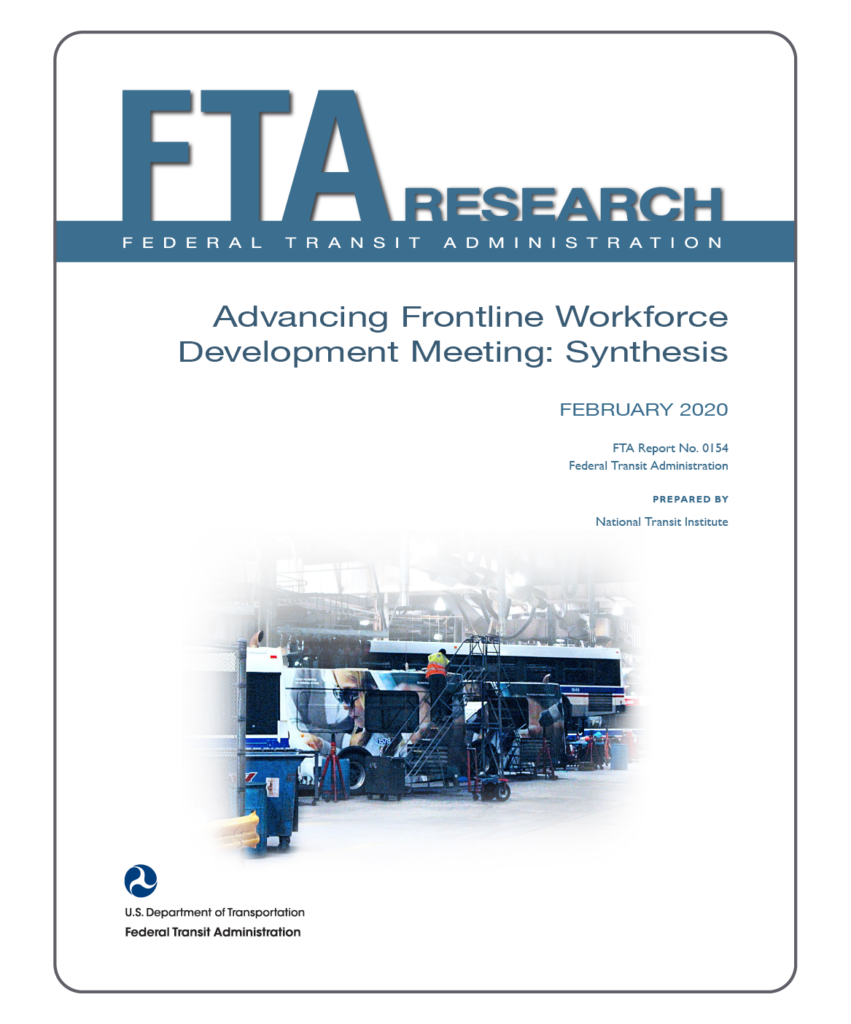
Advancing Frontline Workforce Development Meeting: Synthesis
This report synthesizes findings from a two-day gathering of more than two dozen transit industry labor and management representatives who engaged in in-depth discussions on frontline workforce training needs across the U.S. The purpose of the meeting was to identify immediate, short-term, and long-term training needs for the frontline public transportation workforce in the U.S. and ways to connect apprenticeship and formal training programs to support these needs.
National Transit Institute; Federal Transit Administration; International Transportation Learning Center
February 2020
TOPICS: Apprenticeship , Hiring and Recruitment , Policy and Planning , Training
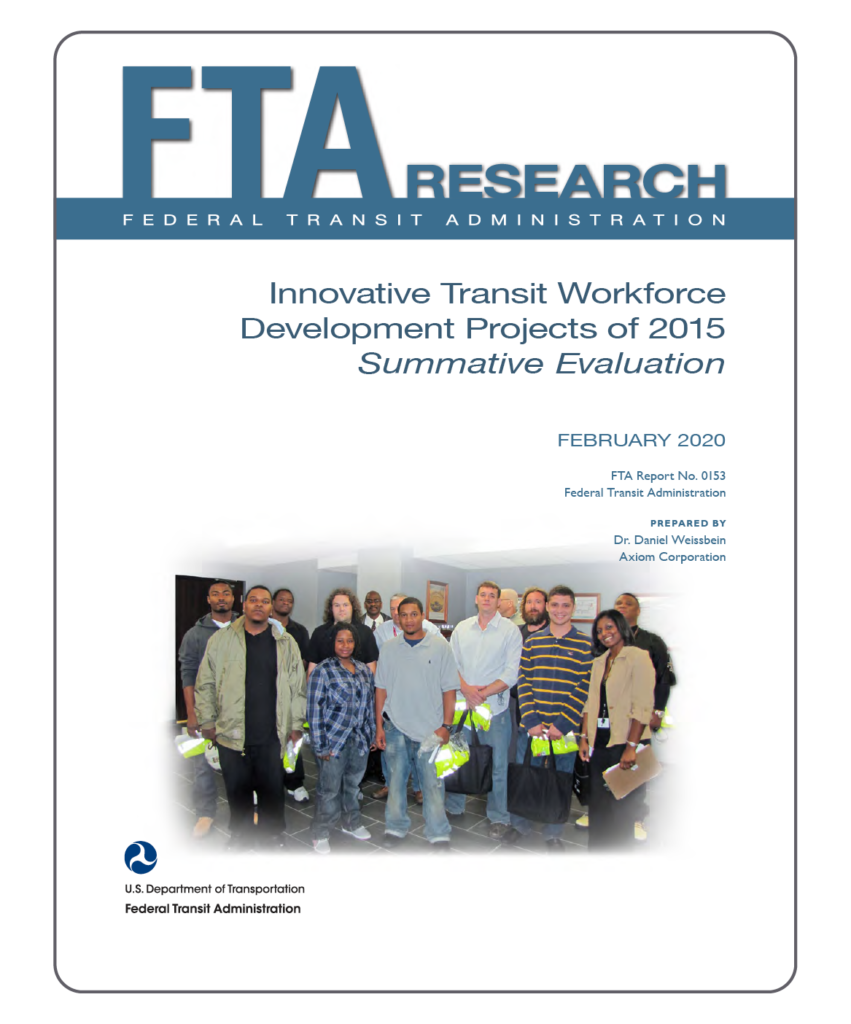
Innovative Transit Workforce Development Projects of 2015: Summative Evaluation
This report provides the results of an evaluation of Innovative Transit Workforce Development Program projects awarded in Fiscal Year 2015. Based on a competitive application process, FTA awarded 16 workforce development projects to transit authorities, higher education institutions, Native American tribes, and nonprofit organizations individually or as a consortium.
Federal Transit Administration
February 2020
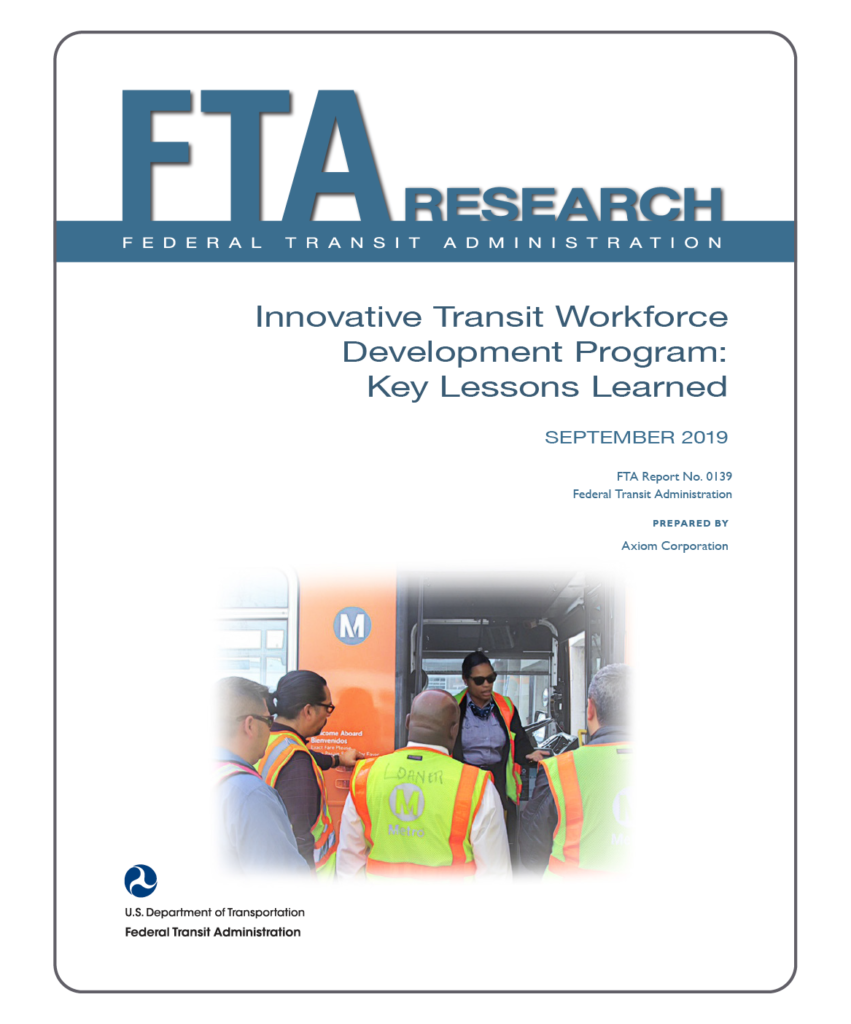
Innovative Transit Workforce Development Program: Key Lessons Learned
This report summarizes the impacts and lessons learned of individual project models, identifies transit workforce needs, and develops recommendations for the continuation or improvement of FTA’s workforce development efforts and investments.
Federal Transit Administration
September 2019
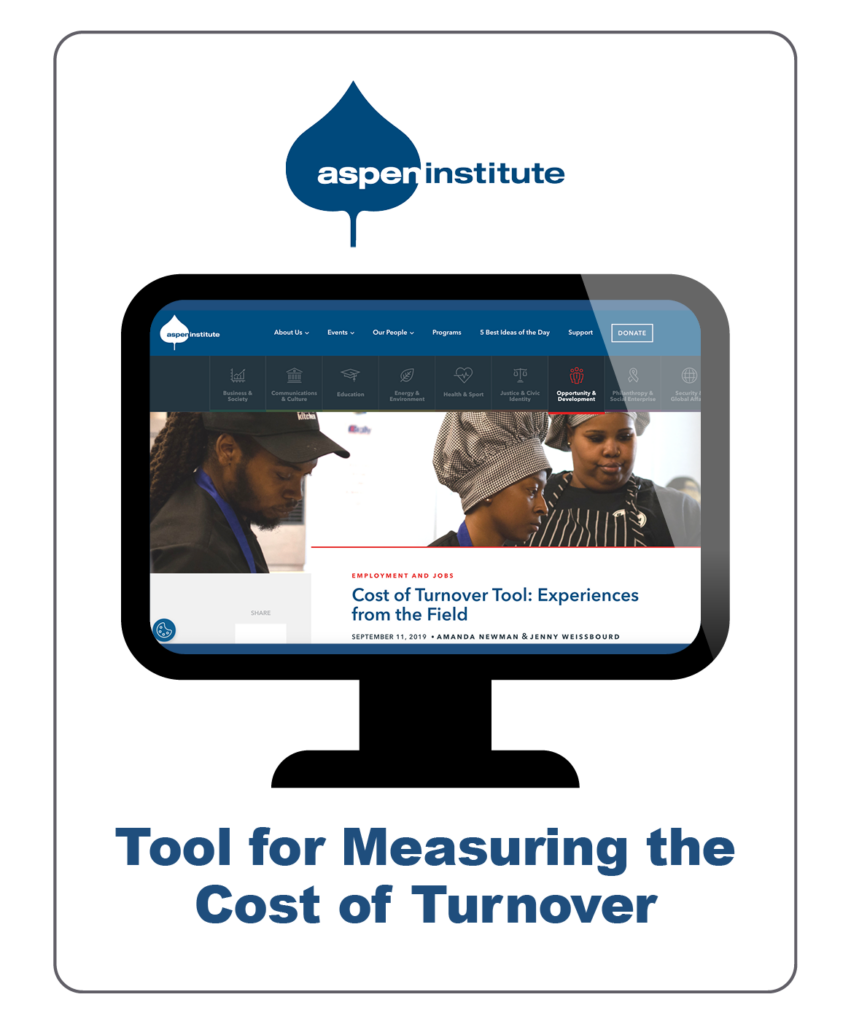
Tool for Measuring the Cost of Turnover
This Cost of Turnover Tool is a simple, “back of the envelope” calculator to help estimate how much it costs to replace staff. The tool can be useful for transit agencies looking to understand the costs of a low retention rate, or those looking to calculate the return-on-investment of mentoring or apprenticeship programs.
Aspen Institute
March 2019
TOPICS: Apprenticeship , Mentorship , Policy and Planning , Program Evaluation and ROI , Retention
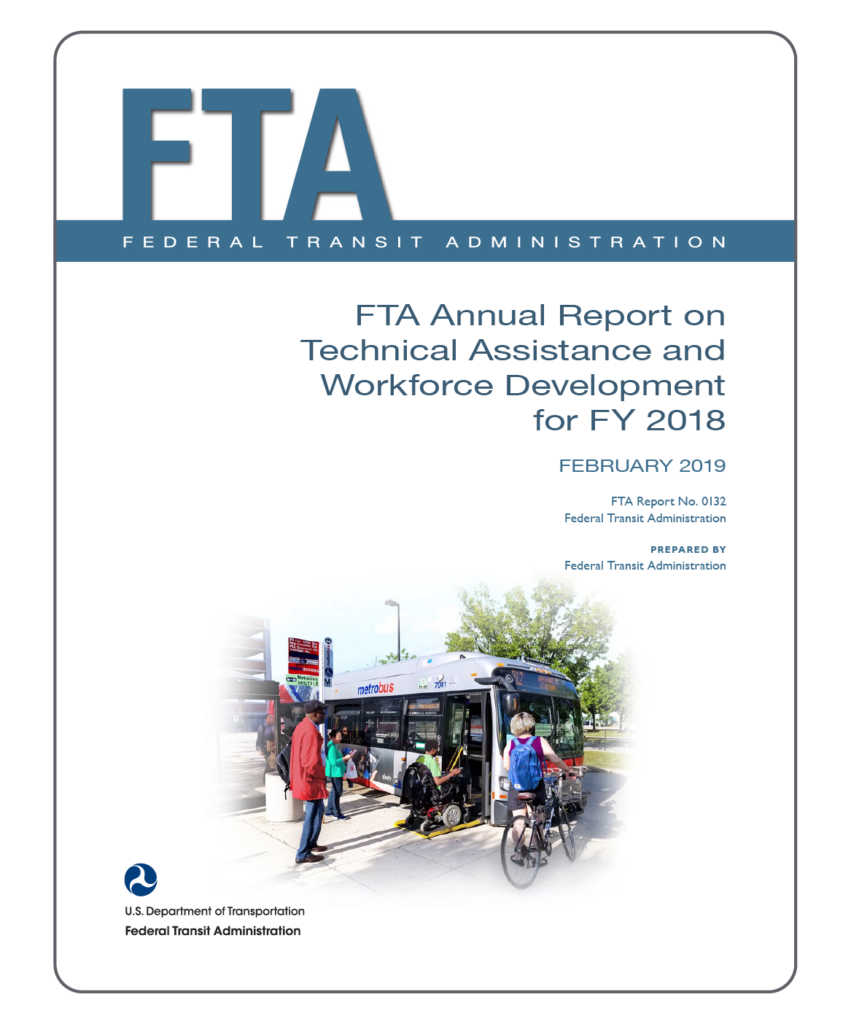
FTA Annual Report on Technical Assistance and Workforce Development for FY 2018
This annual report to Congress provides information on Fiscal Year 2018 technical assistance, standards, human resources and training projects to improve public transportation as authorized by federal public transportation law (49 U.S.C. § 5314). The report also includes information on FTA’s process for making allocations for FY 2019.
Federal Transit Administration
February 2019
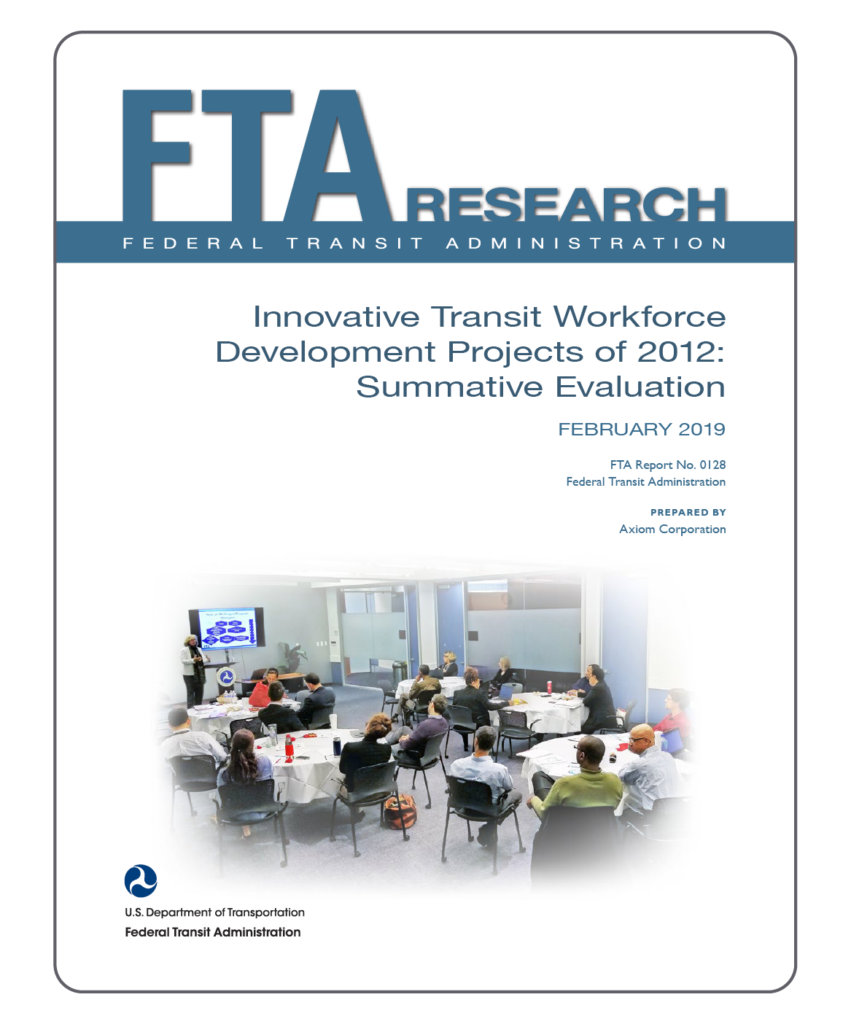
Innovative Transit Workforce Development Projects of 2012: Summative Evaluation
This report provides the results of the Innovative Transit Workforce Development Program Evaluation of projects awarded in Fiscal Year 2012. FTA awarded a total of $7,048,898 for 16 workforce development projects. Recipients included transit authorities, higher education institutions, Native American tribes, and nonprofit organizations.
Federal Transit Administration
February 2019
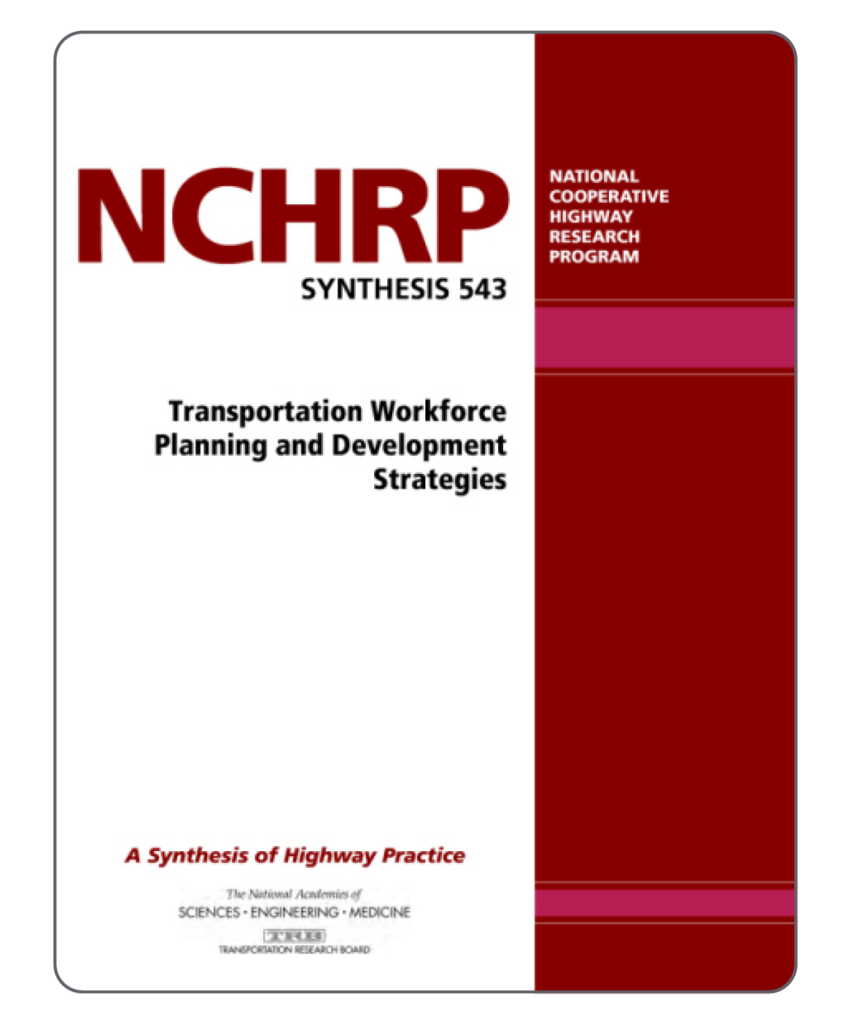
Transportation Workforce Planning and Development Strategies
This report is a synthesis of the current state of practice associated with the implementation of transportation workforce planning and development strategies at state departments of transportation (DOTs) and associated local and tribal technical assistance programs (LTAPs/TTAPs). The synthesis includes a literature review and survey results of both state DOTs and LTAPs, as well as case studies of five state DOTs, presenting an in-depth analysis of processes and considerations, challenges, lessons learned, and keys to success.
National Cooperative Highway Research Program
January 2019
TOPICS: Policy and Planning
Contributor(s): National Academies of Sciences, Engineering, and Medicine; Transportation Research Board; National Cooperative Highway Research Program; Robert Puentes; Alice Grossman; Brianne Eby; Alex Bond
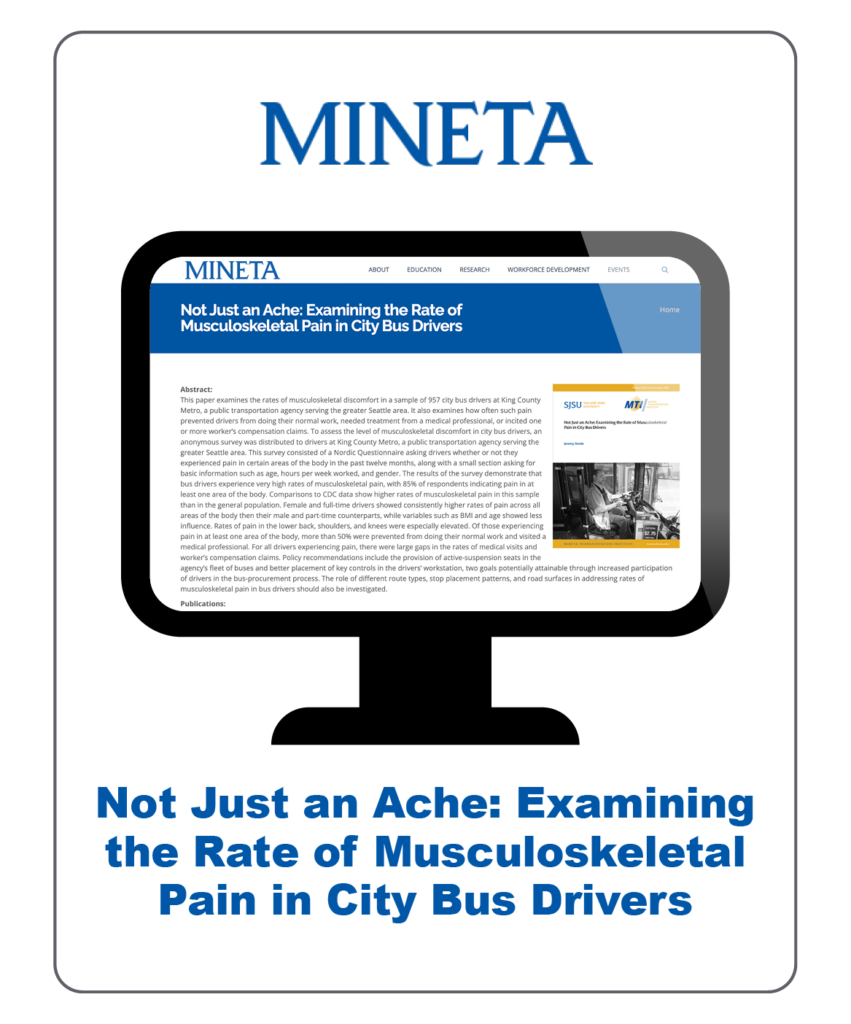
Not Just an Ache: Examining the Rate of Musculoskeletal Pain in City Bus Drivers
This paper examines the rates of musculoskeletal discomfort in a sample of 957 city bus drivers at King County Metro. The researchers conducted a survey demonstrate that city bus drivers experience very high rates of musculoskeletal pain in at least one area of the body. The paper includes policy recommendations, such as the provision of active-suspension seats in the agency’s fleet of buses and better placement of key controls in the drivers’ workstation, as well as considerations for further investigation.
Mineta Transportation Institute
November 2018
TOPICS: Policy and Planning , Safety and Health
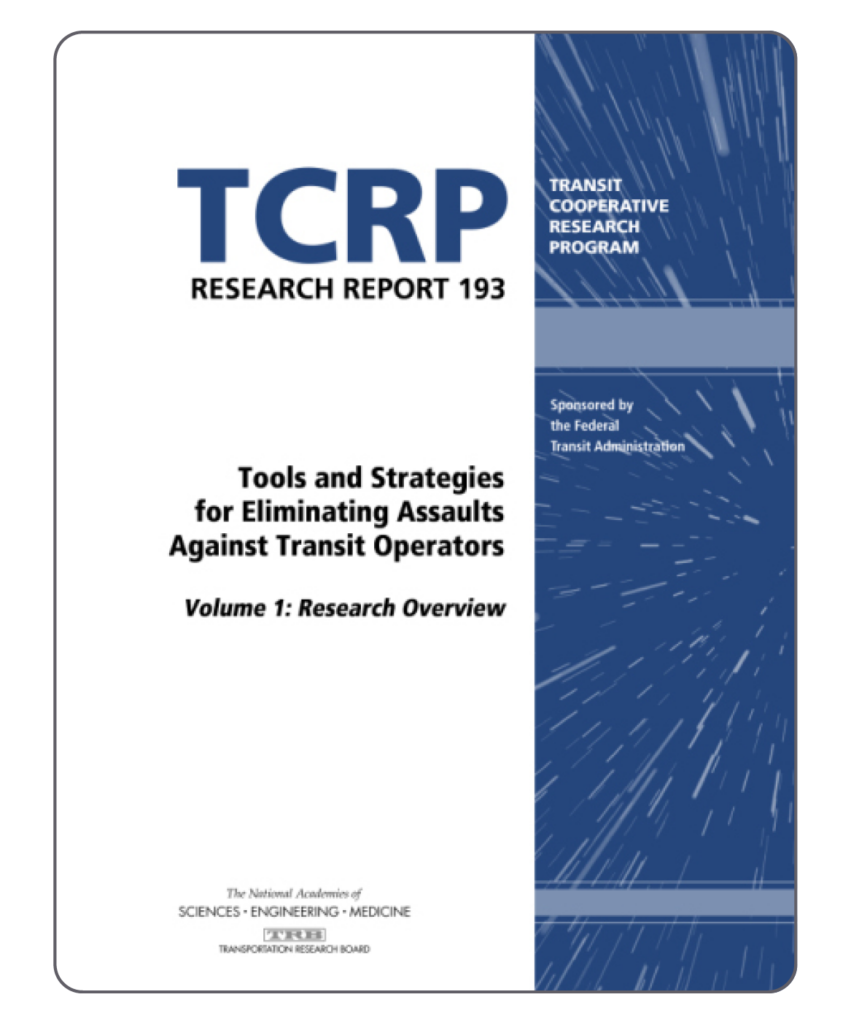
Tools and Strategies for Eliminating Assaults Against Transit Operators
This TCRP report documents policies, practices, and operating procedures related to preventing, mitigating, and responding to operator assaults. The varied format, scale, and implementation of policies and procedures set by transit agencies can shape mitigation approaches. Relevant skills and training required by transit operators to address this issue vary as well.
Transit Cooperative Research Program
May 2018
TOPICS: Policy and Planning , Safety and Health
Volume 1 documents the materials used to develop the report and Volume 2, the user guide, provides potential countermeasures and strategies to prevent or mitigate assaults against transit operators, including an operator assault risk management toolbox, vulnerability self-assessment tool, route-based risk calculator, as well as supportive checklists, guidelines, and methodologies.
Contributor(s): National Academies of Sciences, Engineering, and Medicine; Transportation Research Board; Transit Cooperative Research Program; Countermeasures Assessment and Security Experts, LLC and Transportation Resource Associates, Inc.
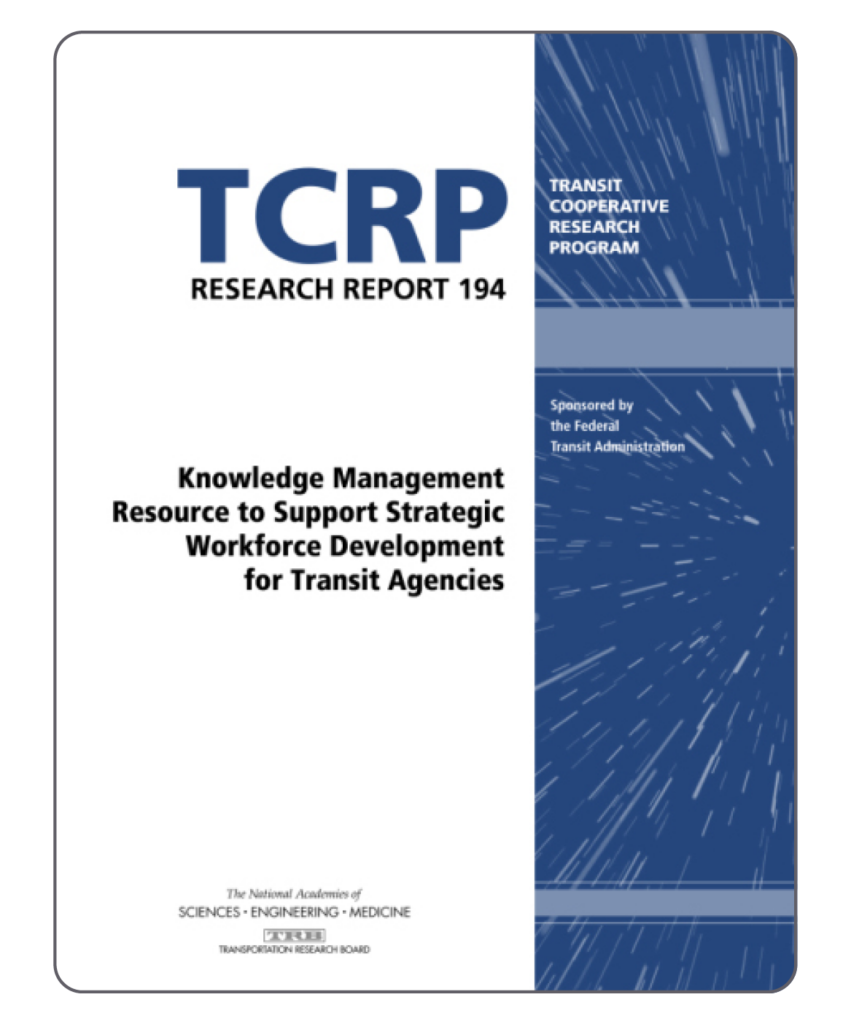
Knowledge Management Resource to Support Strategic Workforce Development for Transit Agencies
TRB’s Transit Cooperative Research Program (TCRP) Research Report 194: Knowledge Management Resource to Support Strategic Workforce Development for Transit Agencies explores the importance of knowledge management (KM), which is an organization’s process for collecting, storing, and sharing organizational information and knowledge, and provides guidance on implementing KM strategies in transit agencies. In addition, the guidance includes action plans for developing particular aspects of KM, analysis of KM strategies at several transit agencies, and a catalog of KM technology tools and resources.
Transit Cooperative Research Program (TCRP)
January 2018
TOPICS: Policy and Planning , Program Evaluation and ROI , Retention
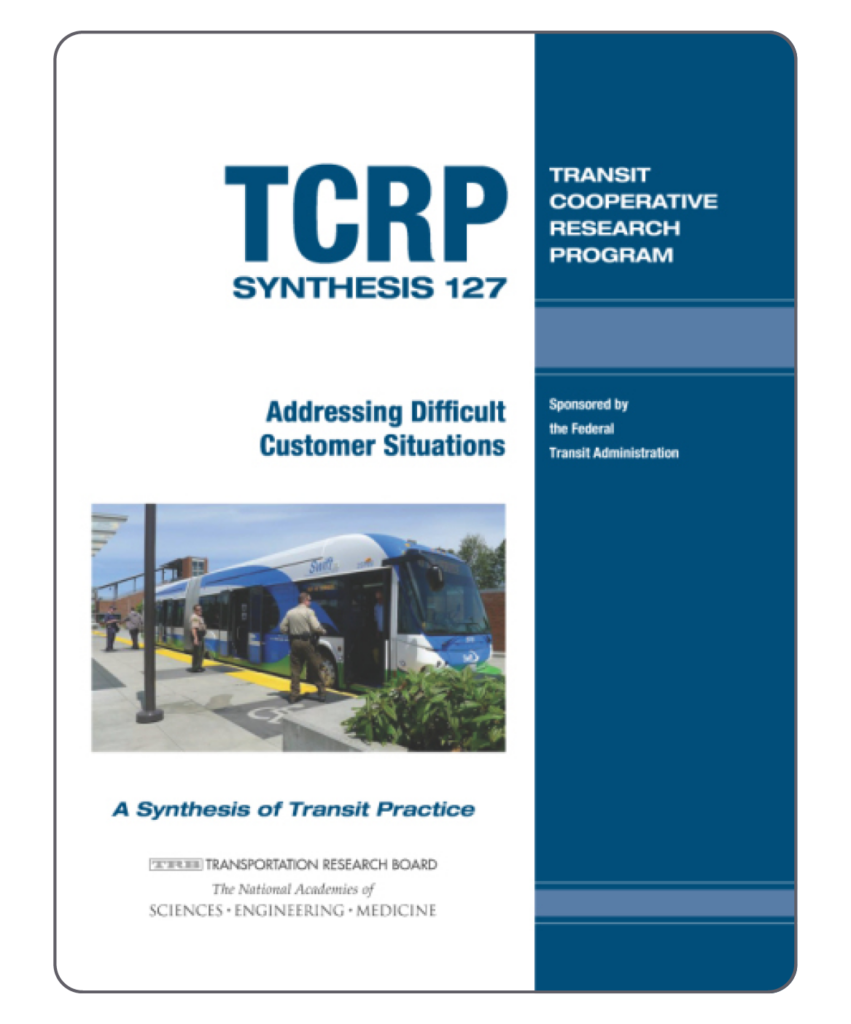
Addressing Difficult Customer Situations
This report considers issues surrounding difficult customers or passengers and the variety of circumstances that can arise when they utilize transit system facilities or vehicles. It identifies current practices used by transit agencies to prevent, prepare for, and deal with these incidents, including training programs for operators and other staff.
Transit Cooperative Research Program
March 2017
TOPICS: Policy and Planning , Safety and Health , Training
Contributor(s): National Academies of Sciences, Engineering, and Medicine; Transportation Research Board; Transit Cooperative Research Program Synthesis Program; Synthesis Program; Transit Cooperative Research Program; Joel M. Volinski
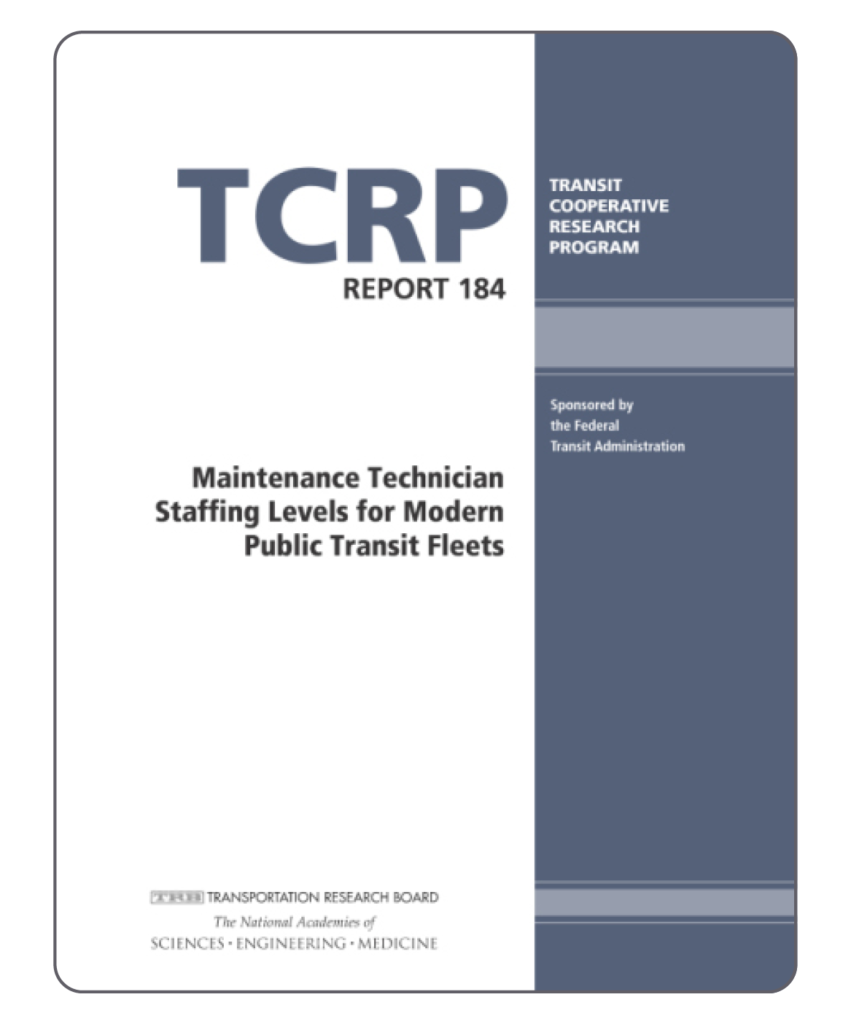
Maintenance Technician Staffing Levels for Modern Public Transit Fleets
This report identifies existing tools and practices used to determine optimum maintenance technician staffing levels and provides an analysis of variables that influence maintenance technician staffing needs. A Microsoft Excel maintenance staffing calculator and user guide is available.
Transit Cooperative Research Program
August 2016
Contributor(s): National Academies of Sciences, Engineering, and Medicine; Transportation Research Board; Transit Cooperative Research Program; Ken Mall; June Sekera; the Transportation Learning Center and Transit Resource Center
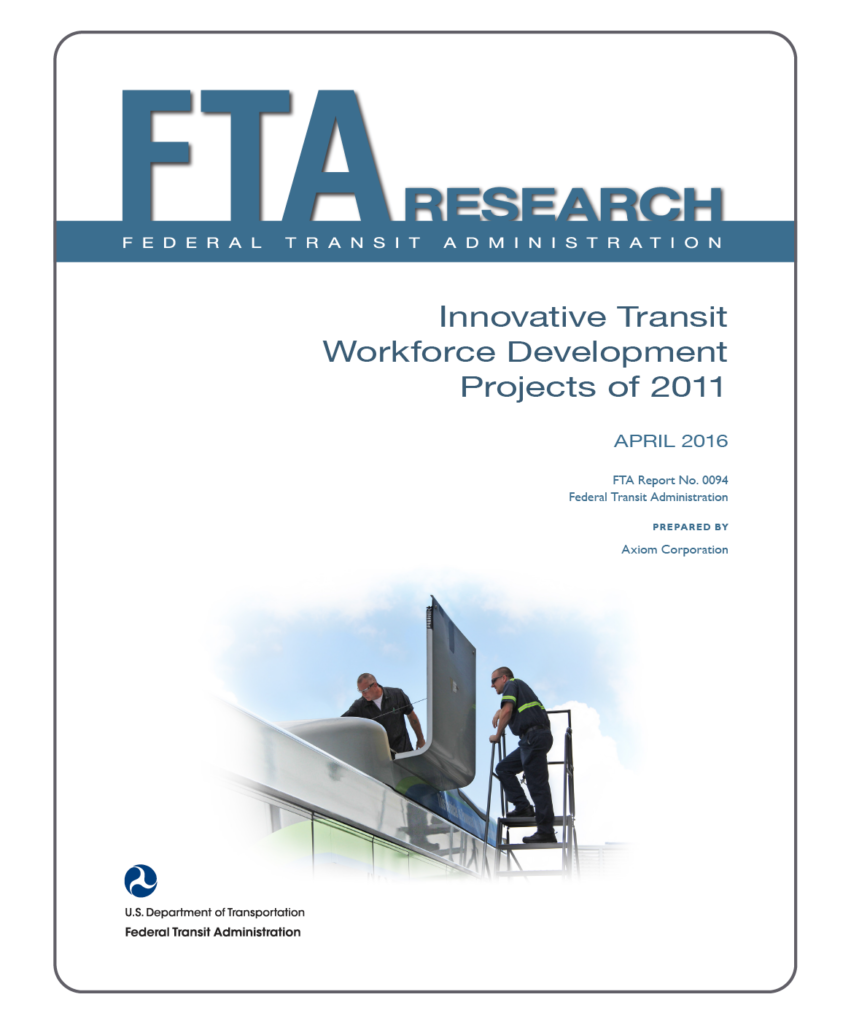
Innovative Transit Workforce Development Projects of 2011
This report provides the results of the Innovative Transit Workforce Program Evaluation of projects awarded in fiscal year 2011. The evaluation was conducted via review of updates and final report submitted by grantees and telephone interviews with grantees.
Federal Transit Administration
April 2016

Improving Safety Culture in Public Transportation
TRB’s Transit Cooperative Research Program (TCRP) Report 174: Improving Safety Culture in Public Transportation presents research on the definition of safety culture within public transportation, presents methods and tools for assessing safety culture, and provides strategies and guidelines that public transportation agencies may apply to initiate and build a program for improving safety culture.
Transit Cooperative Research Program
April 2015
TOPICS: Policy and Planning , Safety and Health
Contributor(s): National Academies of Sciences, Engineering, and Medicine; Transportation Research Board; Transit Cooperative Research Program; Howard Roberts; Richard Retting; Tom Webb; Ashley Colleary; Brian Turner; Xinge Wang; Roger Toussaint; Gwynn Simpson; Claudia White
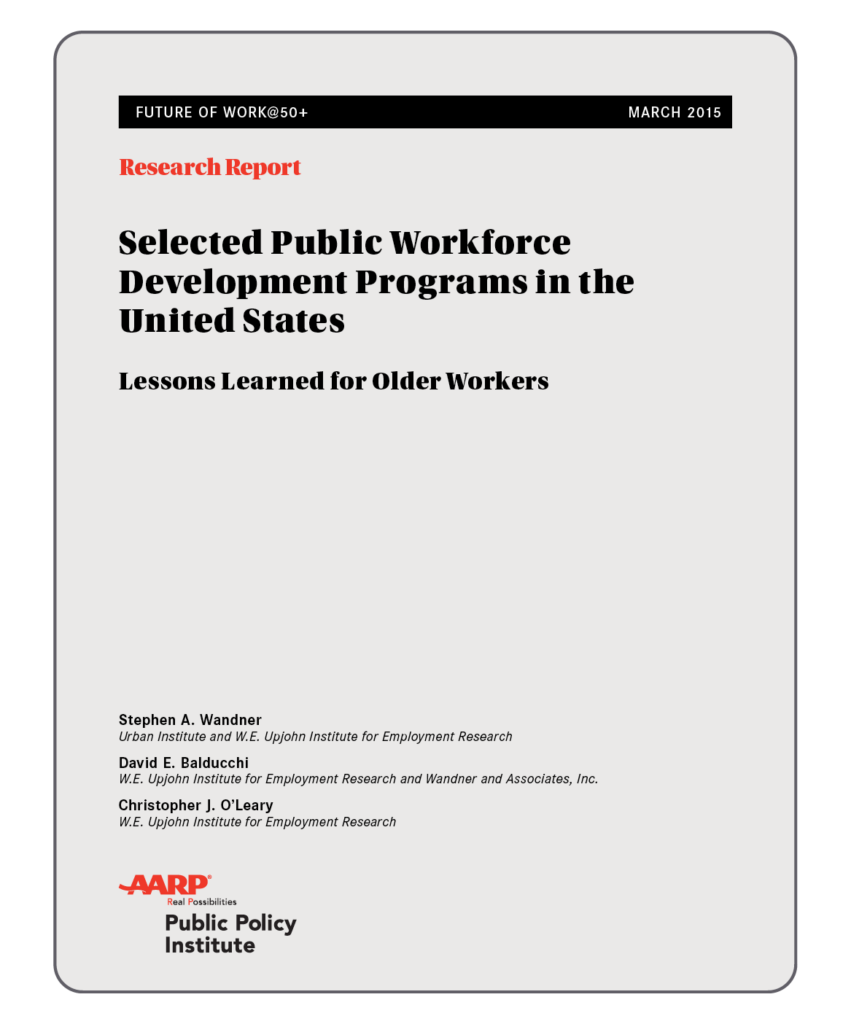
Selected Public Workforce Development Programs in the United States: Lessons Learned for Older Workers
This report provides a selective review of public workforce development programs in the United States over the past 80 years, placing special emphasis on the importance these programs have to older Americans. It discusses how the public workforce system developed, how it operates today, significant programs and target groups, common employment services and job training strategies, and what is known about program effectiveness.
American Association of Retired Persons
March 2015
TOPICS: Community Engagement , Policy and Planning
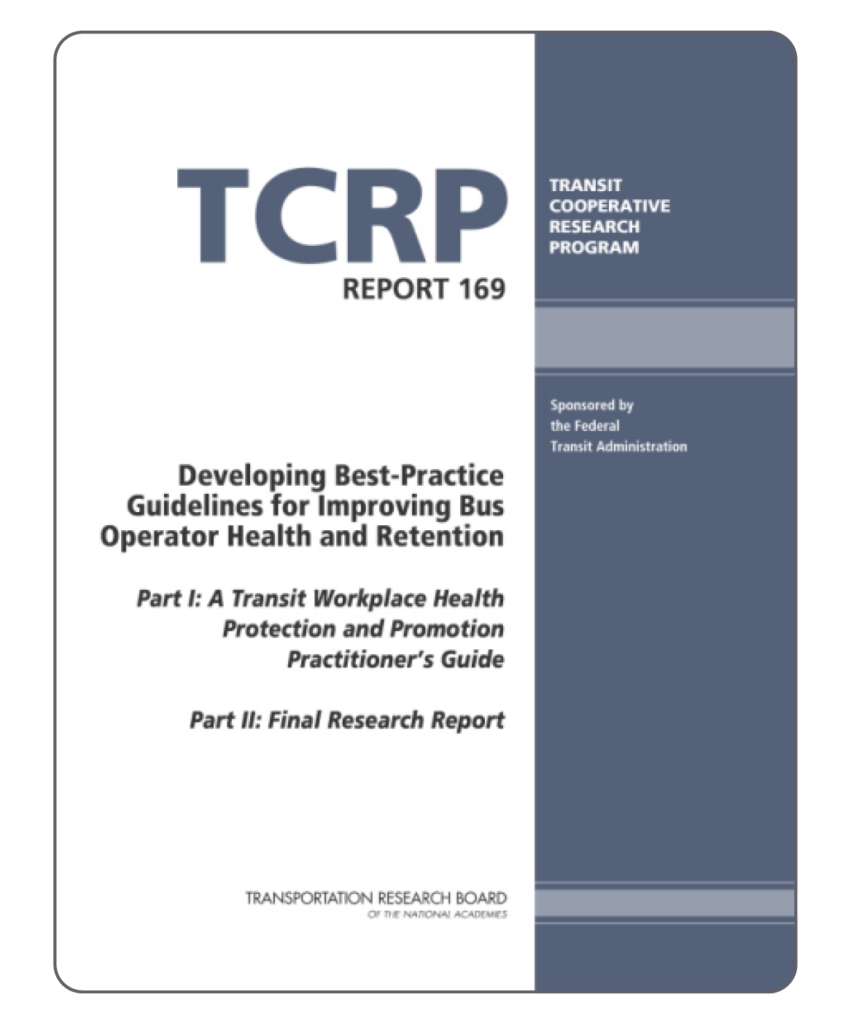
Developing Best-Practice Guidelines for Improving Bus Operator Health and Retention
This TCRP report addresses some of the health and safety issues common throughout the transit industry, and describes approaches that transit organizations in the United States and Canada have taken to address health problems faced by transit employees. The report is supplemented by a presentation, Making the Case for Transit Workplace Health Protection and Promotion, and an Excel worksheet, Transit Operator Workplace Health Protection and Promotion Planning, Evaluation, and ROI Template, that may assist transit agencies with implementing and carrying out transit-specific programs to protect the health of bus operators and other employees.
Transit Cooperative Research Program
August 2014
TOPICS: Policy and Planning , Retention , Safety and Health
Contributor(s): National Academies of Sciences, Engineering, and Medicine; Transportation Research Board; Transit Cooperative Research Program; Robin Mary Gillespie; Xinge Wang; Tia Brown
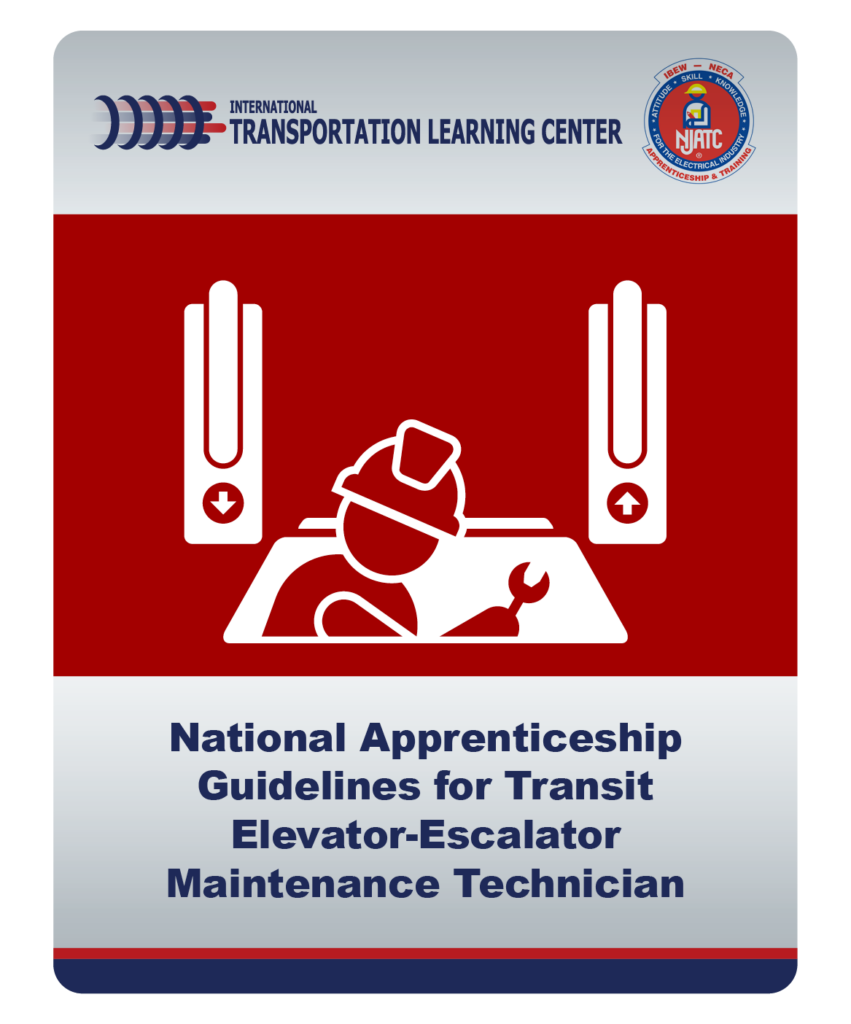
National Apprenticeship Guidelines for Transit Elevator-Escalator Maintenance Technician
The purpose of these National Guidelines for Apprenticeship Standards (National Guideline Standards) is to provide policy and guidance to local Sponsors in developing these Standards for Apprenticeship for local approval and registration. These National Guideline Standards developed by the Sponsor are certified by the U. S. Department of Labor, Office of Apprenticeship as substantially conforming to the requirements of Title 29, CFR parts 29 and 30. State Apprenticeship Agencies recognized by the Office of Apprenticeship to register local programs, and/or local laws and regulations, may impose additional requirements that must be addressed in the local apprenticeship standards.
International Transportation Learning Center & National Joint Apprenticeship and Training Committee (NJATC)
January 2014
TOPICS: Apprenticeship , Policy and Planning , Training
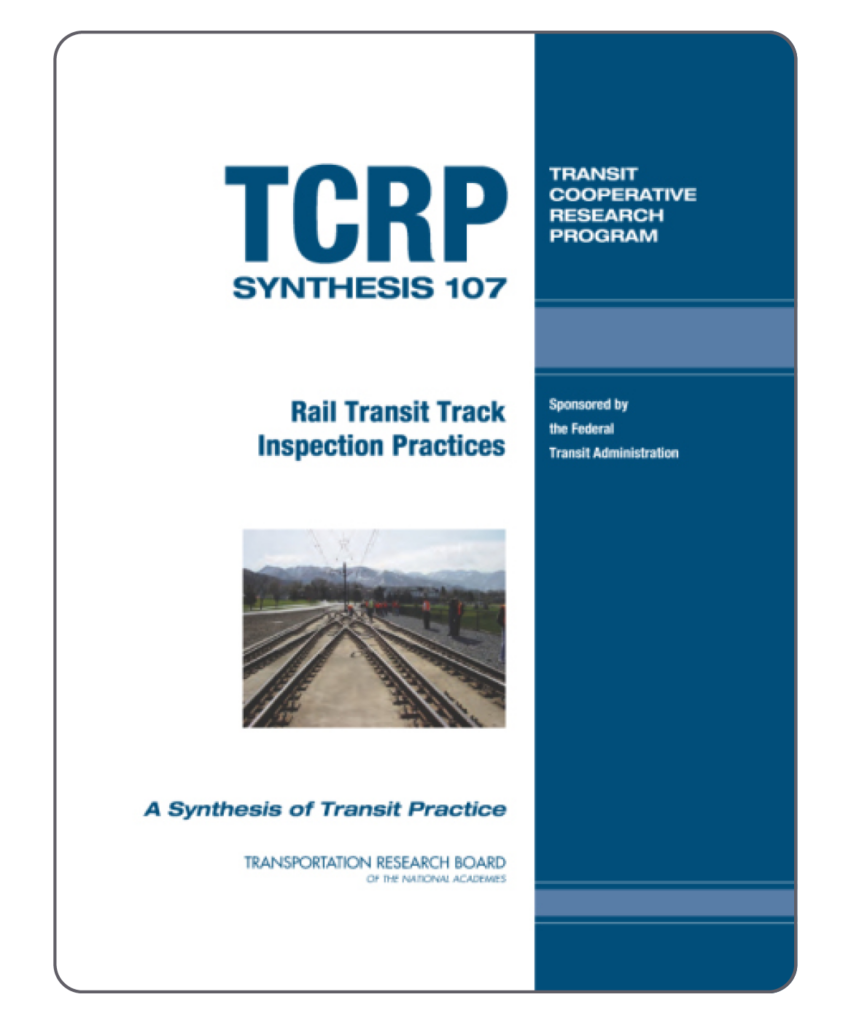
Rail Transit Track Inspection Practices
TRBs Transit Cooperative Research Program (TCRP) Synthesis 107: Rail Transit Track Inspection Practices offers information across a range of older and newer U.S. rail transit agencies on track inspection practices and policies.
Issues addressed in the report include agency staffing, agency organization and characteristics, track inspection program criteria, training and certification, procurement, and track safety practices.
Transit Cooperative Research Program (TCRP)
January 2013
TOPICS: Policy and Planning , Procurement , Safety and Health , Training
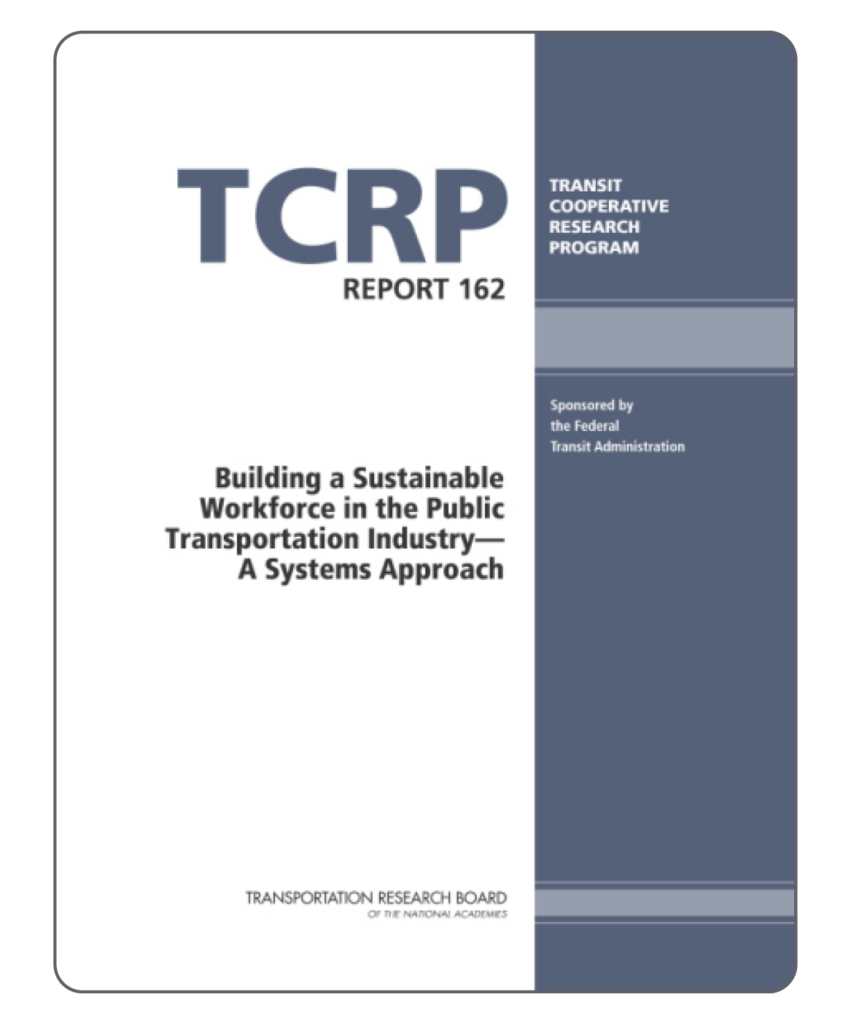
Building a Sustainable Workforce in the Public Transportation Industry—A Systems Approach
TRB’s Transit Cooperative Research Program (TCRP) Report 162: Building a Sustainable Workforce in the Public Transportation Industry—A Systems Approach provides a guidebook that addresses contemporary issues in workforce development, retention, and attraction, and public transportation image management.
The guidebook provides practical tools to transit agencies on a variety of workforce issues including workforce strategies that enhance organizational processes, performance metrics to evaluate the impact of workforce strategies, image management techniques that improve perceptions of the public transportation industry, and benchmarking processes that allow for continuous organizational improvement.
The guidebook is separated into modules that may be used independently or together in the form of the fully integrated guidebook.
Transit Cooperative Research Program (TCRP)
January 2013
TOPICS: Hiring and Recruitment , Policy and Planning , Retention , Training

Developing, Enhancing, and Sustaining Tribal Transit Services: A Guidebook
TRB’s Transit Cooperative Research Program (TCRP) Report 154: Developing, Enhancing, and Sustaining Tribal Transit Services: A Guidebook offers guidance about the various steps for planning and implementing a tribal transit system. The steps that are described may be used for planning a new transit system, enhancing an existing service, or taking action to sustain services.
Transit Cooperative Research Program
January 2012
TOPICS: Community Engagement , Policy and Planning , Training
Contributor(s): National Academies of Sciences, Engineering, and Medicine; Transportation Research Board; Transit Cooperative Research Program; Albert T. Stoddard, III; David Sampson; Jill Cahoon; Ronald Hall; Peter Schauer; Valerie J. Southern; Tangerine Almeida
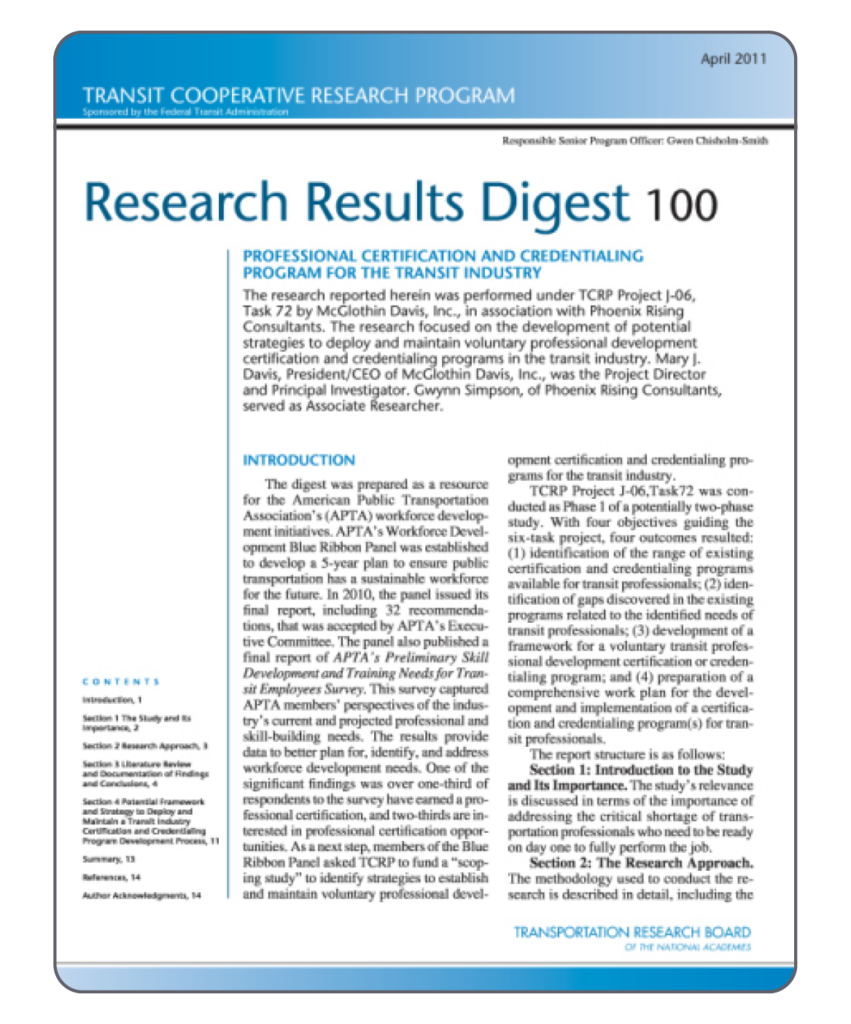
Professional Certification and Credentialing Program for the Transit Industry
TRB’s Transit Cooperative Research Program (TCRP) Research Results Digest 100: Professional Certification and Credentialing Program for the Transit Industry explores the findings of a literature review and a gap analysis of the efficacy of four transit-specific professional development programs. The report also examines potential strategies that might be used to deploy and maintain a transit industry certification and credentialing program.
Transit Cooperative Research Program (TCRP)
April 2011
TOPICS: Career Pathways , Policy and Planning , Retention , Training
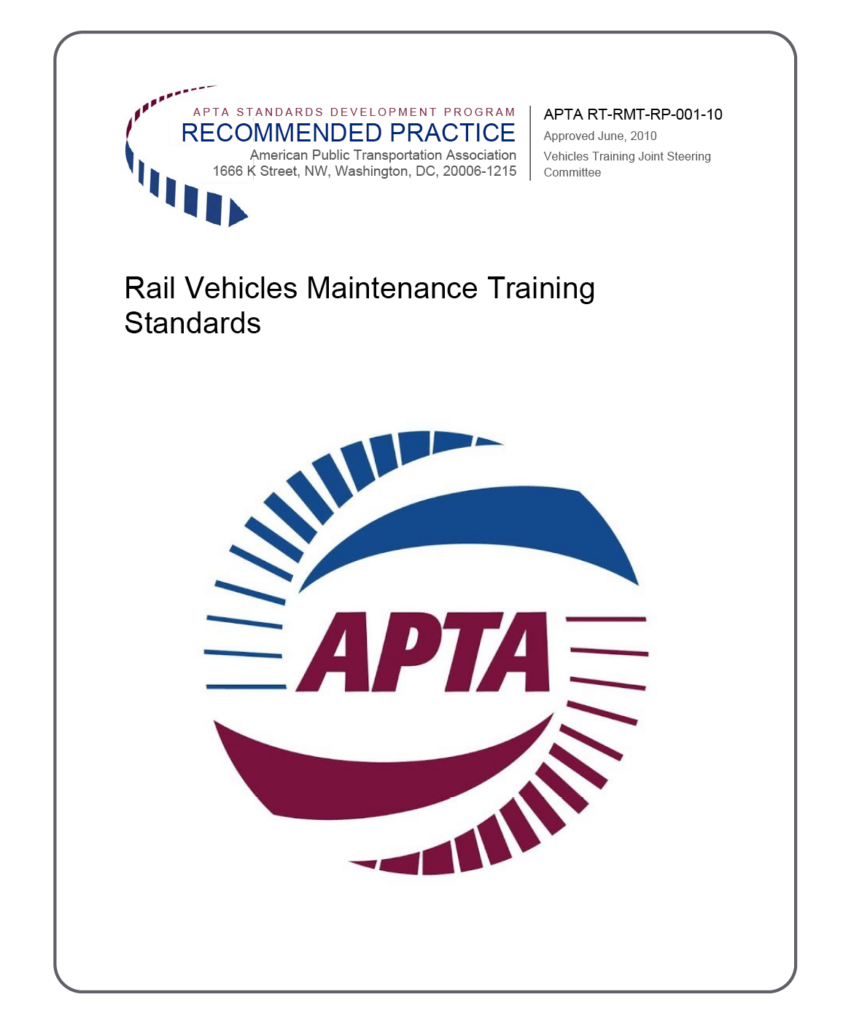
Rail Vehicles Maintenance Training Standards
In response to the transit industry’s need for rail vehicles maintenance training, the Transportation Learning Center partnered with APTA, transit agencies and unions representing transit workers to develop these joint labor-management training guidelines and recommended training practices.
American Public Transportation Association (APTA) & International Transportation Learning Center
June 2010
TOPICS: Policy and Planning , Training
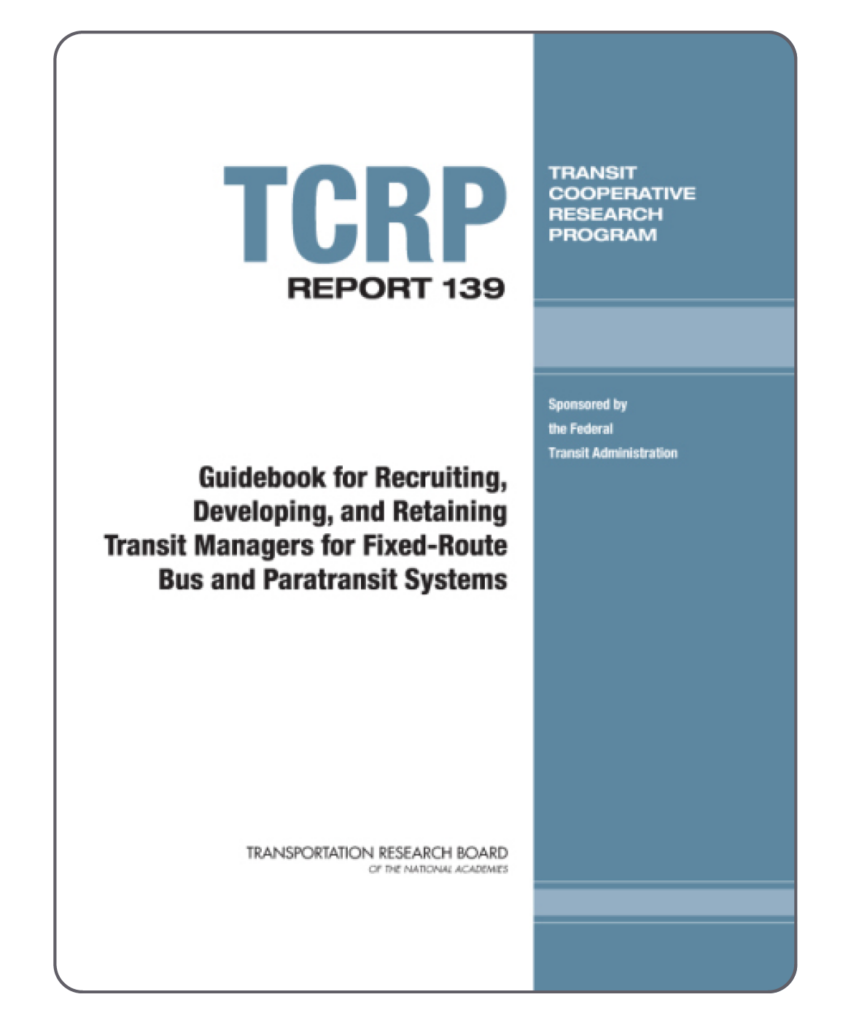
Guidebook for Recruiting, Developing, and Retaining Transit Managers for Fixed-Route Bus and Paratransit Systems
TRB’s Transit Cooperative Research Program (TCRP) Report 139: Guidebook for Recruiting, Developing, and Retaining Transit Managers for Fixed-Route Bus and Paratransit Systems explores resources for fixed-route bus, general public demand response, and Americans with Disabilities Act (ADA) paratransit systems resources to assist in the recruitment, development, and retention of managers.
Transit Cooperative Research Program
March 2010
TOPICS: Hiring and Recruitment , Policy and Planning , Retention , Workforce Shortage
Contributor(s): National Academies of Sciences, Engineering, and Medicine; Transportation Research Board; Transit Cooperative Research Program
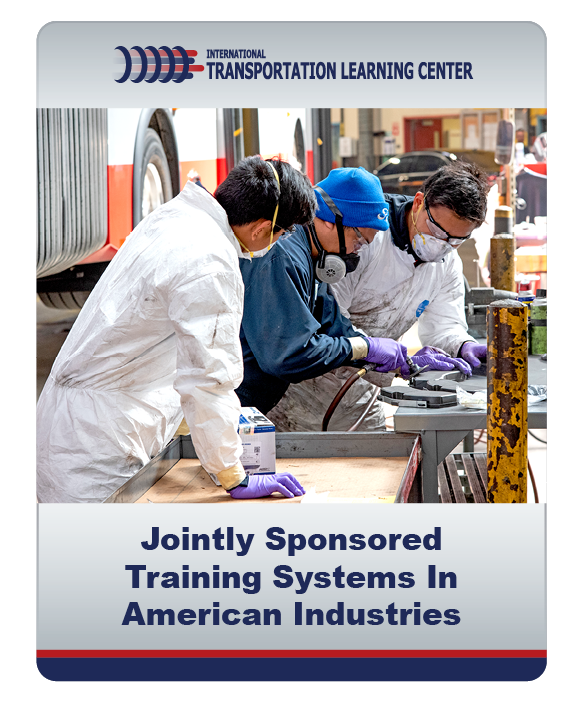
Jointly Sponsored Training Systems In American Industries
This paper examines recent developments in credentialing in jointly sponsored training and qualifications systems across the United States. This paper builds on previous work on building trades joint apprenticeship and training programs, describes their structure and activities, and documents their superior performance.
Written in collaboration with Robert W. Glover, the University of Texas at Austin.
International Transportation Learning Center
February 2009
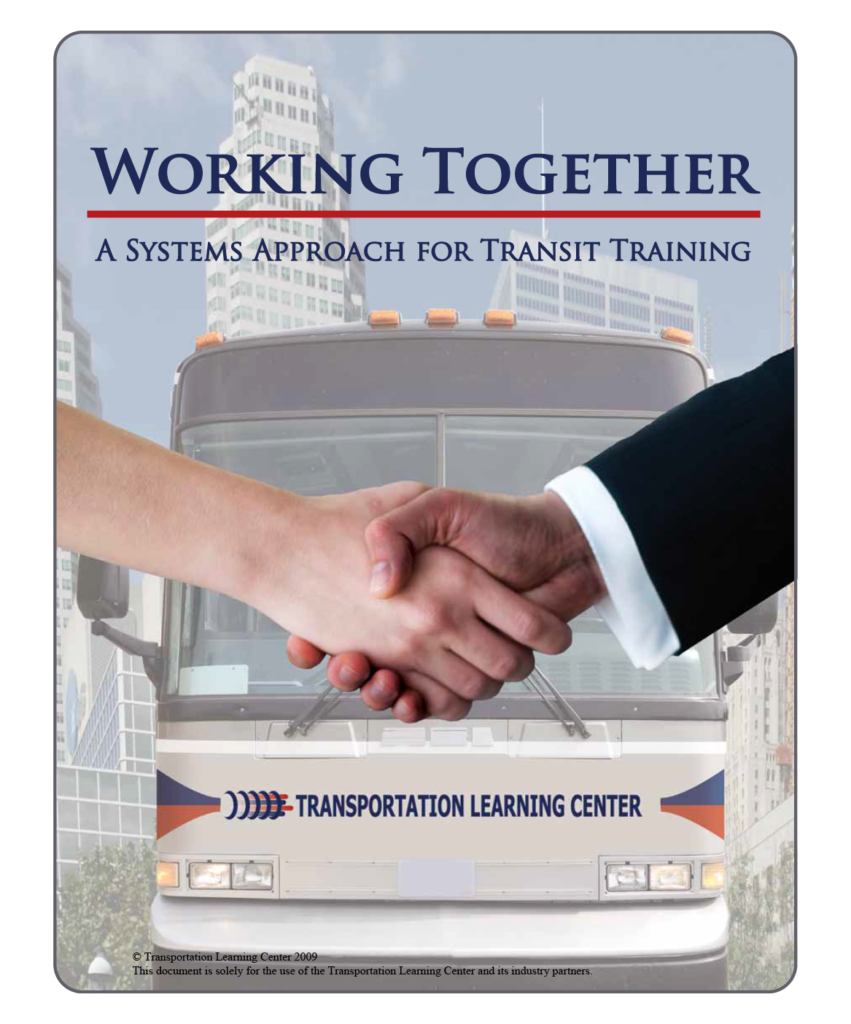
Working Together: A Systems Approach for Transit Training
Transit faces a critical skills challenge driven by changing technologies, shifting workforce demographics and record-breaking growth in ridership. Working Together: A Systems Approach for Transit Training outlines how constructive training partnerships provide the most effective way for the transit industry to address its skill challenges.
International Transportation Learning Center
January 2009
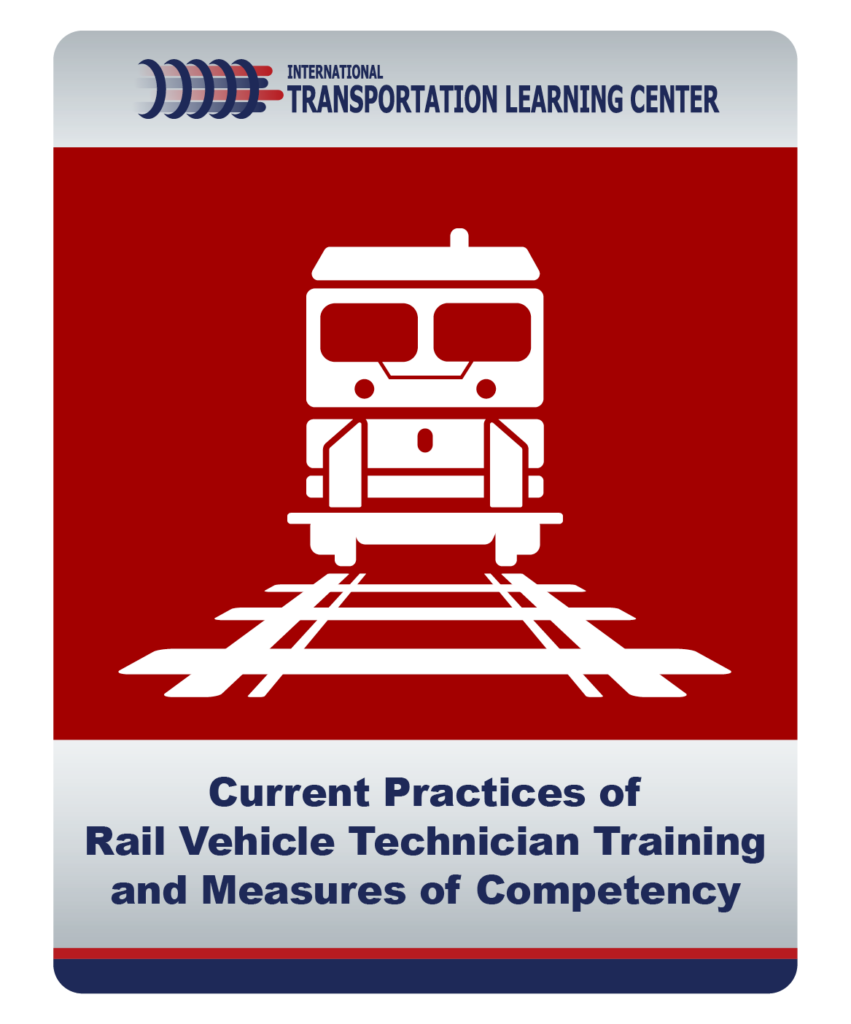
Current Practices of Rail Vehicle Technician Training and Measures of Competency
This 2009 ILTC brief summarizes findings from a survey on best practices in rail car maintenance, based on recommendations from the RCRP E-7 Panel.
International Transportation Learning Center
January 2009
TOPICS: Policy and Planning , Training
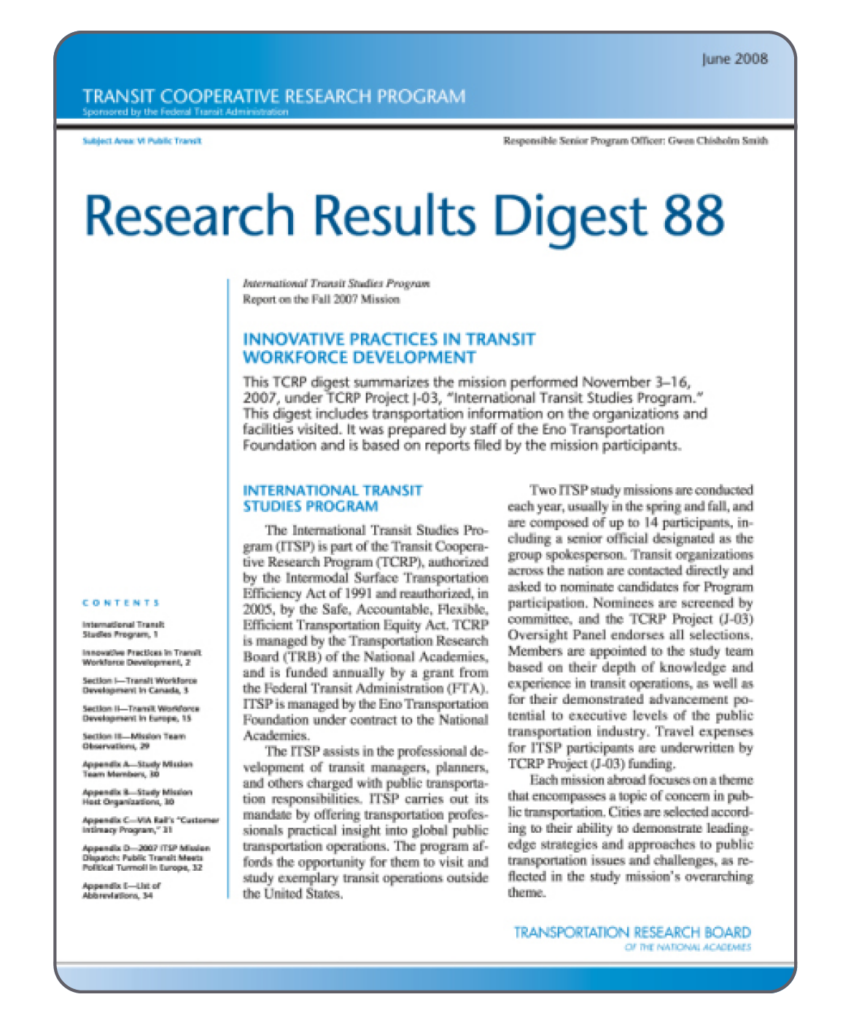
Innovative Practices in Transit Workforce Development
TRB’s Transit Cooperative Research Program (TCRP) Research Results Digest 88: Innovative Practices in Transit Workforce Development examines innovative practices in workforce development in several cities in Canada, France, and Belgium.
Transit Cooperative Research Program (TCRP)
June 2008
TOPICS: Hiring and Recruitment , Policy and Planning , Training
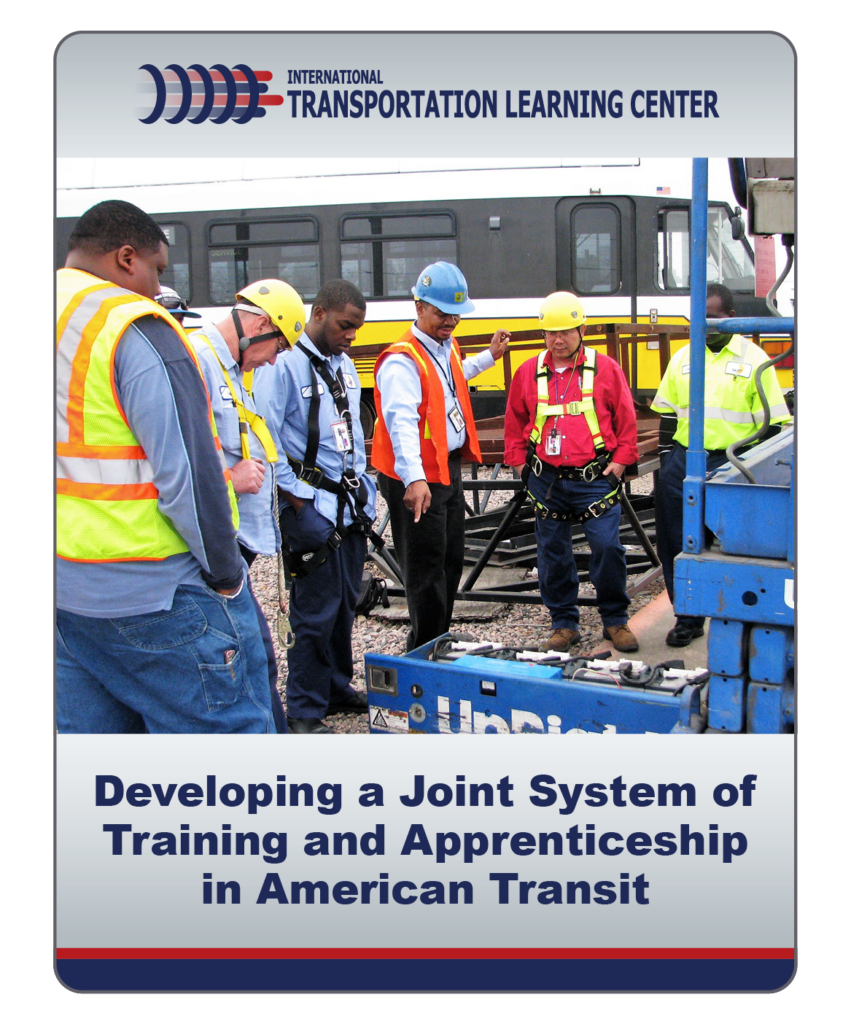
Developing a Joint System of Training and Apprenticeship in American Transit
This paper reviews training innovations and lessons that may be applicable to the transit industry from practices used in other industries. It draws on a rich body of experience of joint apprenticeship and training programs, as well as employer-sponsored training.
Prepared with Robert W. Glover, the University of Texas at Austin.
International Transportation Learning Center
September 2007
TOPICS: Apprenticeship , Policy and Planning , Training
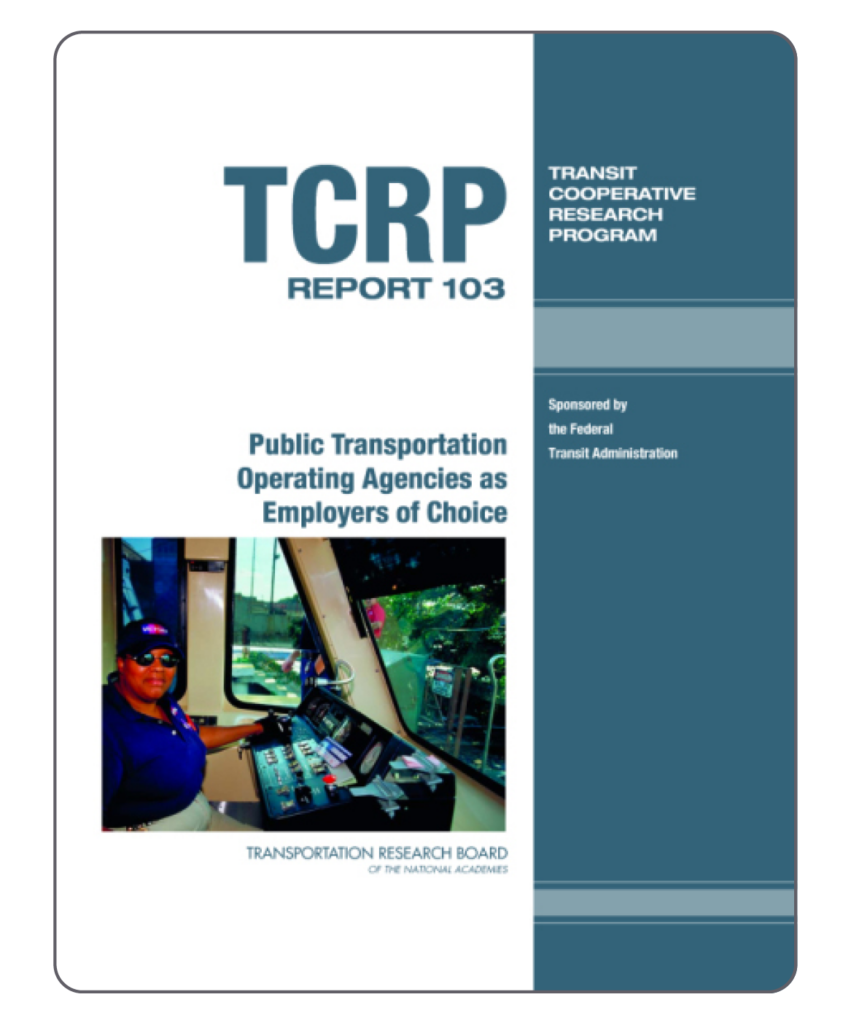
Public Transportation Operating Agencies as Employers of Choice
TRB’s Transit Cooperative Research Program (TCRP) Report 103 documents principles, techniques, and strategies that are used in workforce recruitment, development, and retention. The report includes a companion document, “Communications Strategy and Implementation Plan, Positioning the Public Transportation Operating Agency as an Employer of Choice” that describes strategies and solutions that offer the greatest potential for positioning public transportation operating agencies as an employer of choice.
Contributors: Watson Wyatt Worldwide and Focus Group Corporation
Transit Cooperative Research Program
January 2004
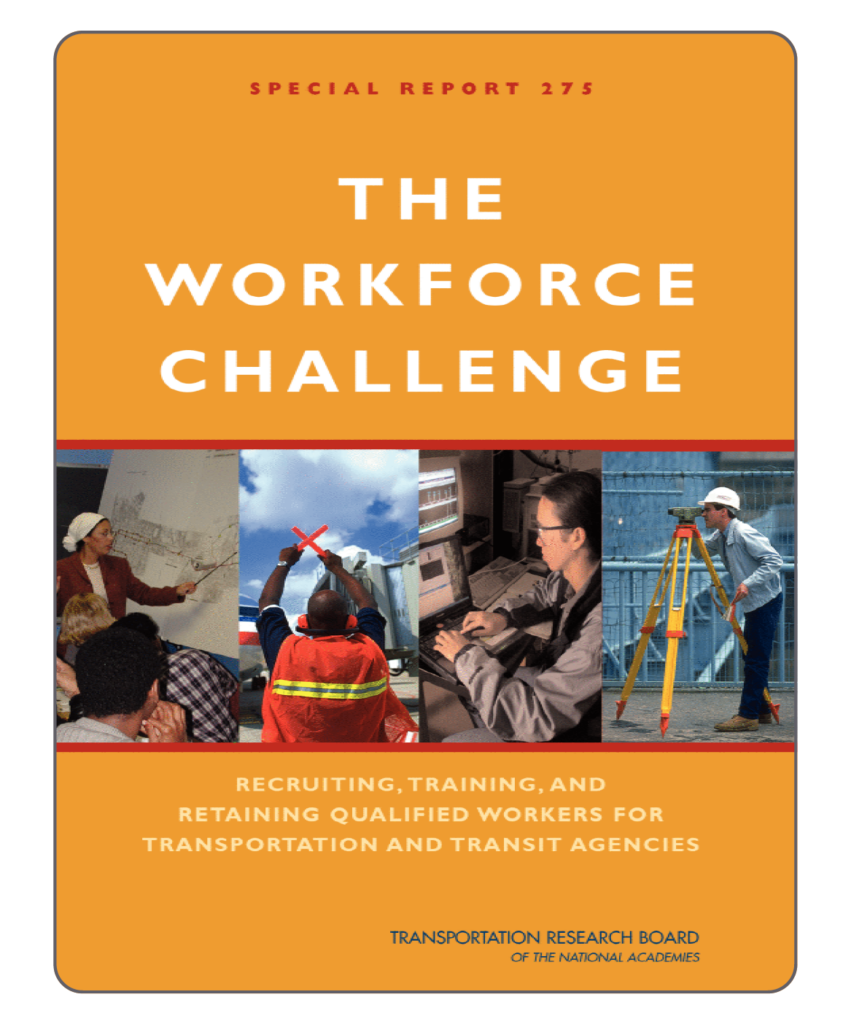
The Workforce Challenge
This report compiles research about the issues facing the transportation workforce, including changing skills, an aging workforce, and low prioritization of training. The report recommends working to expand existing federal and academic resources, create an institutional focus for the issue, and establish human resources management as a strategic function within the transportation community.
Transportation Research Board
January 2003
TOPICS: Hiring and Recruitment , Policy and Planning , Procurement , Retention , Training
Contributor(s): National Academies of Sciences, Engineering, and Medicine; Transportation Research Board; Committee on Future Surface Transportation Agency Human Resource Needs: Strategies for Recruiting, Training, and Retaining Personnel
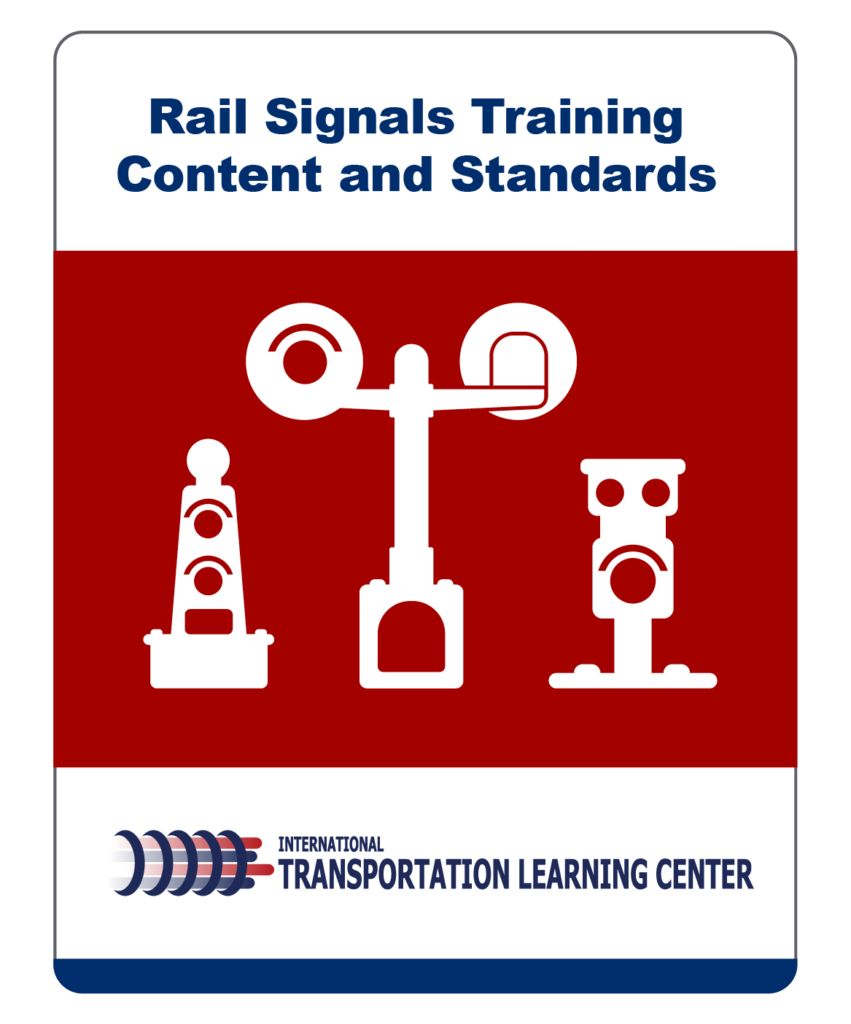
Rail Signals Training Content and Standards
An overview of ITLC’s signals training course (2 modules—level 100 and 200).








